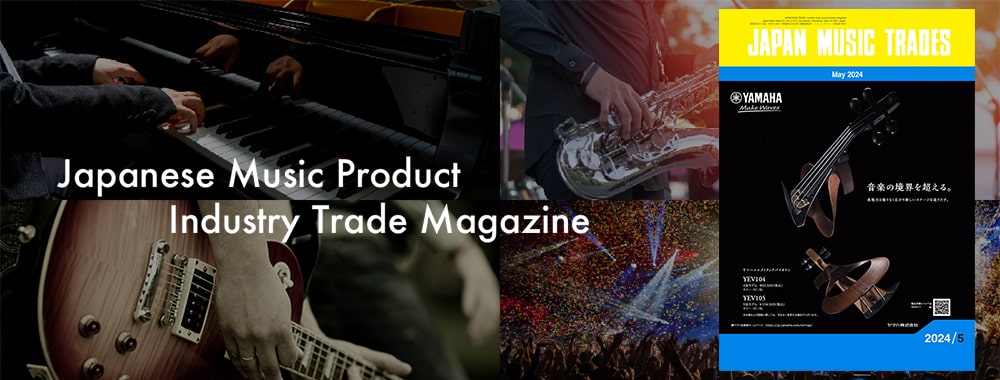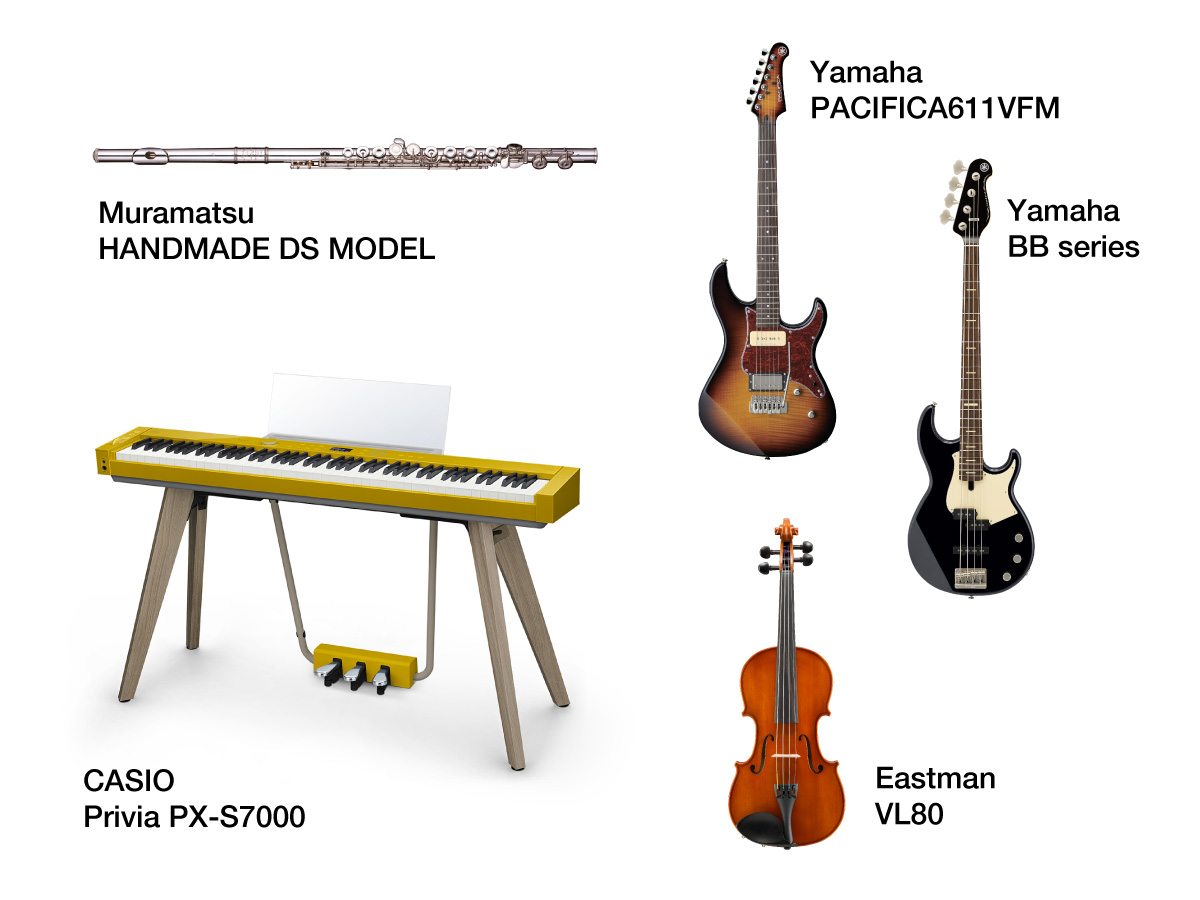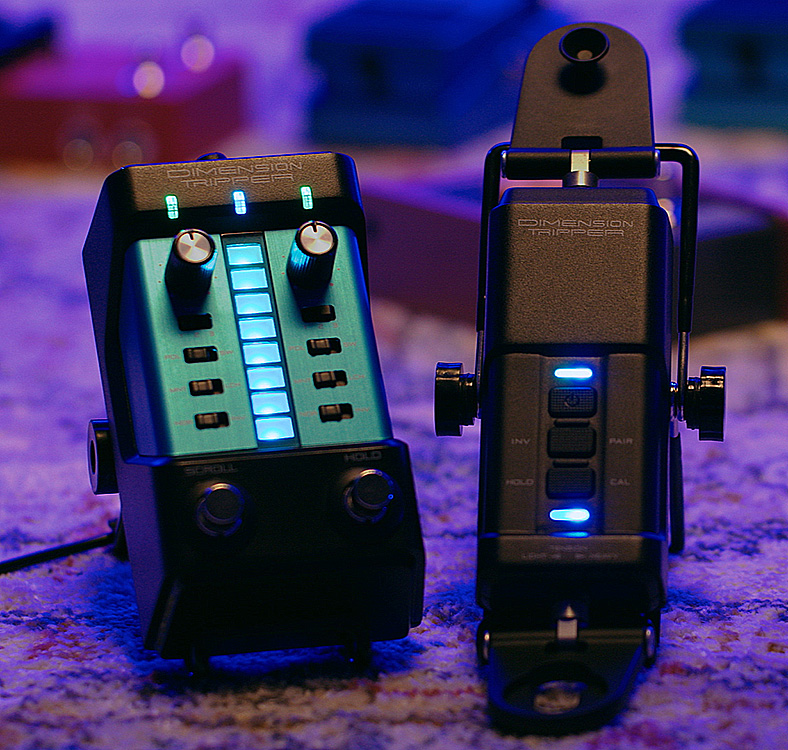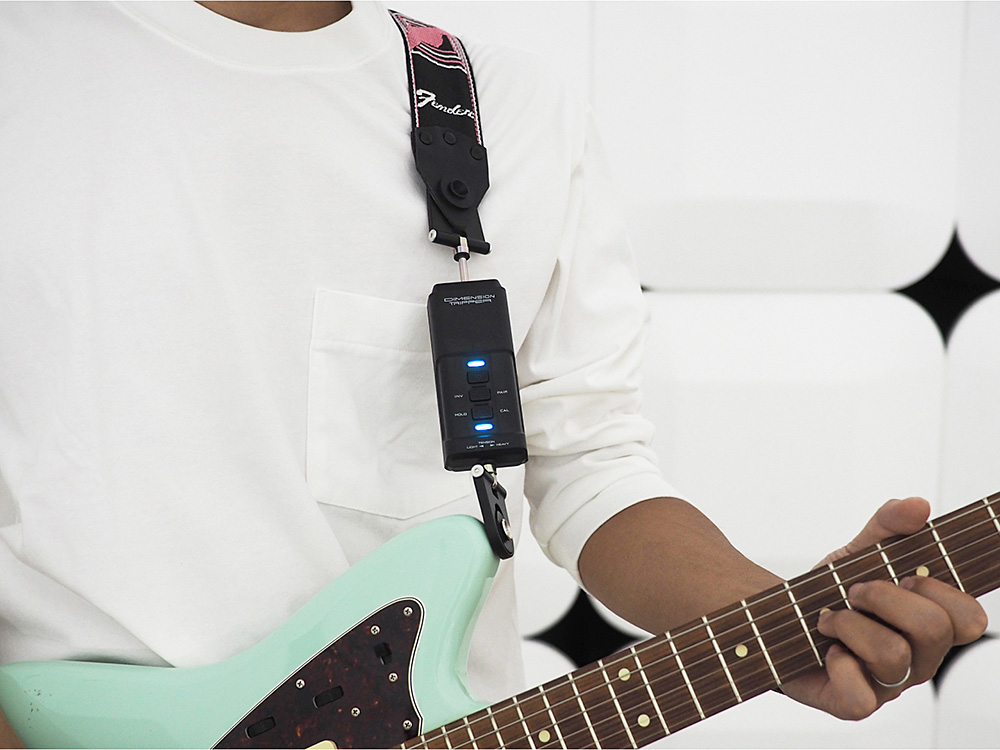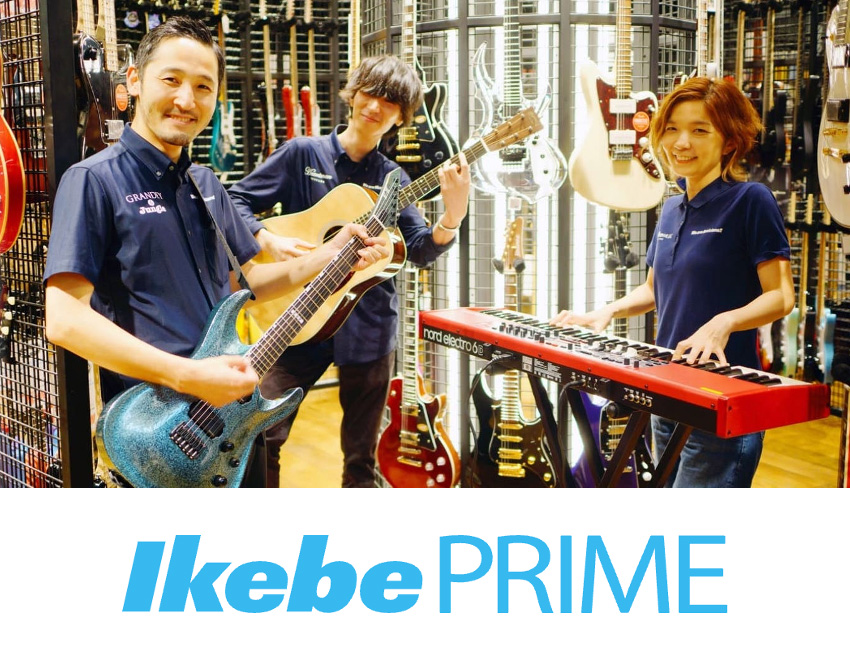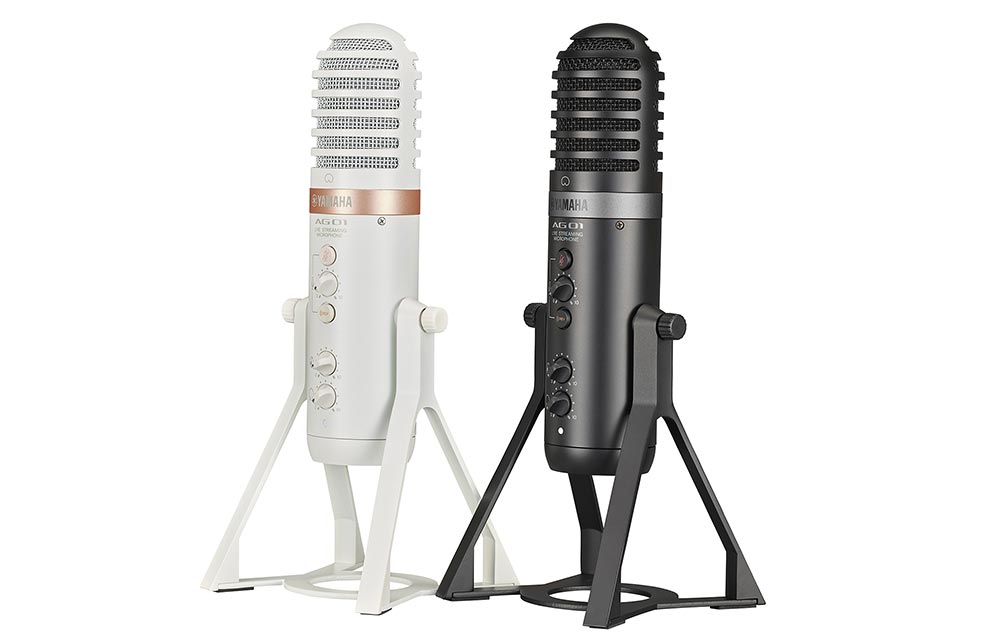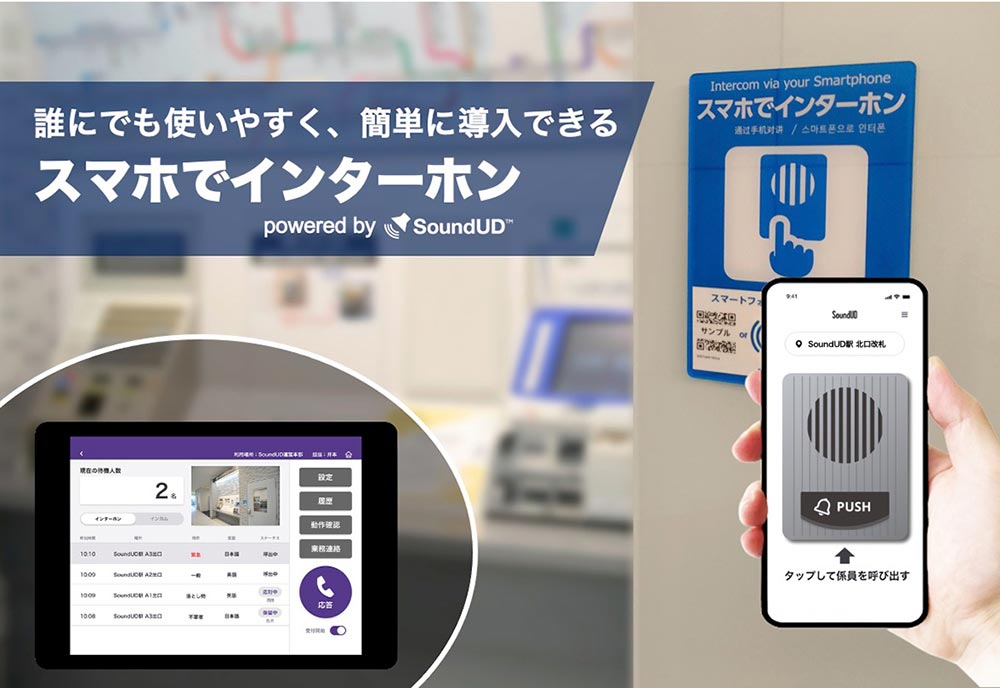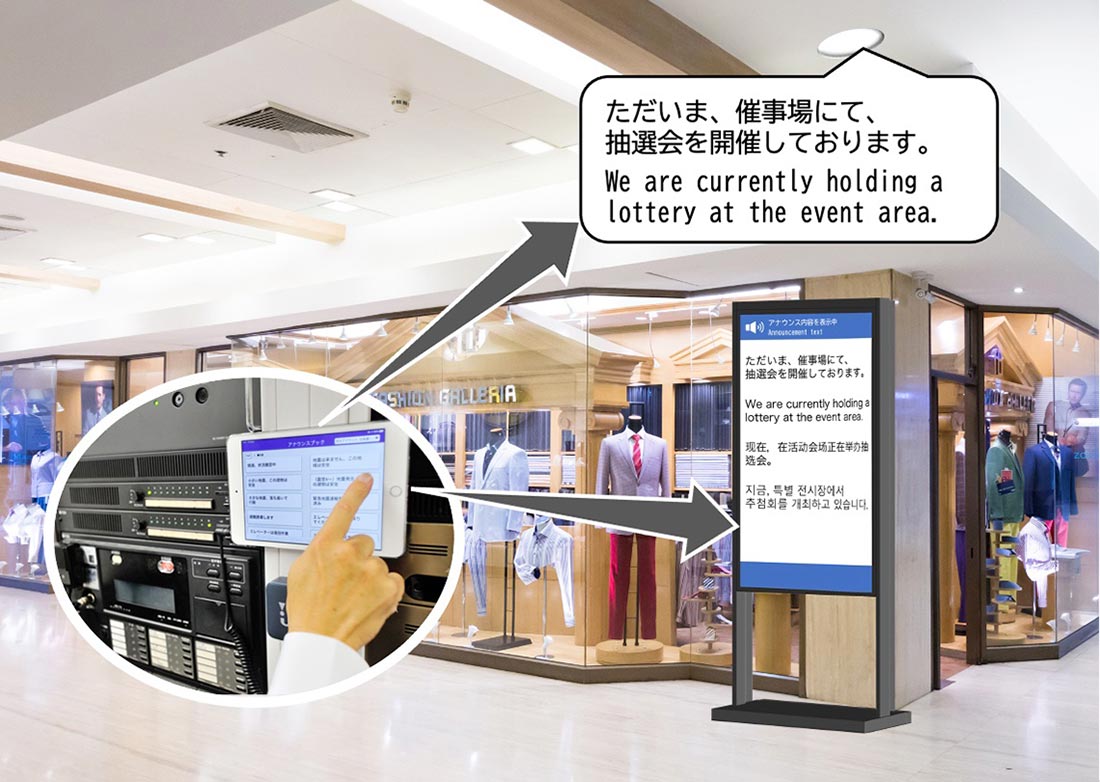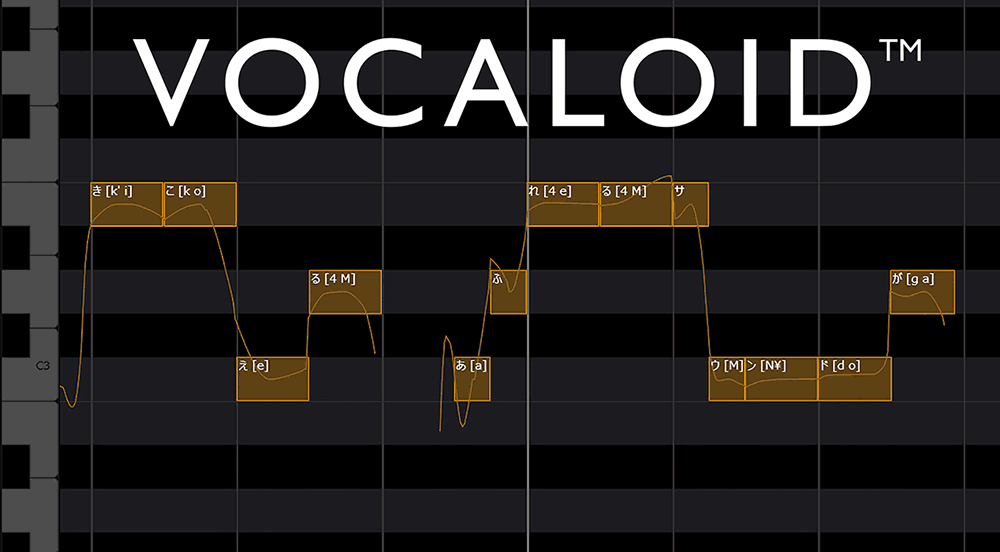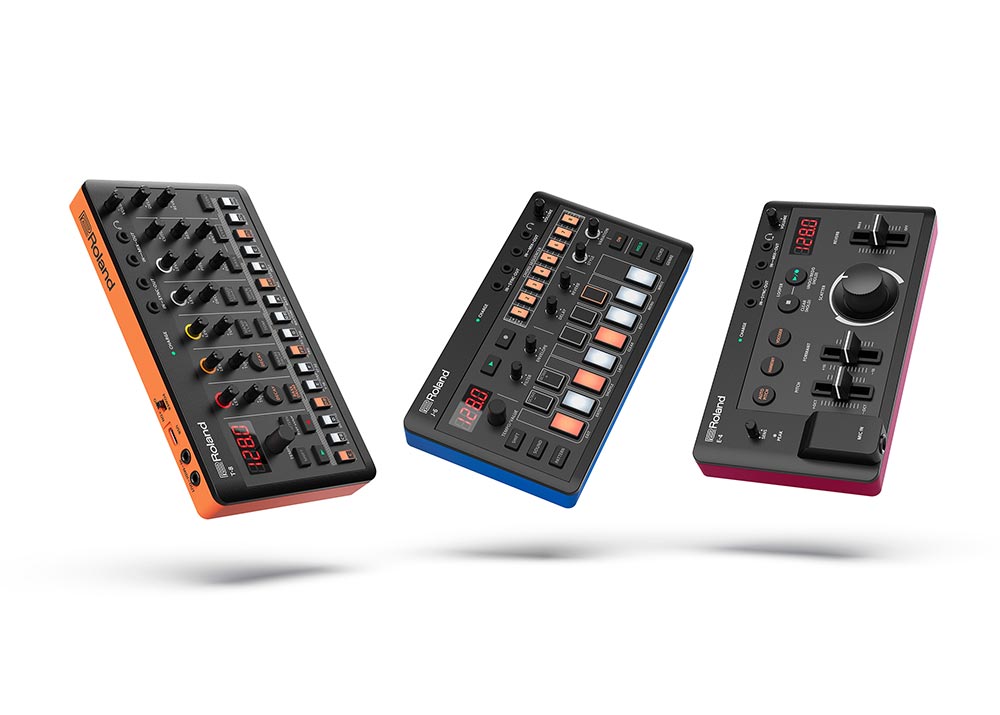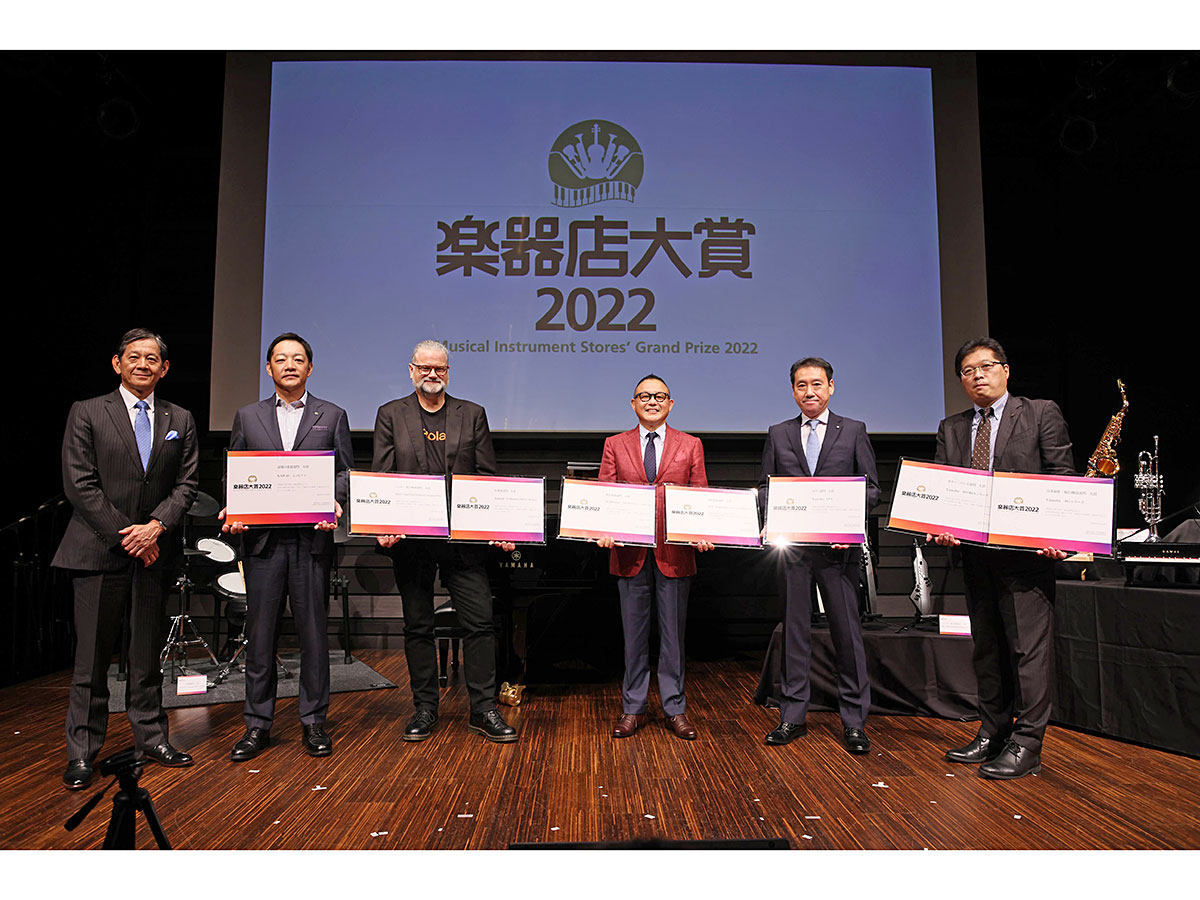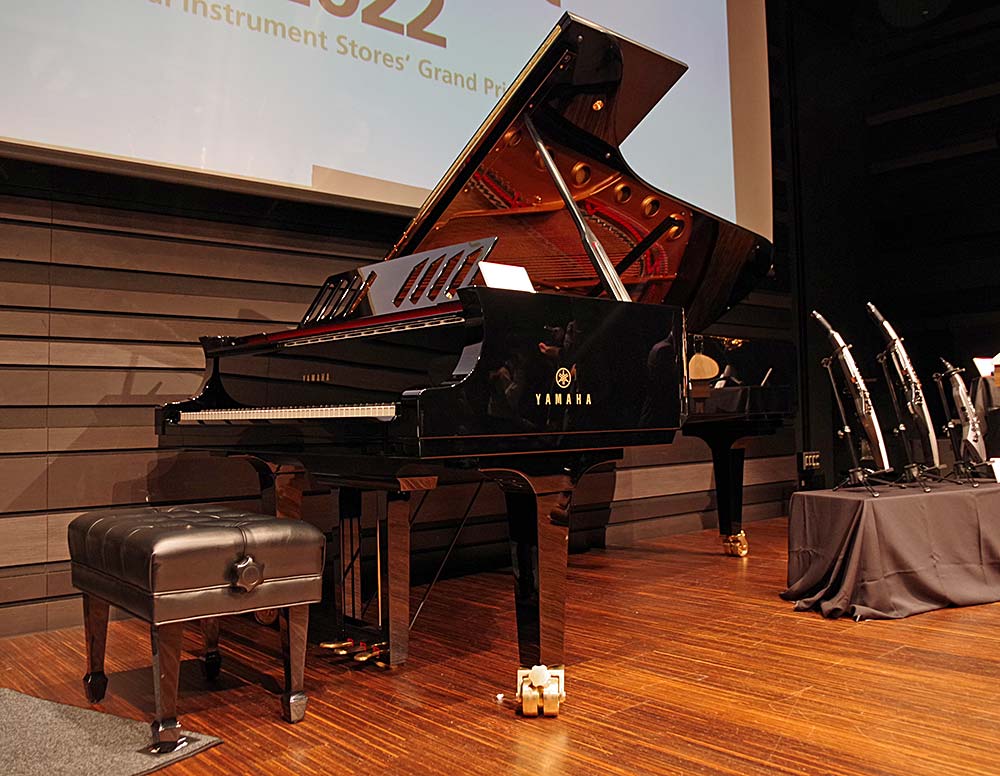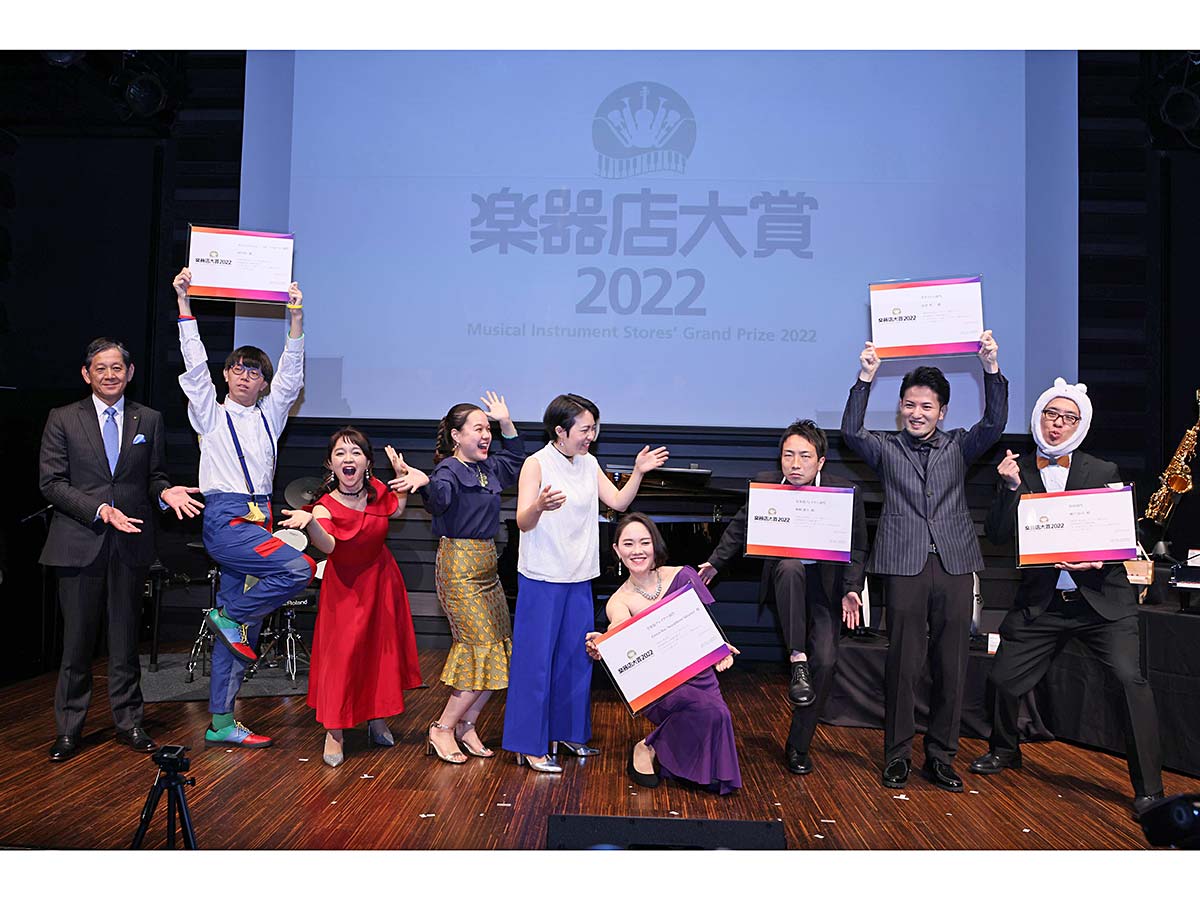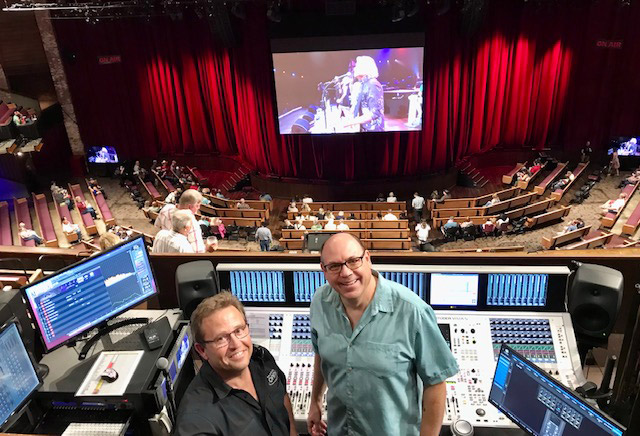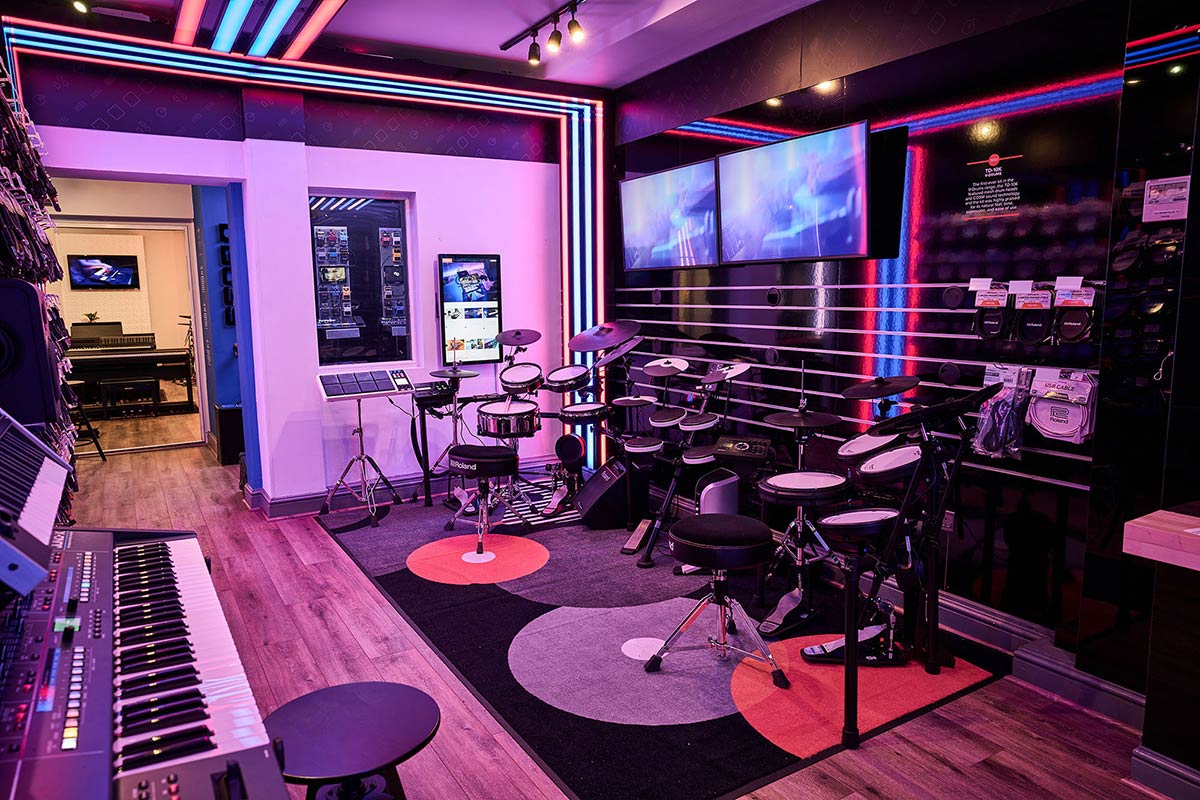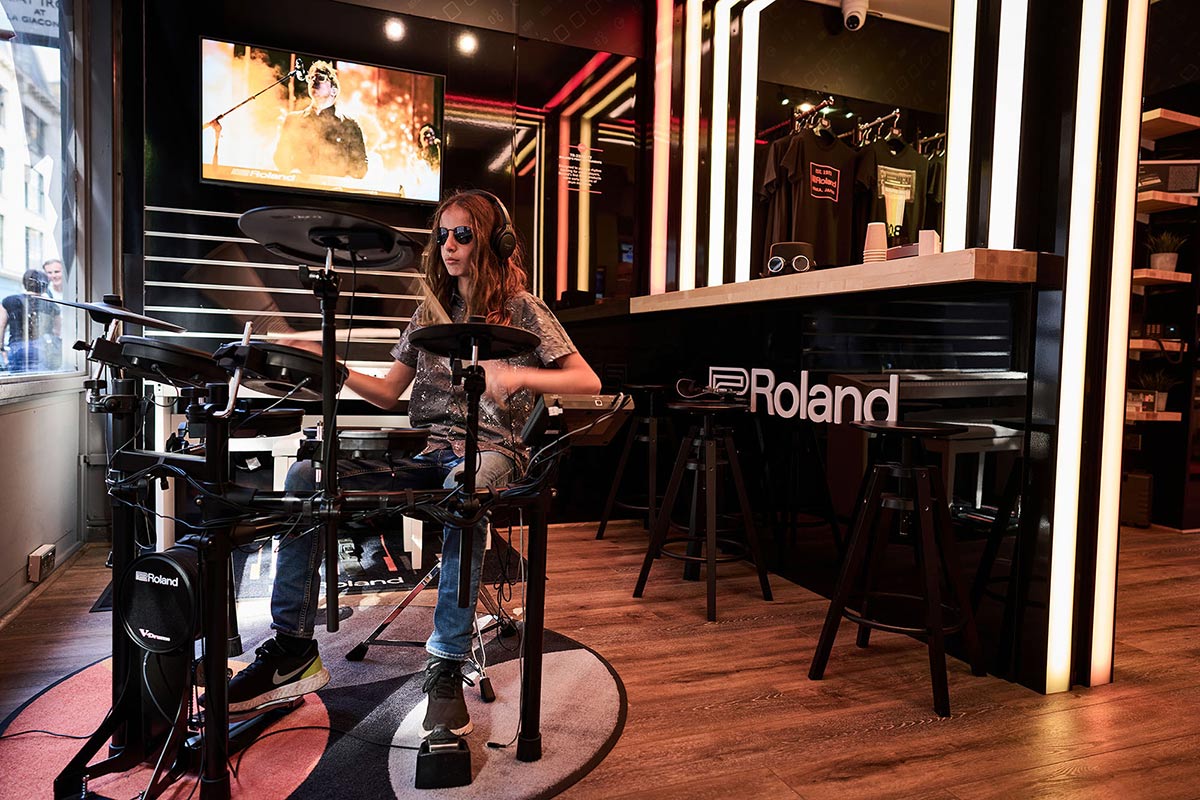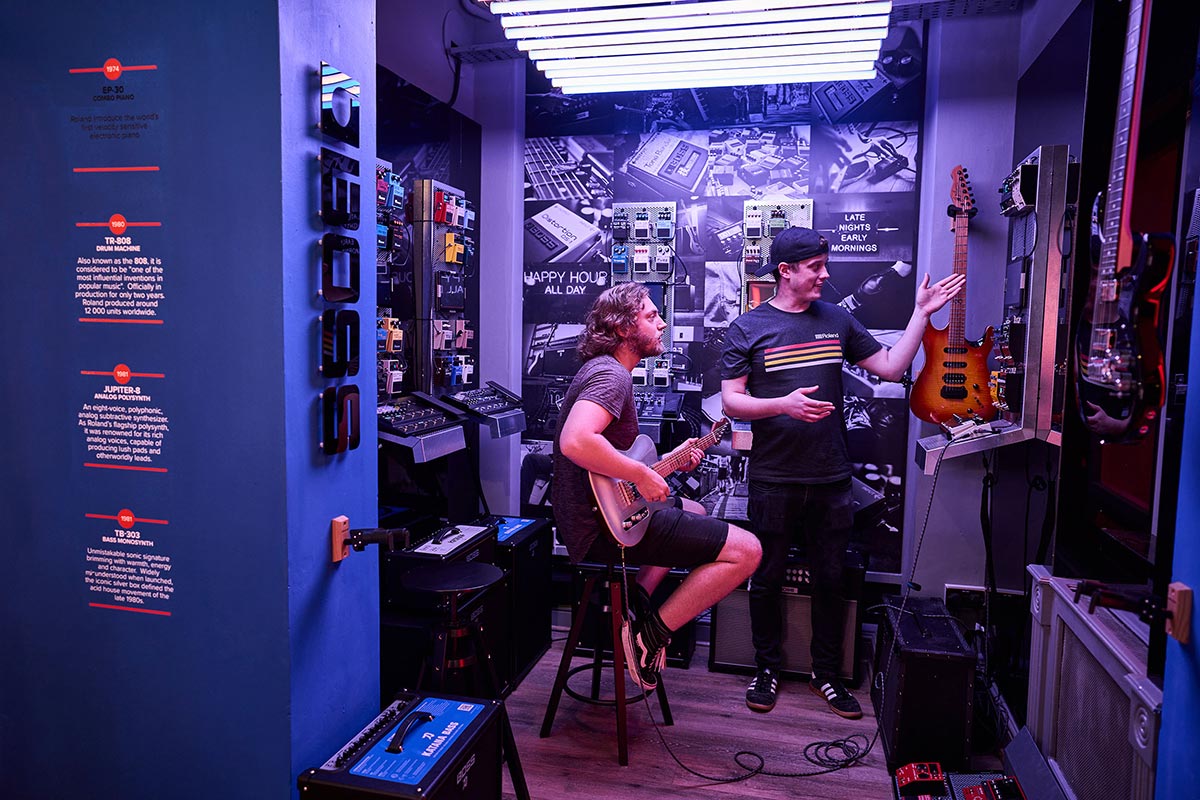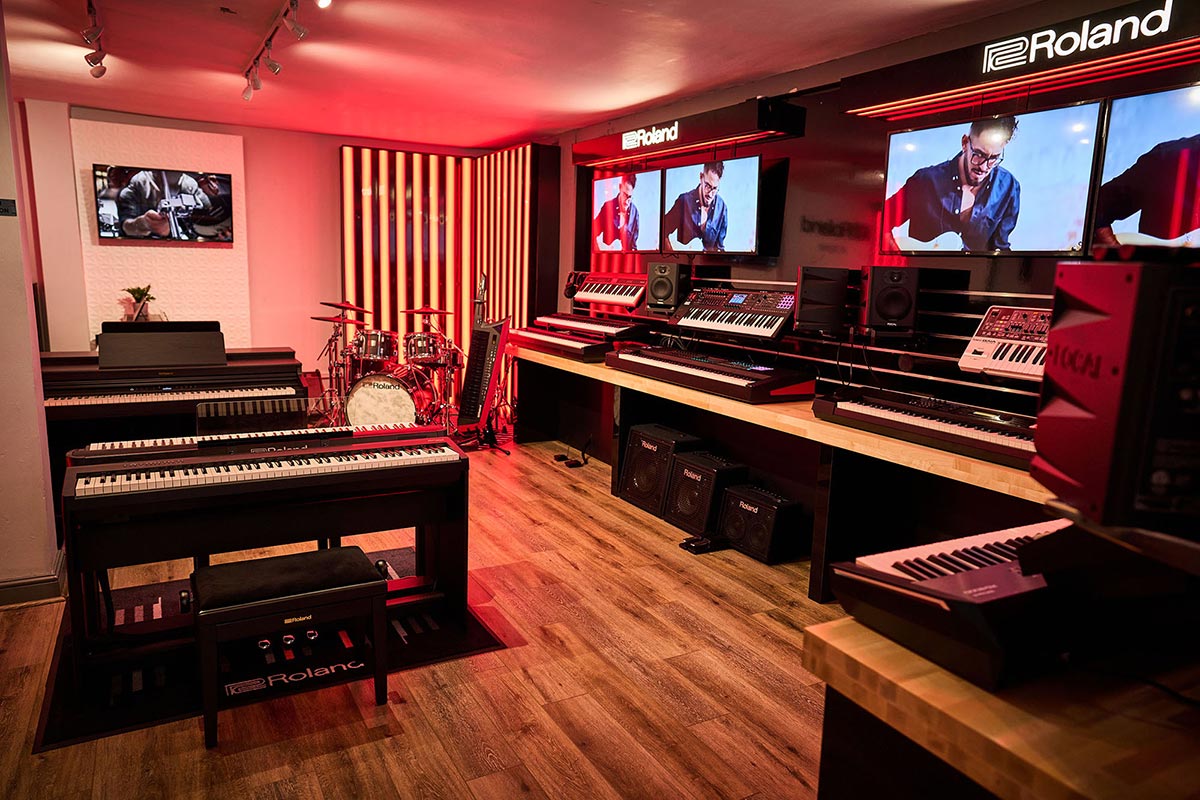Music product trade magazine JAPAN MUSIC TRADES
JMT Web NewsINDUSTRY TOPICS
“Musical Instrument Stores' Grand Prize 2023” vote by Music Store Sales Staff
Musical Instrument Stores' Grand Prize 2023 recipients and products voted by music store sales staff throughout Japan and general music fans were announced on October 23. Japan Musical Instruments Association (JMIA) started the project in hopes of promoting music making and helping support music retailers 3 years ago. It has become an annual all-industry program.
This year 5 Products, 6 Artists and one Music-related Production categories were open for entry, and 3,346 music store sales staff and 29,799 general music fans voted.
The grand prix awards winners:
Products
*Digital Piano & Electronic Keyboard: Casio Privia PX-S7000 digital piano
*Flute: Muramatsu HANDMADE DS MODEL flute
*Guitars: Yamaha PACIFICA611VFM electric guitar, and Yamaha BB Series electric bass
*Violin: Eastman VL80 violin
2nd place winners:
Digital Piano & Electronic Keyboard: Kawai CA401 digital piano, Flute: Muramatsu flute HANDMADE EX MODEL, Guitar & bass: Yamaha PACIFICA112V, Yamaha TRB/TRBX Series, Violin: Gliga/Gliga Gems
3rd place winners
Digital Piano & Electronic Keyboard: Yamaha Clavinova CLP-775, Flute: Yamaha YFL-517 professional flute, Guitar & bass: Epiphone Les Paul Custom/Ebony, Bacchus Global Series-WL4-STD/RSM
Music-related Production
*Bocchi the Rock! (a serialized anime comic)
2nd place winner: BLUE GIANT (anime comic)
3rd place winner: Ao-no Orchestra (Blue Orchestra, anime comic)
Artists
Takuma Ishii (Takuon, piano), Kaho Iwasaki (flute), Ayasa (violin), Marco (Yome-to-Ore, guitar), Hama Okamoto (Okamoto’s, bass), Ryo Kanda (drums)
Comments of the manufacturers of the awarded products
“It’s a great honor that Privia PX-S7000 won the 2023 Grand Prix award. We developed the instrument under a new product concept, ‘lifestyle piano.’ It’s a digital piano with exceptional quality in design and functions. A host of business partners including Hayato Sumino, Privia Ambassador kindly sent us warm words of congratulations.”
Yoshinori Kawai, Senior General Manager, Domestic Sales Division, Global Marketing Headquarters, Casio Computer Co., Ltd.
“We appreciate very much that Muramatsu HANDMADE DS MODEL received the 2023 Grand Prix Award. It’s a standard type drown hole silver flute, but we have built it with exceptional mechanism and the best conceivable pad placement technique to maximize tonal advantages of the instrument.”
Akihiro Urano, Director, Sales General Manager, Muramatsu Inc.
“As live concerts return, and the popular animation movie inspired the interest in playing guitar, demands of electric guitar increased especially among senior high-school students. We are proud that Yamaha PACIFICA611VFM was chosen as the best instrument by the music store sales staff.
“It’s a middle class instrument, a little expensive than entry models with rich specifications exceeding price.
“BB Series has been the principal line of Yamaha basses supported by top artists for more than 40 years. They are filled with the thoughts of the developers and have continuously progressed serving the needs of the times. We really appreciate the support of the music store sales staff.”
Takashi Tasaka, Division Manager, LM Division, Yamaha Music Japan Co., Ltd.
“We are very excited that the honorable 2023 Grand Prix Award was given to Eastman VL80. Our major object has been to increase as many violin players as possible in the last 25 years. It’s great to share the honor with craftsmen team at Eastman.”
Kenzo Hayashi, president, S. I. E. Co., Ltd.
December 2023 New Products Launch
Yamaha P-525B, P-525WH digital pianos
https://www.yamaha.com/ja/news_release/2023/23101901/
Korg modwave mkII synthesizer
https://www.korg.com/jp/products/synthesizers/modwave_mk2/
Pearl MIDTOWN Series MT564/C-D drum set
https://www.pearldrum.com/ja/products/drum-sets/midtown-series/midtown-series/
Pearl Eliminator Redline Transport “LT” drum pedal with anello pack
https://pearldrum.com/ja/drums-news/53003496/
DW DWe convertible drum set
https://www.dwdrums.com/dwe/
Korg MPS-10 Drum/Percussion/Sampler Pad
https://www.korg.com/jp/products/drums/mps10/
ESP BanG Dream ULTRATONE Anon, POTBELLY FM Rana, POTBELLY PM Rana, GB Soyo electric guitars, ESP S-70 MyGo!!!! guitar strap
https://espguitars.co.jp/collaborate/33185/
O.Z.Y SNAPPER TAKMIY Custom electric guitar
https://espguitars.co.jp/artists/3311/
Edwards E-SNAPPER TO Eclipse Gold, E-SNAPPER TO Royal Silver electric guitars
https://espguitars.co.jp/artists/3451
Line 6 HX-One effect pedal
https://line6.jp/hx-one/
Boss DS-1-B50A, SD-1-B5OA, BD-2-B5OA 50th Anniversary effect pedals
https://www.boss.info/jp/boss-50th-anniversary/
Boss RV200 effect pedal reverv
https://www.boss.info/jp/products/rv-200/
Steingerg Cubase Pro 13, Artist 13, Elements 13 music production software
https://www.yamaha.com/ja/news_release/2023/23110601/
Steinberg Nuendo 13 DAW software
https://www.yamaha.com/ja/news_release/2023/23111601/
Yamaha VOCALO CHANGER PLUGIN
https://www.yamaha.com/ja/news_release/2023/23101801/
Korg Keystage MIDI controller
https://www.korg.com/jp/products/computergear/keystage/index.php/
Korg KAOSS Replay stand-alone performance tool
https://www.korg.com/jp/products/dj/kaoss_replay/index.php/
Yamaha HS4-/HS4W, HS3/HS3W studio monitors
https://www.yamaha.com/ja/news_release/2023/23111501/
ESP PA-GS15SD-20thguitar pick
https://espguitars.co.jp/productinfo/35016/
STELLA GEAR SG-P-LikeanAngele2023 guitar picks
https://espguitars.co.jp/productinfo/35018
Righton strap
https://www.kikutani.co.jp/itemlist/43859/
Pearl with anello stick bags and crossbody bags
https://pearldrum.com/ja/drums-news/5300349/
Roland Constructs New Headquarters Bldg. in Hamamatsu

Roland announced that the company would commence construction of a core R & D facility in Hamamatsu where its headquarters are located in August 2024.
Roland has expanded development and manufacturing facilities in Hamamatsu and delivered a host of Roland innovative digital music products to the world markets since 1973. In 2005, the company decided to move its corporate headquarters from Osaka to Hamamatsu (Hosoe factory) to continue business as a manufacturer based in Hamamatsu.

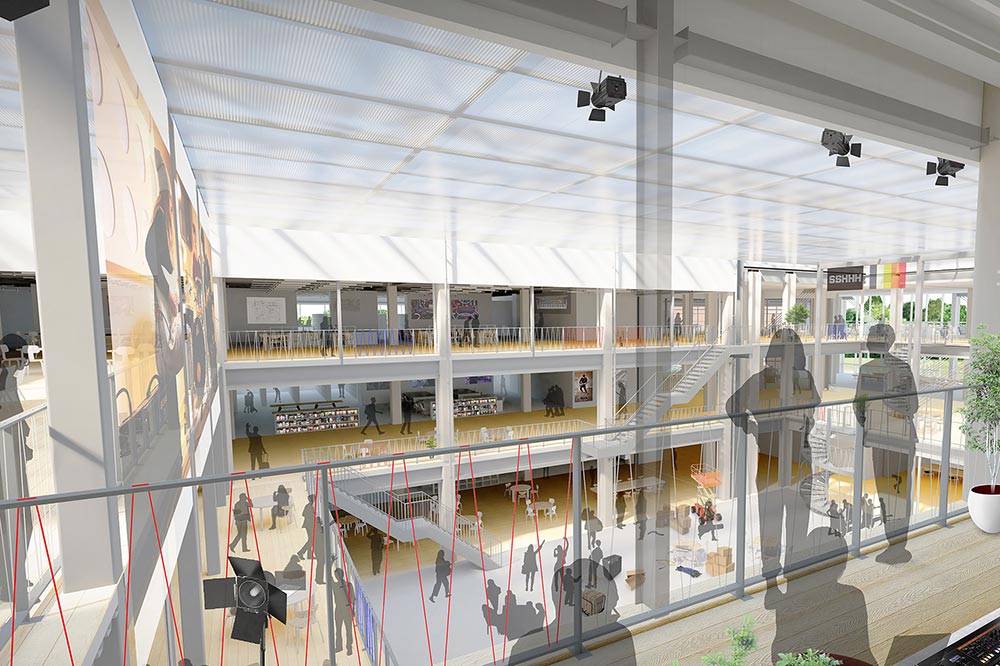
The construction plan is an expansion of Shin-Miyakoda production base efficiently connecting the existent 2 buildings to make it a circular structure with Roland Circuit including an atrium, and Roland Arena at the center used for multi purposes. The new structure contributes to save construction resources and provides the company employees with upgraded work environment as well as flexibility, and sustainability of the entire facilities.
The new headquarters building will accommodate Roland’s every R&D division under one roof now located in several factories in Hamamatsu area.
Kawai Europe Opens Subsidiary in Poland
Kawai announced that it had opened a subsidiary in Warsaw, Poland on September 1. So far, the company distributed Kawai products through a local import agent. Kawai expects to strengthen marketing of Kawai pianos for academies, music schools and Kawai artists through the own subsidiary.
Warsaw has a rich musical tradition and is known as the place where Chopin International Piano Competition, one of the three major piano competitions in the world takes place. Kawai Warsaw subsidiary has a 120-seat concert hall in addition to a spacious showroom where broad line-up of Kawai pianos including Shigeru Kawai flagship models are displayed.
Yamaha Music Japan and Yamaha Music Retailing Merge
Yamaha announced recently that Yamaha Music Japan and Yamaha Music Retailing, domestic distribution and retailing companies would merge on April 1, 2024.
It’s part of the corporate transition program changing domestic distribution and retail units to an integrated business connecting Yamaha dealers, direct shops, and music studio operation providing customers with products of eminent brand and uncomparable shopping experience.
The business integration is also expected to bring much improved marketing and overall operation by consolidated human resources and established business know-hows under one roof, and flexible response to changing social environment and customer needs.
November 2023 New Products Launch
Bösendorfer Tree of Life grand piano
https://www.yamaha.com/ja/news_release/2023/23100401/
Kawai CA901A digital piano
https://www.kawai.jp/product/ca901/
Yamaha MONTAGE M6, M7 &M8x synthesizers
https://www.yamaha.com/ja/news_release/2023/23101002/
Roland GAIA 2 synthesizer
https://www.roland.com/jp/products/gaia_2/
Osawa BC Triplet I ocarina
https://www.prima-gakki.co.jp/catalog/osawaocarina/
Pearl Crystal Beat 50th Anniversary Limited Edition drum set
https://pearldrum.com/ja/drums-news/53002916/
ESP Jimmy CAT & Jimmy CAT-CTM electric guitars
https://espguitars.co.jp/productinfo/34541/
StellaGear GLAMBELLY GUITAR GOOD VIBES electric guitar
https://espguitars.co.jp/product/34377/
Zemaitis MFV22 electric guitar
http://www.zemaitis-guitars.jp/metal_front/mtv22_black.html/
Grass Roots G-AMAZE-DX/LS Pelham Blue electric bass
https://espguitars.co.jp/product/32207/
Blitz BLP-SPL/DC electric guitars
http://www.ariaguitars.com/jp/items/electric-guitars/blitz/
Kiwaya KCU-2C, KCU-2C/AG-uke, KTU-2C, KTU-2C/AG-uke ukuleles
https://www.kiwayasbest.com/shopbrand/ct454/
Boss KATANA-AIR EX guitar amplifier
https://www.boss.info/jp/products/katana-air_ex/
Steinberg UR22C RD, GN, UR44C RD, UR22C RD Recording Pack USB audio interface
https://www.yamaha.com/ja/news_release/2023/23101102/
Roland SP-404MKII Stones Throw Limited Edition sampler
https://www.roland.com/jp/promos/sp-404mk2_stones_throw/
Korg DC-P2-SMX dust cover for digital piano
https://www.korg.com/jp/products/accessories/dc_p2_smx/
Aria Pro II UGP-80-ULTRA GUITAR POLISHwww.ariaguitars.com/jp/items/accessories/care-spraycloth/guitar-polish/ugp80/
Casio Starts Crowdfunding for Manufacturing New Guitar Effect Processor
Casio Computer announced development of DIMENSION TRIPPER, a guitar effect processor to be put on guitar strap to alter guitar sound and is raising funds through GREEN FUNDING crowd funding site from October 12 through the end of November.
The company plans to raise 7.45 million yen asking supporters 35,200 yen per single set.
Wireless DIMENSION TRIPPER was developed by three Casio engineers/ guitar freaks, and it comes with a transmitter to be put on guitar strap and a receiver to plug with the effect processor.
While playing, guitarist can control effects level simply by pulling a spring of the transmitter put on the strap.
Coupled with foot-controlled volume pedal or expression pedal, guitarist can enjoy versatile tonal color not obtainable from conventional effects processor.
Ikebe Gakki Starts New Subscription Customer Service
Tokyo-based Ikebe Gakki Co., Ltd. announced that it had started a new and exclusive subscription style customer service named “Ikebe PRIME.”
Consisted of Ikebe Online Store, Ikebe Reuse and Ikebe Entertainment categories, the new service is provided at 1,200 yen monthly subscription (no charge for the first month after registration). The service gives customers of Ikebe Online Store 5 benefits; 1. Free shipping of goods, 2. 1% additional purchase points, 3. Additional 10% trade-in points at Ikebe Reuse, 4. Free view of Ikebe live events, instrument lesson and entertainment movies, 5. Advanced reservation rights for Ikebe events, workshops, seminars and customer exclusive events.
2023 Japan Good Design Awards
Japan Institute of Design Promotion announced recipients of 2023 Good Design Award.
From the music products industry Yamaha YH -L700A, YH-E700B and YH-5000SE headphones, CK61 stage keyboard, CS-800/500 video collaboration systems and “Oto Baton” (Sound Baton) musical instruments trade-in service, Roland SPD-SX PRO sampling pad and AlphaTheta OPUS-QUAD standalone DJ system were awarded.
Yamaha YH-L700A was chosen among Good Design100 Best 100 Products which are awarded to the products with higher design excellence.
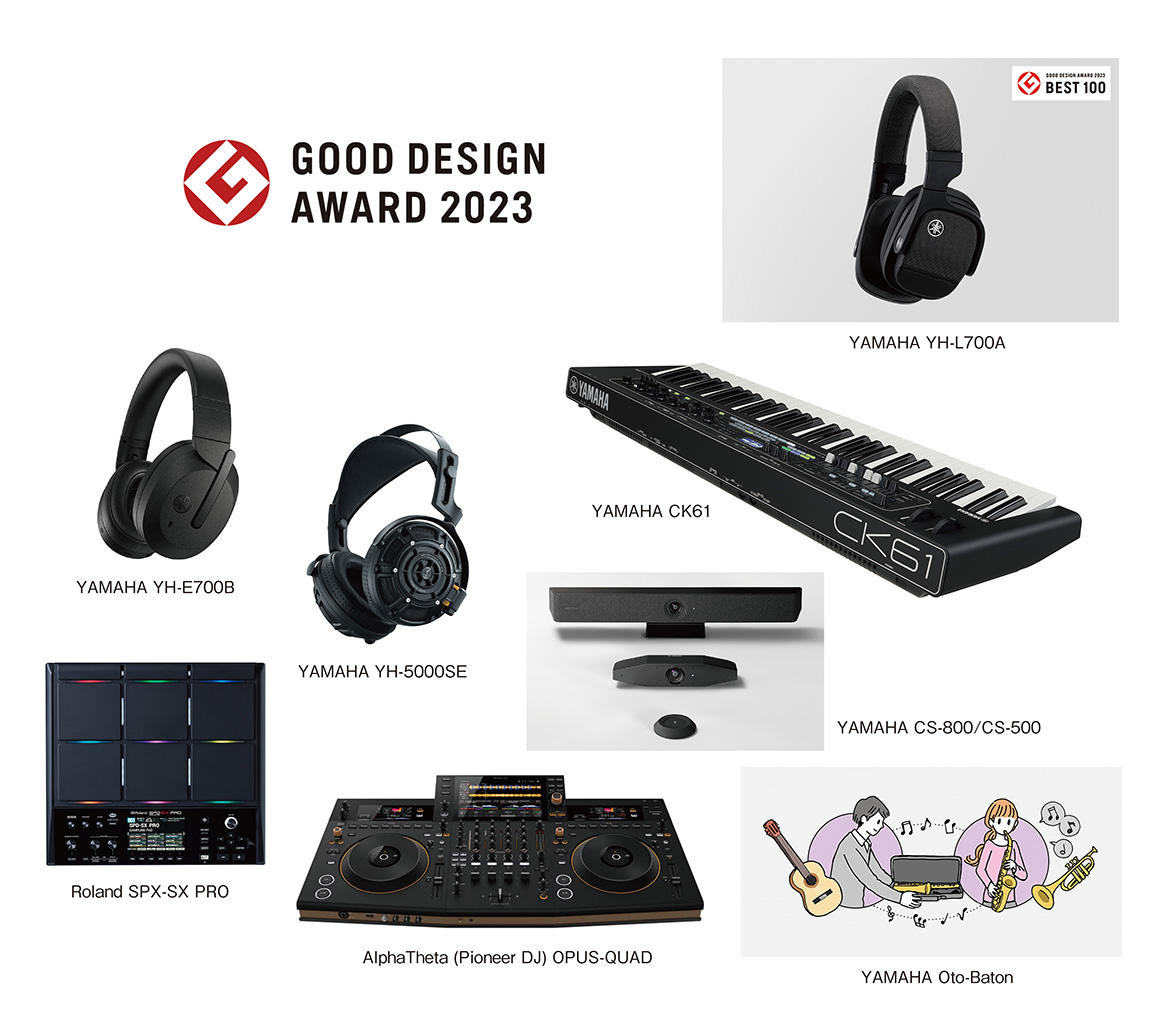
Yamaha Music London Reopens
Yamaha Music Europe announced recently that Yamaha Music London, flagship store/showroom in Europe reopened on October 12.
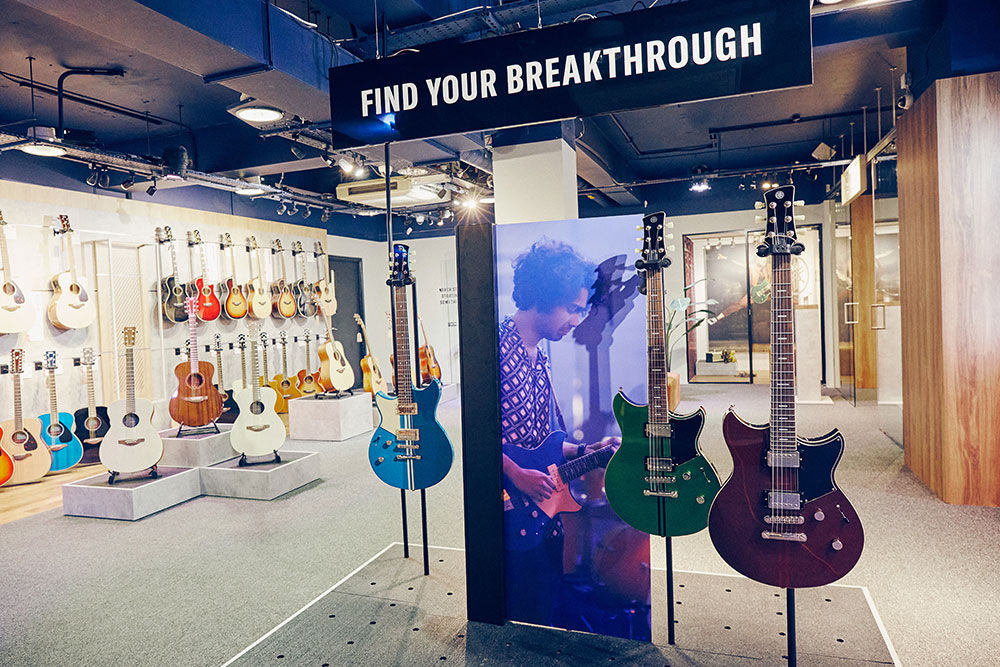
Initially opened in 2007 on Soho, London, the store was reborn as a place where everyone from professionals to general music fans can experience Yamaha brands and pleasure of music repeatedly in Inviting, Inspiring and Experiencing environment.
The 1st floor invites non-music makers to casual atmosphere and experience equipped with a wide variety of entry models of Yamaha music products including the largest selection of digital piano in Europe. It also has a new AV gaming area to experience high quality Yamaha sound products, and an event site with a performance stage.
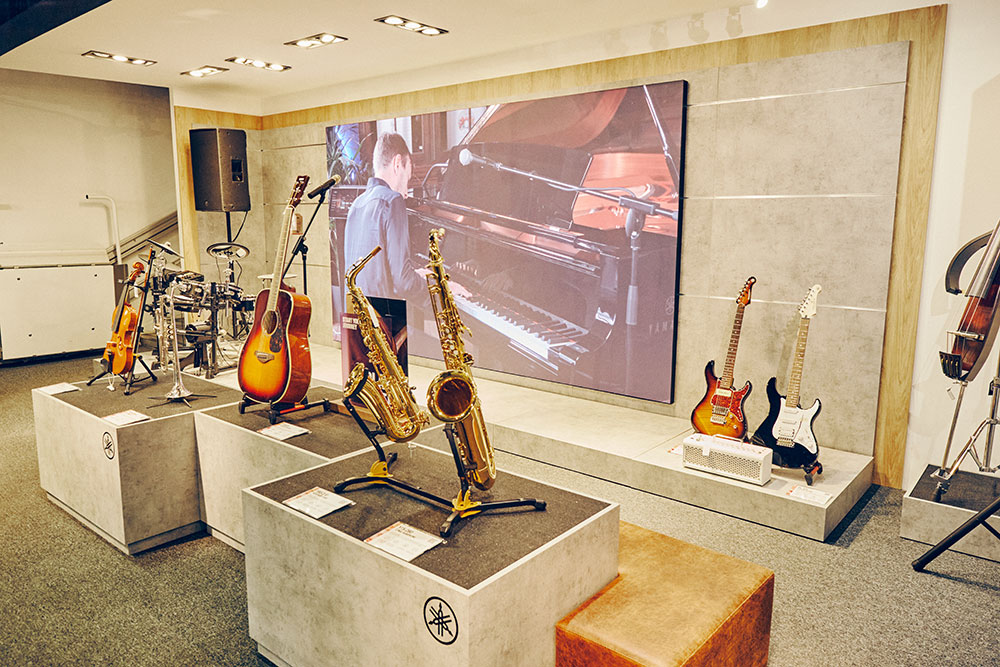
The basement was redesigned to an exclusive guitar floor showcasing 170 Yamaha guitars, and the second floor much favored for its classical photogenic interior design accommodates around 30 units of acoustic Yamaha and Bösendorfer pianos to experience their sound.
The store employs a new entry system using Yamaha Music ID, and provides visitors with a shooting booth for needs of posting their performance on social media.
In celebration of the reopening, the store held Disklavier remote live piano concert connecting Yamaha Ginza store and the London store online on October 6 delivering piano music played by 2 pianists.
Obituary
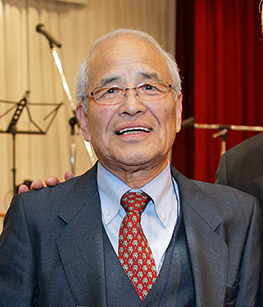
Tsutomu Hosokawa (1938 – 2023)
Tsutomu Hosokawa, founder, and consultant of Nagoya-based HOSCO Inc., distributor of acoustic and electric guitars, ukuleles, guitar parts and accessories passed away on September 10 at the age of 85.
Hosokawa launched Saga Japan as a Japan office of Saga Musical Instruments. U.S., in 1983, and the company changed the corporate name to HOSCO Inc. in 2007.
Shinji Hosokawa, son of Tsutomu now serves as president of the company.
October New Products Launch
Yamaha NU1XA、NU1XAPWH AvanGrand hybrid pianos
https://www.yamaha.com/news_release/2023/23091301/
Yamaha Disklavier ENSPIRE upgrade units
https://www.yamaha.com/news_release/2023/23083001
Kawai GP44 grand piano style miniature piano
https://www.kawai.co.jp/news/20230824/
Hammond M-solo 49-key drawbar keyboard
https://www.suzuki-music.co.jp/products/65791
Yamaha FGDP-50, FGDP-30 finger drum pads
https://www.yamaha.com/news_release/2023/23090501/
Killer KG-Fascist '23, KG-Fascist Vice Milky Way '23 electric guitars
https://www.killer.jp/guitar/kg-fascist-23.html/
https://www.killer.jp/guitar/kg-fascist-vice-milky-way-23.html/
Edwards E-MYSTIQUE electric guitar
https://espguitars.co.jp/productinfo/34019/
Grass Roots G-SN-CTM/P Blond electric guitar
https://espguitars.co.jp/product/34710/
Boss NS-1X noise suppressor
https://www.boss.info/jp/products/ns-1x/
ESP PA-LMidori10-2 (LOVEBITES/midori) guitar pick
https://espguitars.co.jp/accessory/11286/
ESP FES POUCH
https://espguitars.co.jp/productinfo/34086/
Nonaka saxophone case
https://www.nonaka.com/information/detail.jsp?id=62845/
Kiwaya HCK ukulele cases
https://www.kiwayasbest.com/shopbrand/ct372/
Tokyo Gakki (Musical Instruments) Expo 2023 Takes Place in November
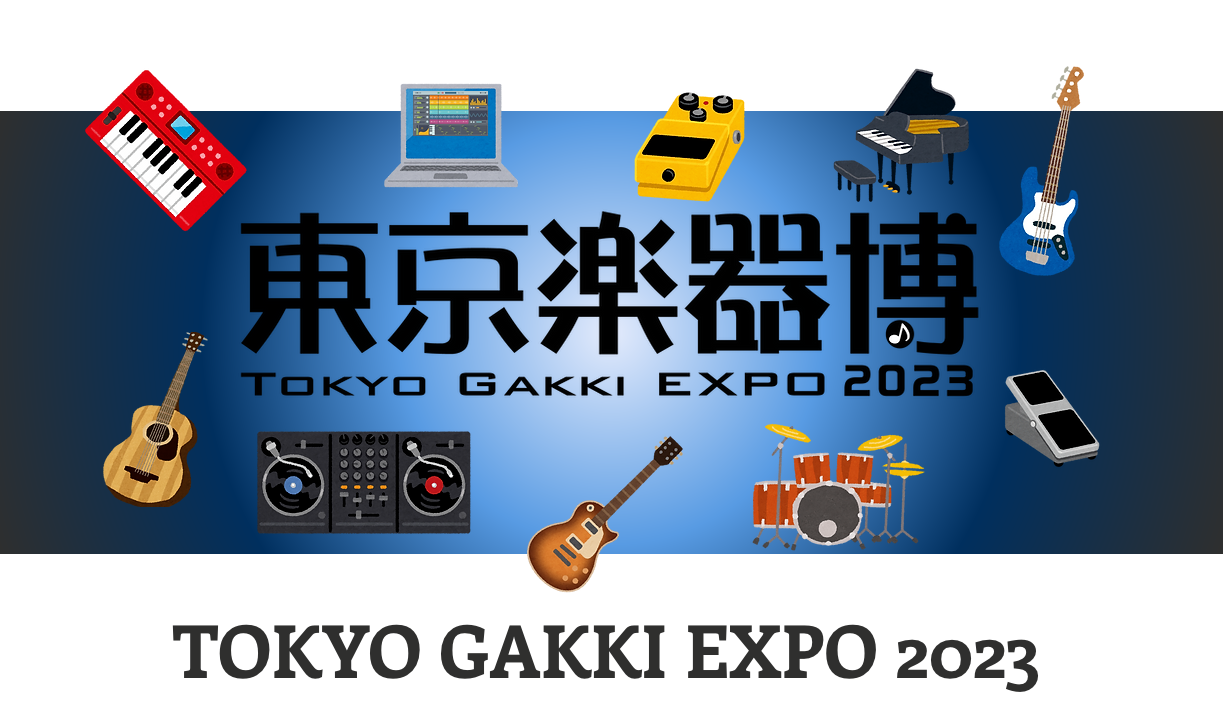
Tokyo Gakki ( Musical Instruments) Expo Steering Committee holds Tokyo Gakki Expo 2023, the first event providing visitors of all age groups with musical experience to increase music making population on November 11 and 12 at Kitanomaru Science Museum under patronage of Japan Musical Instruments Association. Japan Synthesizer Professional Arts provides management and production services of the events.
The first-time music makers are encouraged to experience a wide range of digital musical instruments including synthesizers, DJ equipment, guitars and amps, effect processors, acoustic and digital drums offered by more than 30 manufacturers and distributors.
In addition to products presentation, the event offers workshops and live stage performance by professional artists.
The organizer expects to make it an annual event adding more music genres in coming years.
Yamaha Opens Music Experience Brand Shop in Yokohama

Yamaha Corporation, Yamaha Music Japan Co., Ltd. and Yamaha Music Retailing Co., Ltd. opens Yamaha brand shop of which official name will be announced later at Yokohama Sympho Stage Minato Mirai21 to be completed in March 2024.
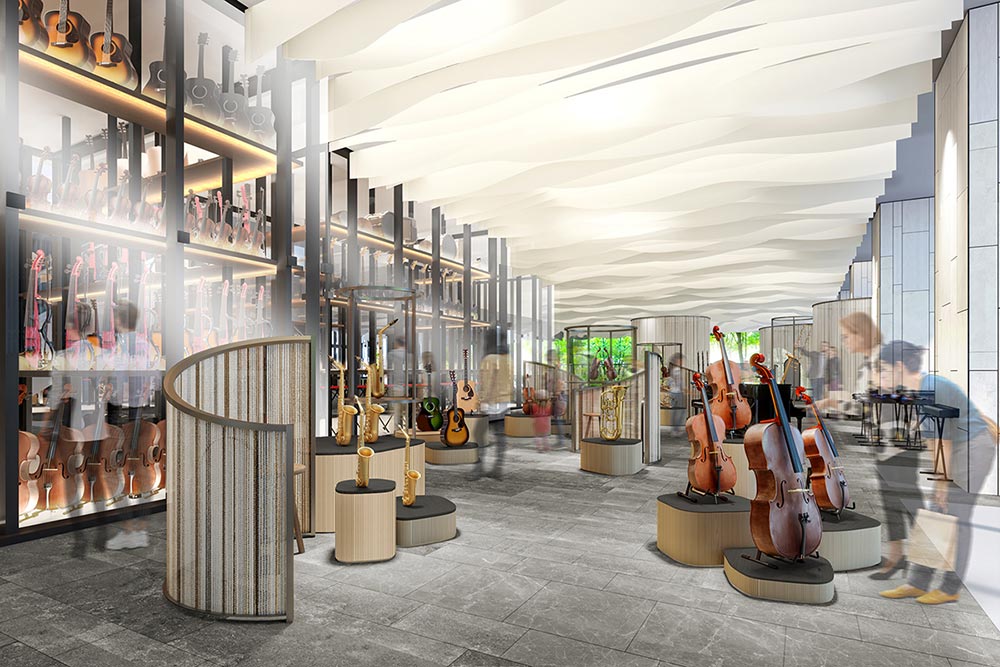
Sharing about 2,600 sq. meter space on 1st, 2nd and 3rd floors of the site, it provides brand experience space equipped with a large screen and Yamaha and Bösendorfer piano showroom on the 1st floor. The 2nd floor is allocated for every type of musical instruments ready to experience, printed music and books as well as a café with a small stage for live performances. There will be music lesson classes for adults and a music salon. (floors images: 2nd floor, top and lobby area on the 3rd floor.)

In line with the opening of the new brand shop, Yamaha Music Yokohama, Music Avenue Yokohama, Yamaha Music Pianoforte Kami-ohoka and Bösendorfer Tokyo Showroom will be closed 2024 Spring, and retail businesses, piano showroom and music lesson studios will be transferred to the brand shop.
eBay Music Products Marketplace Grows
Growing demands for Japan brands
eBay recently announced that its marketplace for musical instruments was quite busy attracting buyers. It says that musical instruments business significantly increased as people spent more time and money for music making at home during the recent pandemic. The musical instruments market grew 50% from the pre-pandemic days and continues to grow.
From 80,000 to 100,000 musical instruments and related accessories are regularly listed on the eBay marketplace. Electric guitars are particularly popular, and demands are further growing for vintage, out of production models and replicas of name guitarists.
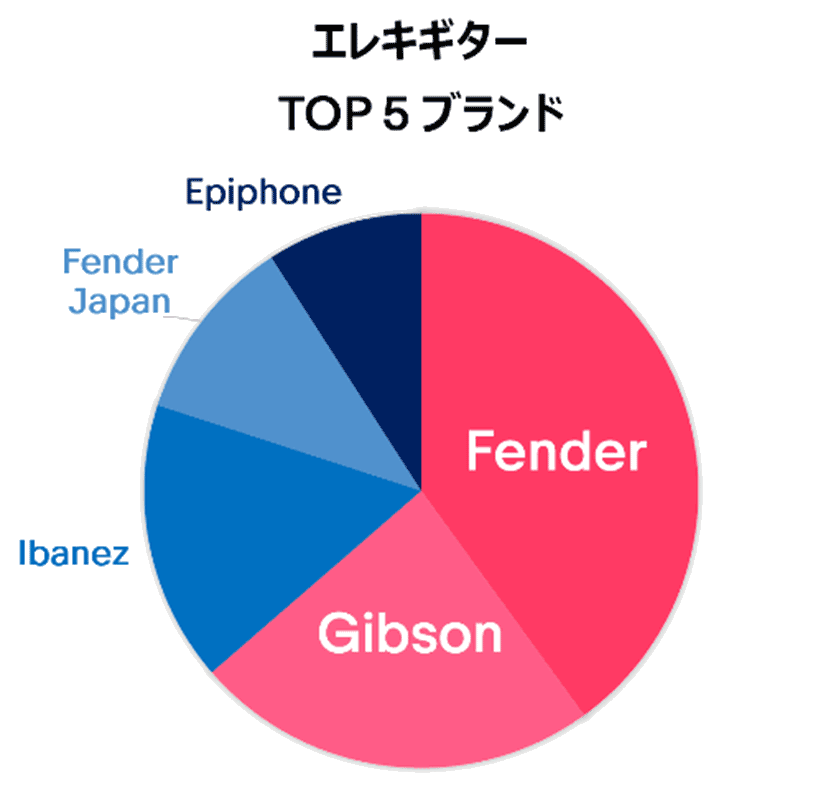
U.S. made guitars are much sought after, but some buyers in U.S like to buy guitars listed by Japanese sellers, as they say, “Goods listed by Japanese sellers are in better conditions”, or “The goods are sent from Japan in much sturdy shipping package.” (graph right: high demands for 5 electric guitars)
Acoustic guitars constantly sell well as demands continue for entry level acoustic guitars. It’s supposed that young consumers bought inexpensive acoustic guitars during the pandemic and now sell them on the marketplace.
DJ machines are also selling well. They are bought as interior objectives, and 2022 sales doubled over the previous year. Such Japanese brands as Pioneer, Technics, Vestax and Denon are much favored. Because they are largely high-ticket models, current exchange rate of Japanese yen against U.S. dollars contributes to boost sales of them.
JMIA Completes 2022 Music Products Production (Sales and Export) Survey
JMIA (Japan Musical Instruments Association) sent a questionnaire to 84 manufacturers throughout Japan for the 2022 Survey and 54 of them participated sending back data online. Japan Music Trades complied the data and completed the following report adding commentary.
2022 Production significantly increased in value
The survey shows export value of keyboards, percussions, guitars, and digital musical instruments dramatically increased. The largest difference in comparison with the 2021 data was that the manufacturers reported export value far surpassed unit sales in many product categories. Among the 70 reported categories, in 24 categories, export value exceeded unit value over the 2021 survey in which only 7 categories were reported.
It’s largely attributed to the actuality that the manufacturers raised price of products in the last one or two years. Also, U.S. dollar strengthened against yen helped contributed to increase their revenue. In 2021 exchange rate of yen against US dollar was between 110 yen and 115 yen. A year later, yen significantly went down to the range from 130 yen to 140 yen. In October last year, yen further dipped to 150 yen, the lowest level in the last 32 years.
On the other hand, Japanese manufacturers were hardly hit by hike of transportation, energy cost and raw materials and parts caused by soaring oil price. That means increased revenue was offset by weaker yen. Currency trend continued after this past April, export increase seems to last into 2024.
Sound domestic sales of acoustic piano
Export and domestic sales of acoustic upright, grand and automatic player pianos increased 8% to 70 billion yen in 2022. Export and domestic sales of digital piano also went up 14% to 92.9 billion yen. Total piano sales shared 45%, the largest of all categories.
Last year 13,077 units of acoustic piano, a 9% increase over the previous year were sold in Japan with total sales of 7.8 billion yen, a 10% increase which exceeded 2019 before the pandemic sales.
Domestic acoustic piano sales included 9,744 upright pianos (+11%) and 3,276 grand pianos (+3%). Domestic sales and export of grand pianos and automatic player pianos increased between 5% and 60%, but upright pianos declined both in the domestic market and export by 4% and 17%, respectively. Export unit of upright pianos also decreased but increased in value.
182 thousand units of digital pianos, 16% fewer than the year before last were sold in Japan with total value of 13.4 billion yen, a 10% decrease. While export of digital pianos went down 11% to 1,358 thousand units, the total value gained 20% to 79.5 billion yen.
Domestic sales of electronic keyboard increased 21% to 192 thousand units as seniors became interested in the instruments again. Total value jumped up 35% to 3.1 billion yen.
Domestic sales of automatic player pianos and digital pianos went down in value last year.
Dramatic increase of wind instruments export
Total domestic sales and export of wind instruments achieved 35.5 billion yen and shared the largest 10% of the total categories. They increased 23% to 397 thousand units and 32% in value. The unit sales nearly recovered 400,000 units recorded in 2019.
Domestic sales increased 9% in value over the year before last, but unit sales declined 1% to 42,000 units.
Despite the instruments of almost all categories have not yet recovered the pre-pandemic level in unit, saxophone sales doubled to 19,000 units, the largest increase in the past 8 years gaining 1.89 billion yen, a 35% increase. It looks that exceptional demands for entry-level models from students and adults pushed up the unit sales.
Export of woodwind and brass instruments considerably increased in unit from 13% to 31% and from 2% to 67% depending on items, respectively. They also increased in value from 30% to 60%. As far as unit sales are concerned, wind instrument sales have about returned to the pre-pandemic level.
Domestic sales of violin and family instruments gained modest 2% to 300 million yen, but unit sales declined 14% to 4,017 units. Domestic production of other stringed instruments including mandolins, banjoes and harps increased astonishing 151% in unit and domestic sales gained 193% in unit last year. Since this category showed extraordinary discrepancies during the last couple of years, it’s not easy to find the real market conditions from the unit price and year to year comparison of data.
Percussions achieved 3 consecutive years of growth
Domestic sales and export of percussions increased 22% to 27.9 billion yen which was 3-consecutive years of growth after the record sales in 2016. Domestic sales increased 4% to 3.7 billion yen, and export gained 25% to 24.2 billion yen. As shown on many other product categories, sales increase in value exceeded that of unit sales over the year.
Categories with increased domestic sales included, drum sets (7%) educational percussions (9%), cymbals (13%), sticks and mallets (75%) and other percussions (59%).
Export of marching drums rose 54%, educational percussions 181% and other percussions 83%. All tells that business of these items were excellent and recovered near or even higher level of pre-pandemic.
Sales of electronic drum sets which shared 35% of total percussions have slowed down as the dynamic surge of demands during the stay-at-home times waned. Export of them went up 7% in value but declined 20% in unit. Domestic sales of them went down 30% in unit and 21% in value.
Export of other electronic percussions which shared 14% of the total percussion increased 16% in unit and 104% in value. Domestic sales of them decreased 13% in unit, but value wise increased 20%.
Sales growth of electric guitar continued
Total sales and export of acoustic guitars, electric-acoustic guitars, electric guitars & basses, amps, effect pedals, tuners and strings marked 63.8 billion yen sharing 18% of total categories.
The frenetic demands for acoustic and electric-acoustic guitars continued from 2020 to 2021 diminished, domestic sales and export of acoustic guitars declined 33% and 35% in unit, respectively. Though domestic sales of electric-acoustic guitars decreased 10%, and export dropped 25% in unit, they maintain demands during the pre-pandemic period.
Last year 586,000 electric guitars and basses, the same level over the previous year were exported. Domestic sales of them decreased minimal 3%. Given that the 2021 sales far exceeded that of 2020 (export and domestic sales increased 37% and 137%, respectively), it’s safe to say that the category kept excellent performance when compared with the 2019 pre-pandemic sales.
The 2022 growth was partly attributed to the soared demands for entry level guitars from the year end through last spring inspired by a popular TV animation program.
The data shows that domestic sales of guitar and bass strings increased 720% to 680 million yen despite the unit sales didn’t much change from the year before last. This incredible growth may reflect some leading manufacturers of expensive guitar and bass strings newly participated in the survey or, there is a possibility that one or more manufacturers only reported domestic sales, excluding export data because average export unit price in 2022 almost remained the same as 2021.
Reed instrument sales followed trajectory of recovery
Domestic sales of other musical instruments including reed instruments, recorders, ocarinas and Taishokotos slightly surpassed the pre-pandemic performance. Export of harmonicas increased 52% and domestic sales jumped up 130%. Export of melodicas also increased 172%, while domestic sales decreased a marginal 2%. Sales of accordions returned to the level before the pre-pandemic times. Also, recorders nearly achieved the level before 2019 both in domestic sales and export.
Domestic sales of synthesizer exceeded 2021 level
Sales of synthesizers with keyboard and other electronic musical instruments increased 37% in value but decreased 9% in unit. Export of them went up 35% and 50% in value, respectively. Domestic sales of synthesizer with keyboard increased 8% in unit but decreased 1% in value. Domestic sales of synthesizer with keyboard increased 8% in unit from, but value declined 1%.
Export and domestic sales of other electronic musical instruments decreased between 12% and 22% depending on product lines in unit but in value they increased between 37% and 50%.
Export of easy-to-use PA system expands
Live musical events got back in 2021, demands for PA system grew. In 2022 export of easy-to-use PA and speaker systems dramatically advanced. On the other hand, export and domestic sales of power amplifiers significantly dropped both in unit and value. It’s likely that fewer manufacturers participated in the 2022 survey rather than demands diminished.
To the contrary, production and sales of cabled microphones, digital MTRs, portable digital recorders, sound cards & related hardware substantially increased. Like the PA system, it looks there developed a major change in data base of manufacturers making these lines.
September Products Launch
Casio LK-530, LK-330 electronic keyboards
https://www.casio.com/jp/electronic-musical-instruments/product.LK-530
https://www.casio.com/jp/electronic-musical-instruments/product.LK-330/
Pearl ”Sumikko-gurashi” drumset and drumsticks, New Japan Pro Wrestling-collaborated special drumsticks
https://pearldrum.com/ja/drums-news/53002716
https://pearldrum.com/ja/drums-news/53002746
Nakano 923 Type Dr. Yellow xylophone
https://nakano-music.co.jp/products/tc-c923dy_xy/
ESP FRX-CTM FM electric guitar
https://espguitars.co.jp/productinfo/33679
Legend LST-AZ, LTE-AZ, LJB-AZ electric guitars and bass
http://www.ariaguitars.com/jp/items/electric-guitars/legend/
Boss AC-22LX acoustic amp
https://boss.info/jp/categories/amplifiers/acoustic/
Boss AC-22LX acoustic amp
https://boss.info/jp/categories/amplifiers/acoustic/
Aria Pro II SPS-2400Cn, SPS-2400NF guitar straps
http://www.ariaguitars.com/jp/items/accessories/strap/
ESP PA-LT10-LikeanAngel (tetsuya) picks
https://espguitars.co.jp/accessory/9211/
Pearl ANL-FLB2 anello-collaborated flute bag
pearl_flutecatalog_2023_web.pdf (pearl-music.co.jp
Liveline LS2400FL7, LS2400CAT4, LSB45MK guitar straps
http://www.tmc-liveline.co.jp/liveline/50mm.html#ls2400/
Memorial Ceremony for Manji Suzuki, Founder of Suzuki
Suzuki Musical Instrument Manufacturing Co., Ltd., manufacturer of Suzuki melodicas, harmonicas and wide array of educational musical instruments held a memorial service for the company’s founder Manji Suzuki, who passed away August 2020 on July 27 at Okura Actcity Hotel Hamamatsu.
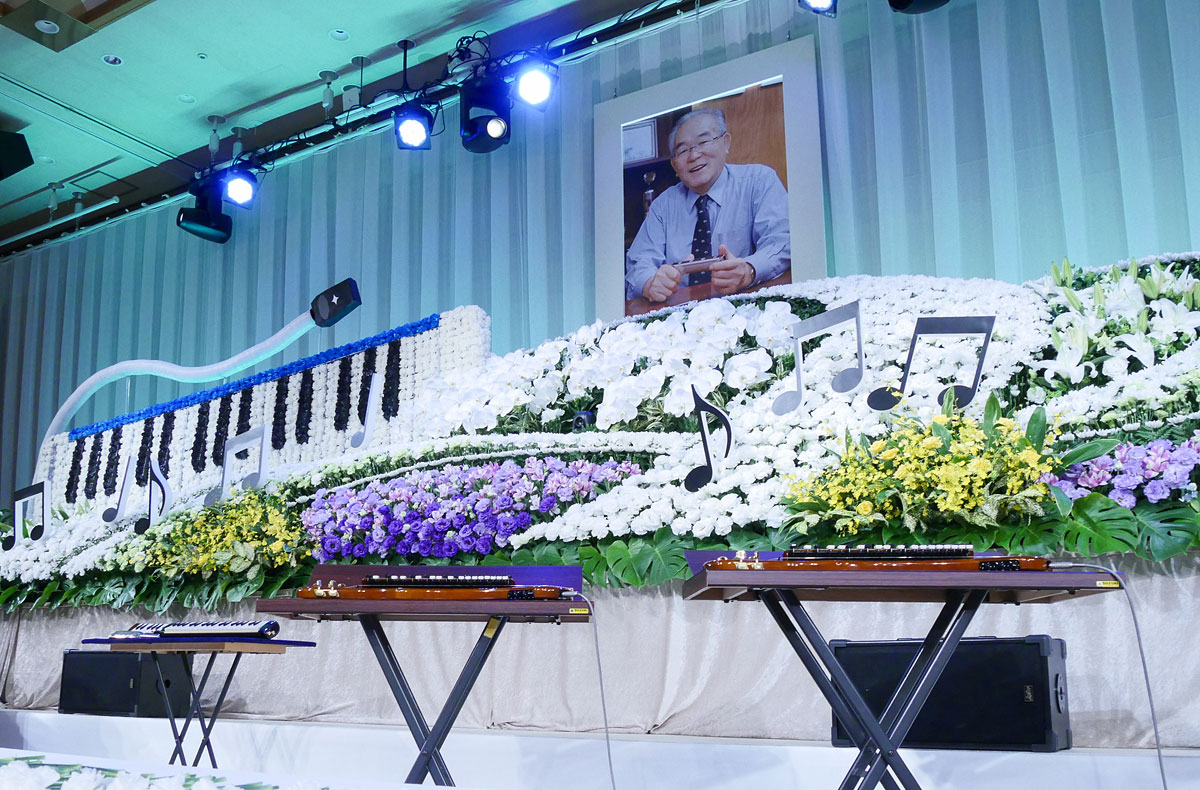
Around 600 business partners, Suzuki artists, employees of Suzuki and its group companies were greeted by a sizable Suzuki Melodion beautifully arranged with a lot of flowers and a photo of Manji Suzuki holding a Suzuki harmonica.
The mourning ceremony was followed by video showing of the memories of Manji.
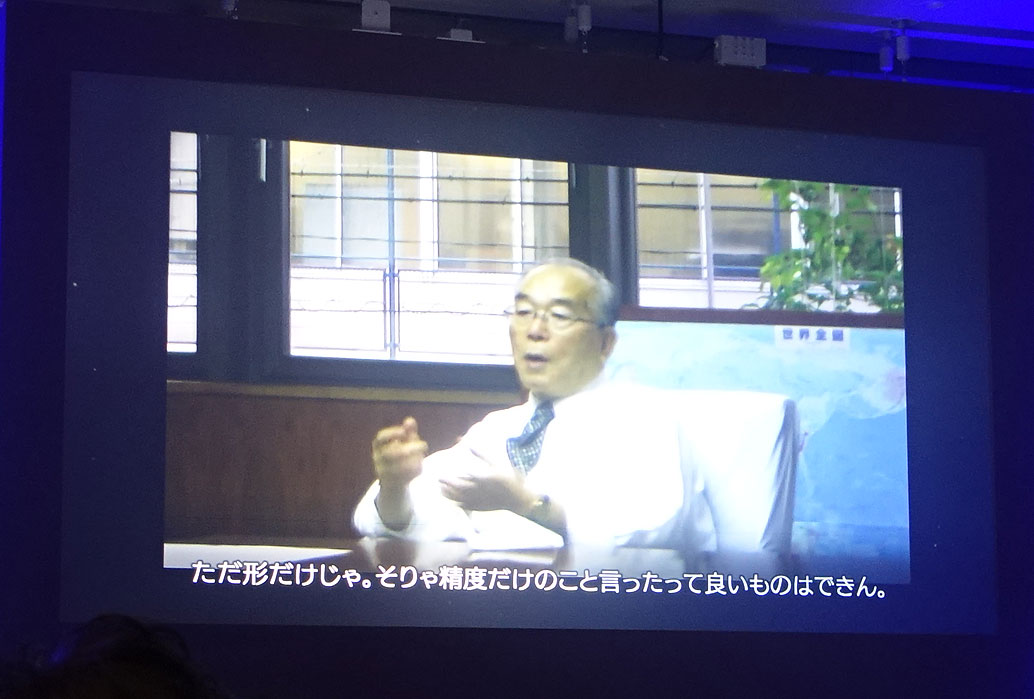
Born in 1923, little boy Manji was enthralled by harmonica. Later in 1938 he got a job at Kawai and learned making harmonica. He left Kawai in 1953 to start making harmonica himself and launched Suzuki Musical the next year.
His business successfully expanded as export demands for harmonica grew, and the instrument was adopted for entry level music education by Japanese government in 1958.
Manji developed Suzuki Melodion Super 34, first melodica manufactured in Japan in 1961 to meet the needs from music teachers who felt difficulty in teaching harmonica in class. Melodica was approved by its excellence in music education in the ensuing years. It was named as an official instrument for the Course of Study.
Suzuki Musical has expanded businesses launching distribution, export, development and production of educational music software units as well as manufacture of Hammond Suzuki electronic organs in Japan and overseas to today.
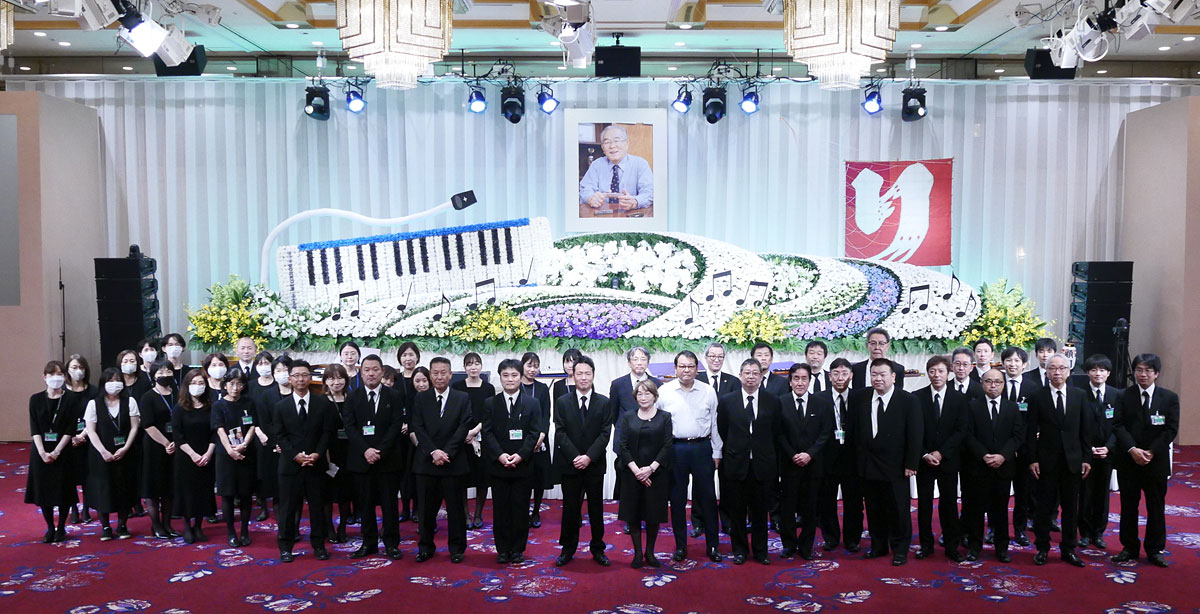
After live sessions by Suzuki artists, Hirotaka Kawai, Chairman/President of Kawai Musical Instruments Mfg., Co., Ltd. and Masato Horibe, President of Niimi Gakki Co., Ltd. (distributor) delivered eulogy. Also, a video message by Stevie Wonder, who plays Suzuki harmonica was shown.
Ms. Reiko Suzuki, daughter and president of Suzuki thanked all participants saying, “My father devoted his life to making high quality attractive musical instruments. He spent truly a happy life, I believe. We are convinced that we follow his spirit and creed to deliver products loved by music makers.”
August Products Launch
Yamaha P-series P-S500B/WH, P-225B/WH, P-145B digital pianos
https://www.yamaha.com/ja/news_release/2023/23070701/
Korg NAUTILUS AT synthesizers
https://www.korg.com/jp/products/synthesizers/nautilus_at/
Korg opsix SE, SE Platinum Altered FM synthesizers
https://www.korg.com/jp/products/synthesizers/opsix_se/
Canopus “Kodachi” Toshiki Hata signature drumsticks
https://canopusdrums.com/jp/product/signaturestick/
LTD GH-600, GH-SV Gary Holt signature electric guitars
https://espguitars.co.jp/products/ltd
Edwards E-ALEXI BLACKY Alexi Laiho signature electric guitar
https://espguitars.co.jp/products/edwards/
Edwards E-LP-CTM /P Cherry electric guitar
https://espguitars.co.jp/productinfo/31645/
Aria Pro II 714-BLACK electric guitar
http://www.ariaguitars.com/jp/items/electric-guitars/714/714black/
Aria Pro II 615-BLACK electric guitar
http://www.ariaguitars.com/jp/items/electric-guitars/615/615black/
Aria Pro II STB-BLACK electric bass
http://www.ariaguitars.com/jp/items/basses/stb/stbblack/
BOSS GK-5 divided pickup
https://www.boss.info/jp/products/gk-5/
BOSS GK-5B Divided pickup
https://www.boss.info/jp/products/gk-5b/
BOSS GM-800 guitar/bass synthesizer
https://www.boss.info/jp/products/gm-800/
BOSS ME-90 multi-effects processor
https://www.boss.info/jp/products/me-90/
BOSS DM-101 delay machine
https://www.boss.info/jp/products/dm-101/
Pearl LL-FLT1(MGIV) tote bag
https://pearl-music.co.jp/flute/producs/6008
TMC Liveline LS2400CAT3, YUS38B-5, YUS20CAT3 guitar and ukulele straps
http://www.tmc-liveline.co.jp/
Ibanez P1000PGSP, 1000PG-YE picks
https://www.ibanez.com/jp/products/model/picks/
Roland Store Tokyo Opens in Jingu-mae

Roland opens second Roland Store in Jingu-mae, close to fashionable Harajyuku shopping spot in Tokyo on October 1. The company launched the first Roland Store in London in 2022.
Roland Store provides visitors with musical experience which inspires their musical creativity and supports them enjoy life with music. Roland Product Specialists are stationed at the store located in one of the trendy districts in Tokyo to provide them with solutions matched to their personal needs face to face in a setting of professional stage and lighting. Online appointment is required.
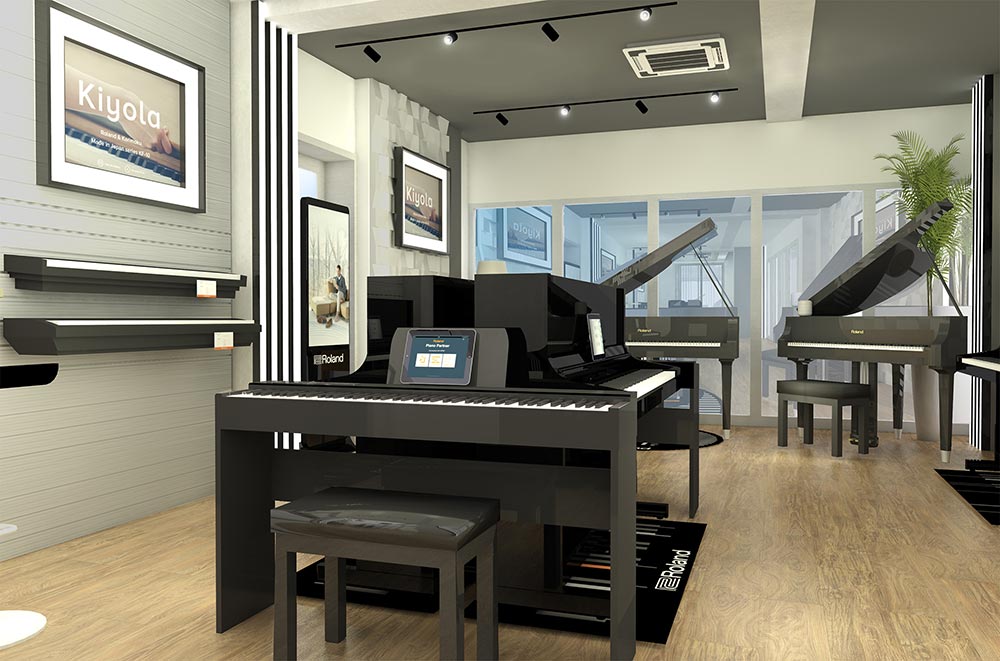
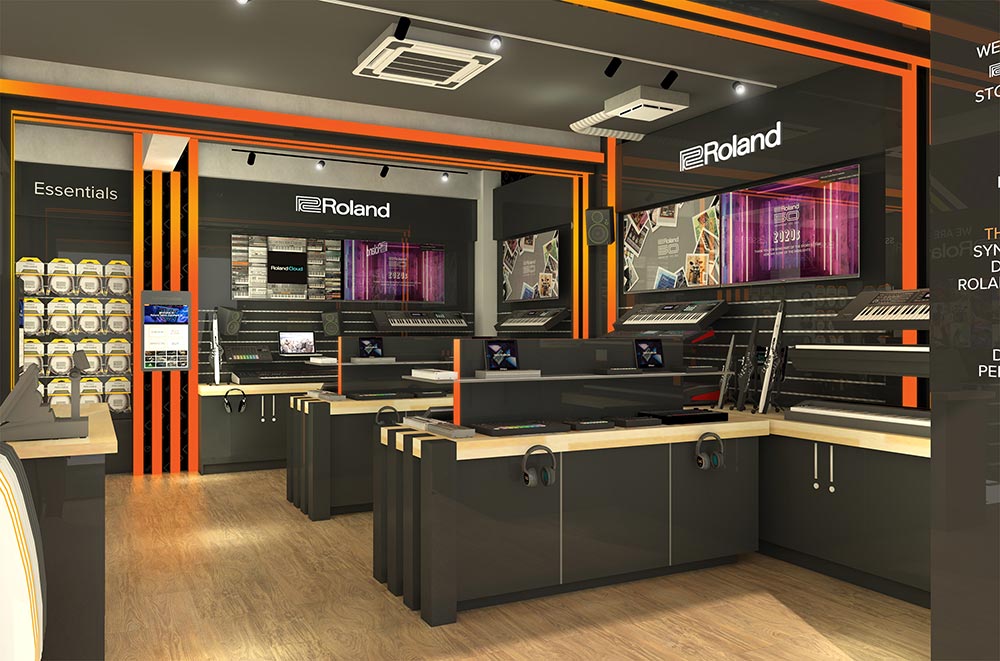
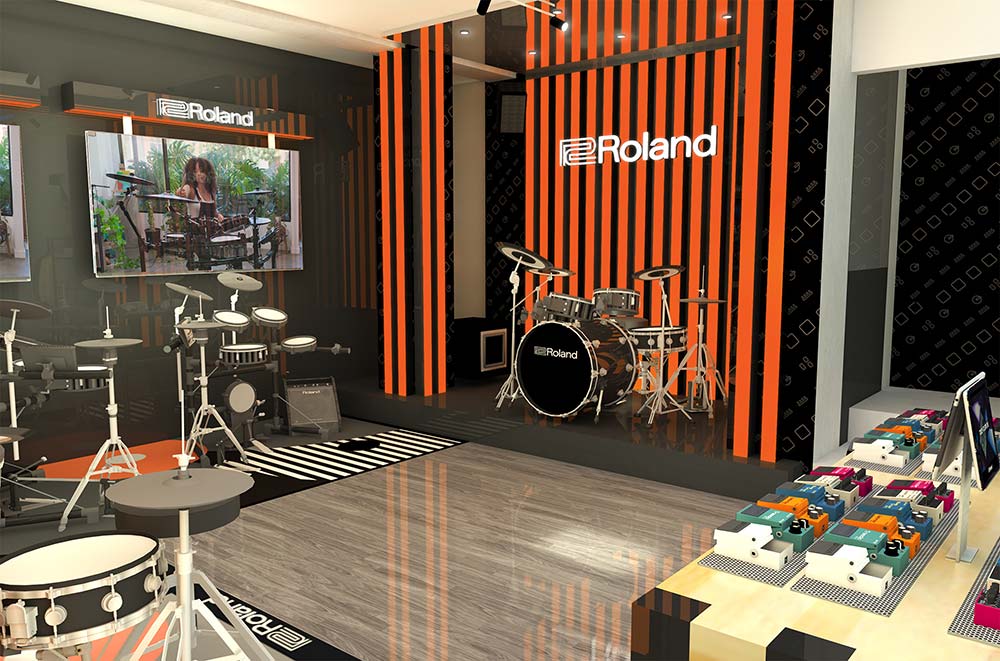
Based on Roland Store concept, Roland Store Tokyo focuses on offering visiting individuals experiences of Roland digital products in state-of-the-art environment, pleasure of creating music and enjoy music making lifetime. The 2-story and a basement building showcases Roland’s hot-ticket items. Gordon Raison, CEO and Representative Director of Roland commented, “We are pleased to announce launch of Roland Store Tokyo on October 1. Founded in Japan more than 50 years ago, Roland has played a key role in the music scene with innovative products and attracted musicians and music enthusiasts throughout the world. Roland Store Tokyo is not Roland’s direct retail outlet, but it stands as a most fantastic place where visitors can experience Roland brand. We will never be happier if the store is recognized as a spot that supports musicians and their music life with our products developed from creative and innovative ideas.
Roland Store Tokyo Jingu-mae 4-25-37, Shibuya-ku, Tokyo 150-0001
Fender Flagship Tokyo Opens: Providing Every Music Maker with Unprecedented Musical Experiences
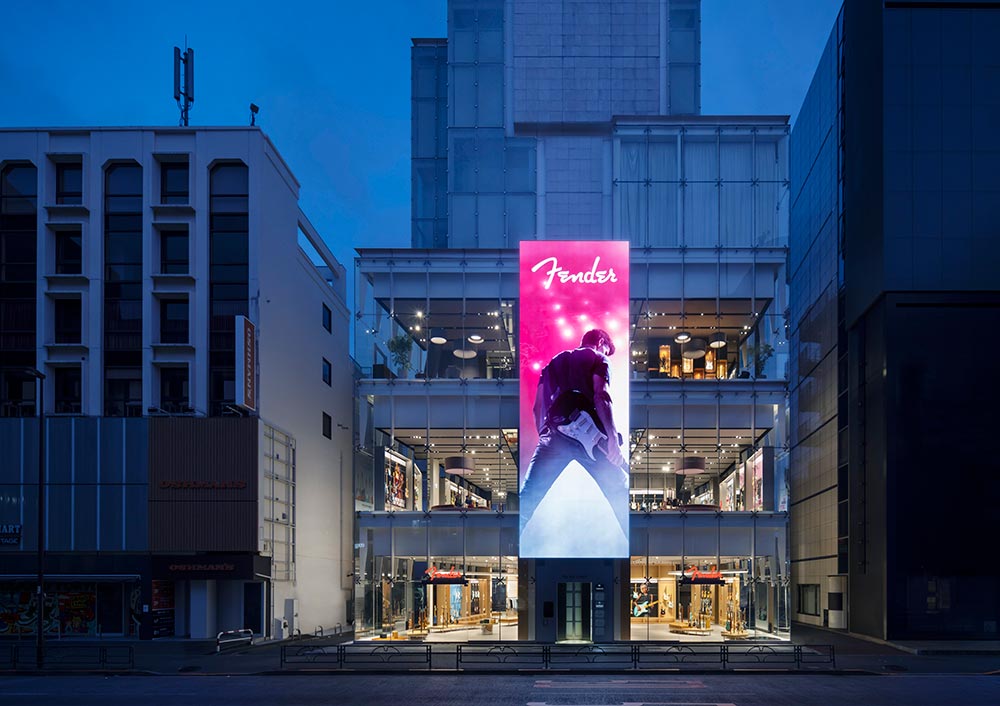
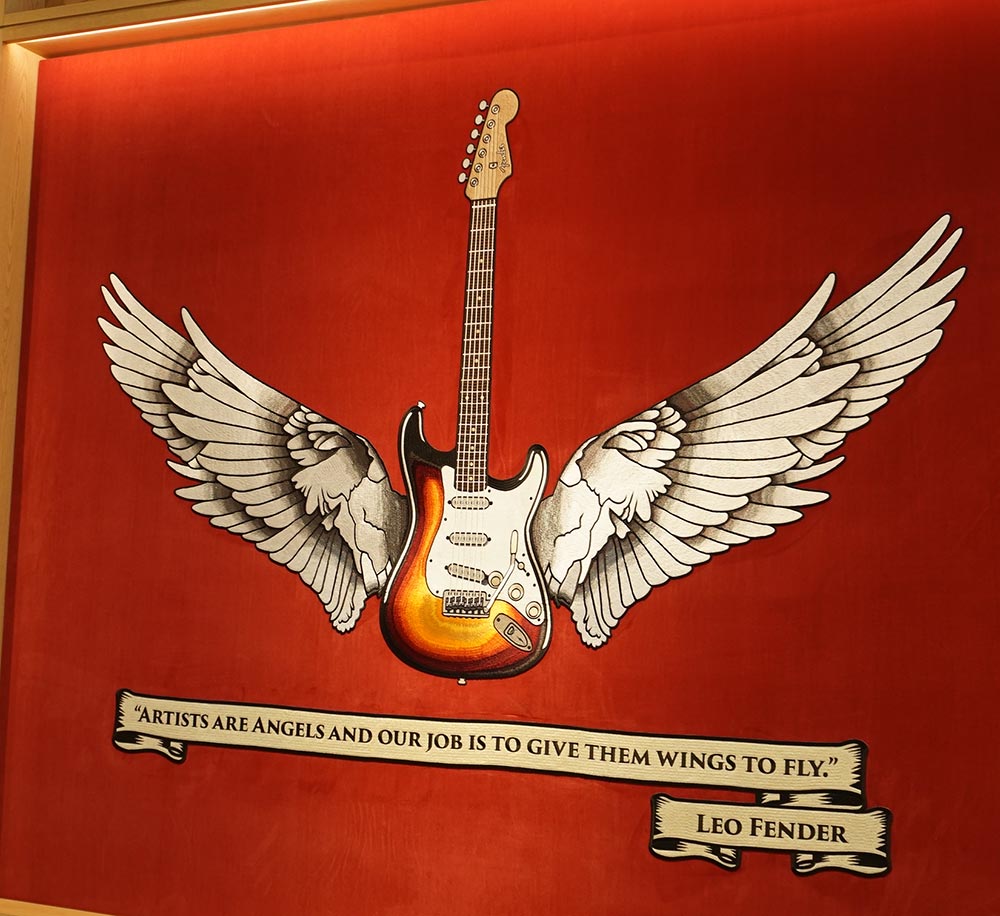
Fender Musical Instruments and Fender Music opened the world’s first flagship store in its 77 years history in Harajyuku, one of the most trendy shopping districts in Tokyo on June 30.
The brand-new building with 3 floors and 1 basement already attracts fashionable music makers from and far out of Tokyo. An opening ceremony took place on the first day inviting media members and renowned Fender artists including Ken of L’Arc~en~Ciel, J of LUNA SEA, MIYABI, Soichiro Yamauchi of Fuji Fabric.
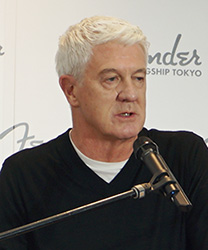
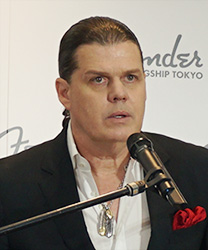
Andy Moonie, Fender Musical Instruments CEO said in his opening remarks, “Leo Fender once told "Artists are angels, and our job is to give them wings to fly." Our true task is offering every artist wings regardless of gender, genre and country they were born and grew. Right before the Covid-19 pandemic, annual sales of Fender musical instruments were 500 million U.S. dollars. Four years later, we have grown with sales of nearly 1,000 million U.S. dollars. Asia, the fastest growing market is expected to be the world’s largest in coming 10 years. We see Tokyo can serve as the most influential market and are pleased to have opened Fender Flagship in Harajuku. The store opens a door to new age and will surely contribute to bring further growth to the music products industry.
He continued saying, “During the years of self-confinement, 30 million people started playing guitar. If 10% of them keep playing guitar through life, the industry can expect 30-billion-dollar sales in 10 years. Those first-time guitar players are likely to get interested in upgrading their gears and thanks to them, sales of Fender guitars have increased to the highest level in our history.
“We feel humbled that the guitars with Leo Fender brand name are highly acclaimed for their innovative creativity after the first product was launched into the market more than 70 years ago, and the instruments are distributed through outstanding marketing at the flagship store just opened today with help of music retail channels in Japan.”

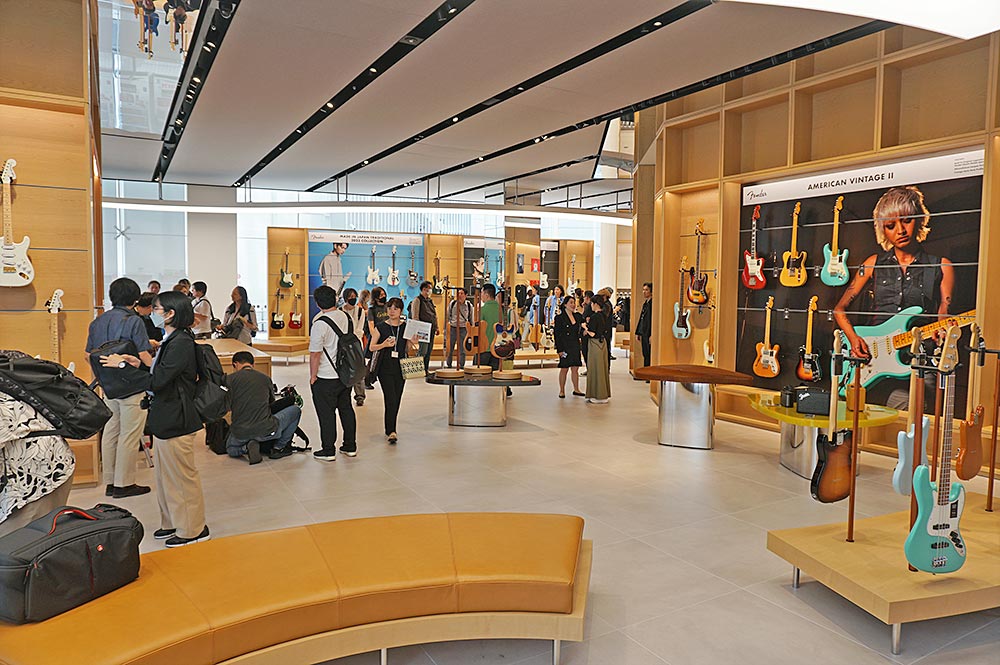
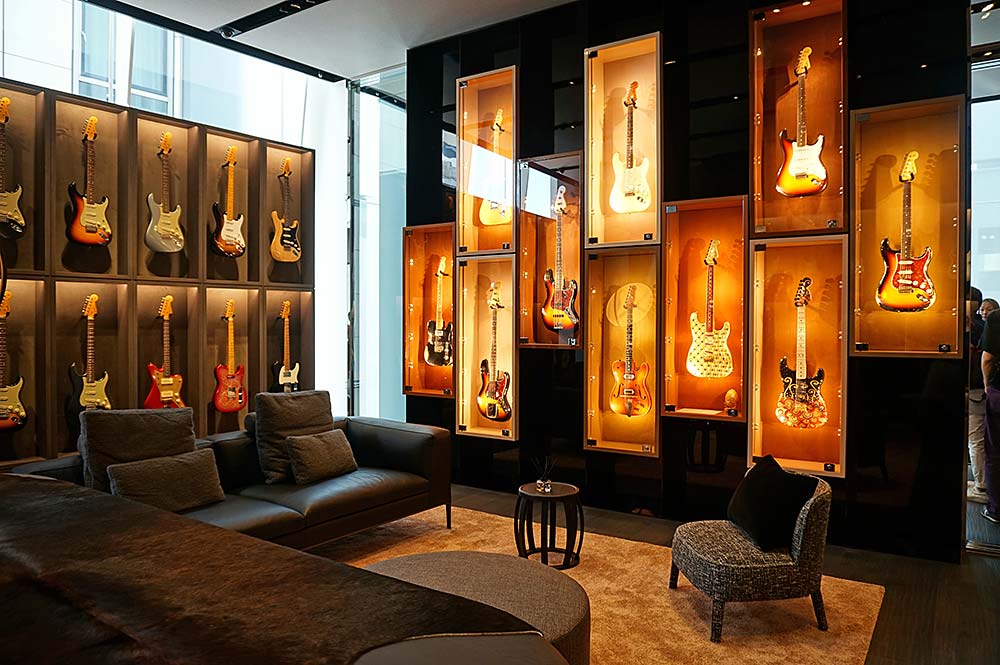
Edward Cole, president of Fender Music (Japan) which serves for Asian markets said, “Our concept is to support every level of players in their voyage of music. The flagship Tokyo store is built with this concept. We have continuously produced innovative products, carried attracting marketing approaches, intensified connection with artists and made efforts to increase players of every stage to this day. As a result, our sales in Asia & Pacific region have achieved 17% growth year after year.
“We chose Harajyuku (Tokyo) for the home of Flagship Tokyo from the following reasons; 1. A host of name international brands have flagship shops in Tokyo, 2. Influencers and brand-conscious consumers in Japan frequently visit Tokyo, 3. Japan has the largest and fastest growing music market, 4. More than 30 million tourists are expected to visit Tokyo this year, and the number is estimated to be doubled in 10 years to come, 5. International tourists love to visit world-class brand shops and enjoy exciting shopping experience offered by Japanese sales staff with top-notch customer relationship and service.
“Visitors will be impressed by astonishing product selection of Flagship Tokyo unrivaled in the music products industry. They include unique instruments crafted by master builders, a lot of models manufactured in U.S., Japan and Mexico, exclusive products only available at Flagship Tokyo and lifestyle products.”
The opening remarks were followed by talk sessions and live performance featuring Ken, J, MIYABI, Hama Okamoto and other name Fender artists.
The store has 1,056 sq. meter space fully packed with Fender products. The 1st floor with spacious entrance is allocated for new and limited-edition models, F IS FOR FENDER wearables as well as fashion and lifestyle products.
The 2nd floor offers popular electric guitars, basses and amps made in U.S. and Japan, and perfectly sound-controlled Fender Amp Room. The models offered by Fender Custom Shop are exhibited on the 3rd floor.
The basement has space for acoustic guitars and ukuleles which is occasionally used for live events. Also, adjacent Fender Café serves fine coffee in collaboration with California-based Verve Coffee Roasters.
Fender Flagship Tokyo: Jingu-mae 1-8-10, Shibuya-ku, Tokyo 150-0001 https://www.fender.com/ja-JP/fender-flagship-tokyo.html
July New Product Launches
Yamaha NP-35B /WH, 15B/WH digital pianos
https://www.yamaha.com/ja/news_release/2023/23060601/
Korg Pa5X arranger keyboards (61-key, 76-key, 88-key models)
https://www.korg.com/jp/products/synthesizers/pa5x/index.php
Korg wavestate mkII synthesizer
https://www.korg.com/jp/products/synthesizers/wavestate_mk2/
Korg wavestate SE and SE Platinum synthesizers
https://www.korg.com/jp/products/synthesizers/wavestate_se_platinum
Hammond XK-4 electronic organ
https://www.suzuki-music.co.jp/products/65781/
Roland E-X10 arranger keyboard
https://www.roland.com/jp/products/e-x10
Pearl Flutes Maesta F-MD925/E-55J 55th Anniversary Models
https://pearl-music.co.jp/flute/products/6360/
Edwards electric bass
https://espguitars.co.jp/products/edwards
Steinberg DRICO PRO/R, DRICO PRO-CG/R, DRICO PRO/E, DRICO PRO/CG/E、DRICO EL/R and DRICO EL/E music production software
https://www.yamaha.com/ja/news_release/2023/23052501/
Yamaha DM7, DM7 Compact and DM7 Control digital mixers
https://www.yamaha.com/ja/news_release/2023/23060701
Roland VR-400UHD AV mixer
Roland Pro A/V - VR-400UHD | 4K Streaming AV Mixer
ESP PA-LS08 Best of Luna Sea 2023 Sugizo guitar picks
https://espguitars.co.jp/productinfo/32978
2023 First-half Term Music Products Retail Market Survey: 33 Music Retailers Throughout Japan Participate
Japan Music Trades recently conducted annual 2023 Music Retail Market Survey for 6 months from January through June with help of 33 music retailers throughout Japan. It reveals that 81.8% of the music retailers reported that the sales during the term had increased far greater than the last year survey of 57.5%. Consequently, only 9.1% each music retailers reported that their sales went down or unchanged.
The 2022 survey showed 30% of the participated music retailers reported business decline, and 12.5% reported no change. The 2023 survey result apparently tells that the industry experienced a definite upswing from the Covid-19-related stagnant economy.
As the economic recovery has been much talked since last year after the Government lifted restrictions against corona virus, public events restarted, and music retailers saw heavy customer traffic. Not a few retailers reported that people movement dramatically changed after Covid-19 was classified into Class 5 Infectious Diseases, looser regulations this past May.
Music retailers reported that sales of electric guitars and basses significantly increased inspired by popular animation movie. Wind instruments severely impacted by Covid-19 also showed the largest recovery in the last 4 years. While the school music retailers fretted shortage of products supplied by manufacturers and distributors.
As to the most prospected marketing strategies for latter half of the year, 45.5% of the retailers pointed upgraded customer relationship and communication capability at sales floor which were more than 25% increase over the survey last year. 37.5% music retailers were apparently most interested in holding live music events the previous year. A year later, their expectation turned to expanding business opportunities like developing entry level market and practically seeking effective ideas to boost sales through carefully planned promotional events. They are also expecting upgrading inventory, development of products designed in collaboration with third parties, and searching new generation of promising products. Not a few retailers also expressed increasing interest in expanding distribution of used instruments.
Music Store Sales Staff Awards 2023 Application Opens
Japan Musical Instruments Association (JMIA) opened ballot application on June 29 for Music Store Sales Staff Awards 2023, the 3rd consecutive event initiated in 2021. At the pre-meeting held online on June 14, JMIA announced that a new ballot category, “Contents Production Award” was added.
The award aims to increase awareness of the music products industry to public and promote pleasure of music making. Last year, the event drew 4,300 ballot applications from music store sales staff, and 29,000 from general public which doubled from the year before last. Five winners of the Products and Artists Awards were invited to the award presentation ceremony held at Yamaha Ginza Studio last October.
Last year, the awarded products contributed to help boost sales of music stores with special store display and talks about the awards with customers during the year-end business season.
The 2023 Award included 5 product categories of digital piano & keyboards, guitars, basses, flutes, and violins, 6 artist categories of pianist, guitarist, bassist, flutist, violinist, most-entertained artist of the year, and the new contents production category (novels, animation programs, movies, cartoons and TV dramas related to musical instruments).
The top 3 products and contents production artist categories awards are chosen by vote of music store sales staff, and the award presentation ceremony will be given to Grand Prix Award winner. The top 5 artist awards will be nominated by music store sales staff voting, and then the Grand Prix Award will be decided by public voting.
The application for music store sales staff was closed on July 3, and the Grand Prix Award presentation ceremony takes place on October 23 at Yamaha Ginza Studio.
June New Products Launch
Aria Legend LPB-Z WH electric bass
http://www.ariaguitars.com/jp/items/electric-guitars/legend/#Basses/
Aria SPS-1900UKE ukulele strap
http://ariaguitars.com/jp/items/accessories/strap/ukulele/sps1900uke-nb/
Boss SDE-3000, SDE-3000EVH digital delay effects pedals
https://www.boss.info/jp/categories/effects_pedals/delay_reverb/delay/
ESP electric guitars-VULTURE James Hetfield Olympic White, THE CRYING STAR-7 GALNERYUS/SYU, AMAZE-CTM FM/M, AMAZE-CTM-SL5 FM/M
ESP LTD KH-V Kirk Hammett electric guitars
ESP Killer Guitars KG Exploder II BIB
https://espguitars.co.jp/products/esp
Famous FS-S10, FLS-5GC, FLS-11GC, FT-1G, FT-5G ukuleles
https://www.kiwayasbest.com/shopbrand/001/o/
Galax Ura U Model English horn reed
Roi flute head wing and flute master cleaner II
http://www.global-inst.co.Jp/
Kawai digital pianos-CA501 & CA401
https://www.kawai.jp/product/c/digitalpiano/caseries/
Korg microKORG Crystal synthesizer
https://www.korg.com/jp/products/synthesizers/microkorg_crystal/
Roland AIRA Compact Series S-1 synthesizer
https://www.roland.com/jp/categories/featured_products/
Yamaha Clavinova CVP-909PE, CVP-909B, CVP-905PE, CVP-905B digital pianos
https://www.yamaha.com/ja/news_release/2023/23051001/
Yamaha WS-B1A compact speaker
https://www.yamaha.com/ja/news_release/2023/23051101/
Two Leading Music Stores Open Outlets Outside Home-ground
T. Kurosawa & Co., Ltd., Tokyo

One of the leading music store chains in Japan, T. Kurosawa & Co., Ltd. operating 20 outlets in Tokyo area opened its first store in Kyushu on April 28. Located on the 8th floor of Fukuoka Mina Tenjin, a brand-new 2,310 sq. meter shopping complex connected with adjacent North Tenjin shopping complex, the new Kurosawa store has access from nearby two metro stations.
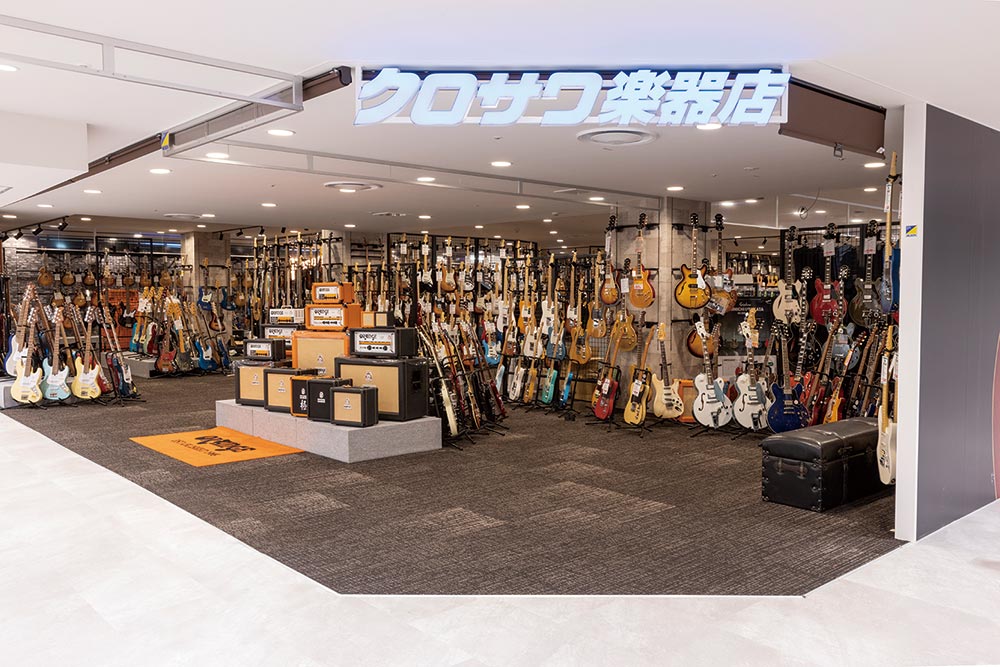
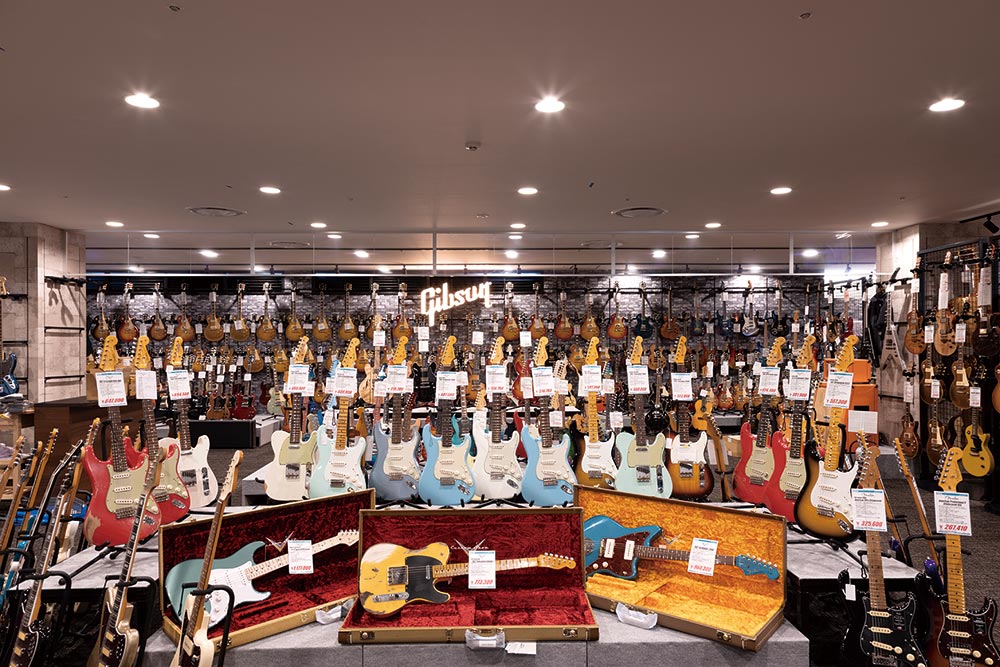
The largest level sales floor space among the Kurosawa outlets showcases 1,200 fretted instruments including Fender and Gibson guitars, staff-selected GEN custom order guitars, vintage and used models, the largest selection of C.F. Martin guitars in Japan, a host of domestic-made and imported acoustic guitars, ukuleles and classical guitars. A good selection of amps, effect processors and guitar-related accessories can meet the needs of every guitarist. High quality on-sight repair services by seasoned professional are also provided at the store.
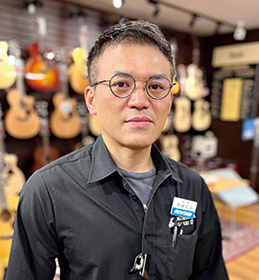
Kazuhiro Okazaki, manager of Kurosawa Gakki Fukuoka Mina Tenjin Store commented, “Many visitors are very pleased that Kurosawa opened the first store in Kyushu. Hakata is known as a music city with a huge base of music makers.
As we have more than expected positive responses, we expect to build trust of local customer and can grow to be a competitor with Kurosawa’s bigger outlets in Ikebukuro (Tokyo) and Nagoya.
Miki Gakki Co., Ltd., Osaka
Osaka-based Miki Gakki Co., Ltd., another leading music store chain opened Smalls guitar shop in Ochanomizu, Tokyo, on April 28. As the store name tells, the cozy shop has taken the first step in Tokyo area at the center of Ohanomizu known as musical instruments town, only 4-minute walk from Japan Railways and Tokyo Metro Ochanomizu stations.
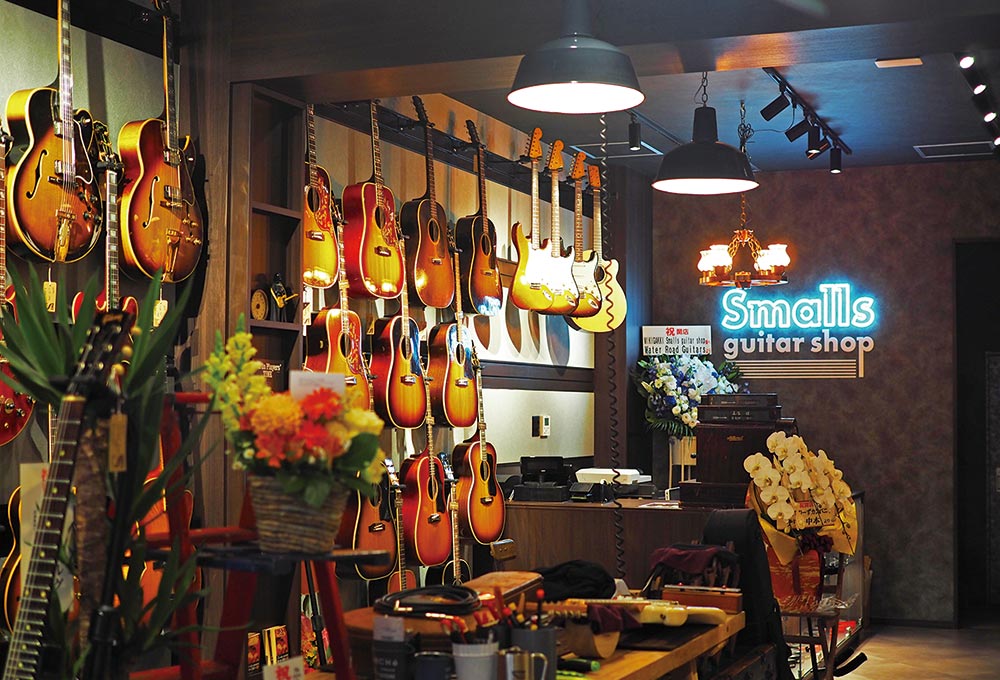
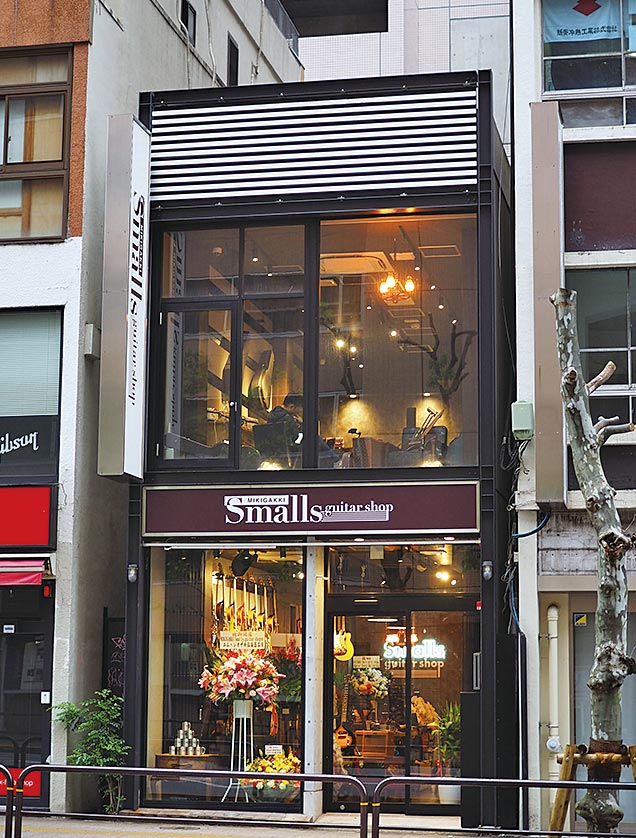
Yoshihiro Ueno, store manager says, “We have planned to open our outlet in Tokyo for the past years. The timing was perfect as we mark 200th anniversary in 2024.”
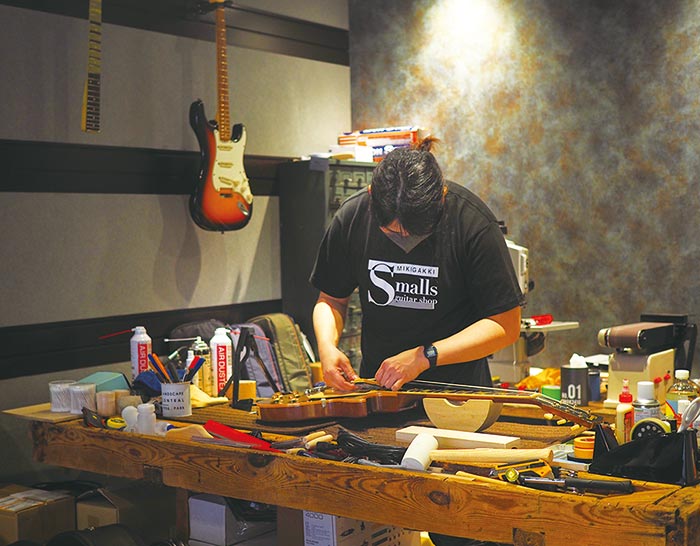
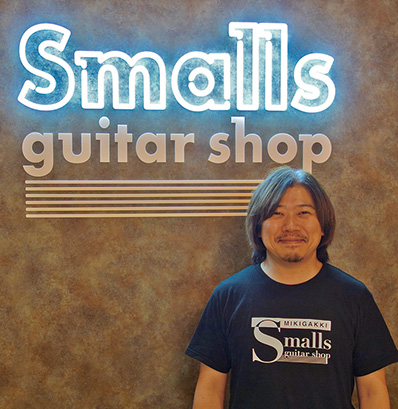
The shop looks to be a comfortably furnished hideaway for guitarists having about 100 electric and acoustic guitars including coveted vintage models and precious original models by name luthiers collected by the sales staff from the various parts of the world.
There is a spacious service section on the 2nd floor to meet the needs of repair and maintenance works as well as a meeting room for instrument selection and talks for customers and sales staff.
Ueno concluded, “We were off to a good start having inquiries even before the opening and excellent customer flow. More than anything else, we are happy to know that quite a few visitors know Miki Gakki here in Tokyo. We are looking forward to offering customers really valuable instruments regardless of their price range.”
Obituary: Yukio Sakurai (1939 – 2023)
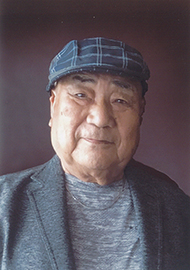
Yukio Sakurai, former president of Japan Music Trades passed away on May 2nd at the age of 83.
Sakurai was nephew of Rikuro Hiyama, founder of Japan Music Trades, and joined the publishing house at the very beginning as a staff photographer and sales staff. He assumed the presidential position from Hiyama in 1990. During his 20 years tenure at Japan Music Trades, he took leadership at the publisher, and contributed to the growth of the music products industry.
A good-natured man, he was much loved for his friendly personality by both young and veteran industry people.
May New Products Launch
*Aria SPS-2400RA guitar strap http://www.ariaguitars.com/jp/items/accessories/
*Casio exclusive bench for Privia digital pianos http://casio.jp/emi/
*ESP Grassroots G-SN-45DX Fuji Purple electric guitar, PA-MA10-25th SEX MACHINEGUNS and PA-MSG10-25th SEX MACHINEGUNS guitar picks
https://espguitars.co.jp/productsinfo/321621/
*Kawai Mini Piano-GP-44 44-key grand cabinet model
http://s:toys-onnlineshop.kawai.co.jp/
*Korg Liano digital pianos
https://www/korg.com/jp/products/digitalpianos/liano/#colors
*Pearl 170H/3(Yuya) , 180H/2(Kid’z) Drumsticks
https://pearldrum.com/ja/products/drumsticks/
*Roland VR-6HD Intermediate class AV mixer
https://www.proav.roland.com/jp/categories/featured_products
*Boss Gigcaster 8 and Gigcaster 5 streaming mixers
https://www.boss.info/jp/products/gigcaster_8/
*Roland TMC LKM68 genuine leather guitar strap
http://www.tmc-liveline.co.jp/
*Yamaha b121TC3 and b113TC3 TransAcoustic upright pianos and RSC3-1, RSC3-3, RSC3-5, RSC3-10 and RSC3-30 Silent Piano sound control units, VSH3-1, VSH3-2, VSH3-3, VSH3-10 and VSH3-20 Silent Piano Upgrade sound control units
https://www.yamaha.com/ja/news_release/2023/23041404/
*Yamaha YDS-120 digital saxophone for entry level player
https://www.yamaha.com/ja/news_release/2023/23041403/
*Yamaha SB7J, SB6J, SB3J, SB2J, SB1J and Silent Brass trumpet/cornet, flugel horn, trombone, horn, euphonium and tuba and STJ Personal Studio
https://www.yamaha.com/ja/news_release/2023/23041402/
*Yamaha FG9R and FG9M acoustic guitars
https://www.yamaha.com/ja/news_release/2023/23041301/
*Yamaha DM3 and DM3 Standard light-weight compact mixers
https://www.yamaha.com/ja/news_release/2023/23040702/
**Yamaha YH-WL500 wireless headphone
https://www.yamaha.com/ja/news_release/2023/23041401/
Yamaha, Roland and Casio Products Won 2023 German iF Design Awards
iF Design Award 2023 announced recipients of this year’s Product Design and Professional Concept Awards, and IF Design Award. Yamaha TW-E7B true wireless Bluetooth earphones and Stepping Out of the Slate design concept models received the Product Design and Professional Concept Awards, respectively. TW-E7B also received German Red Dot Design Award Product Design 2023.
Roland T-8, J-6, E-4 AIRA Compact Series digital instruments, F107 digital piano as well as matched Roland Piano App, BRIDGE CAST gaming audio mixer won both iF Design Award 2023 and Red Dot Design Award 2023.
Casio Privia PX-S7000 digital piano received Gold Statement Award of iF Design Award 2023.
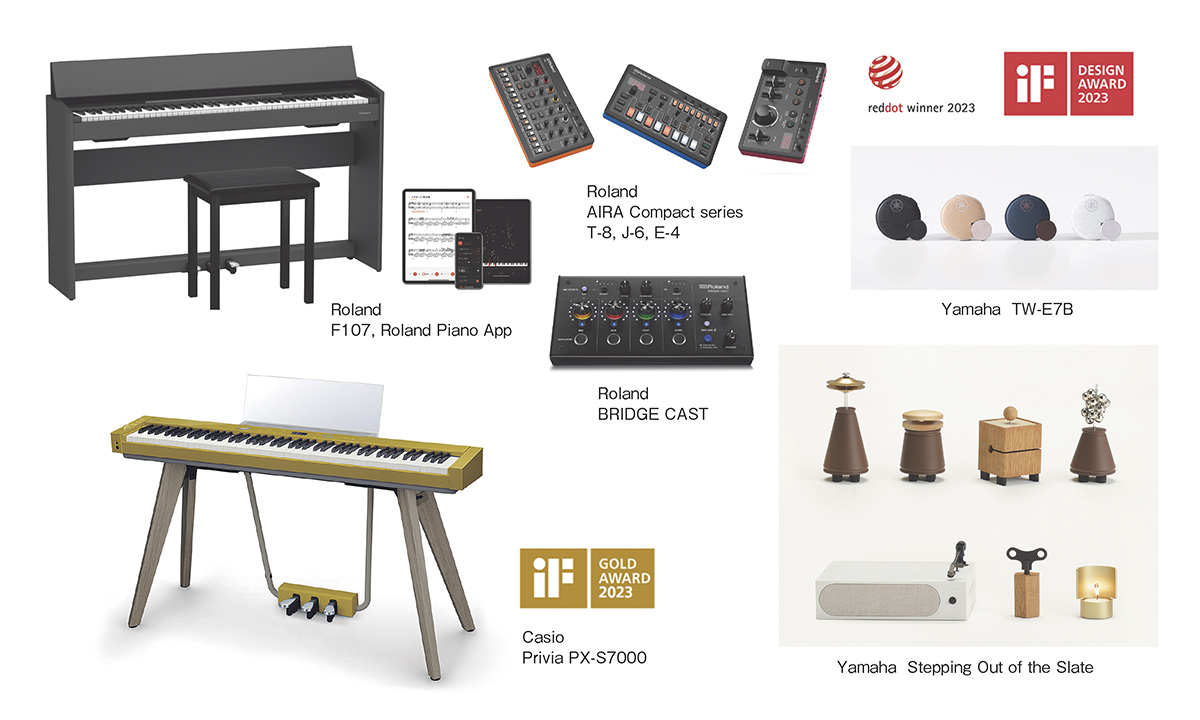
Ikebe Music Opens Tokyo’s Largest Used Instruments Shop in Shibuya
Ikebe Music opened Ikeshibu Reuse, a flagship store of its Ikebe Reuse, a buy back and sell service division of used musical instruments on April 1 in Shibuya.
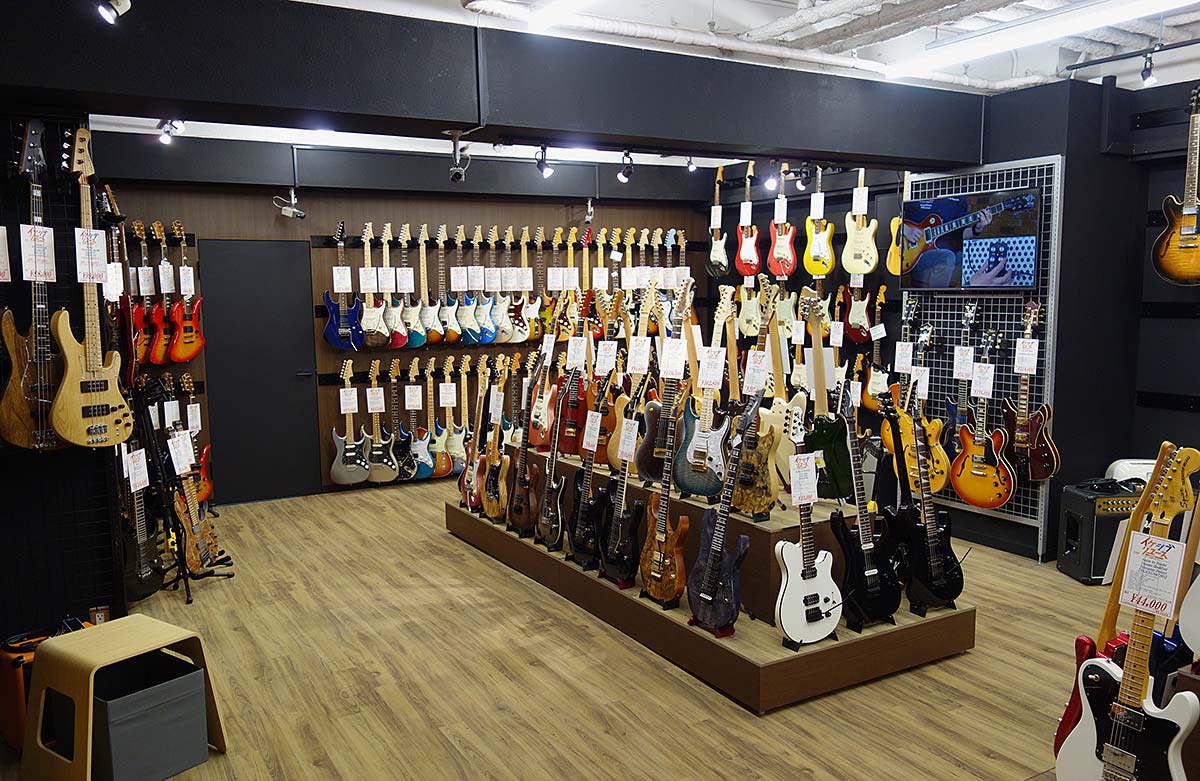
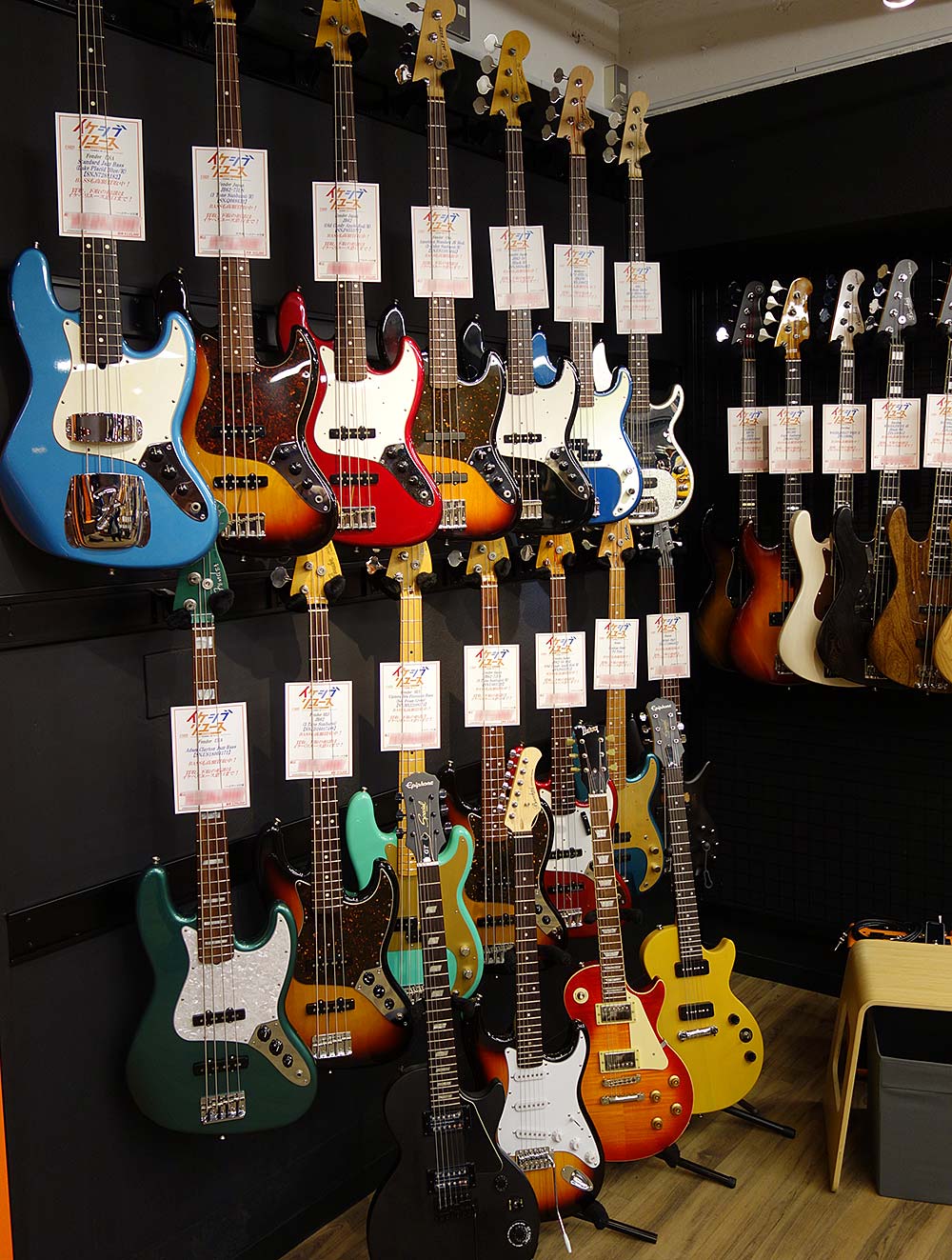
Ikebe Reuse was launched in April 2021 under the corporate slogan “Pass along good used instruments with emotion and story to new user”. Since then, high quality maintenance skill and long-term product warranty of the division have successfully attracted attention of customer. Ikeshibu Reuse serves as an upgraded unit integrating Ikebe Reuse opened at the new location of Shibuya shopping district.
Ikeshibu Reuse offers around 400 used guitars and basses from middle class to high-end models, the largest inventory in Tokyo, all inspected and fine-tuned by veteran technicians, at more than doubled floor space. Customer can select favorite instruments in an inviting setting.
Closely located to Ikeshibu new instrument music shop, it allows customer to compare new and used models all at once.
It also has a reception desk for buy back order, come to customer home service upon request as well as consultation and product assessment.
Shoki Takei, manager of Reuse Business Unit says, “We see customer is more positive than ever to buy used instruments as their first choice these days. We expect that Ikeshibu Reuse becomes the first place that customer of all ages visits as we offer the market a complete cycle from selling new instruments, providing buy-back service, and selling them again as reuse models after repair and maintenance services done.
Yamaha Launches Distribution Subsidiary in The Philippines
Yamaha announced that it had recently opened Yamaha Music Philippines Inc., a local distribution subsidiary in Makati City, in Metro Manila business area. The country is one of the growing markets in the world. Koichiro Onoye is responsible for the unit and the new company starts operation in October.
April New Products
*Roland GP-9M, GP-9 and GP-6 digital grand pianos (http://www.roland.com/jp/categories/featured_products/)
*Kawai Mini Pianos for children (White and Red online exclusive models joined) (https:/toys-onlineshop.kawai.co.jp/view/)
*Yamaha CK61 and CK88 Stage Keyboards (https://jp.yamaha.com/products/music_production/stagekeyboards/)
*Roland SH-4d synthesizer (https://www.roland.com/jp/products/sh-4d)
*XO 1650D, 1651D and 1651 ND French horns (http://www.global-inst.co.jp/)
*Pearl 189H Drum sticks (https://pearldrum.com/ja/drums-news/24263296)
*Killer Guitars KG-Exploder Musha ’22 electric guitar (https://www.killer.jp/guitar/kg-exploder-musha-22.html)
*Lakeland SL44-60/R Hinach Hidekazu Hyuga model electric bass (https://espguitars.co.jp/lakland/artists/hidekazu-hinata/?series=shoreline&model=SL44-60/R%20Hinatch%20Signature%20Bass&variation=lake_placid_blue_/_mh)
*Edwards E-SNAPPER-AS/M (https://espguitars.co.jp/product/20009/)
Fender Opens First Flagship Store in Tokyo
Fender Musical Instruments and Fender Music(Japan) announced that Fender’s first flagship store in its history would open this summer in Harajuku-Omotensando, fantastic shopping area in Tokyo.

Fender Flagship Tokyo is designed to offer every type of musicians from professional to first-time guitar player and music enthusiasts, even no music makers remarkably exciting shopping and musical experience. The area is known as a source of fashion and culture.
It shares 4 floors from basement to the 3rd floor of THE ICE CUBES building where all Fender and Squire electric guitars and basses, acoustic guitars including the latest artist signature models, Fender Custom Shop TM custom-order models, amps and pedals as well as accessories and lifestyle products.
It shares 4 floors from basement to the 3rd floor of THE ICE CUBES building where all Fender and Squire electric guitars and basses, acoustic guitars including the latest artist signature models, Fender Custom ShopTM custom-order models, amps and pedals as well as accessories and lifestyle products are displayed.
2022 Japan Musical Instruments Production, Domestic Sales, Import & Export
Production(sales) and Export Value of Piano Increased
According to the production/sales statistics compiled by The Ministry of Economy Trade & Industry, a total of 43,000 units of acoustic upright and grand piano (2% less than the year before last) were distributed in Japan and exported last year. However, they achieved 30.9billion yen sales, 12% more than the year before last.
The statistics of Shizuoka Pref. Musical Instruments Manufacturers Association, to which good percentage of leading musical instrument manufacturers in Japan belongs precisely coincides the figures above mentioned. In 2022, 13,947 units of acoustic piano worth of 8.2billion yen were sold in Japan and 29,014 units worth of 22.7billion yen were exported. When compared with the results in 2021, domestic sales increased 12% in units and 10% in value. While export of acoustic piano decreased 7% in unit but increased 12% in value.
Piano market revived in 2021 from the COVID-19 pandemic with a significant 20% and 31% increase in the domestic market and export, respectively. A year later, export of them slightly declined in unit. But they went up in value. It’s safe to say that manufacturers shifted production to upper class models. Also, they raised price of the products to cope with cost increase in materials and distribution.
There might have been another reason for the brisk domestic sales of piano. Yamaha and Kawai raised retail price of piano in April and October, last year. That could have stimulated demands of customer for largely inexpensive models as a last-minute purchase before price hike.
The statistics by The Ministry of Trade, Economy and Industry shows that distribution and export of digital pianos and electronic organ were the same level of 2018 before the pandemic with 5% and 3% fewer sales in units and value, respectively. The dramatic surge of demands during the pandemic looks dried up.
Electronic keyboard market kept the downward trend to the historical level in units, and to 50% level in 2012.
Manufacturers raised price of products to cope with soaring materials and distribution cost, and it affected domestic sales of wind instruments with 15% down in units, acoustic and electric guitars with 10% down in units, but export value rose 15% and 5%, respectively.
Export Exceeds 80billion Yen, Largest In 21 Years
Total export value of the musical instruments increased 16% over the previous year to 87.8billion yen according to the statistics compiled by The Customs and Tariff Bureau of Ministry of Finance. Pianos shared about 50% of the total value. Grand piano value increased 17%, but upright piano value ended with a minimum 1% increase.
Export of electric guitars, reed instruments and other wind instruments, and brass instruments advanced 38%, 23% and 53%, respectively. Piano parts and accessories also increased 28%.
Total import value of musical instruments rose 20%. Electric/electronic instruments with keyboard, electric guitars, parts and accessories of instruments other than those for piano are the 3 largest segments with 30%, 33% and 37% increase, respectively. Parts for piano and accessories increased 35% as well.
Hand-held Sound Control Unit Developed by Professional Singer
Simply attaching to a microphone, Voicease provides vocalists with sound control capability with no worry of playing time and place.
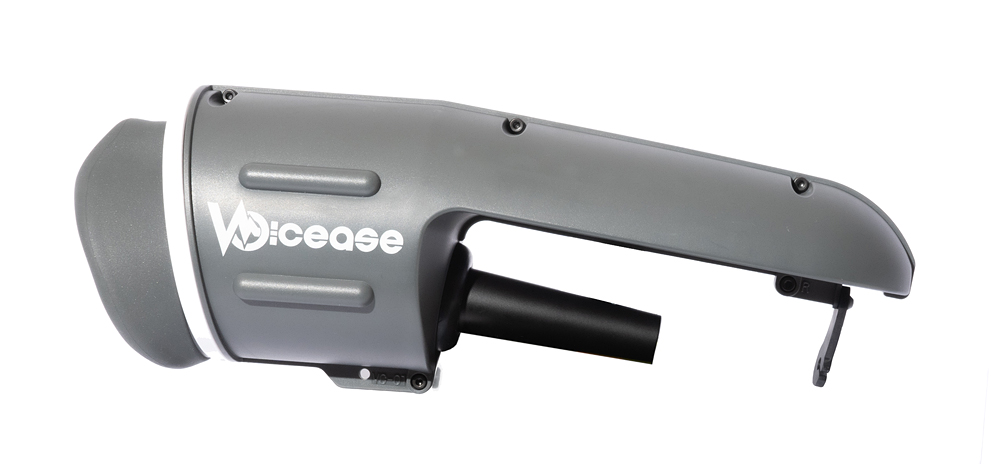
Taro Kijima, associate professor at College Choir, Kunitachi College of Music, and gospel musician started development works of simple sound control unit for vocalist, and launched it into production having raised 14 million yen through crowdfunding last year in the midst of the COVID-19 pandemic.
Kijima says, “Singing is a principal human nature like eating and sleeping. But we cannot sing at midnight without bothering family members and neighbors. Build a sound control capsule in a room? It’s costly. I have sought after a solution in the last 20 years. The pandemic made all doors of studios and karaoke bars shut down. All members of my choir group lost stage to sing. One of them even gave up singing. Necessity is mother of invention. I put up my ideas I have kept in mind for the years to develop a simple sound control unit for vocalist.”
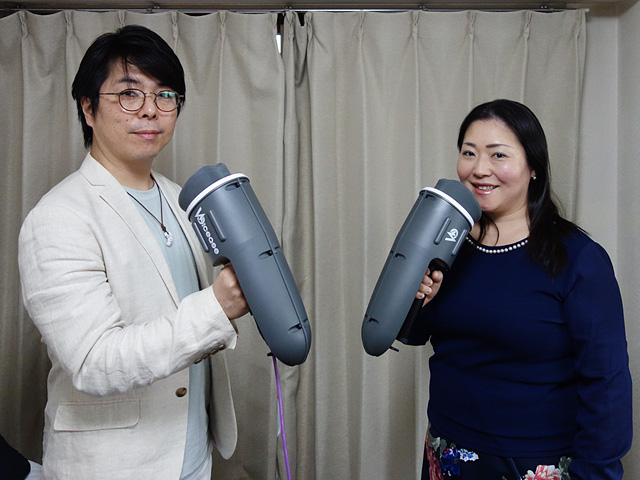
It was very fortunate for him that he happened to get acquainted with Naoko Horiguchi, owner of Aria Music Offfice, a company designing and manufacturing music-themed goods, stationery and accessories. Inspired by Kijima’s ideas, Horiguchi and her development team started research, designing and production of prototype.
The largest feature of Voicease is sound monitoring capability which allows vocalist to discern own voices while reducing sound level by more than 20dB. The quality level of sound control is good enough to satisfy requirements of professionals.
Kijima explains, “Voicease is an exclusive vocal sound control unit never existed before as it covers both mouth and nose of vocalist. When only mouth is covered with a conventional sound control unit, it’s hard for vocalist to discern quality level of his or her voice.
In addition to excellent sound control capability, Voicease provides vocalist with fine air ventilation for comfortable breathing, collects tones coming through nose, and absorb sound inside the unit. It is also lightweight to be held by a single hand, and compatible with versatile microphones.
Horiguchi adds about quality of Voicease, “We have worked with help of professional vocalists as we knew that they would not approve the unit unless they are contented with the sound control capability. We are proud of Voicease which can meet every requirement of vocalist.”
Voicease won instant appreciation among VTubers who love the unit at midnight live streaming. Their comments helped increase demands on versatile scenes including DTM music production, Yamaha SYNCROOM session and Karaoke bar.
Currently, Voicease is distributed on the internet. But sales through physical music retail channel are expected to grow as inquiry from them increases. Kijima concluded, “We are very pleased that sound control unit for vocalist finds a market far larger than we expected. Voicease can serve the needs of stress-free singing in broader occasions of the society.”
Limited Edition Mick Jagger (The Rolling Stones) Harmonica
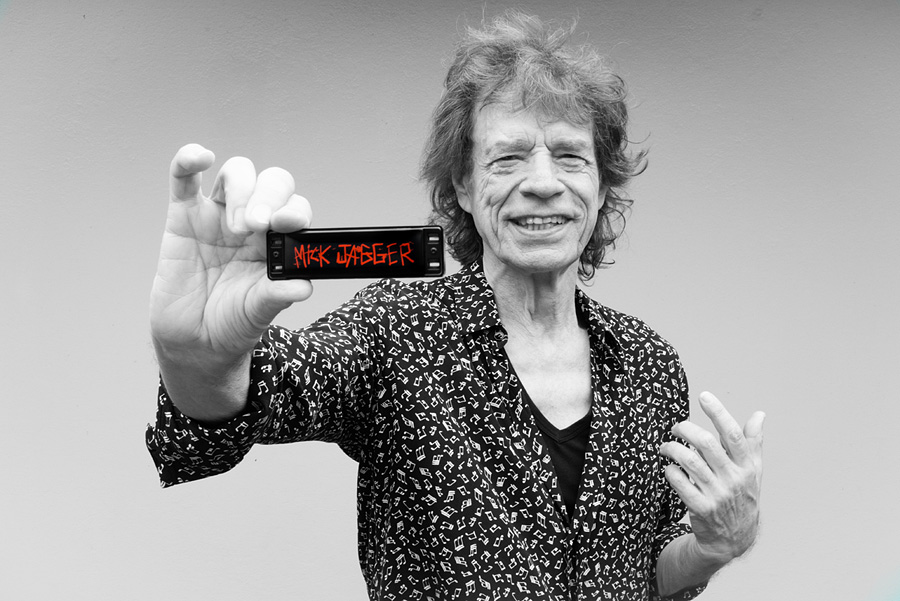
Limited edition Mick Jagger brand major diatonic key harmonica (49.99 STG pounds retail) is now exclusively distributed by whynow Music (https://whynowmusic.com).
The harmonica is a combination of sound quality and design of Lee Oskar (built by Tombo Musical Instr. Co., Ltd., Tokyo) with the musical know-how of Mick Jagger. It is available in 10 major diatonic keys and comes with a Mick Jagger exclusive case.
There is no plan for distribution of the instrument in the Japanese and overseas markets through the conventional music distribution network as of this writing as they are exclusively manufactured for whynow Music.
Jaggar says, “It’s an exciting news! I expect that the harmonica is loved by future generations of promising young artists.”
Lee Oskar shared, “It’s my great honor that such a legendary artist like Mick chose us as a partner in developing the harmonica.”
March New Products
Roland FP-E50 portable type digital piano (https://www.roland.com/jp/products/fp-e50/)
Saito SCL27 Claves (https://www.nonaka.com/saito/claves.html)
Aria Pro II 615-GH electric guitar, 714-AE200LTD, 615-AE200LTD acoustic-electric guitars (http://www.ariaguitars.com/jp/topics/)
Yamaha AG08 Live Streaming Mixer (https://www.yamaha.com/ja/news_release/2023/23012601/)
Roland VMH-D1 V-Moda digital drum headphone (https://www.roland.com/jp/products/vmh-d1/)
BEESMAN “Wood Balm” wax (https://www.instagram.com/reel/Cn68QRBPbEh/)
February New Products
Aria Pro II 212-MK2, PE-AE200 electric guitars, APE-100 electric acoustic guitar, STB-AE200 electric bass, SPS-2000 & SPS-2000FF3 guitar straps (http://www.ariaguitars.com/jp/topics/)
Boss KATANA-50 Mk II EX & Cabinet 212 WAZA guitar amps, KATANA-Artist Mk II amp head (https://www.roland.com/jp/news/1012/)
Edwards E-SNAPPER AL/R & AS/M electric guitars (https://espguitars.co.jp/productinfo/30619/)
ESP SNAPPER-7 Morioka Custom “Red Garnet” 7-string electric guitar, CL-28 Poppin’ Party CLOTH & CL-28 Roselia CLOTH wipe cloth, PA-LS08-2022 LUNACY (SUGINO), PA-VH15 (HIKAZU), PA-VT15 (TERU) & PA-VM10 (MASASHI) picks (https://espguitars.co.jp/news/)
Killer KG-Fascist Vice II electric guitar (http://www.killer.jp/guitar/kg-fascist-vice-ii.html)
Roland GP-3 compact digital grand piano, TD-02KV, TD-02K digital drums, BRIDGE CAST gaming audio mixer (https://www.roland.com/jp/company/press_releases/2023/)
Yamaha STAGEPAS-200 & 200BTR portable PA system (https://www.yamaha.com/ja/news_release/2023/23011801/)
Kawai Ryuyo Factory Installs Green Energy System
Kawai installed solar electric power facility at its Ryuyo factory in Shizuoka Pref. where Kawai grand and upright pianos are manufactured as part of an important project reducing environmental load. Operation started on Dec. 23, 2022.

Having a total of 3,352 sq. meter space using 1,542 solar panels, it supplies 781 MW electricity per year, about 18% of total electricity consumption of the factory.
Thanks to green energy system, the company spokesman commented that the factory effectively reduces 245 tons of CO2 output a year. Ryuyo factory is the first case in the company installing green energy system.
Yamaha Ranked 2nd Highest on Corporate Communication Site User Survey
Tribeck Brand Strategies, a thinktank of Tribeck Inc. which provides clients digital marketing services, DX platform, experience & management, media/advertising agency announced 2022 user survey ranking of corporate communication sites of 252 leading companies in Japan. The corporate sites were judged by 6 factors; 1. Corporate messages, 2. News releases, 3. Technological information/corporate approaches to product quality, safety and security, 4. Approaches to sustainability/corporate social responsibility and environment, 5. Investor relationship, 6. Corporate philosophy & vision.
Yamaha’s ranking has gone from 13th the year before to 2nd this time. User highly praised the company’s approaches to sustainability, corporate social responsibility and environment.
Suntory Corporation, food and beverage manufacturer was the highest ranked, and Yamaha was followed by Shiseido, Fuji Film Holding, Kao, chemical and textile manufacturer.
2022 Retail Music Market Survey
Nearly 40% music retailers reported sales increase
Japan Music Trades recently conducted an annual retail music market survey sending a questionnaire to 151 music retailers nationwide. In 2022 retail music business slowly returned to the pre-pandemic level as the restrictions of travel eased in March, and restaurants and shopping malls extended opening hours in and after the May holiday season. After Japanese government lifted immigration restrictions in October, number of overseas travelers dramatically increased.
All these changes and movements worked for retail music business. Nearly half of responded music retailers reported sales increase over the year before last.
Looking sales by product category, grand pianos electric guitars and in-store music teaching for adults showed excellent performance last year. It is likely that last-minute surge in demand before price hike pushed up sales of expensive musical instruments. Yamaha and Kawai raised retail price of their grand pianos in April and October, respectively, to cope with price increase in raw materials and logistic costs.
Sales growth of electric guitar were largely attributed to increasing demands from professional musicians as live music events resumed. In addition, a popular TV animation program “Botch, The Rock” attracted interest for electric guitar and bass among young generations.
While, more than half music retailers reported sales of upright pianos and digital pianos went down in the year. Enrollment of music teaching studio significantly dropped in 2020 by the pandemic. Demands for learning to play musical instrument revived in 2021, but new enrollment did not reach the level of the previous year.
Business prospects for 2023
The music retailers expect 2023 business to remain unchanged (44%), better (29%), and worse (27%) over the previous year, more positive than the last year survey. They are optimistic in keeping business that people have better accessibility to social events, performance stages and other music-related activities. They also expect further recovery of general economy which will increase demands for music making among people of all generations and growth of overseas travelers visiting Japan.
On the other hand, they are worried about store traffic affected by new variants of COVID-19, continuing price hike of products and possible delay of manufacturer shipment.
InstaChord, a New Innovative Electronic Instrument
An easy to use, but full-blown musical instrument named InstaChord is now distributed at music store chains.
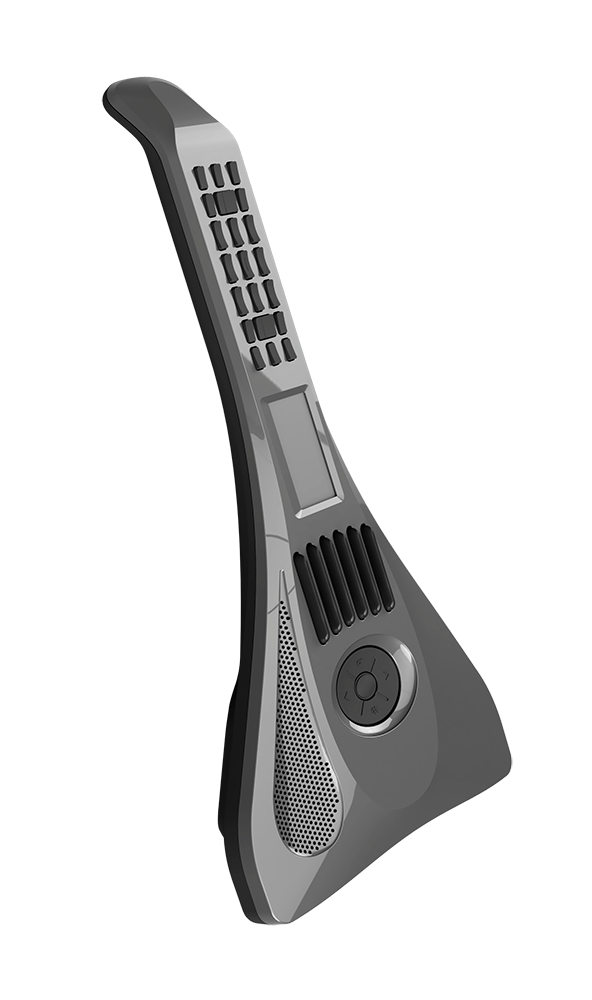
Born in 1975 in Hiroshima, Yuichi Nagata, musician (vocalist), but not good at playing musical instrument, web programmer, advertisement producer, invented the instrument for first time music makers and those guitarists given-up to play. He started commercial base production of the instrument raising 80 million yen far exceeding his original plan of 50 million yen by crowdfunding in 2020.
InstaChord is based on a special chord entry interface using 2 fingers Nagata developed to help his music composition. Then, after a detailed market survey, Nagaya found there was a big market for musical instruments everyone can play without any musical knowledge and experience.
He began direct sales of InstaChord to customer via internet in 2021. To this day, total sales have reached 6,000 units with 200million yen value.
Nagata says, “I wanted InstaChord to be well accepted and keep selling through ordinary music distribution channel in the market in the years to come. So, I never thought of discount sales, nor special offer at reduced price for the benefit of the investors. I’m so grateful more than expected number of people shared my idea and offered financial support. It’s great.”
InstaChord is sold at music stores besides direct sales on the net from last November. A retail sales staff comments, “It’s not a gadget-type instrument”. Another staff says, “InstaChord is an authentic music gear”.
InstaChord comes in a futuristic guitar shape body equipped with control buttons on the neck, and 6 rubber pads likened to guitar strings on the body. Sound is produced by simply pressing a control button to which a chord is assigned and strum rubber pad with left hand. The control buttons are the key to the performance system. Just select desired key of a tune, diatonic chords are automatically assigned to the control buttons numbered from 1 to 9 on the panel. For instance, in II-V-I (two-five-one) chord progression, simply press number 2, 5 and 1 buttons.

In addition to the chord number buttons, it offers Swap button for selection of major or minor keys, b-button which delivers lower half-note, 7th, sus4 and aug(augment) buttons to be pressed together with chord number button.
It provides players with not only versatile music performance but also understanding chord theory.
Nagata explains, “The assigned chords are fixed and cannot be customized by player. It is easy to assign chords in serial number following melody flow, but it is simply a gadget, no longer a musical instrument. I think it is a logical interface for musical instrument that everyone can play music in the same fingering.
“The rubber pads are also important component of the instrument. Player can feel the joy of playing guitar stroking pads with his right hand. It means stroking timing, sense of rhythm and other technical factors are well reflected on performance. Anyone can make musical sound from the very beginning, but as he advances after practices, he can feel pleasure of making music just like he plays guitar.”
Having a battery, speaker, and USB and Bluetooth MIDI compatible capabilities, InstaChord works as a MIDI controller in music production and sound recording as well.
Since it changes chords to scale degree in performance, conventional sheet music can be used simply adding scale degree to each chord. Also Nagai developed a special app automatically changing chord chart to scale degree.
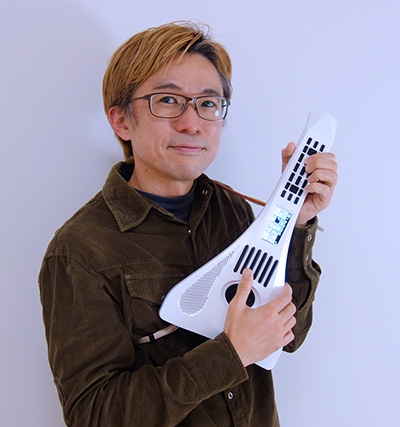
Nagata remarks that the main users of InstaChord are the first-time player with no musical experience and seniors given up to keeping playing guitar. “They are all happy with InstaChord. It is excellent seeing the people never imagined of playing guitar before are enjoying music making!”
InstaChord is increasing exposure on YouTube and other social media recently. User base will expand as distribution through traditional music retail network begins, and new customer will explore unique approaches to enjoy InstaChord.
Nagai expects the true characteristics and capabilities of InstaChord will be best felt by touching and experiencing it at the sales floor of music store. He believes it is a unique music gear even seasoned and serious musicians can enjoy.
Contact Yuichi Nagata
https://instachord.com/instachord-english
6 Music Retailers Talk: New Year Holiday Season Sale
“Guitars, especially electric models have sold well these couple of months. Vintage and custom models as well as artist signature gears are moving well. Imported models have significantly increased shares as shipment level recovered in the fall. It is great seeing sales grow under our business policy, ‘Sell products with true value at appropriate price.’ “Overall business environment is likely regaining the pre-pandemic conditions. On the other hand, our inventory volume is growing. It is a matter of better control of sales and inventory balance. One notable phenomenon in sales is soaring demands overseas. As travel restriction is eased, more tourists from outside Japan visit us lately. More than that, we see increasing cross-border online sales via reverb.com. Weaker yen attracts more foreign customers. We hope the trend continues. “The year-end/new year holiday season approaches, we have sizable number of customers searching gears to buy with bonus on weekends. “We expect good selection of products and well-planned inventory will contribute to the business.”Kazuo Mitsugi, Store Manager, Kurosawa Gakki G-Club Shibuya, Tokyo
“After a new store built past April, we operate sharing 2nd and 3rd floors of our building. Since the former store stood facing the street, it took us a little time to adapt to the new floor plans. “After April, we feel more serious customers visit us than before. In the past we had not a few first time visitors dropping in and strolling the sales floor. The new customers typically select high-ticket bizen works, Höfner and Rickenbacker instruments. During the pandemic, they started to come to us after getting information on internet and online video. As a specialist store of high-quality original guitars, we always keep showing video on products on our website as we understand serious customer needs information. “Our main customer base is 40s and over male adults and married couples. Customers from overseas are increasing now, but we will see more of them come to us in months ahead. “We started year-end/new year sales campaign in the end of November, around the Black Friday. Recent price hike of every product has been a challenge for us, but we keep our policy, ‘Provide customers with value-added products’.”
Tatsuki Moda, Store Manager, Miyaji Guitars Kanda, Tokyo
“We feel sales of wind instruments are slowly coming back. As a shop specialized in flute, we have an exclusive salon for flutist to better serve the local flute community. As its awareness increases, we see more customers visit or call us these days. “Given that number of symphonic band student is declining, it is hard to recover the school market before the pandemic. While adult player is increasing, and business is brisk. We expect to enhance sales campaign in collaboration with our brass instrument specialist store, Wind Crew, in Shin-ohkubo, Tokyo for the coming best season. “The COVID-19-related restrictions are loosened, we see visitors from overseas countries are increasing, though they largely stop by for CD and score. Hopefully the customer searching musical instrument follows in coming months. “We are carrying a massive sales campaign from the beginning of December putting emphasis on single different category every week. We have also realigned the piano floor with additional units displayed for easy experiment and comparison. “After experiencing a host of irregularities during the pandemic, we feel the business environment is nearly returning to the level of 3 years ago. It is my hope that the year-end/new year sales season further pushes up our business.”
Takashi Obara, Store Manager, Yamano Gakki Ginza Main Store, Tokyo
“Growing studio rentals and increasing demands for electric basses and effect pedals tell us the business is coming back at last these days. Sales of electric guitars increased 10%, and business of other fretted instruments, pedal effects and amps are also growing. “Sales are declining in unit, but average unit price is going up. It may reflect the recent trend that the serious players buy instruments with real value. “One notable trend is dramatic increase of cross-border online sales probably because of weakening Yen. The expensive models by domestic makers are driving the total sales. It’s surprising that customers in California purchase instruments made in California from us. As Yen is a bit stronger these days, we see last-minute orders are coming in. “Demands for expensive products are also high among locals. We expect good business for the year-end/new year sales season as we have stocked good selection of high-quality products which can surely meet the customer needs.”
Hiroyuki Yamada, Blue Guitars Buyer/Manager, Kaishindo Gakki, Toyama Pref.
“The market has gradually returned to the pre-pandemic level since this past spring, and digital pianos and electronic keyboards sell well but guitars seem to have lost one-time appeal today. “Though unit sales are slow, adult customer tend to select expensive models priced between 400,000Yen and 500,000Yen. Sometimes they even buy luxury models priced over 1 mil. yen. “We see not much change in sales for wind and fretted instruments in term of sales marketing at the store, but substantial sales of pop musical instruments, particularly small accessories much shifted to electric commerce during the pandemic. Customer browsed floors of brick-and-mortar store in the past, but they are all gone today. Accessories, repair services and music teaching studio operation were the 3 biggest business lines to attract visitors, but we have fewer selection of accessories today. “We have started the year-end/new year sales campaign a little earlier than usual coupled with live events and seminars shelved for nearly 3 years in cooperation with the suppliers. “To meet the growing EC demands, we recently launched an exclusive EC section on the basement floor redesigning part of the event stage. Assigning extra staff, it is now easier to control online sales and shipping. “Also, we upgraded selection of music-themed incentives recently on the 1st floor. They are the favorite items for foreign tourists.”
Masayoshi Ogasawara, Store Manager, Jeugia Sanjo Main Store, Kyoto
“The market is showing a strong recovery. Our business was not affected by the 7th wave of COVID-19, but some categories are now impacted by the price hike though we are not much influenced. “We are a little concerned about the soft sales of digital piano. People rushed to buy the instrument during the last 12 months, but supply exceeds demands today. I am worried that excess supply may damage the healthy sales of digital piano and affect market stability. “Heavily damaged wind instrument market is slowly getting back. Customer switched buying channel from brick and mortar store to online merchant, but now they are coming back to physical store where they can select their instrument by touching keys and hearing the sound. “Black Friday Sale got started at the end of November. We are positive for the special campaign though slow sales of inexpensive instruments bother us. “As travel restriction eased worldwide, we have growing number of visitors from Asia except for China. They help our business continue. “I much expect distribution of the new import guitar brand which was added to our lines under a new dealership agreement I made when I recently traveled abroad for the first time in the last 3 years.”
So Isobe, General Manager, Musical Instruments Sales Division, Miki Gakki, Osaka
2022 Good Design Awards
Japan Institute of Design Promotion(JDP, public interest incorporated foundation)gave Yamaha and Roland products 2022 Good Design Award recently.
The awarded products include Yamaha AG01 USB microphone for live streaming, Intercom System powered by smartphone, SoundUD multilingual Support Announcement System jointly developed with SoundUD, VOCALOID vocal synthesis technology/software (Good Design Long Life Design Award), and Roland T-8. J-6, E-4 AIRA Compact hand-held digital musical instruments, F107 digital piano along with its Roland Piano App.
‘The Best Products Award 2022’ Vote by Music Store Sales Staff
Japan Musical Instruments Association held award presentation of ‘The Best Products 2022’ on October 18 at Yamaha Ginza Studio, Tokyo.
Initiated last year the award celebrates high quality musical instruments, promote their capabilities to the society and aims to increase music makers in the end. The best products of the year are decided by popularity vote of music store sales staff. The award is also presented to the best players/sound creator/DJ of the year, also nominated by music store sales staff and voted by general music fans.
A total of 4,300 music store sales staff completed the vote from June 24 through July 15, and the list of selected products were presented to 29,000 general music fans for vote.
The best product awards of Grand Prix, 2nd Place and 3rd Place awards were given to instruments from 8 categories; piano, guitar/bass, percussion, brass instrument, woodwind instrument, synthesizer/digital musical instrument, music production/streaming system, and the most sensational products of the year.
The manufacturers of the awarded products received the plaque from Takuya Nakata, president of JMIA, (president of Yamaha Corporation) at the ceremony.
The Best Products Awards winners
Guitar/bass: Yamaha STORIA I/II/III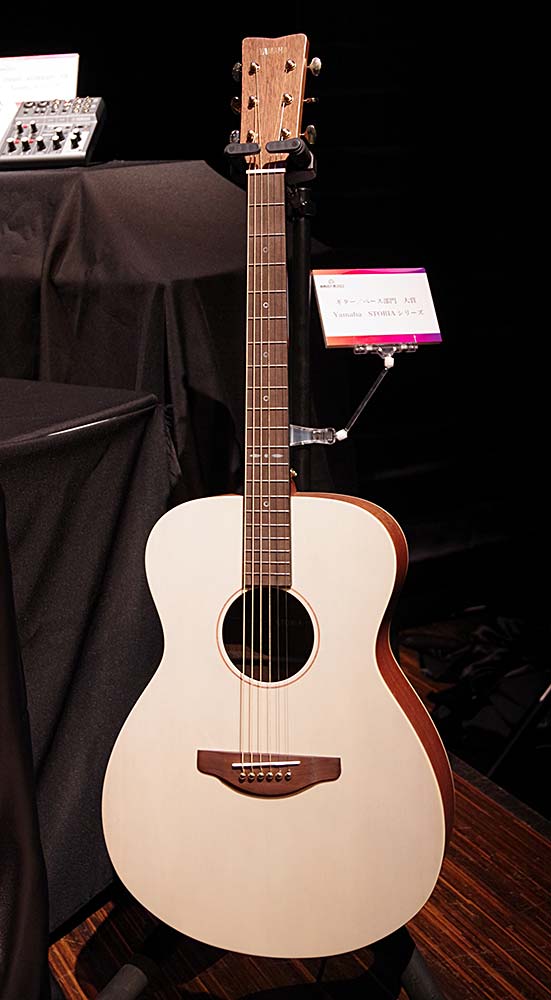
Percussion Roland V-Drums TD-17 Series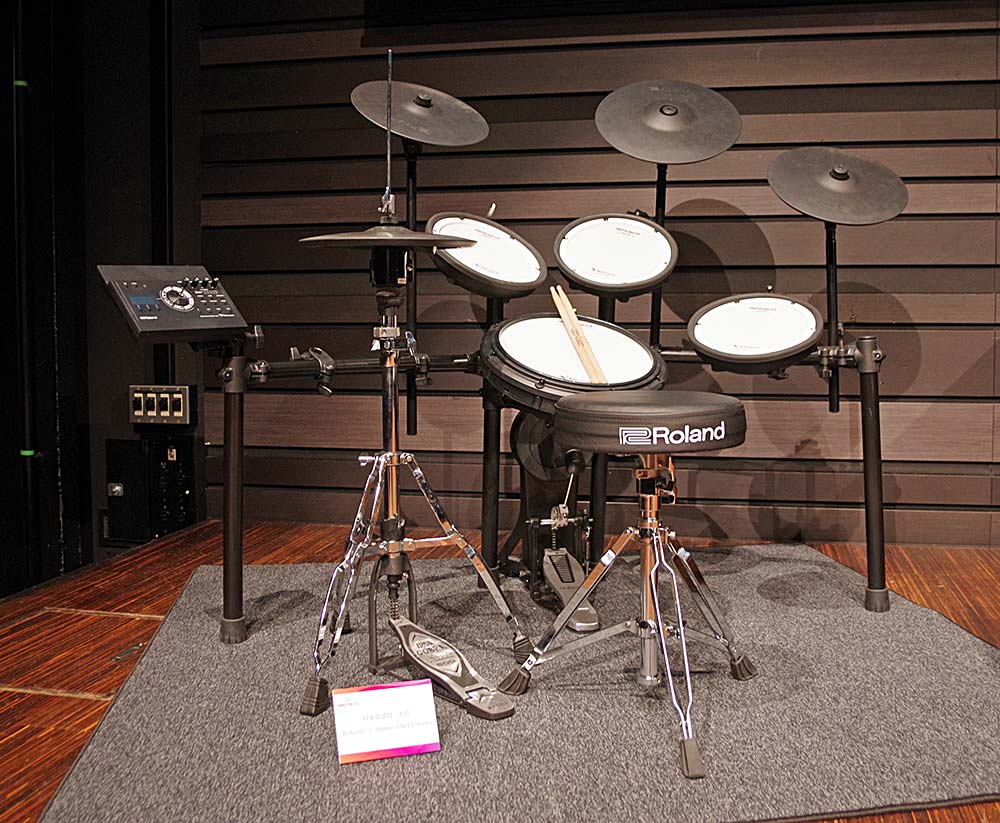
Synth/digital musical instrument: Roland Digital Wind Instrument Aerophone Series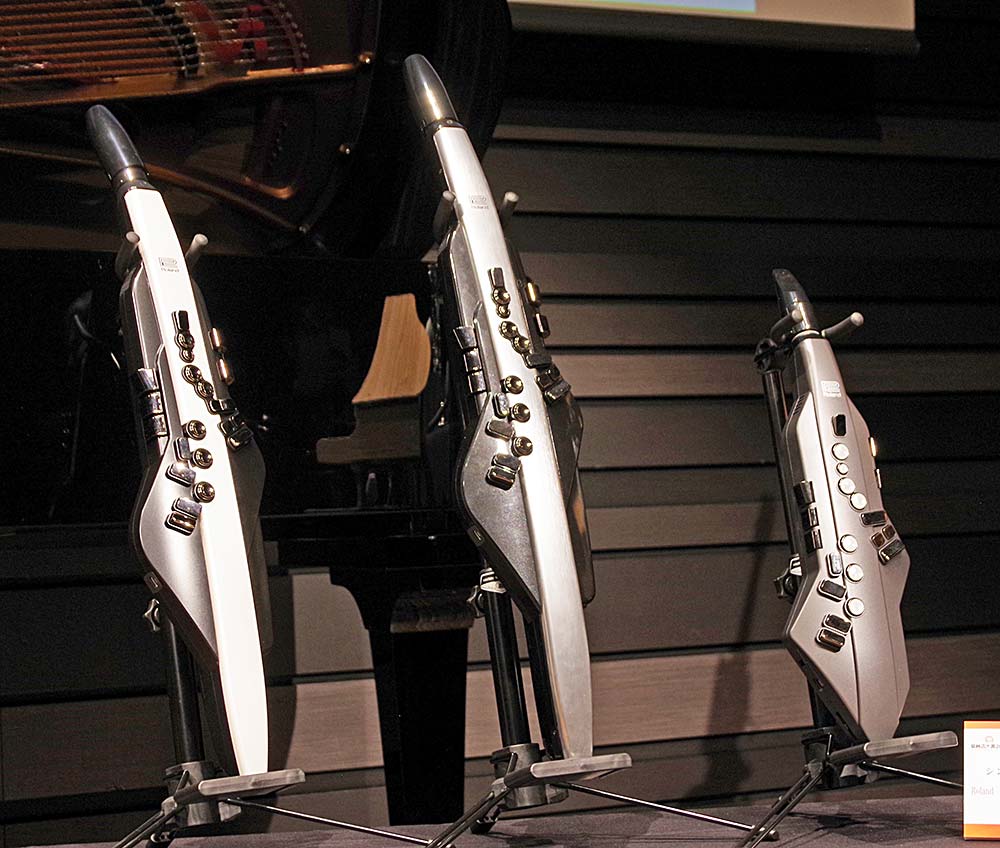
Brass instrument: Bach Stradivarius trumpet 180ML37SP
Woodwind instrument:Selmer Alto saxophone Supreme
Music production/streaming device: Yamaha AG Series AG03MK2/AG06MK2
The most sensational product of the year: Kawai Mini Pianos
The best and most promising player award: Yomii (pianist), Seiji Igusa (guitarist), Yuto Shimazaki (percussion), Green Ray Saxophone Quartet (wind instrument players), SO-SO (sound creater/DJ/performer), Yomii (pianist), and the best artist entertained audience: Koji Seto (video creator)
Toshiaki Hirose, project leader and president of Shimamura Music said, “It is said that 1 in 10 Japanese citizens are active music makers. We know music gives us happiness, courage in life and relief in difficult times. The pandemic has benefitted the industry with instant surge of interest in music making in the society, but we must continue to promote the pleasure of playing music with help of the players making music with the musical instruments provided by the industry. On behalf of the all members of the steering committee, I appreciate very much the music store sales staff supported and heavily involved in the project.”
The award is expected to contribute to boost the business of music store as one music store owner told last year that sales of awarded products immediately drew attention of customers and sales of them increased.
A Great Milestone: NAMM Oral History Program Completes 5,000th interview
NAMM Oral History Program completed 5,000th interview recently. This special milestone took place backstage at the Grand Ole Opry when its Audio Engineer Kevin McGinty was interviewed. First started in 2000, Dan Del Fiorentino, NAMM Music Historian has interviewed worldwide industry veterans and music legends. They include Sheila E, Ikutaro Kakehashi, Henry Steinway, Bill Hanley, Karrie Keyes, and Chick Corea. He commented, "The contributions of those within the music and sound industry may never be fully realized. However, these interviews hope to shed light on how much they have benefited music lovers worldwide."
- NAMM.org - Oral History Interviews
https://www.namm.org/library/oral-history
2021 Music Products Industry Manufacturing Survey by Japan Musical Instruments Association
Japan Musical Instruments Association (JMIA) completed 2021 Music Products Industry Survey of Manufacturers, recently. It covers 12 months production and domestic sales from April 1, 2021 through March 31, 2022.
JMIA sent a questionnaire recently to 86 music products manufacturers throughout Japan and 56 companies responded. We believe the survey depicts the scape of Japanese music products manufacturing (and sales)
Consistent production of keyboard instruments
According to the survey, the manufacturers produced and sold 64.7-billion-yen worth of acoustic pianos including upright grand and automatic player pianos last year. Adding digital piano, total production went up to 81.1-billion-yen which is the largest category sharing 48% of the total.
Last year, the industry sold 12,020 acoustic pianos which was a 25% increase over the previous year, and gained 7.1-billion-yen sales, a 21% increase. The piano industry nearly caught up on the performance of pre-pandemic (12,757 units and 7.7-billion-yen sales in 2019). Production of acoustic piano also went up 20% in unit in the domestic market and 29% at overseas manufacturing bases.
Domestic sales of upright piano increased 25% to 8,763 units and grand piano increased 31% to 3,195 units. It suggests that demands grew as piano competitions started again and piano teaching studios returned to normal operation. But sales of automatic player piano decreased 47% to 62 units.
Domestic sales of digital piano touched the highest level in the last 8 years with 216,000 units, a 3% increase over the previous year, and 14.9-billion-yen worth. Export of digital piano went up 13% to 66.2-billion-yen, while the volume declined 5% to 1,519,000 units. Though offshore production of digital piano which shares 98% of total output slightly went down from the previous year, they outperformed the result of pre-pandemic. All in all, production, and sales of digital piano in 2021 marked a healthy growth.
Electronic keyboard production and sales soared in 2020 following stay-at-home demands grew. Last year, models with standard-size keys declined 22% both in unit and value. On the contrary, demands for models with small-size keys continued with mild 2% decline in unit, but they dropped 14% in value.
Export of wind instruments increases
Export and domestic sales of wind instruments increased 32% to 26.9-billion-yen, but are still below the 2019 level of 31-billion-yen. They shared 9% of the total categories. 2020 export and domestic sales significantly decreased from 30% to 40% affected by the pandemic.
Export of flutes/piccolos increased 48% to 4.2-billion-yen, clarinets, 52% to 1.9-billion-yen, other brass instruments, 56% to 3.3-billion-hen. Value-wise export increased between 30% and 50% for all categories, and almost recovered the business in 2019 in both unit and value.
Flutes/piccolos and saxophones represent the largest product categories among wind instruments, but domestic sales of flutes/piccolos went down 7% to 11,000 units and saxophone, 9750 units, marginal 1% decline. They haven’t yet caught up to the 2020 level.
Domestic sales of trumpets/cornets increased 13% in value but decreased 3% in unit. Trombones and other brass instruments also increased 21% in unit and 31% in value, and 381% in unit and 17% in value, respectively. It’s possible to say that the reports included enormous number of inexpensive other brass instruments sold last year.
Export of stringed instruments including violin, viola, cello, double bass and those electric models, and other types grew 14% in unit, and 43% in value. But domestic sales of them significantly dropped 75% in unit and 20% in value.
Drum sets & single drums sold well
Export and domestic sales of percussion instruments increased 12% to 22.9-billion-yen, a second consecutive growth, the largest since 2016 after JMIA started conducting the survey in the present format. Export of total percussion category increased 15% in unit and 18% in value. Domestic sales were consistent with 9% increase in unit but marginal 2% decrease in value.
Export of drum sets and single unit drums grew 34% in unit and 51% in value. Domestic sales of this category also went up 12% in unit and 16% in value. Export and domestic sales of hardware also increased 7%, and 6% in unit, respectively.
Export of sticks and mallets gained two-year consecutive growth with 106% increase in unit and 57% in value. Domestic sales of them increased 20% in unit and 27% in value as well.
Export and domestic sales of marching drums increased 30% in both unit and value, nearly recovered 2019 results.
Export of table-top xylophones went up 82% in unit and 93% in value. Domestic sales of them exceeded the pre-pandemic level with 26% increase in unit and 24% increase in value.
Electronic drum sets dramatically grew during 2020, but last year export and domestic sales of them slipped down 13% in unit and 2% in value. They continue to drive percussion category sharing 40% of the total.
Electric guitars achieved the largest growth in the last 10 years
Export and domestic sales of acoustic and electric guitars, basses, amps, effect processors/tuners and strings shared 17%, 51.7-billion-yen of the total category. Demands for acoustic and electric-acoustic guitars extensively rose in 2020 as first time and experienced guitarists rushed to music retailers to buy them during the stay-at-home period. The trend continued in 2021, and export of acoustic guitar went up 16% in unit and 31% in value. Domestic sales of them also increased 8% in unit and 40% in value. Export of electric-acoustic guitars went up again 18% in unit and 33% in value. Domestic sales of them followed the same pattern with 6% increase in value, but 5% decrease in unit.
A total of 580,000 electric guitars/basses, an increase of 37% were exported in 2021 gaining 11.7-billion-yen which was a 48% increase. Domestic sales of them recorded 115,000 units, a 137% increase and 7-billion-yen, 101% increase. They marked the largest growth in the last 10 years in unit.
Export and domestic sales of amps declined 10% and 44% in unit, respectively. Export of effect processors went down 18%, while domestic sales of them were about the equivalent level over the previous year in unit with a moderate 3% decline.
Guitar and bass strings kept approving sales performance in unit with 17% increase for export and 4% increase for domestic sales.
Demands grew for melodicas and recorders
Other musical instruments including reed instruments, recorders, ocarinas and Taishokotos declined 10% both in unit and value. Production and sales of harmonicas decreased from 50% to 60%, and there was no report on accordions.
Domestic sales of recorders increased 12% in unit and 14% in value. Export of them jumped up 106% in unit and 16% in value. They showed a mild recovery from the year before but has not exeeded the pre-pandemic level.
Domestic sales of melodicas almost kept the level of the previous year with a minimum 1% decline both in unit and value. Export of them increased 7% in value but declined 6% in unit.
There was no export report of ocarinas. Domestic sales of them declined 4% in value but almost nil in unit which suggests the manufacturers reported only sales value of ocarinas.
Sound export of digital instruments
Export and domestic sales of synthesizers with keyboard and other electronic musical instruments decreased 11% in unit but increased 1% in value. Manufacturers reported excellent export of synthesizers with keyboard with equivalent value to the previous year and other electronic musical instruments with 14% increase. While domestic sales of synthesizers with keyboard dropped 15% in unit and 5% in value and electronic musical instruments dipped 3% in unit and 11% in value.
Annual domestic production of other electronic musical instruments broadly varies from 200 units to over 20,000 units. A total of 8,367 units were built in Japan in 2020 but there was no report in 2021, the lowest level in the last 8 years. Offshore production of them increased 23% than the year before to 290,000 units.
Compact PA system recovers
Stay-at-home demands boosted the sales of DAW, microphone and interface in 2020. They lost energy last year except power amplifiers which achieved an 8% increase of domestic sales and 18% increase of export. Domestic sales of compact PA system were brisk with 76% and 82% increase in unit and value, respectively. They nearly gained the level of 2017 and 2018. As with the 2020 survey, the manufacturers seemed to report only value of exported speaker system. Accordingly total value of them was 5.38-billion-yen.
Effect Pedals: Which Brands and Models Sell Most?
“Our customer base is consisted of every age group, and they include professional artists and studio musicians. As live events have revived, musicians take models priced around 30,000 yen, but the best-selling items are inexpensive multiple-functioned effect pedals, such as BOSS GT-1, Zoom G1 FOUR and G1X FOUR purchased by junior and senior high school students who are first time guitarists started playing the instrument in pop music band.
“They study sound making and devices posted on YouTube. It often happens that such video movies of popular artists using effects board on live stage instantly attract attention of young fans and sell well. For example, VEMURAM, a Japanese brand which builds overdrive and fuzz units made a sensation in the world market after an overseas artist used it and uploaded the video clip.
“We have about 600 effect pedals of different brands on the shelves. It’s easy for customer to find the most desired unit as we hear about his or her guitar and amplifier in use and pick up best effect pedal from our rich selection. I feel I’m learning from customer in this communication process. Customer satisfaction comes first than anything else at us.”
Ryo Kobayashi, Amp Station, Ikebe Gakki, Tokyo
“We see a definite sign of economic recovery these months. Located in Ochanomizu, the ‘town of musical instruments’, broad range of customers from senior high-school students to senior citizens visit us. While young customer seeks new and unique effect pedals, not a few people like to buy traditional units such as Boss models and Ibanez Tube Screamer. We always stock these lines in the inventory.
“We also see change of trend from overdrive to fuzz. Customer tends to buy specific fuzz units which popular artists play on stage. Multi-effects pedals are the choice for entry level players as they provide versatile effect modes. Thanks to advance of digital technology, the fuzz machines today offer far richer tonal effects than previous models and they are becoming choice of even seasoned players.
“Well thought marketing directly leads to sales of effect pedals. We are ready to support customer with detailed information on products matched to their musical environment. Effect pedals easily become obsolete, but I believe we can overcome the problem with meticulous marketing.”
Shinya Yasumoto, assistant manager, Ishibashi Music Ochanomizu Main Store, Tokyo
“Consumer response to new products has become more moderate than before. It’s probably because new effect pedal makers joined the market, and wider selection of products are offered as a result. On the other hand, the market trend is set by influencers. It happened that the effect pedal used by popular guitarist AssH in a video clip co-performed with YOASOBI totally disappeared for 12 months from the sales floor of music store.
“The trend is effect pedal and multi-effects processor. Zoom G1 FOUR is popular among entry level players. They are a good choice when it comes to specification and price, but I am a little worried if the entry-level players can use the unit first bought as they expected. Our sales staff explain those units may be a bit hard to control for them, and suggests models matched to their needs. We want them feel fun and happy adding an effect pedal to their music.
“Another trend is growing demands for reverb units. Delay units are out. It naturally reflects today’s music trend.”
Yasunori Ishikawa, Ochanoizu Station Store, T. Kurosawa, Tokyo
“We concentrate on unique lines of effect pedals including self-imported and very maniac units. Our key customers really love them. Sales much depend on exposure on social media these days.
“Customer largely in their 30s, 40s and 50s visit us to try interested units themselves. Reflecting our strong selection of vintage type guitars and amps, we see growing demands for distortion units for more retrospective sounds than modern types. Sales of expensive SOLODALLAS units priced over 200,000 yen are increasing now among players seeking sound of Angus Young from AC/DC.
“Like many other products, we see price hikes of effect pedals. How much they will affect the sales of effect pedals is unknown, but we must watch carefully. Given that guitarists always seek second, third or fourth effect pedals, we will enhance our business concentrating taking and trading used units in.”
Takuya Mori, Miyaji Guitars Kanda, Tokyo
“After a bunch of new Japanese hand-made makers joined the market in 2015, sales of popular effect pedals diversified in the matured market. When the world went into the pandemic, demands grew for home studio recording and units that deliver sophisticated sound. Music makers turned to pick up units themselves for upgraded sound.
“Recently, a new business style came in as brands take social media as an effective marketing tool. While existent makers are struggling with shortage of parts and commodity price increase, a Japanese hand-made effect pedal builder showed outstanding performance with models priced around 30,000 Yen. The products sold out instantly when they were put into the market. In contrast, some established brands have difficulties to promote new models failing to spread sufficient information to support user.
“The trend is multi-effect processor which offers high quality sound and supports home studio recording at reasonable price as well as expensive cables to be used in sound recording.
“We have characteristic models not found at other stores to better meet individual needs of customer. It’s like offering a spot for treasure hunting. In addition to information obtainable from social media, we are always on the lookout for catchy items through talks with customer at the sales floor. “
Marina Yoshida, Miki Gakki Umeda Store, Osaka
“We came to sense little change in sales of pedal effects first in summer, last year. It was more visible by the year end. During the pandemic, people stayed at home doing sound recording and music production. They have got back to physical store.
“The best seller items here are digital pedal effects, in particular multi-effects processors priced over 200,000 yen. The units of BOSS and MXR sell constantly. Demands soared at the exact time when products went out from our shelves by shortage of chips. Import brands were particularly had hit as they take time to replenish the inventory. Sales of related products including switcher, power supply and board-mounting device are also strong.
“Music activity revived around the early May holiday season. Sales of compact type effect pedal and orders for custom-built effect board increased. As we totally relied on net sales during the pandemic, it’s so nice that we see customer at the sales floor trying and selecting favorite unit.
“Recently we have produced original pedal effect as we mark 75th anniversary in collaboration with a Japanese brand. The initial order sold out and the second order follows. We plan to promote this exclusive unit featuring original functions to increase customer traffic.”
Hisahiko Morikawa, store manager, Watanabe Musical Instruments Osaka Store, Osaka
Roland Store Opens in London
Roland Corporation opened its first retail shop, Roland Store on Denmark Street in London in August. Marking 50th anniversary this year, Roland has successfully established a global sales network with help of local distributors. Consolidated earnings closed in December 2021 shared 88% of world sales.
The Roland Store in London represents the first step for the company to provide the visitor with an opportunity to inspire their musical imagination and experience all Roland products and processes of music production.
The visitor can make online appointment to the store to enjoy versatile services, products demonstrations by Roland Product Specialists who also offer musical solutions suitable for individual guest from the standpoint of musician and sound creator.
The visitor is invited to experience ASX (audience Specific Experience) System, an integrated control system coordinating lighting, sound and video movie contents on the monitor screen. Roland plans to install the ASX System in other Roland Stores to be opened in coming years.
Roland Store concepts are based on Roland philosophy that is critical to open retail outlets globally in the center of every major music market. London serves as a key location for music, media and culture, and more than anything else, home of music business in U.K.
Gordon Raison, Roland Corp. CEO commented, “It’s our pleasure opening first Roland Store in London. The store not only provides visitor with Roland products and services directly but also presents fun, creative experience and intimate communication with our staff.”
Photos:
Digital drum section comes with fully controlled lighting system. (top left)
The visitor is invited to try every product on display. Apparel goods, cables and other accessories can be shopped. (top right)
Product specialists are stationed at Boss guitar related products section. (bottom left)
Synthesizer/digital piano section (bottom right)
Roland Acquires DW

Roland Corporation announced on September 12 that the company reached an agreement with U.S. drum manufacturer Drum Workshop Inc. to acquire DW through a Roland’s new subsidiary to be established soon in U.S.
Roland has been manufacturing V-Drums digital drum line since 1997. In 2020 V-Drums Acoustic Design series which adds design concepts of acoustic drums joined the line.
Launched in 1972, DW has designed, manufactured, and distributed acoustic drums and percussion having Pacific Drums and Percussion, Latin Percussion, Gretsch Drums and Slingerland brands in addition to DW drums and Hardware.
Roland expects to accelerate development works of innovative acoustic and digital drums and percussion inspiring next generation drummers and musicians.
DW CEO Chris Lombardi and co-founders Don Lombardi and John Good continue to manage DW business after the acquisition.
Gordon Raison, Roland president, CEO commented, “DW is known as a distinguished company for its unique achievements in the industry. I have been greatly impressed with the quality of DW products, rich human resources, and reputable craftsmanship. DW has, as Roland has, pursued history of musical innovation for decades. We continue supporting DW so that they can conduct best possible business in the years to come.”
Chris Lombardi, DW CEO agreed, “We see Roland’s philosophy to seek innovation in every way exactly fits our corporate policy. We are looking forward to work together and provide artists and musicians throughout the world with incomparable products and services.”
Nihon Ongaku Competition Piano Division Sets A New Regulation for Selection of Performing Instruments
Nihon Ongaku Competition (NOC) closed entry application for the 2022 competition to be held this autumn on July 14. Under the new regulation, all contestants are required to perform pianos of 3 individual piano makers for the 3 preliminaries.
So far, International Tchaikovsky Competition, International Chopin Piano Competition and other world-renowned competitions designate several official piano brands to be selected by contestants. Japanese competitions largely fix one single brand or several brands for selection by contestants.
The new guideline requests all contestants of the 2022 NOC perform Yamaha piano for the 1st preliminary round, Bechstein piano for the 2nd preliminary round and, Steinway piano for the 3rd preliminary round. Four finalists can choose anyone of the 3 brands. It also regulates all contestants to perform at least one single piece of Chopin among others for the 2nd preliminary round.
This is a kind of revolution in the history of Japanese piano competition in terms of judging artistry, musical expression and performing technique of promising pianists on different piano brands all through from preliminaries to final round.
Guitar Trade Show Yokohama Music Style Vol.2
64 Manufacturers, Distributors, Dealers and Collectors Take Part
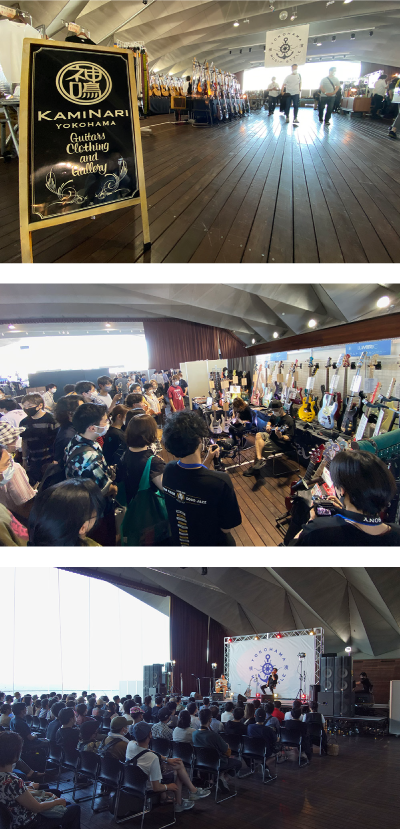
KAMINARI GUITARS/F.A.D, YOKOHAMA of Onkyo Shokai Co., Ltd., Tokyo-based distributor of electric guitars, sound and related products held the second session of Guitar Trade Show Yokohama Music Style Vol. 2 on June 25 and 26 at Yokohama Osanbashi Hall.
First took place in 2019 for the purpose of finding prospecting guitarists as part of Marine Music Festival, but it suspended following sessions because of the pandemic. This year, the organizer redesigned the concept of the event to an exclusive trade show for guitar shops, collectors, guitar builders and guitar manufacturers.
A total of 64 guitar manufacturers including member companies of GEN (Gakki Engine of Nippon), independent guitar builders and collectors took part and drew 3,400 visitors for the 2 days.
The event allowed the visitors to experience sound and touch and buy the exhibited vintage, old and unique guitars as well as accessories. Total sales reached around 7.7 million yen.
Fifteen name and promising artists enthralled the guitar and music enthusiasts with overwhelming technique and performance at free live concerts, and entertained them with talk sessions and seminars. Admission fees were; 3,500 yen, the same day ticket for adult, 1,500 yen for student, free entry for the students under 15.
In contrast to ordinary guitar exhibition/sales events of which visitors are relatively older than other events, the Guitar Trade Show Yokohama looked to be supported by younger age group including students and music enthusiasts.
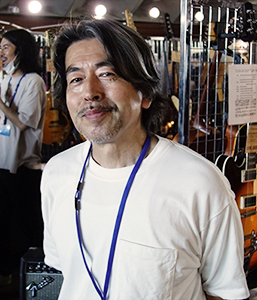
Katsuo Hahsimoto, president of Onkyo Shokai (photo) said, “The industry definitely needs this type of event that presents visitors real-time musical experience and to increase guitar players and further develop the market. We expect the Guitar Trade Show can serve as a driving force for other guitar events held in different areas.”
The organizer plans to hold the 3rd session of the event on July 1 and 2, 2023 at the same site.
2022 Music Retail Report (Jan. – June)
2022 business started early January in the growing threat of Omicron variant, but as corona virus-related restrictions eased after spring, we are returning to pre-pandemic social conditions. Live events got started again, and school music bands are finding increasing opportunities to perform for audience.
Early June, Japan Music Trades interviewed 40 leading music retailers throughout Japan to know YTD music products sales and business trend.
Many music retailers commented that customer traffic increased early May as COVID19-related social restrictions moderated, but only 57.5% of them replied that sales grew, 30% reported decline, and 12.5% mentioned consistent over the corresponding period of last year.
The interview showed 37.5% of the music retailers most expected to resume musical events and music promotional activities which they restrained for the last 3 years in coming months. 17.5% also expressed to upgrade product selections, and 17.5% were interested to redesign sales floor more attractive for customer.”
Here are the excerpts of the interviews of 15 music retailers
“Competitions, live events as well as school music activities are back. We see a growing sign of recovery in the market. Probably, we can gain around10% sales increase this year. Though we had been suffered from shortage of products supply since last couple of years, the situation has much improved these days. Having rich selection of school instruments is the key for us as it allows students to choose most suitable instruments from the broad inventories.
“We feel adult players who started music making for the first time in the last two years are increasing. The virus much affected our business, but I say it brought us unexpected opportunities to expanding base of music makers.”
Mitsuhiro Sekiya, president, Sankyo Gakki, Sapporo-shi, Hokkaido Pref.
“New cases of COVID-19 Omicron variant still impact business in this area. Entry models of guitars, drums and synthesizers are hardest hit as band students ceased coming to the store. While demands for used instruments including original and vintage models are growing. In addition to those unique guitars, we are now more concentrated on purchase of used digital pianos and digital drums.
“Much of our business relies on school market. What we are concentrating now is to promote our store, teaching and rental studios to the local students and band members. As part of our marketing plans, we plan small concerts for music course students for the first time after the pandemic. Real-time music experience is the largest advantage that physical store can offer.”
Fumiki Togawa, president, Groovin’ Music, Hachinohe-shi, Aomori Pref.
“Purchasing pattern greatly differs area by area in Akita. It’s not surprising that parents in Akita city buy bass clarinet, bassoon and limited edition flute priced around 1 million yen as a congratulatory gift of entering senior high school for their children.
“The pandemic gave me a lesson for future business, adapting to change of society and lifestyle. How much environment changes, our policy to be a reliable music store in the community will remain unchanged, I believe.”
Shintaro Izumi, president, All Musical Instruments Shop Kaneki, Yokote-shi, Akita Pref.
“Curtailed school music education is still affecting our business. Shortage of supply of digital piano also impacts our sales.
“Band music at junior high school is threatened as teachers face work style reform and declining enrolment of students by low birthrate. I expect the music products industry can work together to support music activities offering players performance opportunities.”
Yukiyasu Kanuka, Managing Director, Tosando, Morioka-shi, Iwate Pref.
“Sales and music teaching operations are improving after the May holidays. We also closed our annual sales campaign successfully in May though not at the level we previously experienced before the pandemic.
“It’s good that we revived musical events for customers and students in almost the same scale and timing as 3 years ago. Real time experience is the edge of the music retail business. “
Masatoshi Matsuura, President, Sanritsu Gakki, Sendai-shi, Miyagi Pref.
“Shipment delay of imported products has been the largest challenge. In addition, we are much worried that price hike will continue due to weaker Yen. It may influence purchase decision of customer in the long run.
“We have difficulties to stock digital piano, particularly of the targeted price range. As to entry models we have substantial inventory, but they face serious competition with mass merchants and Internet retailers.
“A larger network and collaboration with outside industries including local café and restaurants as well as artists can expand approaches to prospective music makers, we think.”
Yuichi Ueda, President, U-One Music, Fukushima-shi, Fukushima Pref.
“We plan to carry our original promotional activities, for example, violin salon concert arranged with on-site sales promotion,sales campaign inviting artists we are closely associated, and have them play multiple models of different makes at the sales floor.
“Nevertheless, we are responsible for supporting music activities as a music store in the community.”
Zenichiro Tomioka, President, Tomioka Music Head Store, Yamagata-shi, Yamagata Pref.
“While sales of new products remain stagnant, demands for used guitar is growing. Regardless of price range, unique and vintage models sell out instantly as they are put on shelf. We buy more used guitars these days as retired businessmen bring their gears or sellers increased in the pandemic.High inventory turn out of used guitars well compensates loss of sales of other categories.
“We have done whatever we can from physical store marketing, net sales, cultivation of school market to enhanced studio and rental businesses during the pandemic, and all our efforts to survive have paid. In rebuilding our business, we are shifting responsibilities to younger generations. We believe they will explore the business with innovative and original ideas.”
Shigeki Ebara, Store Manager, Dust Bowl Musical Instrument Shop, Isesaki-shi, Gunma Pref.
“Business is gradually getting back this year. Sales of high-end guitars are growing among professionals and core user group. Large stack-type amps are also selling well. Installation business goes well but 90% of event projects were lost in the last 3 years.
“Demands from pop music bands at school continued during the pandemic as school music activities were not much affected in this area. I believe we can keep supporting them and meet the demands for music making. Because people stayed home longer than before and have increased time for leisure, new applications for music lesson programs are growing.
“There is more we can do in doing business online. How can we show touch and easiness of play of listed instruments? Customer wants more details of products when shopping online. We want to find right answers.”
Shoichi Onuma, President, Music Plant, Tsukuba-shi, Ibaraki Pref.
“While we feel customer traffic and demands returned to near the level before the pandemic, shortage of products and ongoing price hike impact recovery of business and market. Newly adopted ‘work from home’ practice has caused decline of adult music makers dropping in store after work in the evening of weekdays.
“Online sales of device for music production and streaming at home dramatically increased last year. But it has passed the peak of sales this year. We see customer wants real time musical experience and live music performance more than ever. To meet the needs in changing society, we built a new retail structure that is to offer customer of acoustic instruments digital applications that they have never experienced before such as equipment for music production, streaming and recording on the same floor.”
Masaki Yamada, executive managing director, Ikebe Musical Instruments Store, Tokyo
“Business is apparently returning to the level of pre pandemic, but sales of guitars priced over 300,000 yen remain slow. Just because wholesale price of guitars is increasing, it’s uncertain that customer accepts the price hike at retail level.
“Physical store and net sales should be well coordinated in retail business. We feel customer is more inclined to real time experience, and to feel touch and sound of instruments themselves at sales floor. To better serve their needs, we are determined to stock best possible selections of guitars.”
Chihiro Kudo, Supervising Manager, Ishibashi Music Corporation, Tokyo
“The flagship model of Kawai, Shigeru Kawai grand piano has been much appraised since last year after the piano drew attention at the last Chopin Competition. Compared with the period before the pandemic, sales have nearly doubled.
“On the contrary, sales of digital piano were impacted by delay of shipment related to lockdown in Shanghai and chip shortage.
“The pandemic reminded people that music and musical instruments can make their life richer, brighter and bring wellness. We believe what we can offer customer as a physical store is real time experience, face-to-face communication and information.”
Tomohiro Ohuchi, Store Manager, Kawai Omotesando, Tokyo
“We have renovated our outlets one by one in the last couple of years. The redesigned exterior and sales floor look to be well accepted by customer, ant it has much contributed to increase sales of guitars offsetting dip of other product categories during the hard times.
“There is no difference among net sales, mail order and in-store sales today. They all work making sales success when properly coordinated. Intimate communication with customer and helpful advice are required when selling online. As a matter of fact, outlets free from the concept of existent business models as online, mail order and physical stores are doing successful business.”
Kaita Nose, Manager, T. Kurosawa & Co., Ltd., Tokyo
“Sales has not yet completely returned, but trombone and tuba which we have heavily promoted so far keep outstanding sales. We are confident in high standard of quality of our products. Customer will understand it by looking and experiencing the instruments at the sales floor.
“Our efforts to improve our website, develop original software applications and products selection during the pandemic are now paying.”
Shinsuke Harada, Store Manager, DAC, Tokyo
“We feel demands are growing for wind and percussion instruments these days. School bands have started activities again and adult players come to us to search upper class models.
“Much of our business shifted to EC in the last 2 years, and our business expanded as we expected, but we see customer returns to the sales floor after May. We appreciate this move as we can communicate with customer in person and offer them what they need.
“Joined Hibiya Music Festival in Tokyo in June, we felt strong desire of people to go out and enjoy music together with friends. Exactly it’s the time we start musical events again not held for the last 3 years.”
Shinya Takano, Manager, Sales Division, Yamano Music, Tokyo
Ikebe Musical Instruments Store Carries Out a Campaign to Save Ukrainian People
Since last April 1, Ikebe Music has been promoting distribution of original pin badges, stickers, and picks produced in collaboration with Ryo Honda, illustrator, and cartoonist to help support Ukrainian people. Ikebe flagship store in Shibuya, Tokyo supports the charity with a special digital signage of illustration works produced by Honda set up at the sales floor. Other 26 locations of Ikebe and web stores in Tokyo and Osaka areas are also carrying out the campaign.
Ikebe will donate proceeds from the campaign to WFP of United Nations, which Honda serves as a director to be used for rescue programs for refugees escaped from the atrocities in Ukraine.
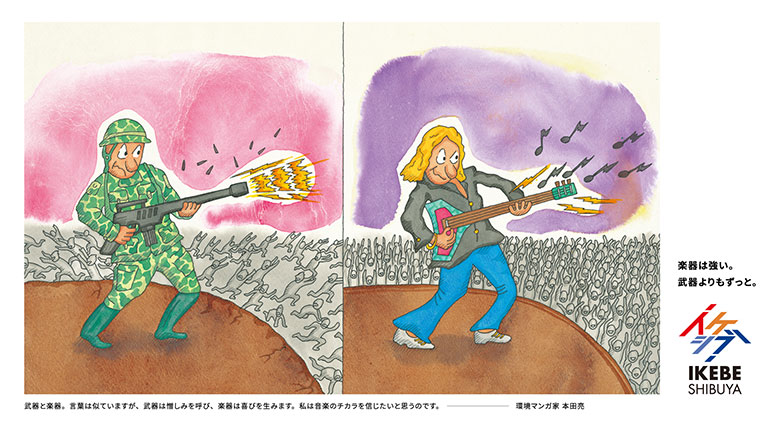

Tokyo Handcraft Guitar Festival 2022 Held After 2 Years Suspension

First held in 2005, Tokyo Handcraft Guitar Festival (THGF), an exhibition of handmade guitars and ukuleles by domestic and overseas master craftsmen, and Super Acoustic Live took place on May 21 and 22 at Sumida Industrial Building Sunrise Hall for the first time after outbreak of the pandemic. In addition to hand-built guitars and ukuleles exhibited for review and trades, it provided instrument makers with opportunities to buy related parts, accessories, and wood materials.
Exhibitors slightly declined because of the corona virus, but it drew 79 luthiers and instrument makers including not a few first-time participants.
The visitors enjoyed seeing and experiencing highest quality models with characteristic features on display, talking with the instrument builders in person, placing orders and live concerts.
The 2-day event drew a total of 1,400 visitors with 1,500yen admission fee paid per day including representatives from music products industry, and professional musicians.
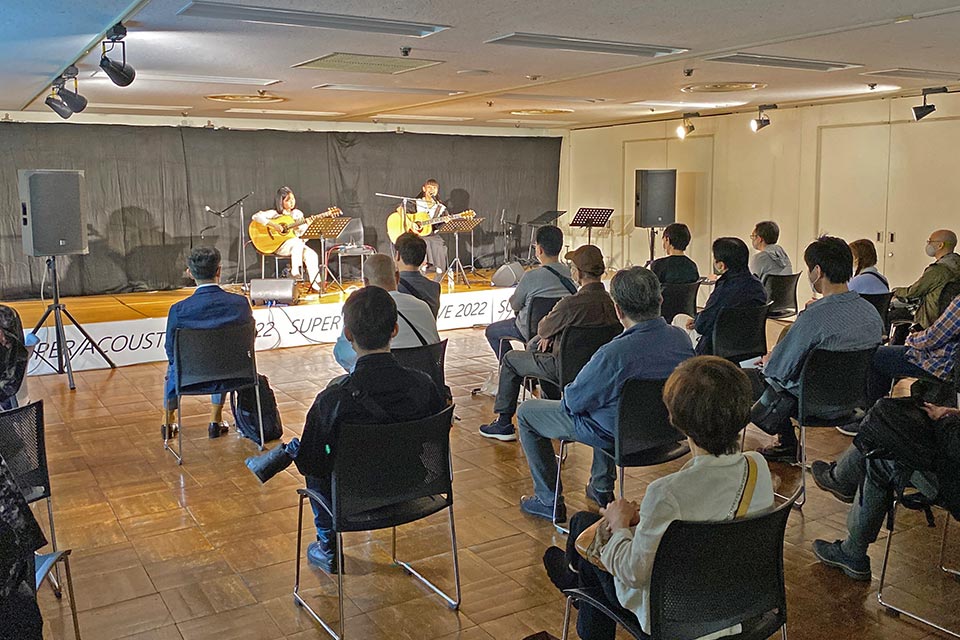

The exhibitors commented that they confirmed the real-time event could provide all the people involved with a stage to showcase products and a place of communication, and exchange information.
Miaki Inoue of THGF Steering Committee said, “Though the exhibitors declined 30% and the visitors, 10% over the last session 2 years ago, we are very pleased that we welcomed more than expected number of visitors. The atmosphere was great, the musical events were well accepted. I believe both the exhibitors and visitors were happy with the result.”
2023 THGF takes place on May 27 and 28 at the same site.
Obituary Yutaka Uchida (1938-2022)
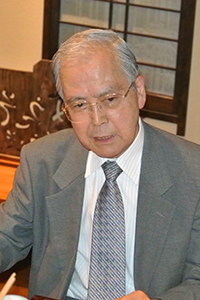
Yutaka Uchida, former senior vice president of Zen-On Music Co., Ltd. and honorary advisor of Japan Association of Music Publishers passed away on April 24 at the age of 84.
Holding senior management positions within Zen-On, he also served as a key member of music publishers steering committee before Japan Association of Music Publishers was set up in 1986. He was selected to be the first secretary general of the Association. He continued contributing to the activities of the Association after stepped down to advisor in 2009. In 2011, the Association became a general incorporated association.
Yamaha Enters Game Market with New Sound Products
Yamaha presented a compact mixer and headset exclusively designed for game streaming and voice chat on YouTube from April 20 through 22.
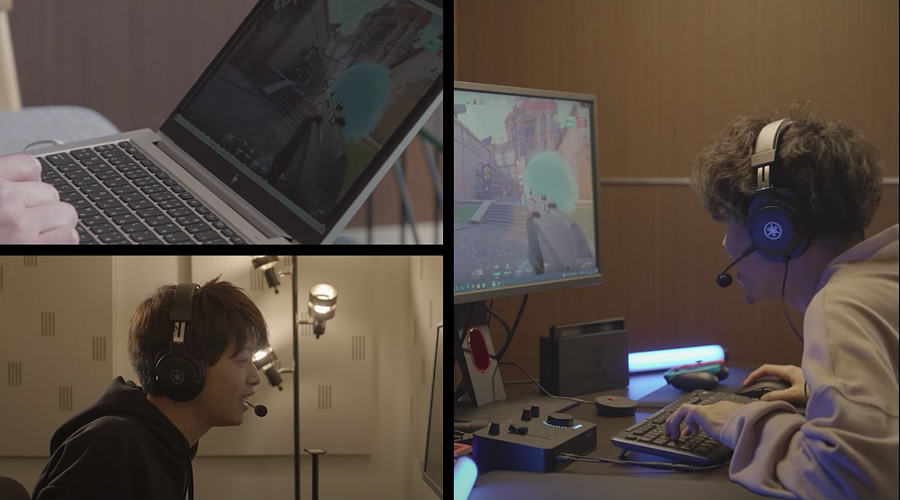
Takanori Kojima, manager of Yamaha Music Japan LM Sales Division said, “ZG series game streaming mixer is the first product we developed for the growing online game market. In addition to ZG01 compact mixer, we launch YH-G01 headset microphone and ZG01 PACK, a package of ZG01 and YH-G01. We are excited to offer the online game user attractive products and promotional programs.”
ZG01 is the exclusive mixer to provide the best audio environment without any other device. Game streaming and voice chat were demonstrated using ZG01 online.
Yokohama Music Style Vol. 2: Guitar Trade Show
The second session of Yokohama Music Style, one of a kind guitar trade show inviting guitar shops, collectors, guitar builders and guitar manufacturers from all part of Japan takes place on June 25 (Sat.) and 26 (Sun.) at Osanbashi, Yokohama.
To be held after cancellations in 2020 and 2021 because of the pandemic, the event offers visitors exhibition of products, collector items, and trades of the exhibited products and outlet items. The visitors are also invited to live performance and talk show by name musicians at a stage set up in the site.
Guitar Trade Show is open from 11:00 to 19:00 on June 25 (Sat.), from 11:00 to 17:00 on 26 (Sun,) Ticket required; ¥3,500 same day ticket, and ¥2,500 early bird ticket. Student tickets ; ¥1,500 same day ticket, ¥1,000 early bird ticket.

Yamaha’s 2021 Profit Increases 40%
According to Yamaha financial results announced on May 11, net profit of the company for the fiscal 2021 closed on March 31 increased 40% to 37.3 billion yen. Total sales for the term increased 9.5% to 408.2 billion yen.
Despite chip shortage and challenging logistics environment affected the musical instruments business, every segment for both domestic and overseas markets achieved sales increase as the global market regained strength.
Impacted by global chip shortage, sales of audio and ICT products decreased 6.6% to 96.9 billion yen. While sales of professional audio products increased thanks to growing demands. As a result, total sales of the segment declined 6.9 billion yen.
Recovering economy helped boost the sales of electronic device and parts for automobile segment. By contrast, FA products struggled. Total sales of parts, device and miscellaneous products segment advanced 5.3 billion yen accordingly.
Yamaha expects 440 billion yen total sales, a 7.8% increase and net profit of 37.5 billion yen, a 0.7% increase in 2022 given the present favorable market conditions of musical instruments as well as improving products supply.
2021 Japan Music Products Production, Import and Export
Japan Music Trades has listed 3 music products statistics compiled by The Ministry of Economy, Trade and Industry (sales and export), Shizuoka Pref. Musical Instruments Manufacturers’ Association (sales and export), and Customs Bureau, The Ministry of Finance (import and export) in every April issue so far. Here is a summary of the 2021 statistics.
Strong growth of export and import
According to the statistics compiled by Shizuoka Pref. Musical Instruments Manufacturers’ Association, total piano sales and export which represent the largest product segment of the total sales increased 22% to 43,654 units and 24% in value to 27.67 billion yen in 2021. The considerable increase may reflect backorders accumulated during the stay-at-home period in 2020 were shipped, as well as trade-up demands created by concert venues and public halls as music activities resumed, and sales increase at music teaching studios in town.
The statistics of the Ministry of Economy, Trade and Industry in Japan show sales and export of electronic pianos and organs, wind instruments guitars and electric guitars increased from 10% to 15% individually.
The COVID-19 continues to affect our life and society, but it looks that the industry is moving ahead toward re-start of business.
Sales of electronic keyboards dramatically increased in 2020 backed by brisk growth in demand during the lockdown. A year later, the boom somewhat diminished, and the category sank into the lowest level in the last 15 years to 69,181 units or minus 20%, but increased 5% in value to 2.8 billion yen.
Total export rose 25% to 75.6 billion yen in 2021. All categories except instrument strings gained growth in value, but bowed string instruments, reed instruments, other woodwind and brass instruments, music boxes, parts and accessories for other musical instruments went down in unit.
Export of acoustic guitars, drums and electric and electronic musical instruments with keyboard increased 23%, 31% and 31% in value, respectively. Electric guitars, parts and accessories for piano also increased 40% and 39%, respectively.
Reflecting recovery of the market from the damage by the COVID-19, import of major product lines increased; upright pianos (35%), grand pianos (23%), bowed string instruments (159%), other woodwind and brass instruments (20%), electric and electronic musical instruments with keyboard (26%), parts and accessories for piano (34%).
Memorial Gathering for Mototsugu Shimamura, Shimamura Music Founder
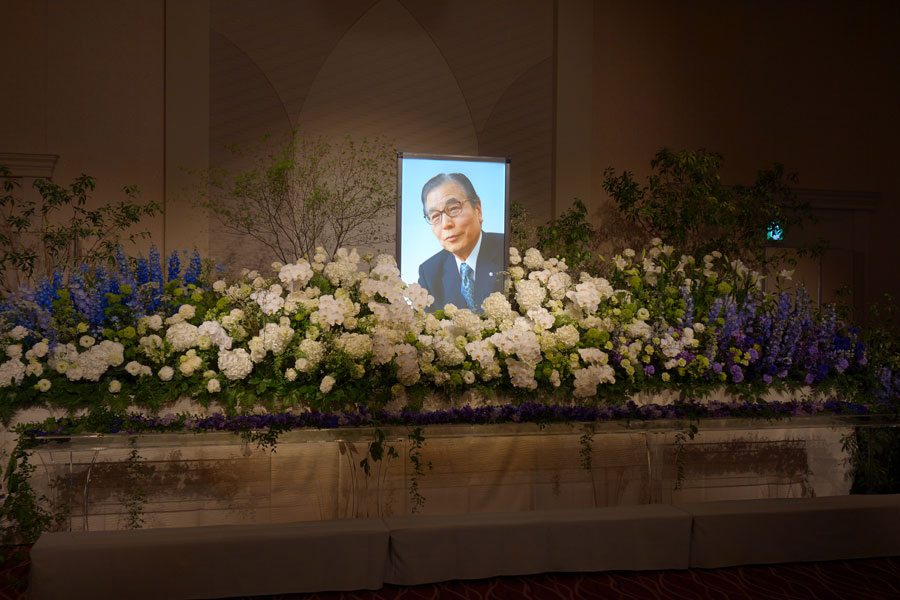
Shimamura Music, the largest music store chain in Japan held a memorial gathering for Mototsugu Shimamura, founder of the company on March 9 at Tower Hall Funabori, Edogawa-ku, Tokyo. Stepped down to chairman in 2013, he passed away in December 2020.
Born in Tokyo in 1933, Shimamura launched a music teaching studio in 1962, and later Shimamura Music with acoustic pianos and Yamaha Electones as major lines to supply the studio students in 1969.
Under the philosophy of “Promote pleasure of music making and lifestyle associated with music, and increase as many as possible music makers”, he raised his business to the largest music chain with 174 retail outlets throughout Japan.
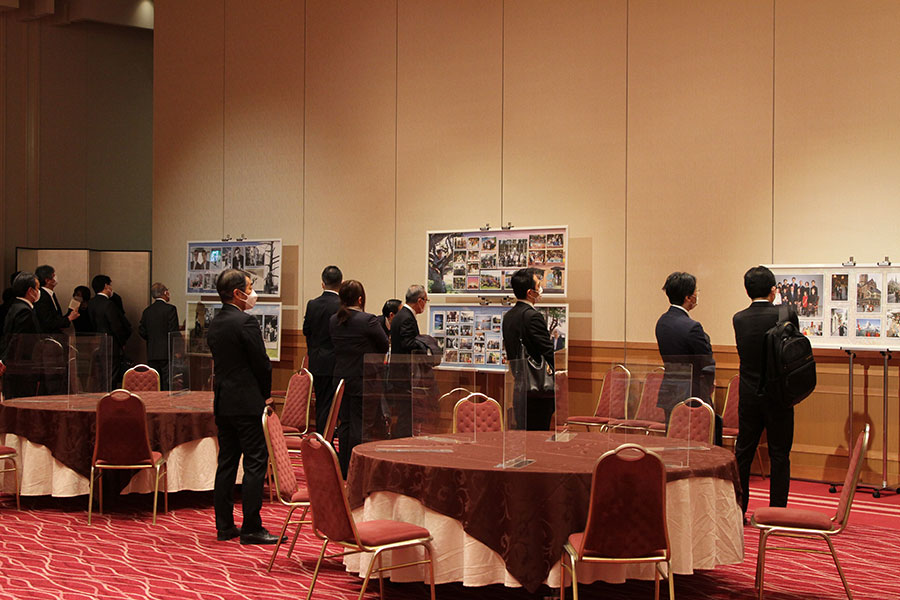
He kept his policy, “Sell fantastic experience before selling products. Sell expertise and personality of sales staff before selling fantastic experience” all through life.
A host of industry leaders offered flowers and remembered him of his efforts and accomplishment in promotion of music making.
Saito Brand of Nonaka Boeki Moves and Expands
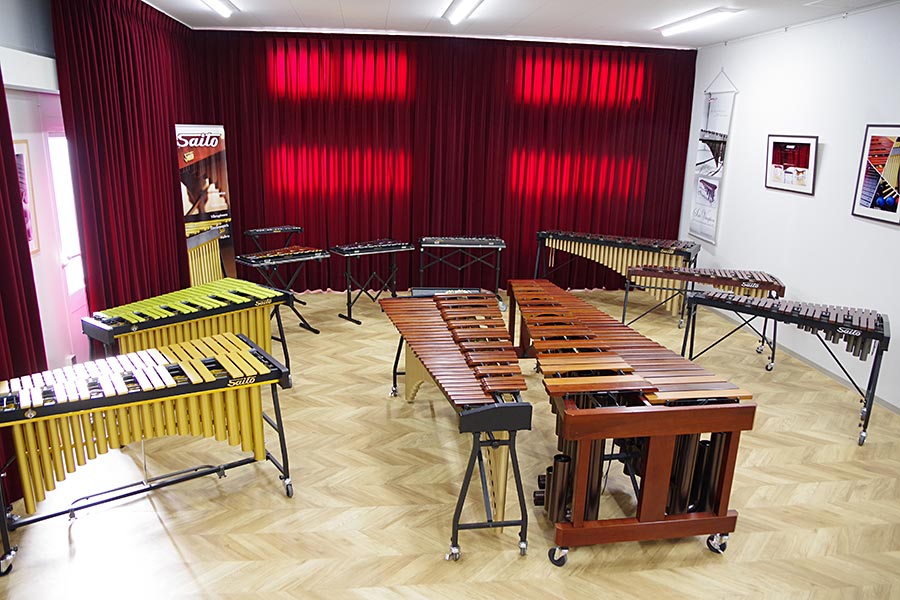
A new factory of Saito brand tuned percussions, a division of Nonaka Boeki completed in Kamoi, Yokohama in May last year now operates as an extensive manufacturing site having all operations from processing, assembly, finishing, repair services to warehouse. Construction works are going on to add an attached studio and showroom which will open early May.
Hideki Nonaka, president of Nonaka Boeki says, “We sought after the best environment continuing production of Saito brand products. It’s our pleasure that we have acquired the right site and upgraded manufacturing adding new machineries. It has also realized much safer conditions for the workers.”
The showroom accommodates a new concert vibraphone with custom-order colored tone bars and a 5-octave marimba among other product lines. The attached soundproof studio is offered for practice of percussion ensemble and concerts. It also provides percussion products including large models besides Saito brands that Nonaka distributes in the Japanese market for free experience by the visitors. The studio is equipped with a high-capacity elevator convenient for carrying in and out of large instruments. (photo right: Hideki Nonaka, left and Toru Saito, assistant manager)
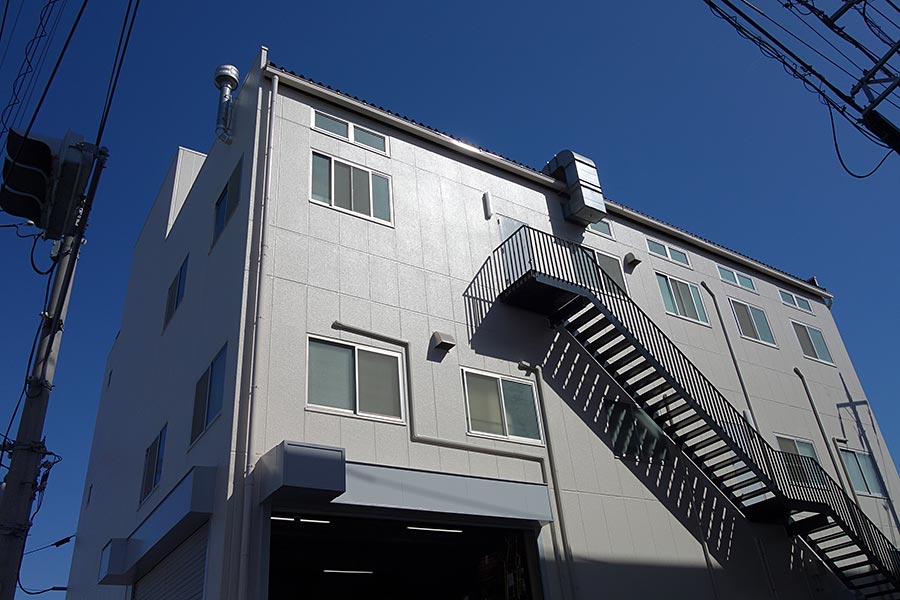
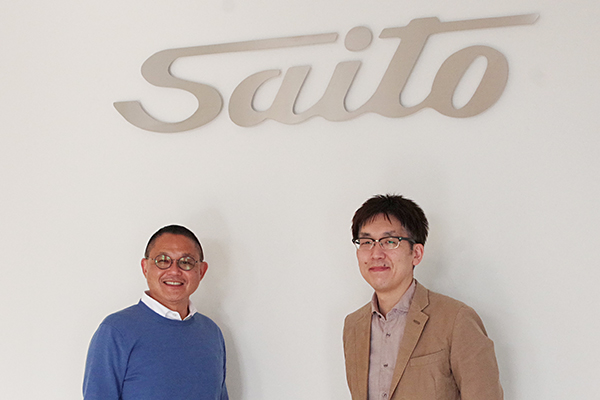
Chick Corea Tribute Events Held at Yamaha Ginza Store
Yamaha held Chick Corea Tribute Week at its Ginza Store, Tokyo from February 9 through 13th. The legendary jazz pianist passed away on February 9, 2021. Since the first tour in 1968, he frequently toured Japan, loved to play Yamaha pianos and performed along with a host of Japanese musicians.
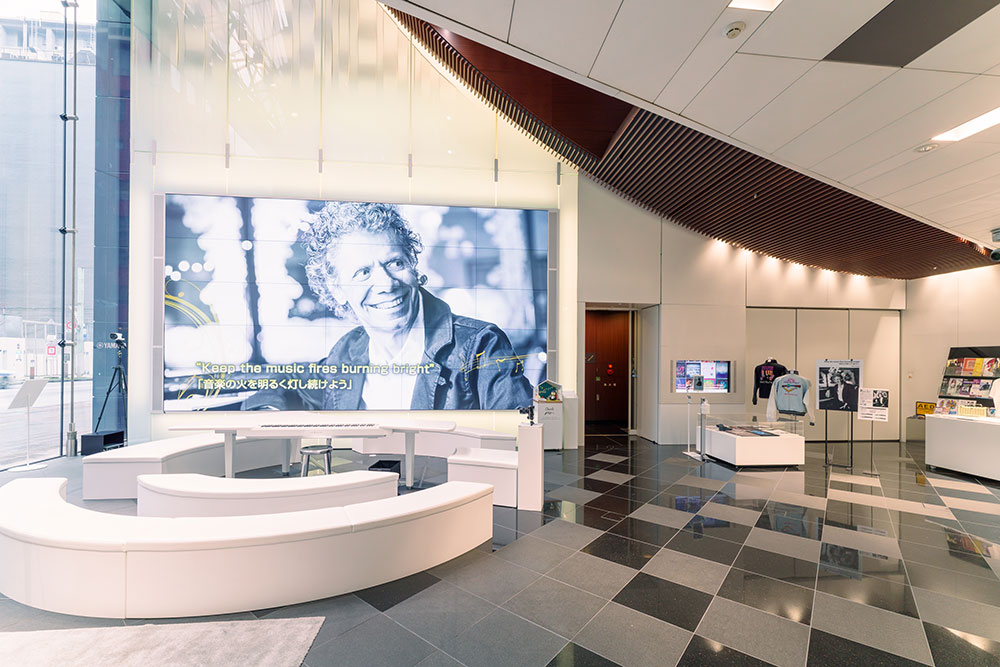
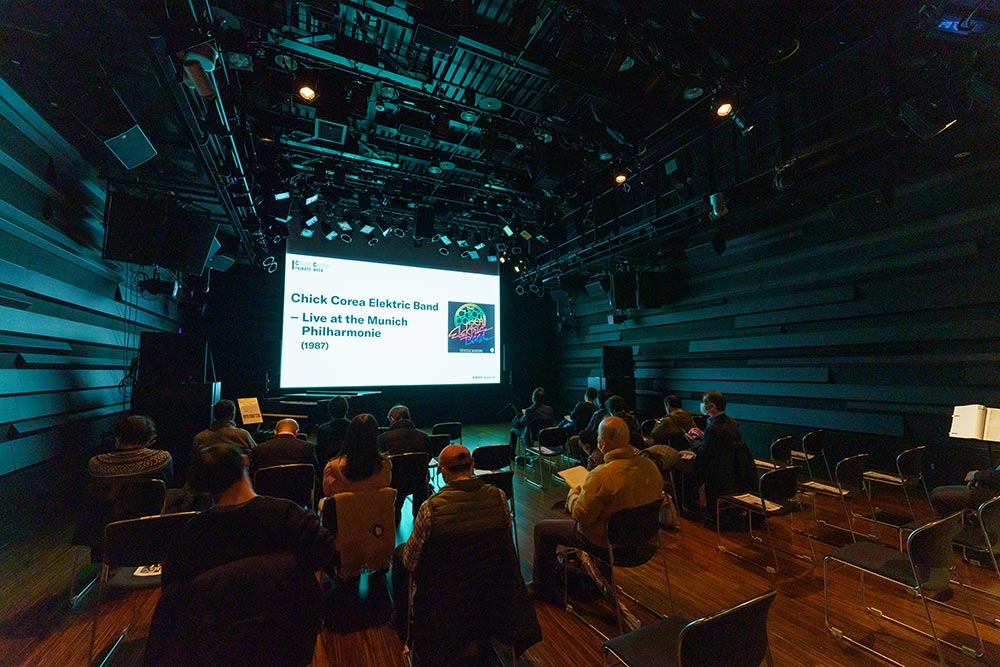
(photos: “Film Concerts” and the 1st floor of Yamaha Ginza Store filled with images of Chick Corea)
The event was held as a tribute to Corea for his great contribution to the music society and an expression of special thanks for his decades-long cooperation and friendship with Yamaha.
The programs included “Film Concert”, which displayed Corea’s much acclaimed live performances on a wide screen of the Yamaha Ginza Store, “Chick Corea on Disklavier,” his music played back on Disklavier automatic player piano he played himself and “Recorded Music Concerts”, concerts of Corea’s selected CD masterpieces along with talk sessions using Yamaha HiFi5000 flagship audio component system.
Roland Opens “Roland at 50” Website to the Public
Roland Corporation has opened “Roland at 50” special website to the public in celebration of 50th anniversary of the company.
he website spotlights on glowing history of the digital musical instrument manufacturer founded in 1972, and more than 180 Roland products which inspired artists of their creativity and background individual instruments including TR-606 Drumatrix and a series of samplers motivated them developing innovative music styles and culture in the last half century.

The first series models developed in commemoration of the 50th anniversary will be revealed on the website on April 18, the exact day Roland Corporation was founded 50 years ago.
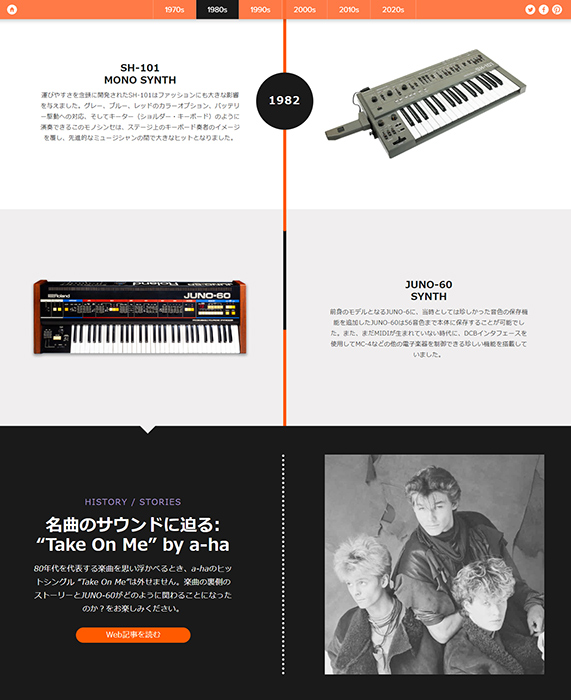
Yamaha Withdraws from Russia
Yamaha announced that it had withdrawn from Russia on March 4. The company stopped export of all Yamaha musical instruments and audio products. Three sales staff stationed in Russia will return to Japan immediately with their family members. The company spokesperson commented that the decision had come in consideration of safety of all employees in the country. If the present conditions last long, Yamaha’s business will be affected to some extent, said the company spokesperson. Yamaha distribution subsidiary in Moscow is kept open for the time being.
2021 Japanese Music Products Retail Market Survey
107 music stores report sales increase
The pandemic continued to damage business and life in 2021 as the Japanese Government issued the declaration of state of emergency in January which lasted 10 months until October. Not a few retailers had difficulties running business under restricted conditions even after positive case began to decline. Thus, customer traffic didn’t return to the level before the pandemic.
As covid vaccination began moving ahead, positive case of omicron type emerged and spread quickly throughout Japan. People are still not confident to get back to previous lifestyle.
Japan Music Trades conducted annual retail market survey in the middle of January calling on or sending a questionnaire throughout Japan to 151 music retailers. A total of 107 among them responded. We appreciate very much their time and support to meet our request.
Their reports well reflect that the sales which had significantly dipped the year before last recovered, but not yet to the level before the pandemic.
The music retailers have confirmed basic retail rules that are to avoid impractical price cut, reaffirm strength of physical store, upgrade expertise and marketing ability of sales staff, and contribute to local music community.
More than 50% of participated retailers reported sales increase
Fifty five out of 107 music retailers, more than 50% reported sales increase in 2021, 28 decrease and 22 flat. In the 2020 survey over 80% retailers replied their sales decreased. In 2021 the retailer suffered less than the year before as they kept stores open and music teaching studio resumed though business hours were limited.
All in all, it‘s safe to say that music retail business has not yet returned to the pre-pandemic environment in 2019. During the most important business season from year end to early year, 37 retailers (or 35% of the participated retailers) reported sales increase, 44 retailers (or 42%) sales decrease, and 24 retailers (or 23%) no change.
Looking into sales by product category, grand and upright pianos, digital pianos, violin family instruments and enrollment of music teaching studio for adult increased last year. Stay-at-home trend in 2020 helped boost the sales of digital piano, and it continued throughout the last year. Sales growth of acoustic piano and increased enrollment of music teaching studio for adult may well reflect the demands generated as music stores resumed operation after temporary closure.
While items of which sales declined include acoustic and electric guitars, amps, effect processors, drums, digital drums, miscellaneous percussion instruments, keyboard synthesizer, digital equipment, recording & PA equipment, printed music and music books. Sales of acoustic guitar significantly increased as people frenetically purchased the instrument while staying at home the year before last, but the trend shifted last year. Poor sales of digital musical instruments are partly attributed to shortage of chips, but also opportunities for live performance were lost for long.
Which products sold best
The music retailers replied grand pianos sold best in 2021. It’s supposed that demands generated as they resumed music teaching studio, and stay-at-home environment contributed to increase trade-up sales.
Yamaha C3X, Kawai SK-3, Yamaha C3X espressivo were the best sold items. Yamaha CLP-745, CLP Series, Casio PX-S1100/S1000, Kawai CA49 digital pianos also sold well.
Yamaha C3X, Kawai SK-3, Yamaha C3X espressivo were the best sold items. Yamaha CLP-745, CLP Series, Casio PX-S1100/S1000, Kawai CA49 digital pianos also sold well.
Also demands grew for Yanagisawa saxophones, Altus and Sankyo flutes, Buffet Crampon clarinets and Bach trumpets.
Most prospective instruments in 2022
The music retailers selected grand pianos as they most expected in 2022. Adult pianists who began playing piano want to buy them as well as demands grow as piano competition will make a comeback. They eye Yamaha C3X espressivo, the new model introduced in 2021 which won the first Choice of Music Retailers Award last year.
Wind instruments including flutes trumpets, Yamaha alto saxophones and Buffet Crampon clarinets are what they also expected to move fast in 2022.
They also listed artist models of electric guitar and amp as they will be sought after items once artists can start music activities and perform live on stage. Sales of digital pianos, ukuleles and kalimbas look to be positive, too. Music retailers hope shortage of chips are resolved and to stock digital pianos still in much demand.
Online Sales
Seventy-one music retailers use their own website most for online marketing. It’s followed by Facebook (53 stores), Twitter (52), Instagram (49), Digimart (32), YouTube (26) and LINE (24). The survey tells retailers using Instagram is increasing and two thirds of retailers are using Facebook and Twitter along with Instagram.
Sharp Corporation Unveils Humidity Control Material
Sharp Corporation released TEKIjuN humidity control material that controls and keeps desired level of humidity of closed space on January 18. The press conference was also held online.
TEKIjuN protects products from condensation and cracks developed by high humidity and desiccation absorbing and releasing moisture in air. Unlike silica gel, it allows to control humidity level in between 40% and 90%RH(Relative Humidity)by changing balance of contained ingredients.Sharp provides TEKIjuN in beads and sheet types manufactured in desired humidity level and expects to promote them to the world markets.
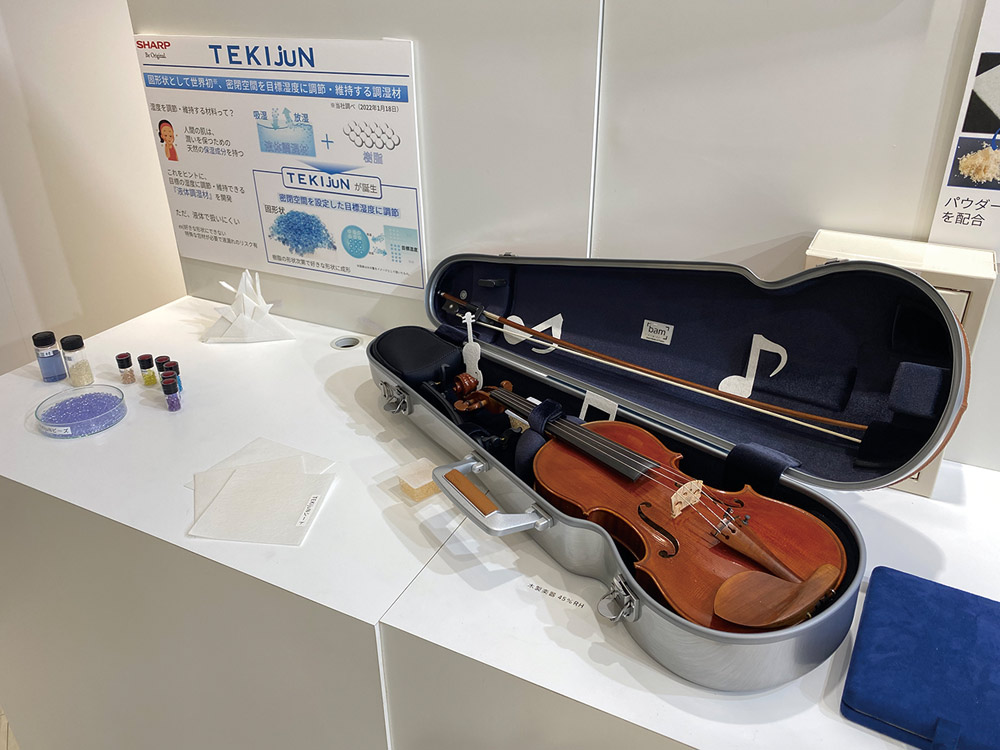
The beads type TEKIjuN is suitable for industrial and art products, foods, etc. Just put it in acoustic guitar case, it keeps appropriate humidity between 40% and 50% level. While sheet type TEKIjuN has excellent capability to absorb and release moisture instantly which is best used for transportation of construction and electric parts which should be condensation free, the company explains.
TEKIjuN, the world's first material with moisture absorbent and release control capability to be manufactured at any desired humidity level, according to the company, is expected to be sold around the same price as conventional moisture absorbent products. Sharp estimates annual sales of 1billion yen.
Sharp spokesperson says that the company welcomes collaboration with positive partners to develop specific products using TEKIjuN matched to versatile needs in industries. The initial products will be available this spring.
C. Bechstein Japan Launches Music Teaching Studio
Bechstein Japan opened music teaching studio in Tokyo headquarters showroom in January. Five courses of piano, cembalo, vocal, flute and violin are offered for all age groups from children to adult. In addition to regular lesson class, it provides one-time lesson system to meet the needs of busy students and businessmen as well as 30-minute free trial lesson.
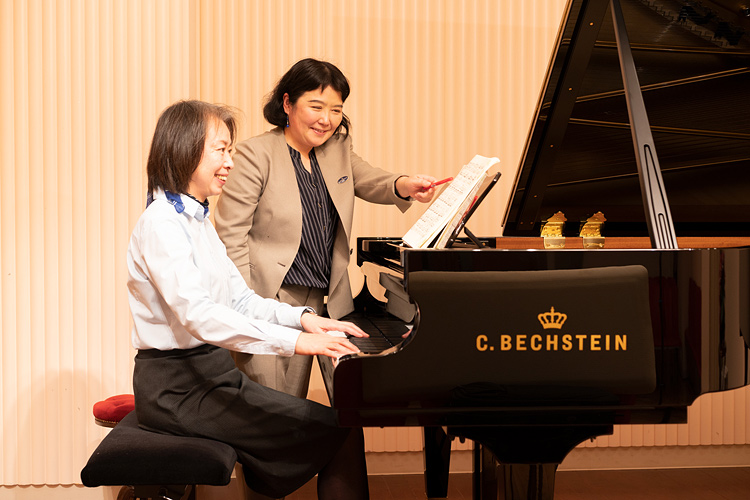
C. Bechstein Centrum Tokyo Opens
In celebration of grand opening of C. Bechstein Centrum Tokyo Showroom, Bechstein Japan held a ceremony and live concert on January 11 and 12. A total of 150 customers, pianists, dealers and industry guests were invited separately twice each day from 11:00 and 14:00 under control of COVID virus infection.
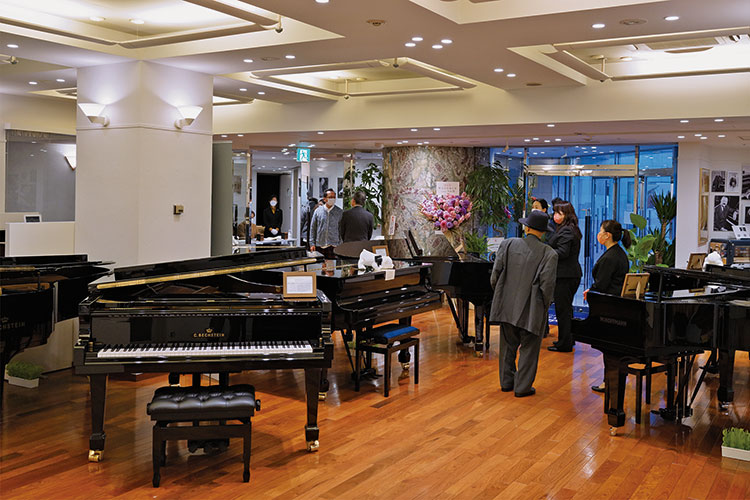
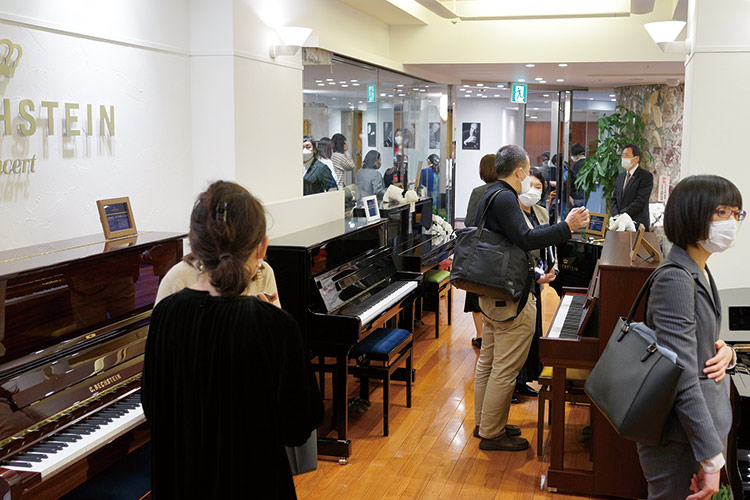
Following the opening speech by Ryoichi Totsuka, chairman of Bechstein Japan, Masato Kato, president commented, “We are happy to present major models of C. Bechstein and W. Hoffmann lines here. The visitors were invited to experience various types of pianos of both brands, study historical heritage of C. Bechstein from the photos and piano structure display by the back frame models on the wall. It's our pleasure to help our customers enjoy music throughout their lifetime with the C. Bechstein and W. Hoffmann pianos.”
Photo bottom right: Ryoichi Totsuka, chairman (far left) and Masato Kato, president (far right), C. Bechstein Japan flanked by Kaori Kumada, Manager, and Keiko Yamada, General Manager, Hall and Studio, Centrum Tokyo.
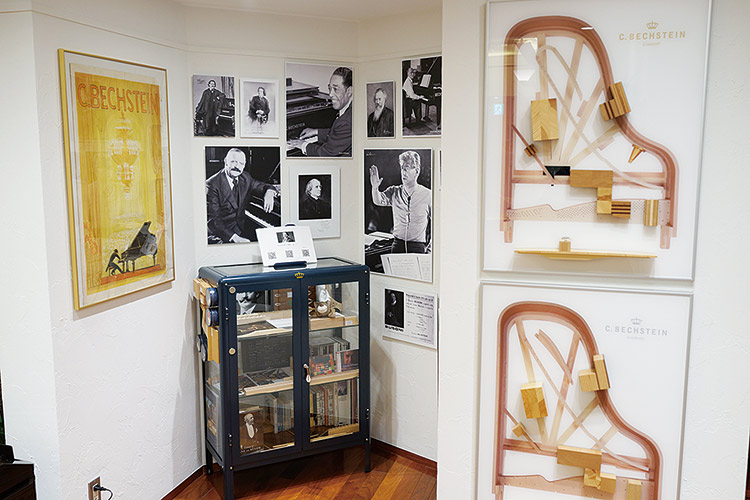
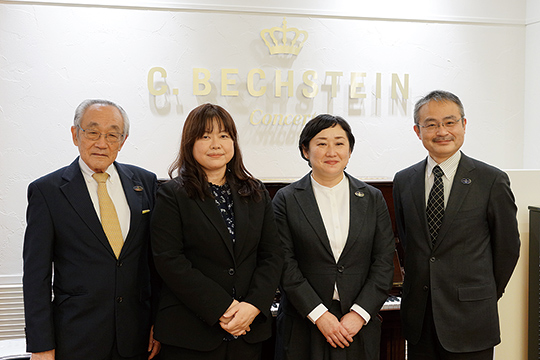
After live performance by Kotaro Fukuma, the guests toured the showroom where 7 C. Bechstein grand and 8 upright pianos and 5 each W. Hoffmann grand and upright pianos were set out to demonstrate the exact appearance and atmosphere of C. Bechstein headquarters showroom in Germany.
C. Bechstein Centrum Tokyo is found in Hibiya Marine Building adjacent to Tokyo Metro Hibiya station. It has 3 studios in different size to be used for lesson, workshop, and rehearsal for touring pianists from overseas, and an 88-seat hall where two largest concert grand pianos will be equipped soon.
Roland Held Roland/BOSS Players Summit
Roland Corporation held 2nd Roland/BOSS Players Summit online, an event to support musicians, music enthusiasts and tour/event staff that musical activities are restricted in the pandemic from October 8 through 10.More than 12,000 viewers visited the site to enjoy professional live performance and video sessions.
Taking this opportunity, the company raised 3.123million yen fund, well over the projected goal of 2million yen through cloud funding. Total sum of 3.54million yen deducting costs paid for using cloud funding system and adding 1million yen endowment from Roland was delivered to Music Cross Aid on Dec. 20.
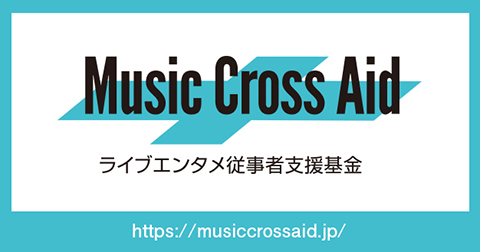
Roland Management Change
Roland Corporation announced an internal resolution on February 10 after Board of Directors Meeting held the same day that Jun-ichi Miki, CEO, Representative Director would step down as his term of office expires and Gordon Raison, CSO, CMO, Director would assume the position as of April. Miki will be appointed to advisor after resignation.
The company also announced nomination of new appointment and reappointment candidates for directors: Shunsuke Sugiura Senior Executive Officer, Masahiro Minowa Executive Officer, Outside Directors of Isao Minabe, Toshihiko Oinuma , Sachiko Murase and Brian K. Heywood.
Official appointments of new Representative Director, Officers and Outside Directors are scheduled on March 30, 2022.

Mr. Miki said, “I assumed the position of CEO in April 2013 under the most critical financial crisis since its incorporation and initiated the company reform without clear guidance at all. Thanks to comprehensive supports by other management members as well as by the relationship with various stakeholders, and among all, due to substantial efforts made by all the employees, we made the Company unlisted in October 2014 after the MBO, and successfully completed the structural reform, which was the biggest issue at that time. We relisted in December 2020.
“Roland is prepared to enter a new phase of growth. I thought this is the right time to go forward under the new leadership of Mr. Gordon Raison. Joined Roland in September 2013, he has greatly contributed to the difficult restructuring processes of Roland with his rich experience in global distribution and marketing. He also has excellent understanding of Japanese culture and business practices.
“Roland will continue to make its best efforts to offer a pleasure of an exciting creation globally and to grow as a company appreciated and supported by people.”

Mr. Raison commented, “It’s my honor to be appointed to the candidate of Roland CEO. I feel humbled succeeding the role from Mr. Miki in this commemorative year Roland celebrates 50th anniversary.
“Moving forward, I would like to create solution-focused and marketing driven company, with a structure and strategies which leverage the strength of our entire global team to continue our growth and expand our positive influence on music and culture well into the future. We exist to Inspire the Enjoyment of Creativity and help people realize their full potential through the experience of playing instruments and creating music. All of us at Roland promise to live up to this vision as we enter a new era.”
Yamaha Opens Music School in Saudi Arabia
Yamaha Music School opened in November 2021 in Riyadh, as the first official music teaching studio in Kingdom of Saudi Arabia. The country is known for its one of the strictest regulations on religion in Near East Gulf area. Music in any forms from live performance to sound reproduction had been restricted at public space for the last 50 years.
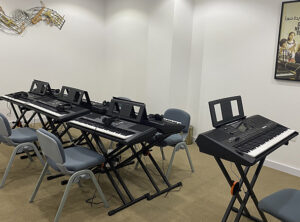
As Saudi Vision 2030 was addressed in the country, the government began to issue license for operation of music teaching studio requested by local music distributors around 2016. Yamaha Music School Riyadh represents the first official music teaching studio in town.
Located in a shopping mall in the downtown area in Riyadh, the studio is attached to Yamaha showroom which has a broad selection of Yamaha musical instruments and sound equipment. Versatile teaching programs for piano, electronic keyboard, electric guitar, violin, drums and wind instrument are offered to meet requirements of students from 4-year old children to adult music makers.
Yamaha also plans to open second and third studios in Jeddah and al-Khobar in course of time.
Obituary Ryoji Okamoto (1931 - 2021)
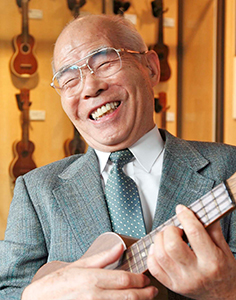
Ryoji Okamoto, ex-chairman of Kiwaya Co., Ltd. passed away on December 30, 2021. He was 90 years old. Funeral service was taken on Jan. 6 by family members.
Got started music products distribution business at Ide Gakki in 1946, Okamoto joined Kiwaya Co., Ltd. in 1957. After a while, He launched “Famous” brand ukulele line, known today as a leading brand made in Japan in collaboration with a manufacturer.
Even after Hawaiian music lost popularity, he continued providing ukulele players with Famous instruments. While keeping communication and help with ukulele musicians including Herb Ohta, Okamoto successfully established the brand, and took leadership in promotion of ukulele launching teaching studios himself. His passion for the instrument lasted through lifetime.
Yamaha New Headquarters Office Building Completes in 2024
Yamaha recently announced that it would build a new building which will accommodate sales and administrative sections at the headquarters in Hamamatsu. The 12-story building with total floor space of 22,000 sq, meter is expected to complete by the end of February 2024.
Designed under the SDGs scheme with low energy consumption and environment-friendly architecture, the new building is linked with 3 neighboring Innovation Center buildings to promote communication and collaboration between 1,000 sales and administrative staff, and engineers at the Innovative Center.

10 Music Retailers Talk About 2021 Business and Prospects for 2022
As we navigated the second year in the pandemic, Japanese government announced the second declaration of a statement of emergency on Jan. 8, 2021, and the third declaration followed in the ensuing months, which resulted in more than 6 months of self-confined life last year. Despite the prolonged restricted life and business styles, consumer looked gradually adapted to new environment. Also remarkably progressed e-commerce helped them to shop anything they want online. Thus, general economy damaged by the pandemic is recovering. Some experts say that good percentage of excess savings of 40 trillion yen may be spent in months ahead. We hope the frenetic shopping spree will boost industry business in 2022.
Music retailers in Japan report a silver lining in business as they feel return of customer and growth of net shopping but their comments differ depending on product category, area and demand.
Japan Music Trades interviewed key persons of 10 leading music retailers in major markets.
“Stay-at-home demands have calmed down, and shortage of product supply makes the retail market increasingly serious. There are few we can do to cope with the present conditions.
“While sales of digital pianos as well as recording and streaming gears remain strong, electric guitars sank without additional boost. “Find out market trend and movement through social media and meet customer needs with fascinating events and plans are what we must do in coming months. It’s also critical to keep appropriate inventory level.”
Ryuji Maruta, Sales Division Manager, Aikyoku Gakki, Nagoya
“2020 was a very exciting year for us, opening of logistics center and Ikeshibu store in Shibuya, Tokyo, and our website was redesigned. A very good start to effectively meet the change of the market, to say.
“Unfortunately, we could not take full advantage of the new Ikeshibu store by lack of massive live events because of the pandemic, but our communication capabilities much improved by keeping customer informed of products news and store events online.
“Role of music store ultimately changed today. Customer is not satisfied just seeing gears on the shelf. Fun shopping experience and captivating events can attract customer to stores. We launched Ana-Digi streaming, DTM and recording division at Rock House Ikebe, Ikebukuro, Tokyo last October, and Guitar Rec DTM division for guitarists and bassists at Premium Guitars in Osaka last November. We see fusion of analog and digital technologies is a key of future business.”
Masataka Yamada, Senior Vice President, Ikebe Gakki Co., Ltd., Tokyo
" Business much fluctuated last year. We sold more on online during the pandemic, but sales of acoustic guitars and streamlining gears stuttered after early May holidays. Today we see increasing number of shopper with musical experience come to us to buy instruments with true value. Those with higher disposable income likely to buy vintage and custom model guitars. U.S. made electric guitars at 500,000yen price range and models at 300,000 price range by Japanese makers are fast moving.
“We see the trend for valuable instruments and gears continue this year. Customer traffic slightly increased after the Japanese government lifted the statement of emergency last October, but customer remains conservative. Yet, serious musicians who have been confined at home during the lock down gradually get back for precious original models.
“In addition to intensive sales of guitars in trend, characteristic product selection picked up by our experts, we will concentrate on upgraded customer satisfaction including pleasure of purchasing and owning quality instruments more than price both at physical stores and online.”
Chihiro Kudo, Merchandise Dept. Senior Manager, Ishibashi Music Corporation, Tokyo
“2021 sales of some categories slightly declined after the demands soared a year before. It was good that we kept the same level of sales despite the negative retail environment. The largest problem was, as retailers all conceivably experienced, short supply of products. We were much disappointed without products to sell, especially digital pianos and entry model guitars when demands grew.
“Consumer is more and more quality-conscious and appreciates additional value, for example, in case of pianos, automatic playing and sound control functions matched to today’s lifestyle. Guitarists come to us for one off, used, custom-built and original models not found at other stores. Adding a selection of private-brand models, we are pleased to have more characteristic product lines than ever before.
“After we resumed live concerts and events last fall, we heard a lot of positive comments from customer saying, “Thank you for giving us this opportunity to perform.” Their words greatly encouraged us.
“Social media and website are essential for our business. We set up an independent division for expanding branding and communication abilities to better meet customer’s requirements.
“We understand that excellent teamwork based on personality of individual sales staff will contribute to increase customer satisfaction. Expanding private brands which reflect our expertise is another goal this year.”
Akira Tanii, Director of Sales, MPC Kaishindo Gakki, Toyama Pref
“Following lackluster 2020, we were much affected by COVID-19 last year. Consolidated damages of diminished demands from the lockdown, shortage of products and price increase of materials did not allow us to make plans to go ahead.
“Product-wise, guitars sold very well, particularly electric guitars achieved historical sales, but astonishingly sold ukuleles a year ago significantly declined. Hardest hit wind instruments are coming back to 60% level of pre-pandemic. Overall sales remained flat until September. After the second statement of emergency lifted in October, the business turned black led by excellent sales of guitars.
“We plan to rebuild seasoned physical stores in 5 to 10 years to provide the customer with upgraded shopping experience and services. We made sales with items not of our main lines during the last 2 years. Back to basics, we would like to concentrate on our key line, stringed instruments this year. Our plans also include more involvement in local musical events.”
Kaita Nose, Manager, T. Kurosawa & Co., Ltd., Tokyo
“Business slowly showed an uptick last year. Students began coming back to teaching studios. We had good sales the year before last thanks to incredible demands during stay-at-home period. Digital pianos follow the trend, but other instruments are flat these days. Wind instruments are struggling as students haven’t fully come back to band activities at school.
Online sales are increasing but not the level we expect.
“Our sales staff enhanced communication with customer via streaming in place of live events, but the problem is Internet environment of viewers differs.
“Another issue is distribution problem caused by shortage of chips and shipping containers which leads to loss of sales opportunities at retail scene. The only solution to these problems is to find alternative products or suppliers, and advanced order.
“Our goals for 2022 are upgraded electronic commerce, and hybrid events coordinating live and virtual technologies. They will help us build confidence and good relationship with customer.”
Yuuji Ikegami, Sales Dept. Group Manager, Jujiya Musical Instruments Co., Ltd., Kyoto
“We had no live events until summer last year but after fall, we held Electone Festival and competitions which increased motivation of teachers and students. Customer traffic is coming back these days.
“Stable demands among parents and children supported sales of acoustic pianos including used models last year. Number of adult pianists is declining. Sales of combo, wind instruments and related accessories are stagnant. Demands for digital pianos remain strong but manufacturers don’t accept purchase orders from retailers. That can cause price hike sooner or later.
“The market will remain soft in 2022 but we believe starting marketing activities we did before the pandemic again will be the way to get our business back to normal. Social media have proven effect in recruiting students at the teaching studio.”
Masafumi Sei, Sales & Planning Dept., Sumiya-Goody Co., Ltd., Shizuoka Pref
“Sales remained 70% of pre-pandemic level for the last 2 years. Then, we had a dramatic surge last November. We see that our efforts to better use of social media and communication tools paid off.
“Demands for tuba, flute, trumpet and trombone are robust. Customer is likely to come to us with specific brand and model in mind. Naturally, in most cases we close deals. It’s a new trend in the pandemic that payment by installments has decreased. Instead, they take time in selection of instruments before making decision, then visit us and pay all in cash. Average unit price generally goes up. We have enhanced cashless payment applications for increased convenience of customer. They are well accepted.
“We plan expansion of repair section this year. A complete set up of practice room, event hall, lesson rooms and repair service will make the space more familiar and helpful for our customer, I believe.”
Shinsuke Harada, store manager, Musical Instruments Shop DAC
“It looks people may have adapted somewhat to COVID-19. We see customer traffic increased even after the declaration of a state of emergency. In October, we were inundated with visitors as if the negative mood was swept away. Students of school bands came back finally. A bright sign!
“In 2020, the stay at home-generated demands boosted sales of entry model guitars among beginners. A year later, demands grew for upper-class gears. Online sales keep growing, and store sales are getting back. We feel business is regaining its traditional appeal.
“Effective use of social media and live streaming are what we continue after the pandemic is over. They are quite efficient means to product marketing and attract customer to physical shop.
“On the other hand, we further upgrade value as a physical shop, skill of sales staff, and after-sales services as well as live events we gave up holding these past years.”
Kentaro Ashiura, store manager, Big Boss Ochanomizu, Tokyo
“Music teaching operation and live events stalled, we had quite difficult time last year. As customer traffic began to increase in November, we have some potential customers visiting from outside Tokyo seeking high-quality original models these days. We are pleased that we closed the black Friday sale successfully.
“We understand branding is the key to attract and make loyal customer for us by improving communication skill and offering them exciting shopping experiences. We Are Sneaker Ages Contest we held as our exclusive event in the past years will celebrate the first national-scale contest this year. We expect further expansion of this event.
“We recently launched Public Relations Dept., to enhance branding and customer communication. Promoting original products handled by MIKIGAKKi Imports & Trading division will help us differentiate from competitors in the area.
“We will also concentrate to raise expert sales staff and build a team of professionals.
Toshihiko Miki, president, Mikigakki Co., Ltd. Osaka
2020 JMIA Music Retail Report
Japan Musical Instruments Association (JMIA) recently completed 2020 Japanese Music Products Industry Retail Report which includes retail sales data from April 1, 2020 through March 31, 2021. JMIA sent a questionnaire to a total of 327 music retailers throughout Japan of which 116 (or 33% of the total) took part in the survey. JMIA made an outsourcing agreement with Japan Economic Research Institute for the survey and report.
Total sales of 116 music retailers in 2020: 69,842,350yen. Details of the data appear in the December issue of Japan Music Trades (printed and digital editions)
COVID-19 impacted retail market, but guitars and electronic keyboards sold well
World-wide spread of COVID-19 affected almost all categories of music retail business. While the quarantine changed lifestyle of people and it helped boost sales of some casual type musical instruments playable at home, live music and band activities were hard hit which impacted business of retailers. The pandemic also influenced production of some categories, caused by supply shortage of materials and parts, as well as delayed transportation of goods by global lack of containers.
Pianos (including acoustic and digital pianos, automatic player pianos, and used pianos)
Student recruitment at music teaching studios in town was about to start in spring of 2020 when the declaration of a state of emergency was announced by the government. The music lessons and recruitment campaigns all stopped for 3 months. After self-confinement period was over, new student enrollment and piano sales were getting back, but not to the level before the pandemic. Some students and parents felt uncertain for in person piano lesson. Demands for acoustic piano went down as most competitions and events were cancelled.
Sales of digital pianos increased 14% in unit and 10% in value thanks to increasing demands from staying at home. However, global shortage of chips and even parts of metal and resin restricted production of the manufacturers. Distribution problem by lack of containers lasts to today which causes limited stock of goods at music retailers.
Organs, portable keyboards (including electronic and school-use organs)
Sales of electronic organ significantly declined largely because of the pandemic shut down of music classes in town for 3 months. Sales of electronic organ solely rely on demands at music lessons. In this report sales of electronic organs decreased marginal 10% over the last year, but JMIA Statistics of Manufacturers show 40% decline of shipment both in unit and value.
Portable keyboards are another category which enjoyed significant sales increase backed by surged demands at home during the lockdown. Sales of the compact models with small keys jumped up as some schools switched purchase for music class from recorders to seemingly more virus-resistant instrument. Increasing number of schools purchased from 30 to 40 units of portable keyboard with small keys as .
Wind and stringed instruments (including brass and woodwind instruments, and violin-family instruments)
This segment was hardest hit by the pandemic. Sales of woodwind instruments declined between 21% and 49%, and brass instruments went down between 22% and 40% in unit.
All Japan Band Competition called off in fall along with limited band activities affected sales of new instruments and trade up. Demands to buy own instrument for safety grew for some types of instruments among the students, and maintenance goods, but they didn’t help raise total sales of this segment.
Sales of stringed instrument declined, but with a minor dip of 6% in unit and 17% in value. That is attributed to slow traffic and closure of music lesson studios in town. But amplified demands increased for entry models for the students to self-teach at home after the declaration of state of emergency lifted. It’s encouraging that players of stringed instrument remain strong and business returned in the latter half of 2020.
Guitars (including acoustic and electric guitars, amps, effect devices and ukuleles)
Great number of new and experienced players picked up acoustic guitars and ukuleles during the lockdown. Sales of those instruments priced under 50,000yen significantly increased. Instant surge of demands for guitars and ukuleles along with difficulties developed at manufacturers and distribution network, run out of supply of models at affordable price range arose at retail stores before summer season. The situation reversed after the Japanese government offered flat-rate benefit to all Japanese citizens. Customer choice expanded to over 100,000yen intermediate and high-end models.
The same didn’t go with electric guitars and basses. As explained somewhere in this report, band activities and live performances called off, and senior-high school and college students lost opportunities to perform as band activities at school were banned. At the beginning of 2021, electric guitar sales gradually came back, with excellent sales of high-quality models of name brands.
Percussion instruments (including drumkits, marching drums, educational percussions, xylophones, glockenspiels, digital drums, cajons, sticks and hardware)
Opportunities to perform live at competition and championship were shut down, sales of acoustic drums sharply dropped. Annual budget allowed schools to purchase some instruments, but sales of large percussion instruments including concert drums were impacted. Sales of table-top xylophones significantly increased in unit and value as schools bought around 30 or 40 units of them as school equipment in place of recorders.
Digital drums were another bright spot having taken advantage of demands at home during the lockdown. Music retailers who participated in this survey commented that intermediate and upper-class models at higher unit price were popular among customers.
Japanese traditional instruments (including shamisens, kotos and Japanese drums)
This segment has been in a long downward trend before the pandemic reflecting diminishing customer base, shutdown of manufacturers and distributors as the industry lack successors. The pandemic further damaged the industry. Yet the market is stable for reasonably priced kotos and shamisens. Sales of new instruments and maintenance services are increasing as live concerts came back slowly at the end of September.
Digital instruments (including synthesizers with keyboard)
There were no significant changes in synthesizer market in general but demands for stage pianos dramatically dropped because live concerts almost disappeared. On the contrary, entry model synthesizers with keyboard sold well among new players at home during the lockdown. Repair service requests also increased.
One serious problem for the industry was global chip shortage and container-related distribution problem developed in the latter half of 2020. The market expanded, but music retailers struggled with short supply of digital gears.
Gadget-type digital instruments at 10,000yen price range sold well as they are enjoyable without special knowledge on music.
Musical instruments with reeds and others (including harmonicas, key harmonicas, accordions, recorders and ocarinas)
Sales of key harmonicas and recorders slightly went down despite schools purchased them as usual for equipment use. Some schools still don’t offer children instrumental lesson to prevent virus infection.
The market for harmonicas, accordions, ocarinas and Taishokotos, usually favored by home music makers remained soft. Though consumer picked up those instruments while staying at home, the segment only gained minimal sales increase. More than that, restricted music activities due to limited opportunities to play at recitals and with members of community bands, influenced motivation of the players.
Sheet music
Sales of printed music decreased 12% in volume and 11% in value last year. Some retailers pointed that sheet music for acoustic guitar, ukulele and digital piano for entry level player marked relatively good sales backed by growing popularity for such instruments. It’s likely that experienced players purchased more etudes than before regardless of genre, taking additional time they acquired in the pandemic as an opportunity to improve their skill.
Inspired by the hit movie “Demon Slayer: Kimetsu no Yaiba”, sheet music and score books of its signature tunes significantly sold well.
Music Retailers Selected 2021 Best Music Products and Players
Japan Musical Instruments Association (JMIA)Be kicked off a new project, 2021 Best Music Products and Players, and held award presentation ceremony on Nov. 24 at Yamaha Ginza Store Studio inviting industry press members.
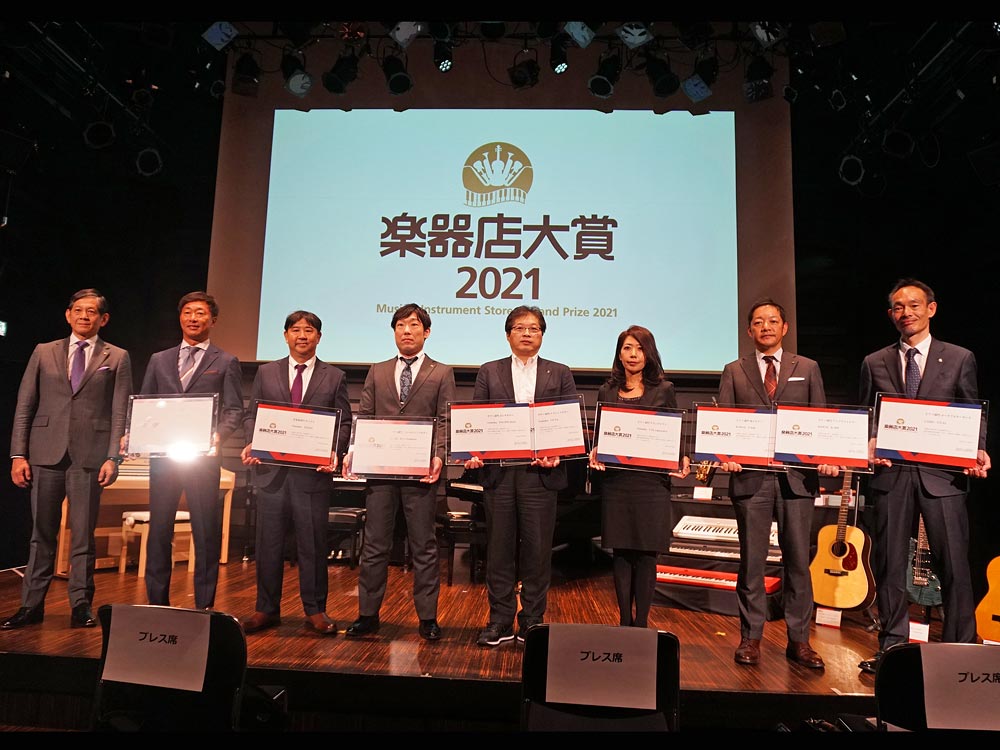
Music store sales staff took initiative of advocating pleasure of music making and increase music players for the first in music products industry history this year. They joined forces from different parts of Japan to set up a working group for the project past spring and set Best Music Products and Players Awards selected by music store sales staff and voted by general music fun. A total of 490 music store sales staff participated in the project and selected the best products and best players during the month from the end of August to September, and 12,958 general music fans voted from the end of September through October.
The Best Music Products awards were set for 4 categories of pianos (including grand and upright pianos, digital pianos, and portable keyboards), guitars (including electric and acoustic guitars, and classical guitars), saxophones and the topic instrument of the year. The Best Players Awards were set for the fastest growing players of piano, guitar, and saxophone. In addition, a Special Award was set for the most dedicated person to demonstrate fun of music making.
The winners received a plaque presented by Takuya Nakata, president of JMIA at the ceremony.
Toshiaki Hirose, project leader and president of Shimamura Music, said, “We are very excited that music stores and their sales staff throughout Japan took part and we, retail members took the leadership. Improving and continuing this project in the coming years, we hope the awards to be established as a prominent goal for music products manufacturers and players.”
JMIA now lists awarded products and players and their pop materials on its website (https://www.zengakkyo.com) to be used free for the members toward the coming business season.
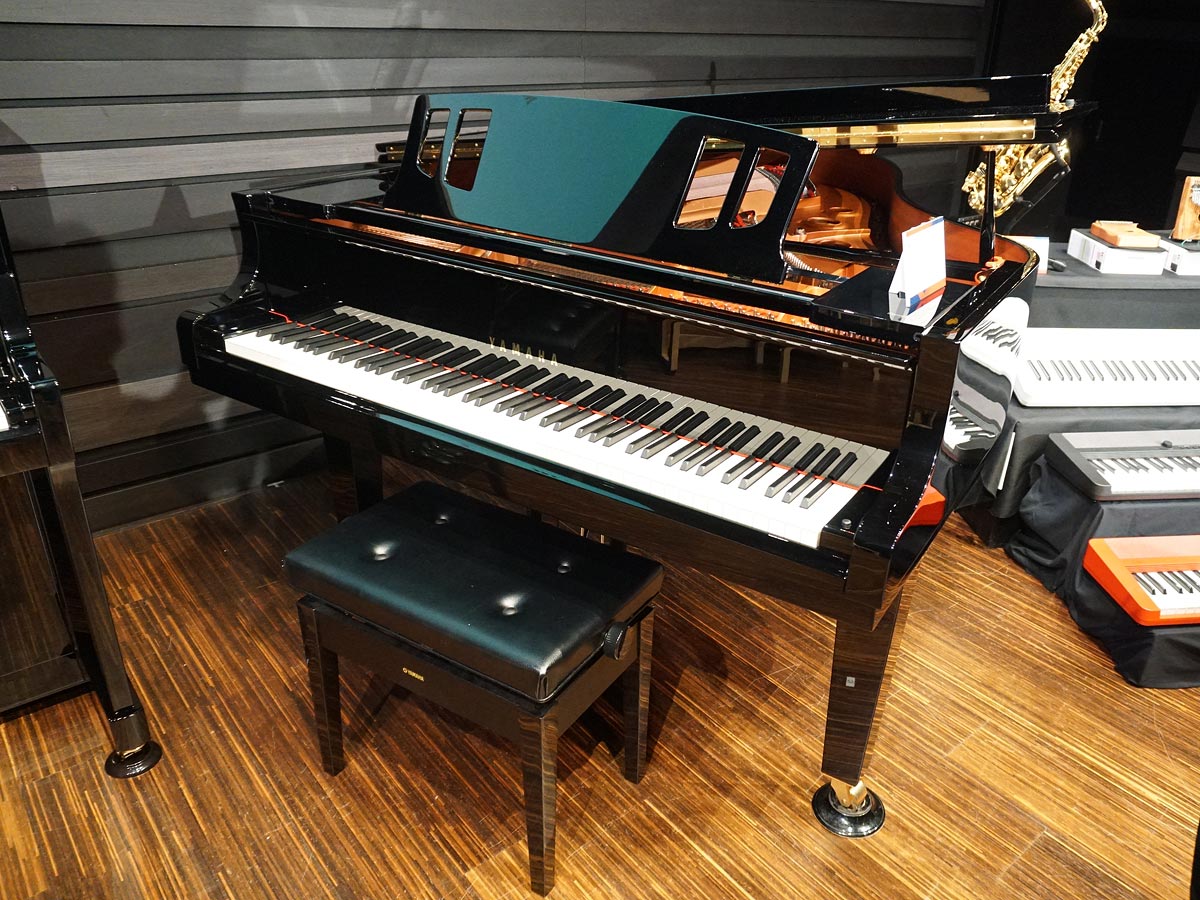
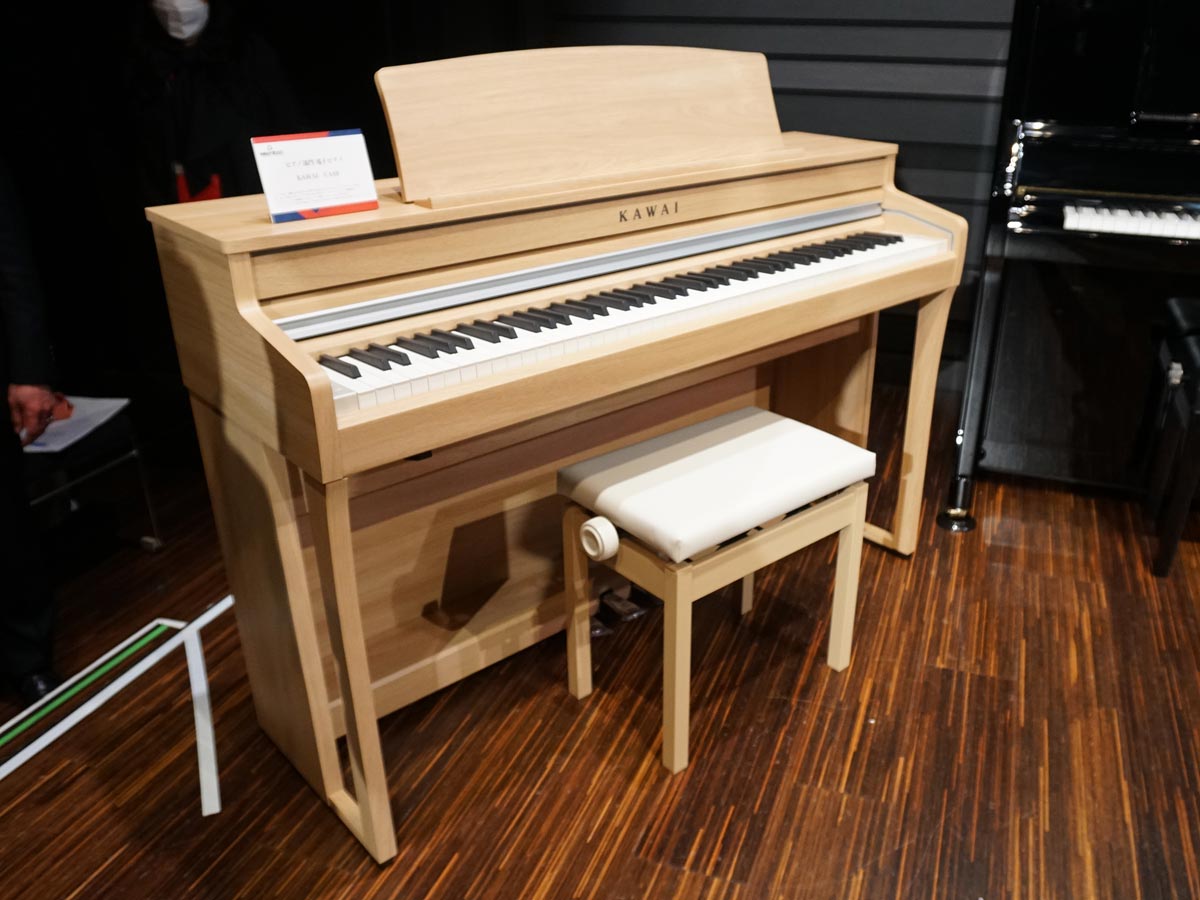

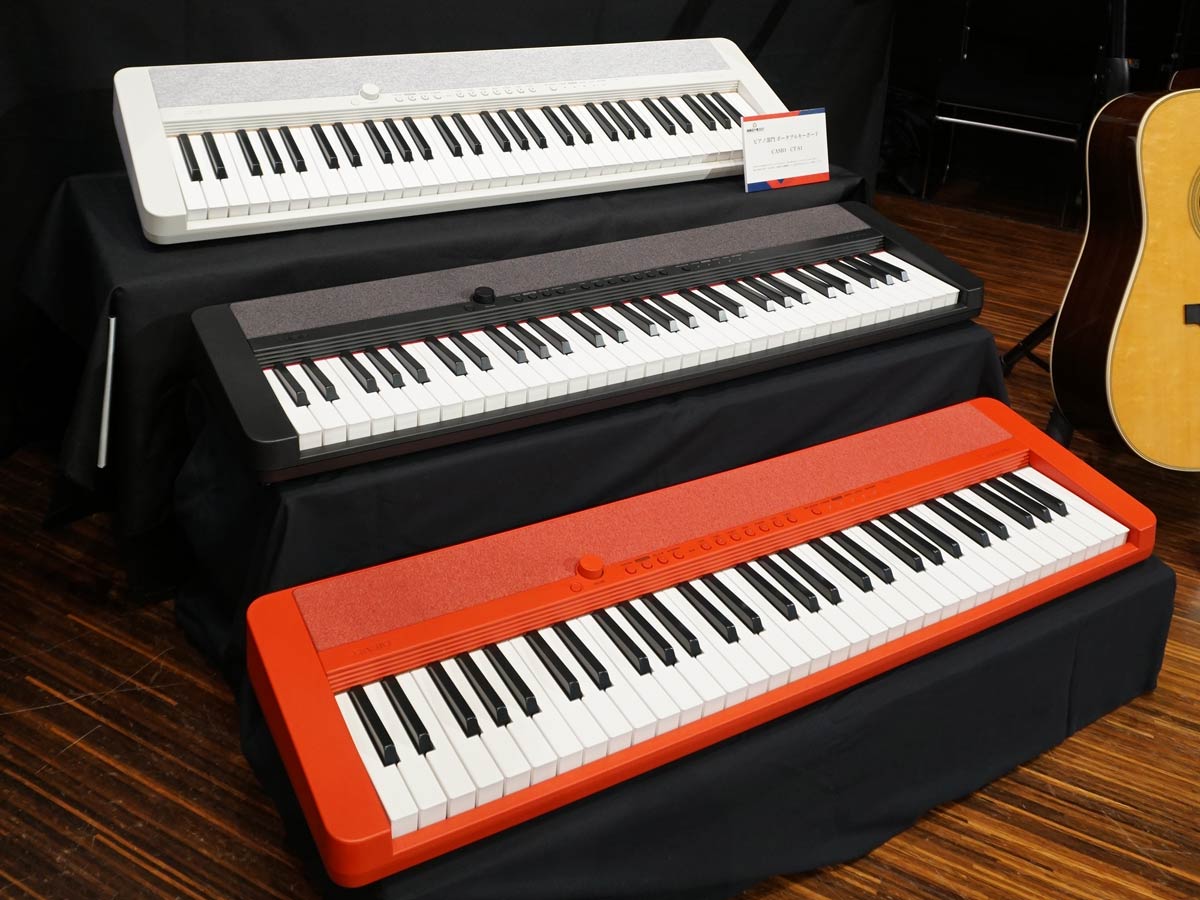
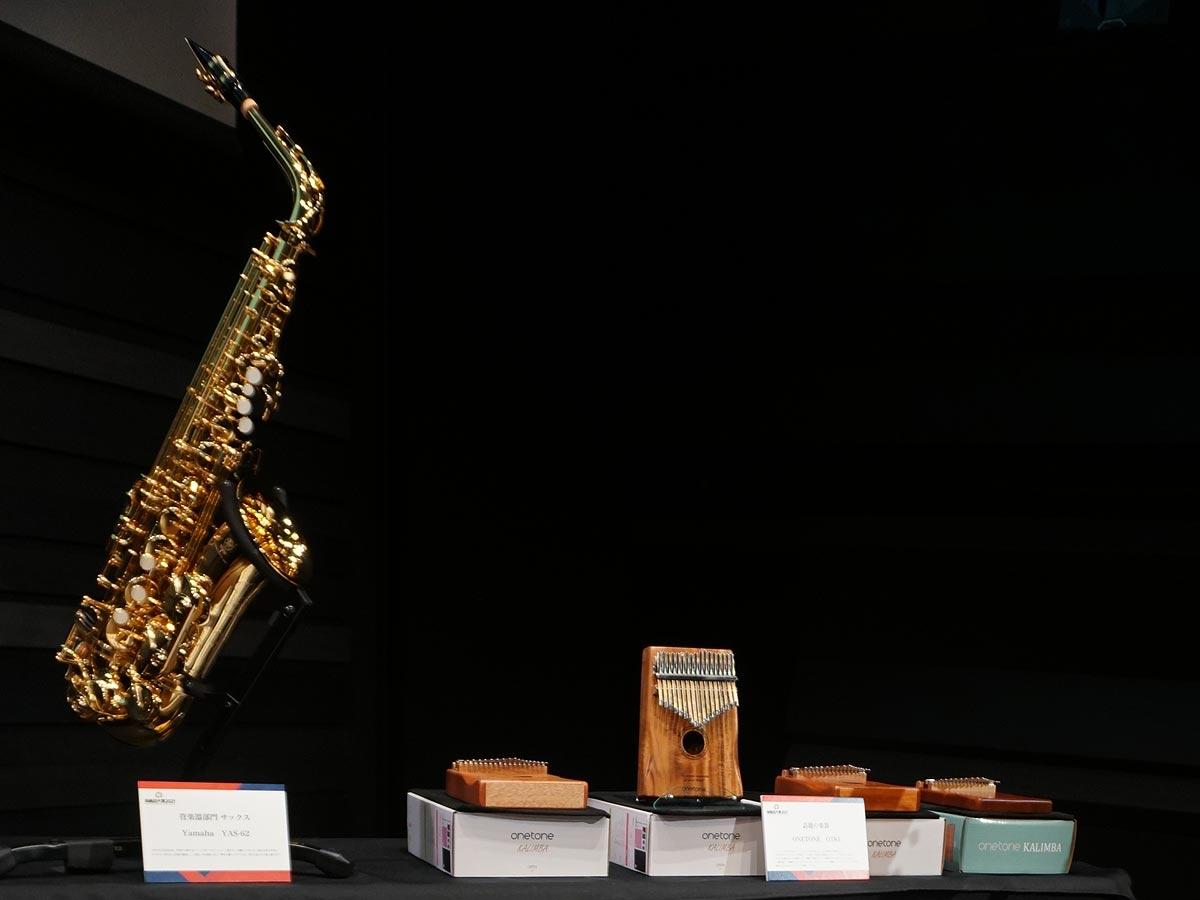
Images:
2021 The Best Products
Grand piano: Yamaha C3X espressivo
Upright piano: Kawai K-400
Digital piano: Kawai CA49
Portable keyboard: Casio CT-S1
Acoustic guitar: C. F. Martin D-28 Standard
Electric guitar: Yamaha PACIFICA 612
Classical guitar: Yamaha CG-TA
Saxophone: Yamaha YAS-62
The most popular instrument: ONETONE OTKL kalimba
2021The Best Players
Hayato Sumino (piano, “Cateen”)
Yucco Miller (saxophone)
Koujun (guitar)
Ryusuke Ohishi (Arabian tambourine, Special Best Player)

Yamaha Jazz Festival Comes Back
29th Hamamatsu Jazz Week took place after 2 years of suspension from October 16 through 24 at Hamamatsu known as the home of music and musical instruments.
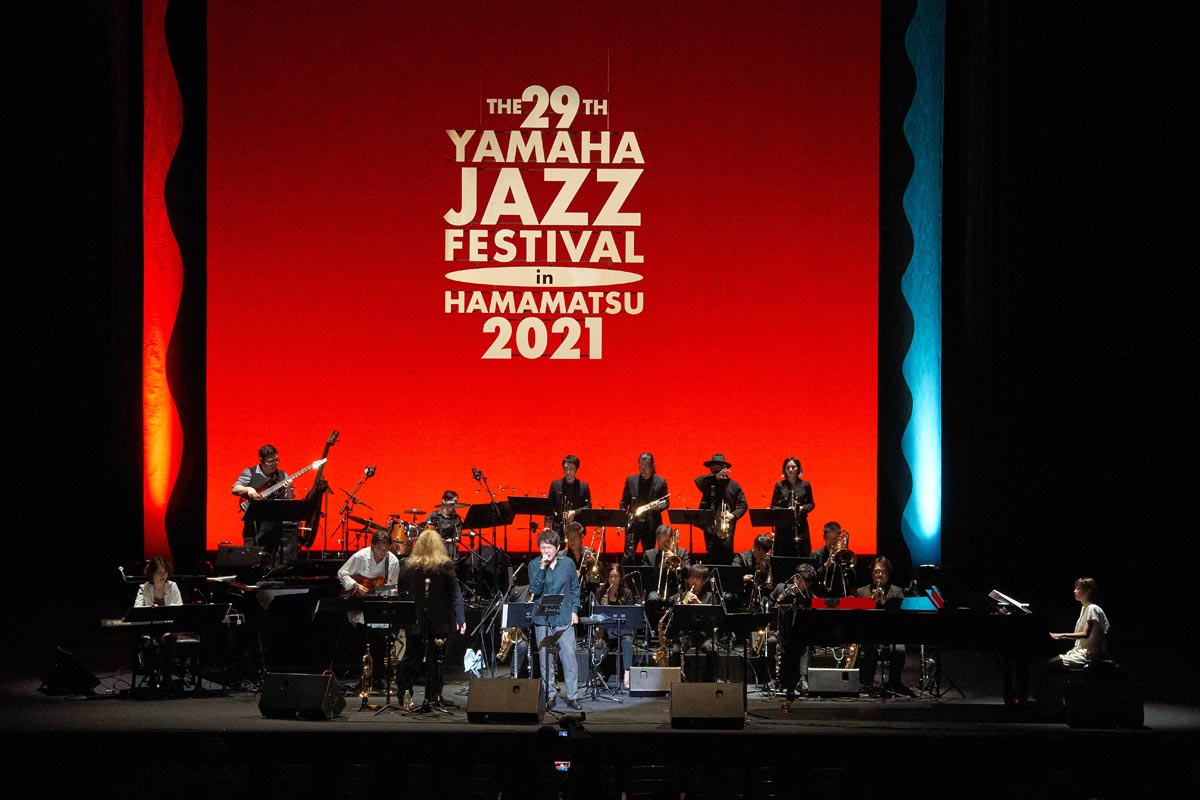
The established jazz festival was canceled because of COVID-19 pandemic last year. The organizer revived the event under strict safety regulations coordinating live and virtual programs. Hamamatsu literally turned into a city of jazz during the period as such popular programs including Joyful Jazz Concerts by Parents and Children, Student Jazz Festival and Street Jazz Festival were held at concert halls and jazz clubs throughout the town.
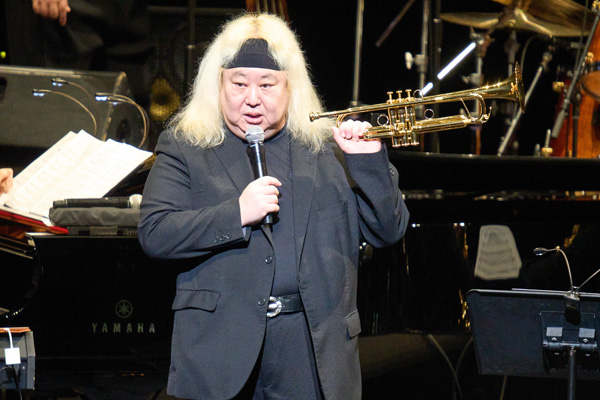
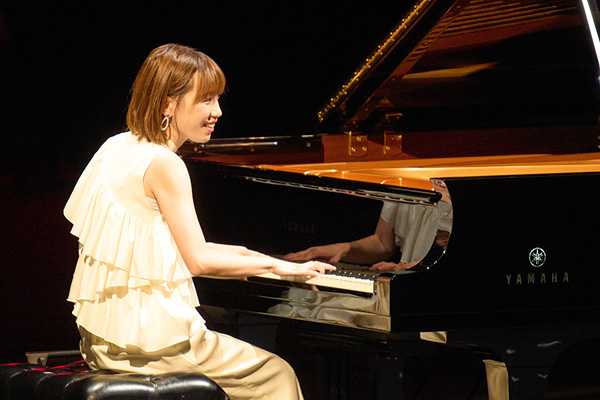
Yamaha Jazz Festival, the highlight of the event took place at Large Hall of Actcity Hamamatsu on October 24 featuring RINA, up and coming pianist and her trio, Takana Miyamoto, an international cross-genre pianist and her trio, and Eric Miyashiro with Yamaha All Star Big Band.
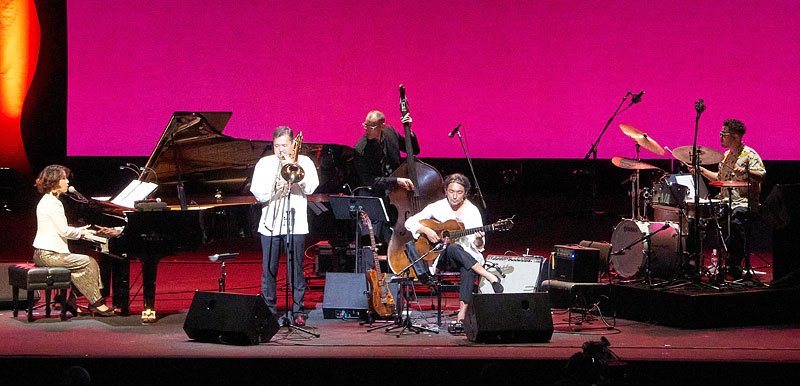
2021 Shinshu Guitar Festival
High-end guitar makers in Nagano Pref. which is known as the largest manufacturing base of high-quality guitars in Japan held 2021 Shinshu Guitar Festival on November 13 and 14 at Shinmai Media Garden in Matsumoto.

With an exhibition of over 150 electric guitars and bases from 12 brands built in Nagano, the appointment-based event drew 700 visitors seeking special and original gears. More than 80% of them came from remote areas including Tokyo and Nagoya reflecting growing interest of collectors.
The visitors were able to experience and buy the instruments onsite and even order original models using precious local wood materials through talks with the builders face to face. They also enjoyed watching production processes of instruments from cutting neck, fret works to set-up procedures. Total sales for the 2 days marked 20 million yen.
Talk session on wood materials inviting Makoto Sugimoto of Sugimoto Guitars, and a surprise visit of Kazuya Yamaguchi, guitarist and supporter of the festival were streamed online.

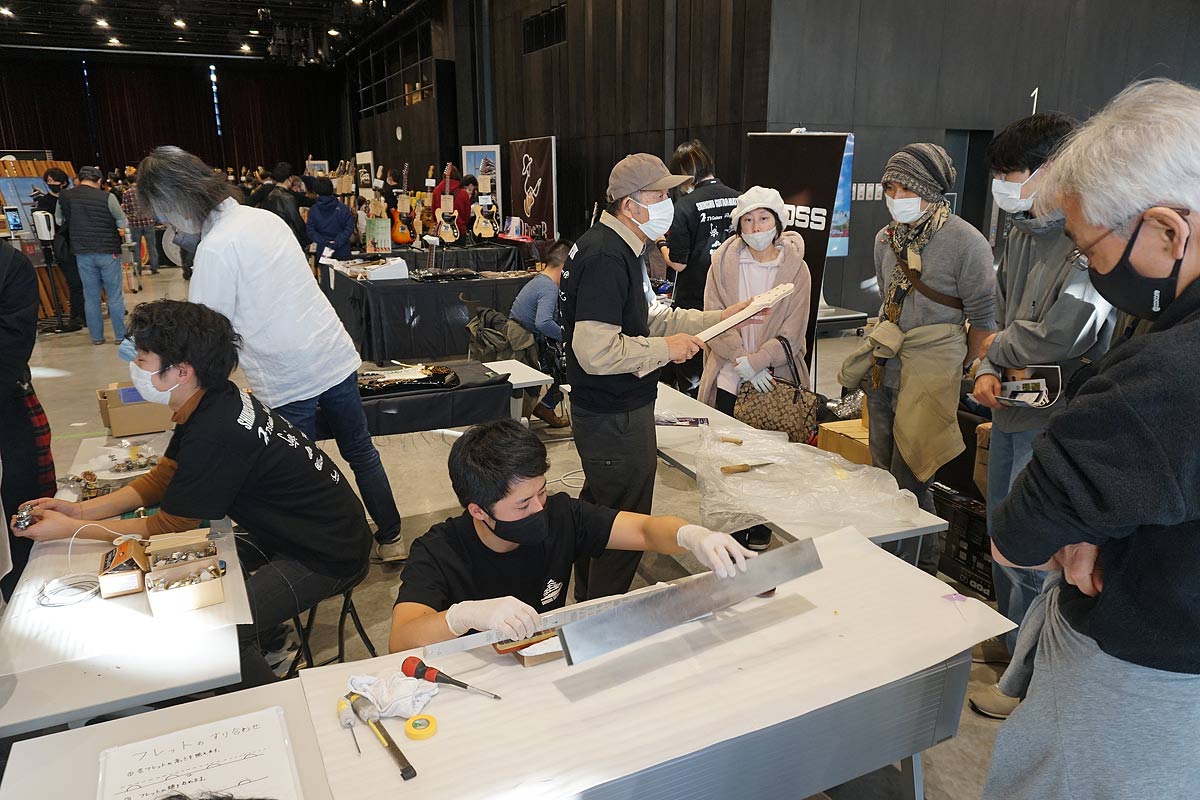
Mikio Ohta, a key member of executive committee (Matsumoto Parco store, Shimamura Music) said, “We are pleased that we increased sales opportunities by listing all guitars on exhibit on our website earlier and had Digimart join online distribution. They were well accepted by the customer. All in all, we have solved obstacles we had last year, and it helped us improve the value of the event. “
Digital Piano Specialist Store Opens in Tokyo

Otto Akihabara, specialist store of digital piano opened on July 1 at SEEKBASE, Akihabara, Tokyo. It’s a subsidiary of Nagoya-based Otai Audio, a high-quality audio products retailer which also operates DJ/DTM specialist store, and organizes DMC Japan, an international DJ event, and BEAT GRANDPRIX, Japan’s largest song track production event, etc.
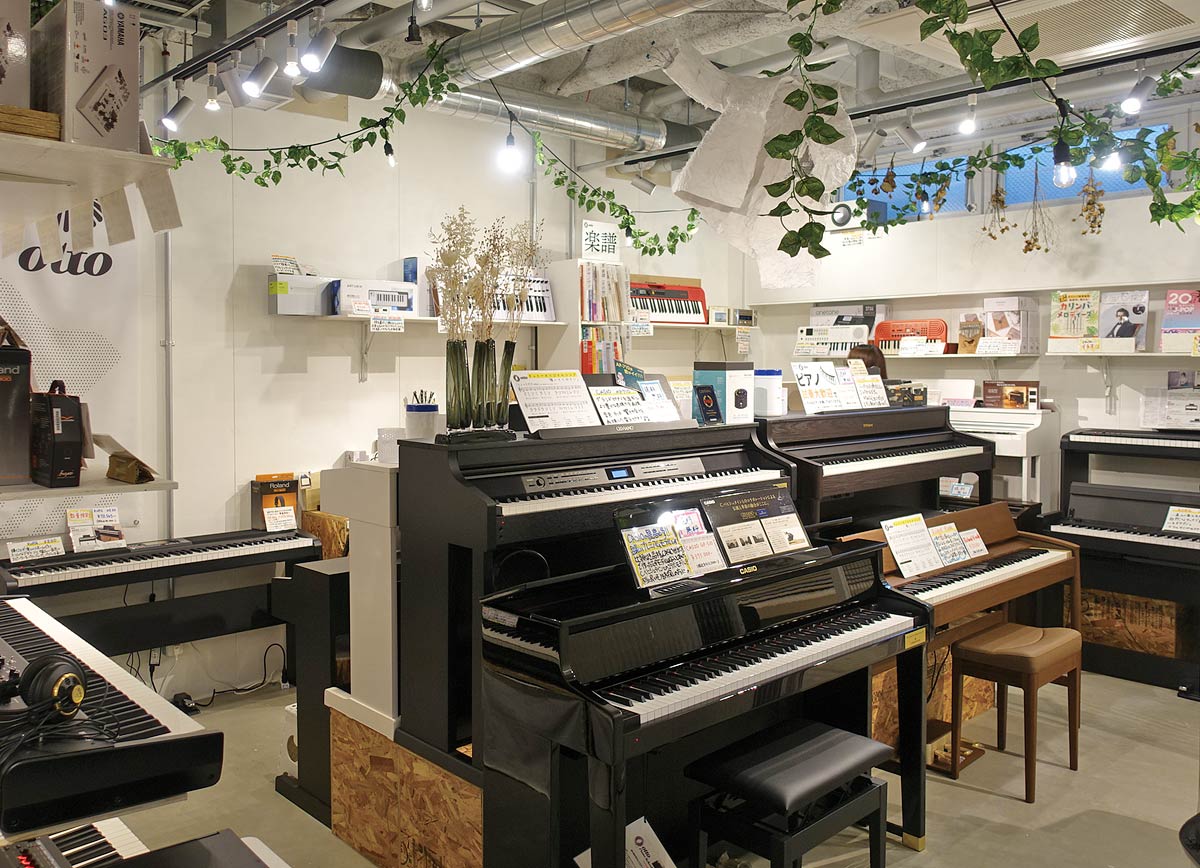
Yosuke Inouye, president of otto explains why the company launched the digital piano specialist store, “Every digital piano distributed by many different manufacturers have unique, rich and sophisticated functions. They meet needs and conditions of Japanese homes and online environment, and are one of the most attractive instrument among users today. But they still have a somewhat negative image as an alternative to acoustic piano. We thought that it was our mission to change this misinterpretation and opened otto in collaboration with the manufacturers.”
Otto has 30 models of digital piano of various makes at the sales floor. At one corner, it has a cozy lesson room using digital piano. When opened, the store held an opening reception providing piano concerts and live sessions inviting DJ and players of other instruments. As the store announced the event using social media, 100 seats were instantly filled. Inouye plans to continue this kind of event for lonely home pianists and build a network for them in coming months.
Otto also plans a casual style online piano competition for players of acoustic, digital and MIDI pianos at reasonable fees of 2,000 yen (students) or 3,000yen (adults) in one of coming months. Contestants can submit their performance data uploading on YouTube.
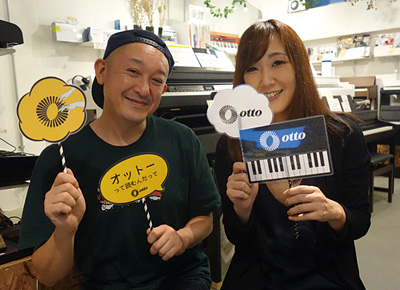
Inouye says, “We hope we can offer budding pianists a stage where they are properly judged by their musicality and skill. It will help contribute to establish local piano culture. It will support not only students and busy businesspersons but also aged and handicapped pianists to take part online. “
He continued, “Opened in the difficult times when our society and economy were impacted by COVID-19, we have struggled keeping our business going so far. But we believe promoting advantages and capabilities of digital pianos as well as building good relationship with local customers are the only way to survive. “
6 Store Managers Talk About Digital Piano Business
Japan Music Trades interviewed 6 managers of leading music stores in Tokyo and Osaka Areas in hopes of knowing what they expect for future business of digital pianos, which achieved dramatic sales increase during the lockdown.
“We opened the first digital piano specialist division in Ikebe Musical main store in Shibuya last March. It’s an easily stopped by casual spot for piano players, seasoned pianists, and young families with children. The market for digital piano is separated into either entry-level or high-end classes. Experienced players and parents seeking instruments for their children choose Kawai CA and Casio GP, in appreciation of their acoustic piano-like tonal quality. On the other hand, first time players and parents tend to buy instruments at reasonable price as they are uncertain how long their children keep playing. Particularly, such slim size types sell well as they don’t take much space at living room.
“The problem is some models are out of stock at manufacturers’ factory and warehouse, and they must select the pianos from our limited inventory. Not a few customers frustrate that they can’t buy desired instruments right away. There are demands but we lose businesses without products they want. What it happens now.
“We see shortage of supply won’t be solved for the time being. One positive way to cope with the condition is to have stage pianos for pop music genre and new attractive items like Dexibell line not much distributed by traditional piano stores.
“Six months have passed since the launch, we are not contented with the present style of business, and we believe we can expand our services to better meet the requirements of our customers.”
Junji Abe, Assistant Manager, Anneau Piano, Ikebe Musical Instruments Store, Shibuya, Tokyo
“We launched otto Akihabara specialist digital piano store last July to offer versatile selection of digital pianos. Such diversified models are available, we want consumer to know advantages and benefits of digital pianos, not as a substitute to acoustic counterparts.
“In addition to a selection from 20 to 30 digital pianos, we have an in-store lesson section at one corner of the sales floor. Our largest customer group sharing 60% of the total is middle-aged over 45 years old. In many cases, they buy instruments in attractive price between 200,000 yen and 300,00 yen, like Casio Privia PX-S1100. They are also interested in Casio GP-510BP (400,000 yen) and Dexibell VIVO S7 intermediate class models. We set up those instruments ready to touch and play for easy comparison.
“Since we originally launched as an expert of DJ hardware and DTM products, it’s our strength to streamlining live events. In fact, not a few visitors drop in our store after viewing the video contents. We are happy that they choose us as a music store to casually come in and have fun shopping experience.
“We plan online digital piano competition in collaboration with our suppliers. Setting a minimum entry fee, it will be appreciated by first time pianists. We hope we could support entry-level players providing them with much excitement and pleasure to play the piano.”
Yosuke Inoue, president and Kayo Yamafuji, sales staff, otto Akihabara, Tokyo
“Last year, we were kept busy coping with inquiries from July and August. By September orders rushed in, and we worried about shortage of supply. The situation has little improved these days, but sometimes we have to ask our customers to wait for extra months before their new pianos delivered their home.
“Most of our customers come to us seeking digital pianos for lesson of their children, and they plan trade-up to acoustic piano years later. Kawai CN series models at 100,000yen price range are the first choice for the parents considering trade-up within 3 years. While those who consider much longer use or prefer natural key touch and control capability from the very beginning are likely to choose CA series pianos which have a wooden keyboard, typically, CA49 priced at around 200,000 yen.
“In the midst of lockdown, we had more female customers, largely over 35 years old, seeking pleasure of playing piano at home than before. They simply wanted to play the piano, more conscious about key touch than such advanced functions as Bluetooth.
“As a manufacturer of both acoustic and digital pianos, Kawai offers the market digital models fully taking advantage of acoustic counterparts. We believe we can meet the demands of customers with expertise and experience on both types in the coming biggest business season.”
Masahiro Yabe, assistant manager, Kawai Omotesando Store, Harajuku, Tokyo
“We sold considerable number of attractively priced digital pianos last year thanks to the so-called ‘stay home demands’. They were largely hobby music makers. Despite the shut down for nearly 45 days, our 12-month sales grew between 80% and 90%. It was the biggest year for the keyboard section after we opened in 2014.
“Now, the difference from last year is we see more children and students coming back to classes. Parents are likely to spend more for their children and music lesson than before which results in a 20% increase of average unit price. Price range of digital piano for school-age children is around 200,000 yen. But they are in many cases out of stock these days. The parents often contented and buy upper class models and Yamaha hybrid pianos priced around 300,000 yen after they were referred to these models and learned the features and capabilities. Sales remain flat in unit but go up in value.
Yet, we see business may fluctuate under the current under supply of products and change of trend in the market as our life slowly returns to pre-pandemic days. We just get prepared for change and provide local customers with much needed service.”
Hikaru Tamaki, store manager, Aeon Mall Kita-Toda Store, Yamano Music
“Increasing number of people stayed home longer than before and worked from home, demands for stylish pianos are substantially growing in unit than last year. Sales of digital pianos for music lesson remains no change, but suppliers have struggled with limited supply of chips which causes music retailers no products to sell as there exist demands. Given that people are likely to have extra time to explore new activities at home, the trend will continue in coming months.
“We see sales for music class and private lesson students increase at physical store, adult music makers buy more online. People with music experience and first-time music makers are also visiting us. Though customer traffic at brick and mortal store is decreasing, we believe people find real value in experiencing something real time.
“We still don’t go out freely today. Increased leisure time is influencing spending style and time of people. We see new businesses including cross-industry trades frequently arise today. I think this trend will further accelerate. It’s a key how to integrate digital and analog technologies and provide customers with products and services matched to their changing requirements.”
Michinori Ikegami, Sales Development Group, Jeugia, Kyoto
“We see demands for digital pianos increased after the pandemic. Undersupplied products even make music retailers from outside of Kyoto contact us.
Last summer, declaration of the COVID-19 Statement of Emergency and bad weather devastated store traffic. Also, summer wage bonus campaign failed to stimulate consumer spending.
“The situation reversed in September with increasing store traffic, and appointments via Internet which resulted in the largest business after the last best sales we achieved in 2019.
Demands grew for models in 100,000 yen retail last year, but this year, Yamaha CLP-775, an over 200,000 yen model sells well. Increased free time at home has become a standard, and people are likely to spend more money on music gears. Digital pianos sold to music lesson studio students still dominate among the total sales, but we see increasing number of adult customers in the age group from 30 years old to 50 years old visit us. Not a few of them are likely first-time players or people with some musical experiences.
We have enhanced spreading information on our website and SNS since the outbreak of COVID-19. Responses from consumer by mobile and the website tell us that we have done right things. Providing customer with basic information is critical to this business.
The industry’s utmost concern is slow product supply related to shortage of chips at suppliers. As a large keyboard instruments specialist store, we are now upgrading our marketing explaining customer advantages of digital piano including environmental conditions when play in comparison with acoustic piano at home and in lesson.
Nobuyuki Koike, manager, Musical Instruments Sales, Shinkyo Gakki, Amagasaki-shi, Hyogo.
2022 Tokyo Music Fair Cancelled
Japan Musical Instruments Association (JMIA) held the 3rd general meeting online on Oct. 22 with participation of 15 members and decided that the association cancelled 2022 Tokyo Music Fair, which was originally planned in fall of 2022.
The next Tokyo Music Fair will be held in 2023 under the new guidelines to increase music makers, promote attendance of young generations with senior high school students as targeted age group, and to be held in hybrid style (physical and online).
2020 Music Products Industry Manufacturers Survey- by Japan Musical Instruments Association
Japan Musical Instruments Association (JMIA) completed 2020 Music Products Industry Survey of Manufacturers, recently. It covers 12 months from April 1, 2020 through March 31, 2021.
JMIA sent a questionnaire to 75 music products manufacturers throughout Japan of which 47 companies participated. Though the 2020 survey was finalized with 9 companies fewer than the previous survey, it surely depicts a scape of music products manufacturing business in Japan. 2020 Survey of Music Retailers will appear in December issue of Japan Music Trades.
The survey reveals for the first time after the world confined in lockdown how much the COVID-19 impacted the manufacturers and their businesses.
While demands for wind instruments sharply dropped as music education at school almost stopped to prevent virus infection, and sales of large keyboard instruments stalled after shutdown of music lesson studios in town, business of acoustic guitars and DAW-related gears flourished supported by staying home demands.
Electronic keyboards helped keep the industry afloat
Sales of upright and grand pianos, and automatic player pianos were 47.6 billion yen during the year. Adding 71.6 billion yen sales of digital pianos, the category shared the largest 46% of the total.
Gross domestic shipment of acoustic and grand pianos, and automatic player pianos was 9,579 units, a 25% decline over the previous year. They dropped 24% in value to 5.8 billion yen. Slowdown of factory operation influenced the manufacturers to some extent, but total production was not much affected with minor 9% decline of output from the year before in the domestic market. On the contrary, overseas production was harder hit with 22% decline in unit.
Last year 7,028 upright pianos, that was a 21% decline from the previous year, 2,434 grand pianos, a 34% decline, and 117 automatic player pianos, an 18% decline, were shipped in the domestic market. While, export of upright, grand and automatic player pianos moderately declined between 12% and 18%.
It’s broadly reported that sales of digital pianos and electronic keyboards significantly increased during the global lockdown, but the domestic shipment of them were impacted by shutdown of music lesson studios.
Digital piano shipment in the domestic market increased 6% to 210,000 units. While export of the category rose 15% to 1.6 million units.
Domestic shipment of electronic keyboards with standard size keys declined 6% (240 thousand units), and export gained 3% (2 million units). Export of electronic keyboards with small size keys increased marginal 1% to 500 thousand units, but domestic shipment jumped up 51% to 150 thousand units. It’s notable that domestic shipment of electronic keyboards with small size keys and export of digital pianos remarkably increased in 2020.
The sizable increase of electronic keyboards with small size keys in the domestic market is possibly attributed to the fact that some schools purchased the instruments in place of recorders and harmonicas to prevent spread of the corona virus.
Wind instruments decreased 34%
Domestic shipment and export of wind instruments reached 20.4 billion yen, sharing 8% of total sales. Value-wise, total shipment of the category dipped 34% (33% domestic shipment and 35% export).
As explained somewhere in this report, the heavy tall on this category was brought by headwinds of COVID-19-related restrictions including self-confined music activities at school and music lesson studios in town, as well as cancellation of all types of music competitions. Every factor struck demands for wind instruments.
Domestic shipment of woodwind and brass instruments declined 30% and over 40%, respectively, both in unit and value. Other wind instruments also recorded severe decline: flutes, -23% in both unit and value, clarinets, -27% in unit and 39% in value, saxophones, -25% in unit and -36% in value, trumpets & cornets, -39% in unit and 43% in value, and trombones, -47% both in unit and value.
Export of clarinet recorded the largest decline with -47% in unit and 49% in value. Other instruments also declined: flutes, -47% in unit, 39% in value, saxophones, -23% in unit, 26% in value, trumpets & cornets, -34% in value, -39% in value and trombone, -34% in unit and 40% in value. All in all, woodwind and brass instruments export dipped 38% in unit and 33% in value.
Production and domestic shipment of string instruments including violins, violas, celli, double basses, and electric violins increased not much affected by the pandemic as they are not breath-controlled instruments. Export of them increased 37% in unit but went down 4% in value. Given that domestic shipment more than doubled (234%) in unit but decreased 17% in value, demands soared for entry level inexpensive models during the year.
Drumkits and electronic drums increase
Domestic shipment and export of percussion instruments increased 14% to 20.5 billion yen. Export of drumkits rose 36% in unit and 50% in value, while single unit drums rose 18% in unit but dropped 7% in value.
Percussion hardware increased nearly 30%. Export of sticks and mallets tripled in unit and went up 51% in value.
Domestic shipment of drumkits increased 12% in unit but decreased 2% in value. Cajons also ended with fare increase of 15% in unit and 9% in value.
Marching drums have traditionally shared larger part of export in the total shipment, but they fell 52% both in unit and value last year. Domestic shipment of them also declined 27% in unit and 29% in value.
The same conditions halted shipment of wind instruments also impacted the category.
Export of table-top xylophones slipped down 47% both in unit and value. On the contrary, domestic shipment of them increased 73% in unit and 44% in value, which suggests more schools purchased them in preference of safer instruments against the corona virus than blown instruments in ensemble music.
Backed by strong demands during self-confinement, domestic shipment of electronic drumkits jumped up 36% in unit and 47% in value. Export of them increased 24% in unit and 40% in value as well. They much contributed to the excellent results of this category.
Sound domestic shipment of acoustic guitars
Domestic shipment and export of guitars and related products including acoustic guitars, electric-acoustic guitars, electric guitars & basses, amps, effect pedals, tuners and strings marked 40.4 billion yen, sharing 15% of the total sales.
Though export of acoustic guitars only slightly increased despite of demands grown during the lockdown, domestic shipment of them advanced 29% in unit and 22% in value. Export of electric-acoustic guitars also went up 38% in unit and 22% in value. Domestic shipment of them followed the same pattern as export with 23% increase in unit and 8% increase in value.
It is hard to know what happened to export of electric guitars last year. The figures of domestic shipment and export last year are incomparable because they are totally irrelated to the results of the year before last.
Last year Japan exported 420,000 electric guitars, which was an increase of 332%, and they valued 7.9 billion yen (an increase of 267%). On the other hand, domestic shipment of the instruments was 49,000 units, a 31% decline, and valued 3.5 billion yen, a 35% decline. There was no such enormous unbalance between export and domestic shipment of amps and strings. Consequently, it suggests incorrect reports submitted from participated manufacturers, not any changes of trend in the market, or, simply decrease of manufacturers participated in the survey.
Export of amplifiers and guitar and bass strings increased 29% and 592%, respectively. Domestic shipment of them increased 5% and 15%, respectively.
Lockdown hit recorders
Domestic shipment of miscellaneous instruments including harmonicas, melodicas, accordions, recorders, ocarinas and Taishokotos dropped 10% both in unit and value. Recorders decreased 14% in unit and 20% in value as the instrument was not recommended in classrooms during the pandemic. Similarly, harmonicas went down 28% in unit and 19% in value.
Contrary to recorders and harmonicas, domestic shipment of melodicas marginally declined, only 2% in unit and 3% in value.
Ocarinas gained 12% in unit and 5% in value. It’s likely that the instrument drew attention and interest of adults for their pastime music making.
Brisk export of digital musical instruments
Total shipment of keyboard synthesizers and other digital musical instruments went down 3% in unit and 18% in value. Keyboard synthesizers achieved healthy growth of export with 6% increase in unit, while other digital musical instruments decreased 5% in unit.
Domestic shipment of both categories went down 6% in unit, and 18% in value, and 22% in unit and 11% in value, respectively.
On the 2019 survey, both categories came with extraordinary results, dramatically low level of overseas production, while domestic production surged between 8 times and 50 times depending on items over the previous year. Since 2020 overseas and domestic production reverted to the close level of 2018 survey, it’s likely some manufacturers reported wrong figures in the 2019 survey.
Remarkable 17 times increase of cabled microphones
The figures tell increased demands for DAWs, microphones for online music lesson, and purchase of new mixers and interface during the lockdown.
Domestic shipment of cabled microphone jumped up 1,684% in unit and 324% in value. The same went for mixers (222% in unit, and 139% in value), sound cards & related hardware (129% in unit and 146% in value)
Significant decline of hand-held recorders in 2020 may reflect no report from some influential manufacturers.
※Full 2020 Manufacturers Survey appears on October issue of Japan Music Trades.
Perfume of Music Created By A Music Retailer
Hamamatsu-based Aoi Music put “Perfume of Music” on the market in the summer of this year. They were created with inspiration taken from masterpieces of classical music by J. S. Bach, Frederik Chopin and Ludwig van Beethoven.
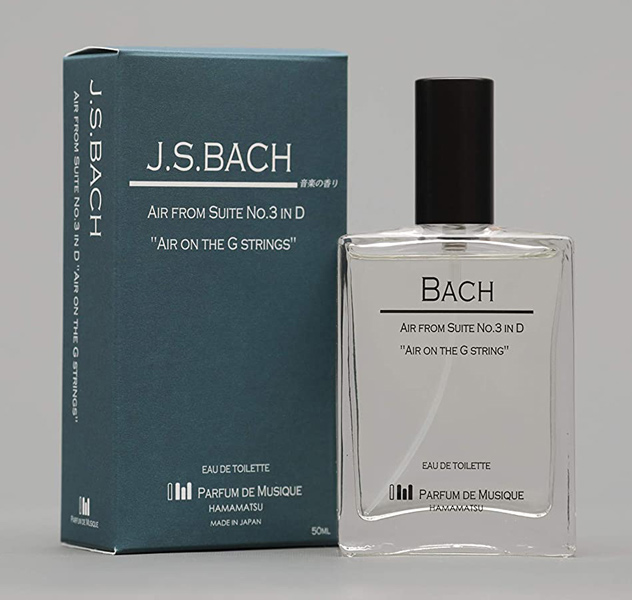
Masayoshi Kawakami, president of Aoi Music says, “Our business entered into a new phase after the COVID-19 started to spread globally. Communication with customers through the internet, live music streaming and online sales have all become a standard in our society today. Music products industry has lost opportunities to provide customers with musical experience real time. The thought of creating Fragrance of Music came to me last year as I talked with industry friends during the lockdown. I wanted to deliver people value of real time experience.
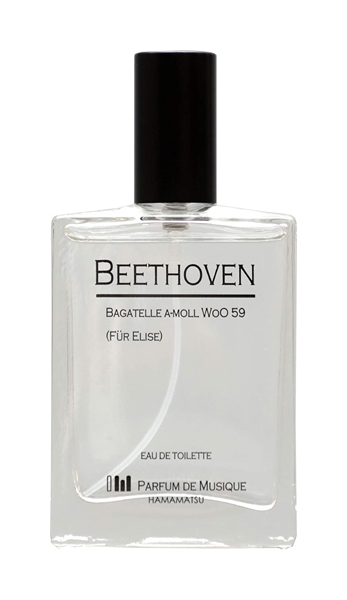
“Perfume and music have a trait in common that their impression changes as they continuously flow. They also inspire people of their feeling and artistic sense. Particularly, their characteristics are hardly felt without physical existence. We thought we could offer people a sense of experience with Fragrance of music. “
Teamed with an experienced perfumer and Hamamatsu Chamber of Commerce and industry, Kawakami successfully completed 3 types of Fragrance of Music eau de toilette, ‘Air on the G string’ (J. S. Bach), ‘fuer Elise’ (Ludwig van Beethoven), and ‘Fantaisie Impromptu’ (Frederik Chopin).
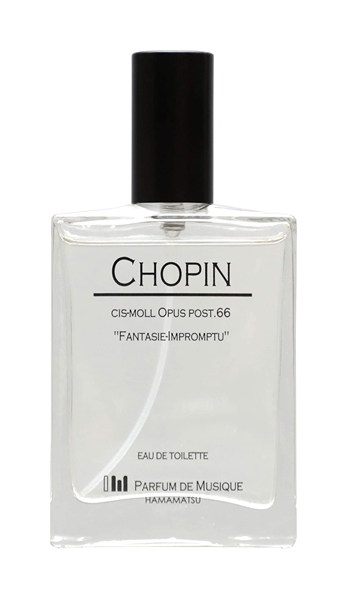
Air on the G string has refreshing and pleasant fragrance of lotus, lily of the valley, and cedarwood. Sweet scent of rose and orange were blended for fuer Elise, and Fantaisie Impromptu expresses heavy touch of piano keys with a combination of elegant rose, sandal wood, and vanilla.
Perfume of Music drew attention of multiple media as soon as they were launched. Aoki Music sees music stores as the most prospective customer group as well as young women, and couples to be selected as gifts.
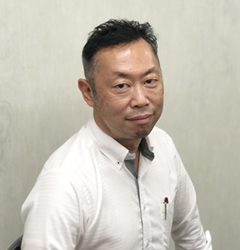
Kawakami expects sales increase of the perfume as they are used while listening to music, or pianists wear them in concerts. He also said that Perfume of Music makes a good match for Hamamatsu, which is called as City of Music, and that could help people to build communication and generate interest in music.
Perfume of Music is distributed by Itoshin Musical Inc. (e-mail: info-t@itoshin.co.jp).
Introducing Musical Instrument Certificate for Cross-border Touring Musicians
The Ministry of Economy, Trade and Industry introduced Musical Instrument Certificate which reflects the resolutions of Convention on International Trade in Endangered Species of Wild Fauna and Flora (CITES) on July 1. It’s expected to help cross-border touring musicians especially those players of Japanese traditional musical instruments using ivory and tortoise shell for plectrum and bridge.
Says Kyoichi Yamada, vice chairman of Association of Japanese Traditional Musical Instruments Manufacturers, “The certificate is issued for holders of guitars and bows for violin. We understand it contributes to help support musicians of traditional musical instruments and their performing activities overseas.”
CITES took effect in 1975 and Japan ratified it in 1980. Adding Appendixes I, II and III in the following years, it rules detailed endangered species to protect them from illegal crossborder trades.
As far as musical instruments are concerned, ivory once used for the natural keys of acoustic piano, and now for post, plectrum, stick, peg, and bridge of shamisen, as well as tortoise shell applied to stick and bridge of shamisen are regulated materials.
More recently in 2017 Dalbergia including rosewood and bubinga were added to the Appendix II items. However, those wood materials except Brazilian rosewood were excluded from the list of regulated items today.
Export and import traders handling musical instruments and accessories using these regulated materials were requested to obtain a CITES certificate for trade before, but the musical instrument certificate replaces it and is valid for 3 years. The term can be extended further on request.
The certificate is issued to individual professional and amateur musicians playing the musical instruments and accessories using the regulated materials touring cross-border for free or paid performance, exhibition, and competition, but not to groups. The relevant instruments and accessories should not be sold or abandoned abroad, and should be brought back to Japan even if they are damaged.
The certificate is valid in U.S.A., Canada, England, France, Germany, Spain, China and Korea.
Musical instrument certificate : Government of Japan
Japan Musical Instruments Association (JMIA) Special Online Seminar: Takuya Nakata, Chairman and Jyun’ichi Miki, Director Talk on Future of the Industry
JMIA held the 2021 annual meeting online on June 7. It was followed by an online special seminar, “Future of the Music Products Industry” inviting Takuya Nakata, chairman and president of Yamaha Corporation, and Jyun’ichi Miki, director and president of Roland Corporation. They talked on wide spectrum of topics from the pandemic to future activities of the association. Here are excerpts of the seminar. MC: Masato Oshiki, manager of general affairs and president of Yamaha Music Japan Co., Ltd. (photos: Takuya Nakata, top left, Jyun’ichi Miki, top right, and Masato Oshiki, bottom)
How can the industry turn new music makers evolved during the pandemic to loyal customers?
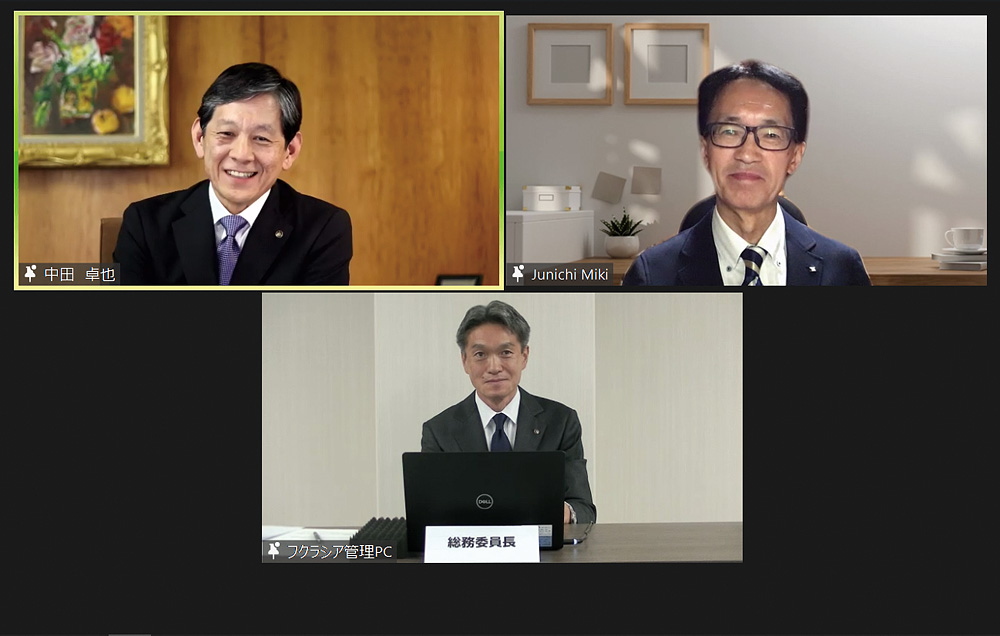
Oshiki: We are still struggling and faltering in the pandemic. How do you think we can overcome the present difficulties?
Nakata: Unfortunately, music products are not necessity for everyone in everyday life, but to our surprise we have witnessed a growing number of people started taking lesson of musical instruments or resumed music playing as music soothes and gives us relaxed feeling and pleasure during the lockdown. While sales of wind instruments stuttered due to greater fear of suffering from the desease while in play, businesses of other musical instruments rather exceeded the level of pre-pandemic. A trade wind for the industry. We can take advantage of this surge. People throughout the world found pleasure of music again.
Miki: We have used to talk people admire music making until very recently but not to be sure. Suddenly, the pandemic surfaced the demands. COVID-19 helped accelerate the desire of people to enjoy music playing. I think more leisure time at home will become a new trend. Nevertheless, they will be happy to go out once we overcome corona virus, but change of work style, increase of work from home may stay as a mainstream. How do they spend the extra time at home? Surely, they will turn to creative works such as music playing, painting picture, or advanced computer games. We have greater opportunities ahead.
Oshiki: We had a lot of music retailers participated in the annual meeting. We know middle or small businesses share a large percentage in the industry. The pandemic devastated shops on street, and as a result, EC prevailed. How can retailers keep their business go on in this hard time?
Miki: Lockdown seriously affects music retailers. It is natural that consumer unable to visit shops on street choose online shopping, and EC flourished. On the other hand, not a few people were convinced value of real time experience. They found going to live concerts and seeing friends in person are essential.
After we beat COVID-19, what can we offer customer face to face? Online trades must go on, but we can integrate value of visiting shops on street.
Nakata: I agree. We likely to view online and traditional trades as different means for business, but it does not tell any difference. Small store owners may say, “We are not ready to start EC”, but they can think another way. EC increases customer base. Then, how to lead new online customer to real shop? Music playing is fun in solo, but it is more exciting playing together with friends. Given that, there are many ways we work in individual local market. The pandemic has shed light on local issues and speciality business more than ever before. Capitalizing on one’s strength in given area, music retailers can better communicate with local music makers and turn them into loyal customer.
Change of value can expand the market
Oshiki: The pandemic almost devastated school music programs and extra curricula band activities. Many music retailers report decline of music teaching class enrollment. How do you see music education after the pandemic?
Nakata: I understand music education was only affected tentatively. After COVID-19 problem solved, it will revive. But it is hard to say if it fully returns to the previous level. The pandemic has changed our conception of value in many ways. If we can offer customer products and services matched to their needs, I think demands for music making will never decease, but rather, grow. “
“We faced problem in terms of school music programs even before the pandemic. Yamaha has promoted small size band and ensemble activities to cope with shrinking school programs. They will make effects after we return to normal. Take an instance, golf industry heavily promoted the sport to attract young players with versatile programs before the pandemic, but they failed. COVID-19 altered mind of youth, and now golf is popular among young generations. Musical instruments have great opportunities to appeal to new music makers if the industry employs proficient approaches.
Oshiki: The world still sails without clear views amid the pandemic. Do you have any tips proven effective through businesses crossing border?
Miki: As far as musical instruments are concerned, music retailers can impress visitors with their business polices, characteristic product lines, rich inventory etc. online. At the same time, I think it is essential that they upgrade communication capabilities with customer on the net. The new music makers picked up their instrument for the first-time during lockdown are not regular visitors to shops on street. They neither get access to retailer website for information. How can we stimulate their demands for music playing? The internet is the key.
Roland has started providing Roland community member with information in their need directly by linking hardware and software on Roland Cloud. Music retailers have many options, mail magazine, blog, or live commerce to communicate with local customer. Even if they do not have staff or device to start EC, they can take other effective marketing approaches at much lower expense today. I believe they can find prospective customer in their local area.
Nakata: We stay at home and cannot see friends and relatives in person. In this circumstance, Internet and SNS play a key role in communication. In China, live commerce we heavily promoted for some time generated a good result. Now, we are implementing the system in the Japanese market, too. It is sure that we would not introduce this type of market approach before the pandemic. A kind of marketing innovation. The new approach will help us provide customer of this day with services matched to their new shopping behavior.
Oshiki: One widely spoken topic in Japan is problem in digitalization of society and things. As we know Japanese music products market has declined year after year partly because of lower birth rate. Some JMIA members are concerned that leading manufacturers are likely to be more concentrated on overseas markets than domestic business. Do you have any comment on this issue?
Nakata: The domestic market has diminished these years, but we understand it is crucial for Yamaha today as it was in the past. We are based in Japan, and majority of people working for Yamaha are Japanese. Future of Yamaha solely depends on the point that our brand is well recognized in this market. Incidentally, we see the home market all important, never leave behind.
Miki: Having headquarters in Japan, this is the best test market in every way. Low birth rate and aging population are ongoing issues in Japan. Senior citizens have enough time and money to spend, and growing number of them have subsequent musical experience. Japan can be a test case how we promote music making to those seniors and develop the untapped market.
Nakata: Aside from low birth rate, Japan keeps sizable level of population which suggests there is more capacity to increase adult music makers offsetting decline of young musicians.
Build business that contributes to the society: Seek value than price
Oshiki: We organized Musical Instruments Fair Japan last year, the largest industry event online. Do you have any comments continuing it?
Nakata: We decided to organize it online last year for safety of the industry members and visitors. I think we can rebuild the event from the ground level. There is a market supported by ample demands here. Japanese consumer will appreciate the consumer show held every year here. It is a place for us to transmit information and communicate with end user.
Miki: I think we can organize the event in hybrid style of virtual and live experience every year at a smaller venue. It will allow visitors to try new gears on site, and people in remote area to take part online.
Oshiki: Any other ideas to increase music makers?
Miki: Well, JMIA can support music retailers helping them set up local community uploading musical performance of in-store studio students. Music retailers can build local communities connecting customers and providing network.
Nakata: Yes, network is the key. Manufacturers, retailers, and distributors can work together to build network which connects providers and end user. This will only be materialized by consolidated work and commitment of all industry members.
Oshiki: Closing this session, do you have any clues for the JMIA members?
Miki: All involved in the industry understand that Japanese market has prospective demands, but less than 10% of the population play music. When ask about musical experience in the past, about 20% or 30% of the population will nod. We know between 80% and 90% of people have ever played recorder. We will be able to inspire and support them to start music making again. We at Roland plan some programs including online events, and consumer-friendly promotions carried out at small budget.
Japan’s economy has been affected by decades of deflation. Price cutting pressure never brings growth to the industry. We can expect higher unit price by offering customer truly valuable products at proper price. Also, excellent services will contribute to increase our revenue.
Nakata: Mr. Miki and I share the same prospect for future business of the industry. We are engaged in this nice business. We get paid from musicians as we offer them tools to help inspire their musical expression. They enthrall audience with their fantastic music and make them feel pleasure of music. A great cycle which makes all involved happy.
Much is talked about Sustainable Development Goals (SDGs) these days. As much as we serve music makers, we successfully contribute to the society. Everyone involved in this business has extraordinary passion for music and musical instrument. With help of them, I believe we can consolidate our efforts to further develop Japan’s music products market.
Yamano Gakki Sets Off Free Instore Music Experience Section
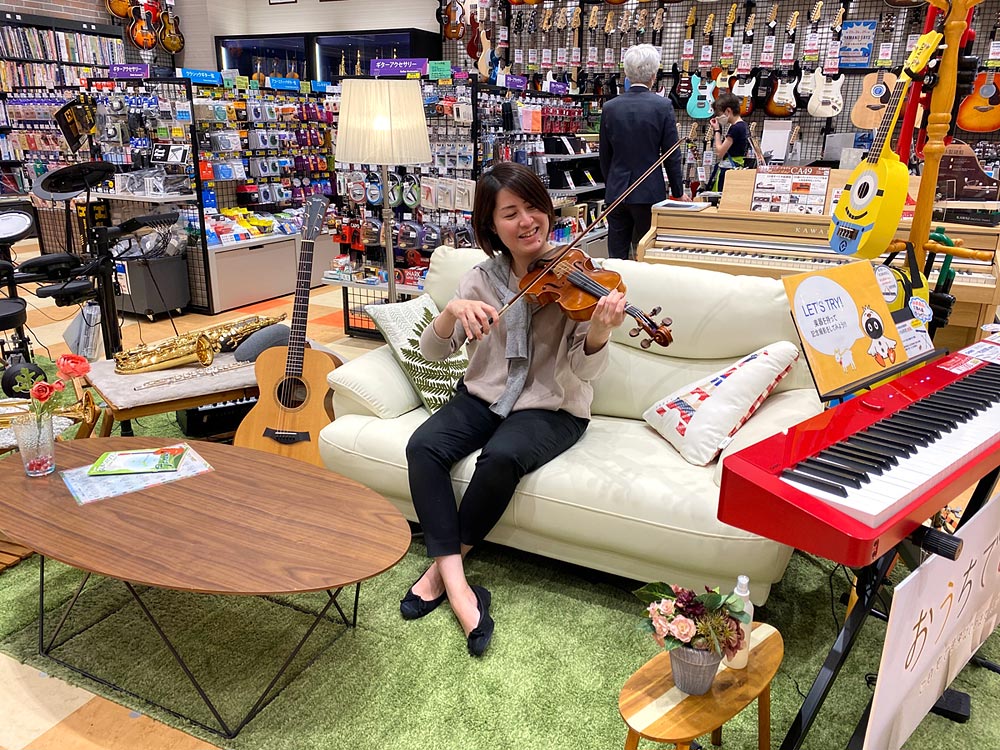
One of the leading music retail chains, Yamano Gakki has launched free music experience section at its outlets. First opened last December at Aeon Shopping mall in Ageo, Saitama-ken, the chain now operates it at 3 mall locations. Individual music experience section shares about 15 square meter space outfitted with a guitar, ukulele, violin, and saxophone offered for free experience as well as a sofa and a low table. Visitors are encouraged to try any instruments provided there which are rental gears for the instore music studio students.
Sales staff are trained at the attached music studios on basics of instruments offered in the section including holding position and how to produce sound.
Shunichi Niikura, consultant for Yamano Music says, “The largest customer group of shopping mall is parents accompanying children. We offer musical instruments popular among young children at the section. They are ready to touch and play in a relaxed setting. A lot of fathers and mothers have experience of music playing, and they talk with children about musical instruments they used to play when young. The sales staff are required to learn about basics of the instruments that are often not much familiar with in addition to standard customer services, but I expect the section serves to provide the visitors with a fun experience and motivate them to start music playing. In the end, I hope it leads to increase music makers.”
Masayuki Iishi, Pearl CEO Talks On 75th Anniversary
Pearl Musical Instruments Co., Ltd., percussion and flute specialist manufacturer celebrates 75th anniversary this year. Japan Music Trades interviewed Masayuki Iishi, who assumed the CEO position of the company in this last January.
Born in Kyoto in 1971, Iishi joined Pearl in 1995. After served several key positions including president of Pearl Distribution Company in Holland, and director and managing director of Pearl headquarters in Japan, he was appointed to director in 2012, then to managing director in 2019 before assuming the CEO position.
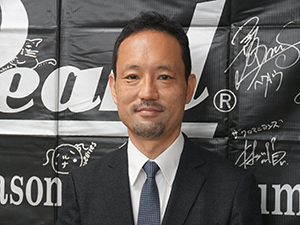
MT: Well, looking back 75 years of drum and flute manufacturing, will you tell us early history of Pearl and your future prospects for the company as CEO?
Iishi: The 75th anniversary gave me an opportunity to look back the Pearl history and the goals we originally set. Katsumi Yanagisawa launched Pearl in 1946 manufacturing music stands. Soon he expanded business adding acoustic drums to meet growing demands of the time. It was a hard time right after the WWII producing quality drums without substantial supply of principal materials including woods. The engineers had great difficulties to develop drum shells using materials other than wood in perfect circle with excellent tonal resonance. In 1965 we successfully launched President series drums made of phenolic shell. They turned out to be the first professional drums under Pearl brand and made a breakpoint for the company.
The President drums became a sensation in the drum scene not only in Japan but also in the world markets. Sometime later, we developed wood shell drums in original design and production method. They were refined and integrated in ensuing years. We also developed acrylic shells, and special shells coated with carbon fiber on inner surface. History of shell development illustrates history of Pearl itself. We also expanded our lines to include drum hardware, racks, pedals, marching and concert drums, timpani as well as Latin percussions.
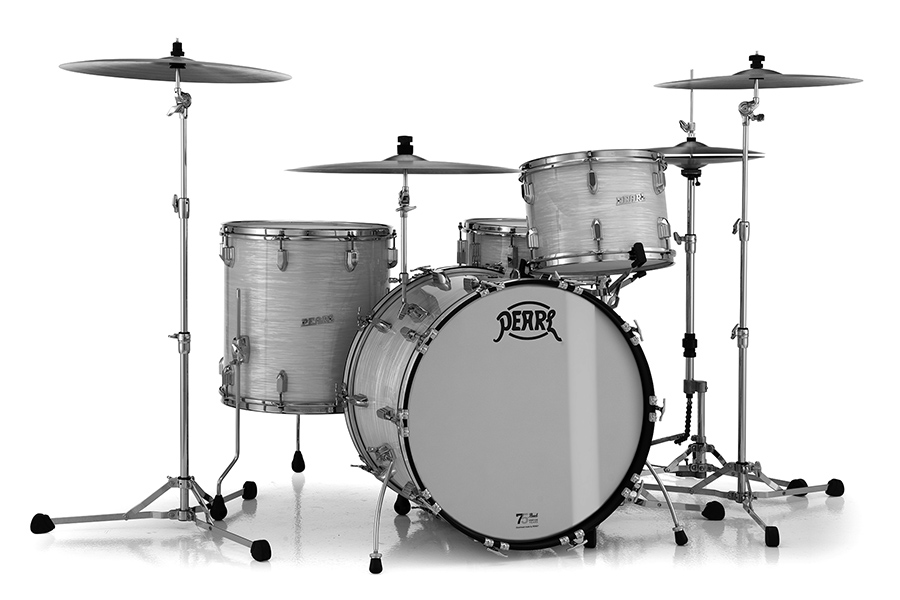
MT: Much is talked about reissue models of President Series developed in commemoration of 75th anniversary? (photo right: President Series Phenolic)
Iishi: Yes, we offer two types of shell using phenolic or lauan materials matched with state-of-the-art hardware for much improved tonal quality and durability. They will be appreciated by modern drummers. In fact, more than expected orders have poured in from drummers throughout the world.
MT: What do you think the core of Pearl is?
Iishi: It is to develop products that derives maximum inspiration and expression from individual musicians. We believe it is only possible with products built with highest precision technology. Pearl instruments meet the request of players with qualified technology and support them with proven sturdiness.
In addition, Pearl instruments allow players to select desired models matched to their needs. Purchaser can choose favorite materials from broad selections of the shell and parts, shapes of bearing edge for Masterworks line, the flagship model of Pearl drums.
MT: Peal flutes have also good reputation in the world markets?
Iishi: We started manufacturing flutes in 1968. The production expanded to Taiwan in 1973, but we still build hand-made models in Japan. Since we targeted worldwide distribution from the outset, we accelerated export of Pearl flutes in 1960s and launched two distributors, Pearl Corporation in U.S. and Pearl U.K. late 1970s. Pearl Music Europe (Holland) followed in 2002.
MT: COVID19 has totally changed our life, society and economy. What do you prospect for the years to come for Pearl?
Iishi: We have experienced and overcome multiple catastrophic incidents to this day, but this pandemic most affected our business in our history.
I took over full responsibility of the company at commemorative 75th anniversary and at the same time, in difficult time as our society, life and economic system dramatically change. Severe headwinds, but I thought we could adapt to the changes and develop strategic production and marketing for the future under ongoing new normal conditions. We set a new slogan, “Celebrating Our Past. Innovating Our Future” as Pearl group. It is we continue corporate efforts for our customers and partners. Realigning Pearl identity and brand value, we hope to keep contributing to players of all levels and countries with our instruments so that they can get inspired and explore their musicality.
While seeking essential possibilities of Pearl instruments, we think we can further enhance capabilities of percussion instruments of all genre. Customer needs change as our society is quickly changing. Pearl eMerge digital drum and Mallet Station are new generation of products developed under a new concept that can meet requirements of musicians today.
Our global distribution gives us increasing opportunities to expand our lines and services matched to indigenous music culture.
MT: We understand Pearl is respected for fine relationship with artists.
Iishi: On 75th anniversary a host of artists sent us warm messages. We appreciate them all and feel hamble that we have been supported by them to this day. Amid the pandemic, music performance and every type of gatherings were almost all cancelled, but that convinced us music is essential in our life and society. We hope artists coming back to their stage and please us with fantastic performance as early as possible.
MT: What do you think the challenges the industry has from a standpoint of manufacturer?
Iishi: EC market is growing globally. I think manufacturers and retailers can work together to get maximum advantage of it. We can support retailers providing effective measures to help customers visiting music stores enjoy exciting shopping experience and make appropriate purchase decisions. We need to provide end user with upgraded and well-coordinated information.
At the same time we, manufacturers have a mission to offer the market and music makers attractive and innovative products, value and services.
Aoyama Harp Moved Tokyo Sales Office & Showroom
Aoyama Harp Company moved Tokyo sales office and showroom from Sendagaya, Shibuya-ku, to Nibancho, Chiyodaku, and resumed operation on May 6.
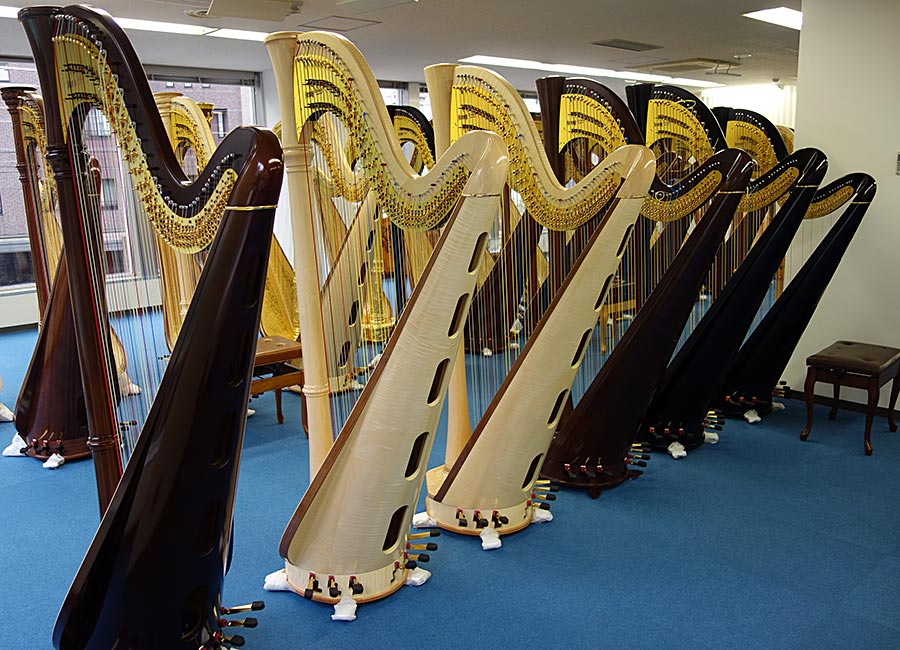
Japan’s exclusive harp specialist manufacturer based in Fukui-ken, Aoyama Harp has launched the 1st Tokyo sales office and showroom in Shibuya-ku to serve customers in Northern Japan area distributing harps, strings, harp-related accessories and printed music as well as an education center offering harp lesson studios and consumer events.
Shin Aoyama, president, says, “We had instrument exhibit area and harp lesson studios separately before, but the new location has allowed us to accommodate every business and service under one roof. Now customers stay here longer than before browsing printed music section and visiting lesson studios.”

Entering the showroom, visitors can see a gorgeous display of Aoyama grand, irish and saul harps partitioned with acrylic panels. In addition to regular models it shows special models in custom design and color finishes. Aoyama plans to add a stage for musical events and seminar space.
The printed music section has more than 6,000 related books and sheet music. The shelves are all hand-made by Aoyama himself and workers with lumber left unused in harp production processes.
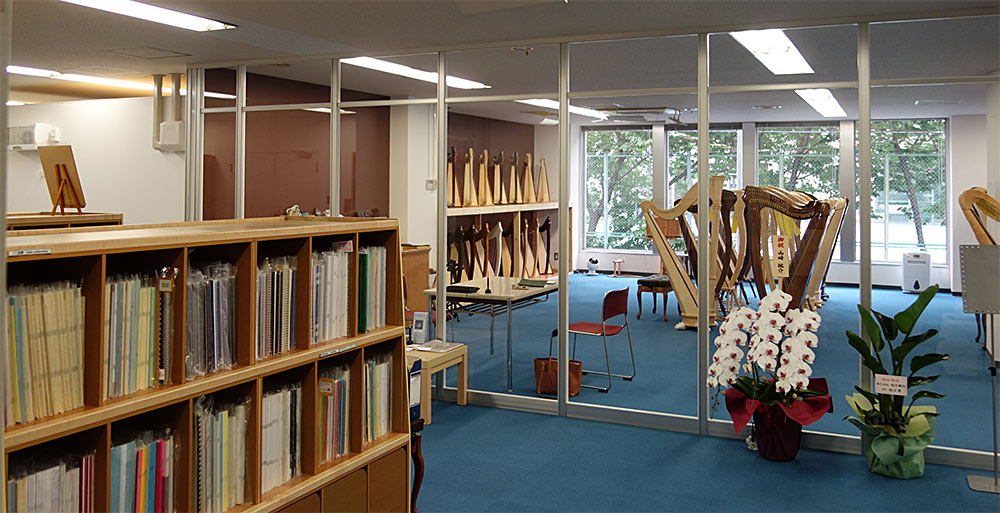
Four lesson studios are sound-controlled. The enrolled students are from kindergarten children to high school and university students, and adults including senior aged, many of them amateur musicians.
Aoyama concluded saying, “Before the pandemic, we had visitors not only from all over Japan but also countries throughout the world. It is a pity that almost all gone today. One positive side for us is there is a sizable domestic market and people have much interest in playing harp. I believe there are many ways to contribute harp culture, promote music making and tap the hidden market.”
Suzuki Melodion Celebrates 60th Birthday
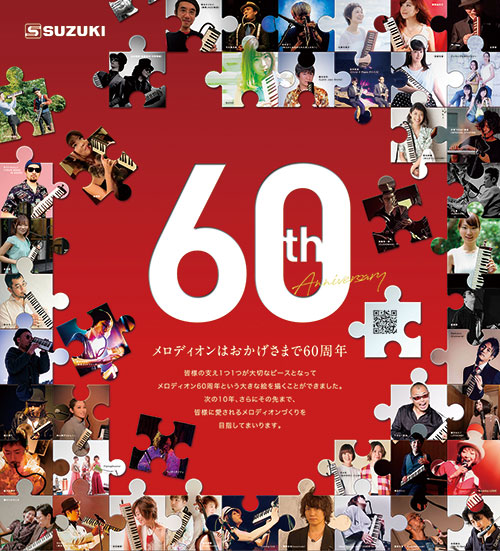
Suzuki Musical Instrument Manufacturing Co., Ltd. just announced Suzuki Melodion(melodica)turns 60.
Following the photo contest held last year as part of the 60th anniversary projects, the company opened a special online site recently and launched a new commemorative model on June 6.
Manji Suzuki, founder and late president of Suzuki first developed Melodion in 1961 seeking new business opportunities in the educational market. Six years later Japanese government regulated melodica as one of standard musical instruments to be used in school music programs. Suzuki Melodion stands for melody and accordion, and more than 80 models have been put into the market since then. To this day Suzuki has sold 27.3 million units distributed at 88 countries throughout the world.
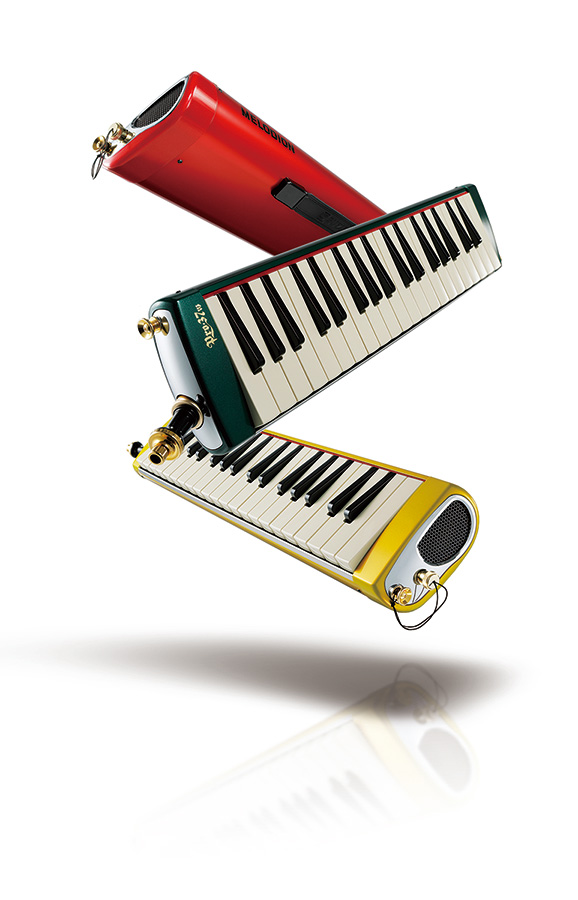
Melodica has explored outside the educational market today and widely used by professional musicians and band members. For further promotion of the instrument among wider walks of people in the society, Suzuki named February 1 as Melodion (and melodica) Day last year which was approved as an official day by Japan Anniversary Association.
The new special site offers visitors development history of Melodion, all models introduced to date, artist interviews and their performances. The 60th anniversary model designed after PRO-37 V3 professional instrument is available in special Shining Green, Shining Yellow and Shining Red chassis which define growth, innovation and passion.
Kazunaga Tada, manager of Sales Dept. says, “More than expected responses we have received from customers than we announced 50th anniversary model 10 years ago. That means the market for melodica crossed the border from school to outer world. We have never imagined this scale of growth. It is our great pleasure that the collaboration with the Melodion artists in development works of PRO-37 V3 enhanced our relationship.”
The company plans to increase online seminars, promotion of lesson programs and raise more adult players of Melodion while preparing to organize real live concerts after the pandemic is over.
Japan’s Music Products Market: Tips and the Prospects from An Expert
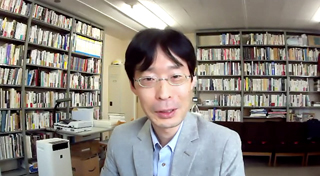
Japan Musical Instruments Association(JMIA) held the first webinar on April 12 inviting Tomoaki Tanaka, associate professor of Tokyo Keizai University (photo). It was part of the association’s new projects to be held regularly to upgrade services for the members. He completed 2019 Japanese Music Products Manufacturers Survey commissioned by JMIA last December.
In the opening remarks, Masato Oshiki, director of General Affairs of JMIA remarked, “We found last fall through questionnaire addressed to the members that they liked seminars helpful for their business, and innovative ideas to promote music making and market development. This webinar was held as the first program of the project serving their request.” A total of 100 industry leaders attended. The webinar will be archived and offered free view for JMIA members and for a fee for non-members.
The following is excerpts of Tomoaki Tanaka’s 80-minute webinar.
1. Japan’s Economic Index and Music Products Industry
Japanese GDP has grown consecutively since 2009 with the highest growth rate in 2000s specifically in the recent 8 years after 2013. Japan enjoyed excellent economy in the latter half of 2010s.
However, given that average annual growth rate remained below 2% level in the last 5 years, it is in a moderate downturn trend.
Economic prospect for coming years is unforeseeable partly because of COVID19, economists predict 3% growth in 2021. It is supposed to take several years to return to the level of 2019.
On the other hand, domestic demands and household expenditure has not been much influenced by economic fluctuation. During the peak period from 2013 to 2019, domestic demands and household expenditure kept same level of growth.
2. Size of Japan’s Music Products Market
According to public and private survey data, music products market is shrinking in a long run in Japan with minimum increase or flat sales during the last couple of years.
Backed by ‘Stay Home’ demands for items of limited categories, music products sales in 2021 are expected to be not much affected, just a minimum decline.
2017 Leisure Report shows population of music makers (Western style music) was 14.4 million in 2009. In 2016 it went down to 7 million.
It is estimated that the size of Japan’s music products market was 240 billion Yen in 2016. (source: Commerce Survey by The Ministry of Economy, Trade and Industry). It presumably went down to 200 billion Yen in 2020.
After 1972, music products sales including CDs and software increased during 1990s with total sales of nearly 800 billion Yen annually from 1997 to 1999, the highest level in the history.
3. Comparison with other industries
Music products market is smaller in size than sports, automobile, consumer electronics, casual clothing, drug store and travel industries, but the 3rd largest in growth rate in 2019.
Sports market with 1.5 trillion Yen annual sales is well comparable with the music products industry. It employs the same type of sales marketing featuring popular athletes in advertisement and has huge school market as well. Their marketing strategies may also work for the music products industry.
Some manufacturers in the music products industry are increasingly shifting from selling goods to providing consumer with fun experience these days. Sharing the same marketing philosophy, the industry competes directly with travel industry which gains 7.2 trillon Yen sales annually. Some people would argue that the two industries are ultimately different, nonsense to compare. Just think, households must always make decisions how much and for what they spend their money. It is wrong to assume that music products and the services the industry offer are immune to products and services provided by outside industries.
4. Tips for the industry
Despite declining birth rate, after school evening group classes are flourishing. People like to spend more money on practical and useful goods and services. Declining birth rate does not necessarily mean diminishing demands for musical instrument and music making.
Though people do not spend much money for music lesson than they used to be, tuition for music lesson is regarded worthful second only to sports-related lesson. It suggests music retailers can raise tuition for music lesson to get extra money, but they must make sure that they are offering students value-added services.
A survey shows that senior population from 65 years old to 75 years old who chose mobile payment increased 50% in 2020 than a year before. Over 90% of male population of this age group have Internet access and they favor brand-new gadgets. Also, women population of this age group prefer outings. They tend to behave and think like young people in their 20s, not much appreciate music making and received wisdom such as it helps keep healthy brain and physical functions. In terms of market development, music products industry has two prospective target groups, those young and young at heart.
Music products industry has a sizable 400 billion Yen market excluding related software, more than two times of the current level. Newly hired employees at your office may turn your concept of marketing and boost the industry business with unprecedented ideas and strategies unrestricted by the industry’s stereotype practice.
Yamaha Redesigns Flagship Store in Ginza, Tokyo
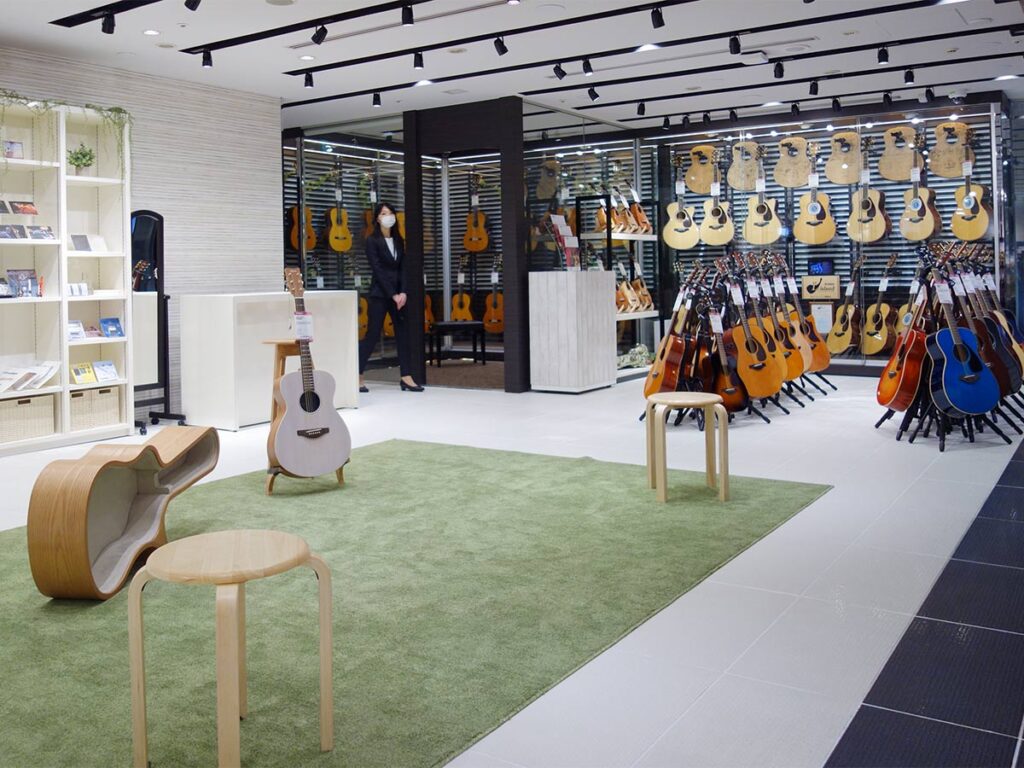
Yamaha and Yamaha Music Japan completed redesigning of Yamaha Ginza flagship store and opened as a brand shop with a new concept offering visitors fun shopping and musical experiences on April 17. In conjunction, Yamaha Music Nagoya Store, the key location in Central Japan also finished redesigning project.
Music products are no exception these days sold like commodities as e-commerce increasingly prevails. New Yamaha Ginza Store is designed to be the latest information center of Yamaha brand. It is open to everyone even if when he or she doesn’t intend to buy any musical instruments and accessories or the need of repair services, but just seeks exciting musical experience.
Yamaha reopened the 1st and 2nd floors after renovation last October, and every redesigning of the first and second basement and 3rd, 4th and 5th floors completed this past April.
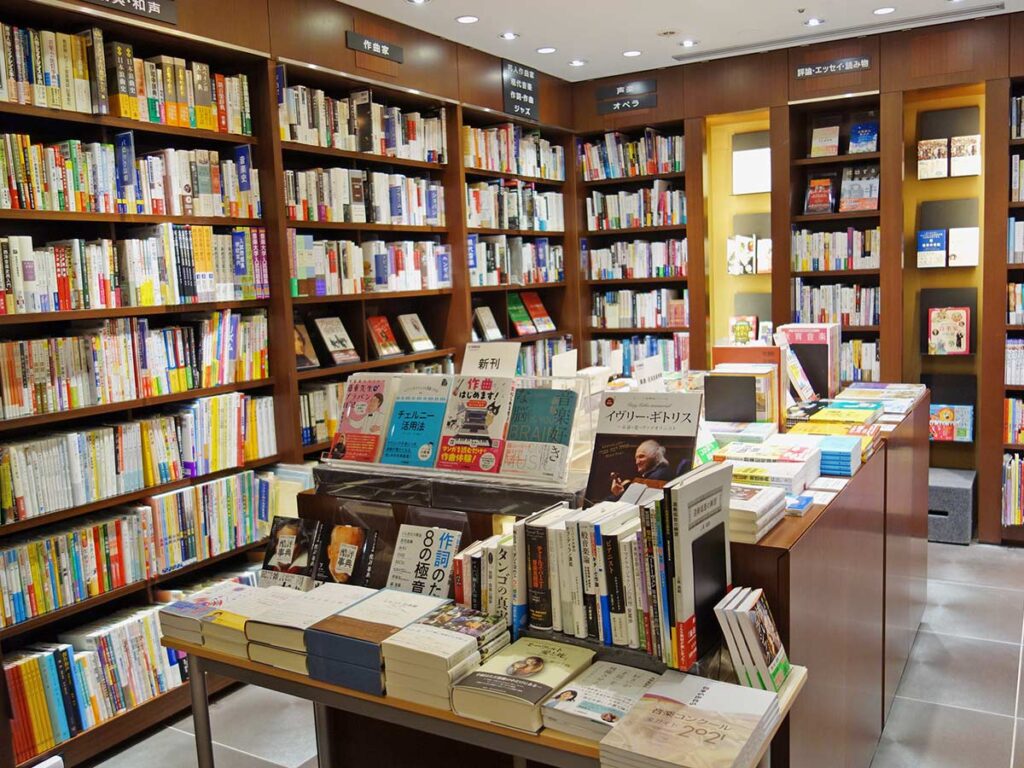
The 200-seat studio at the second basement floor has cutting edge sound system combining Yamaha’s exclusive AFC (Active Field Control) system and image control technology. Wonder Filming allows visitors to experience dynamic spacious sound coupled with visual image in a setting of virtual movie shooting.
The first basement floor accommodates LM products including guitars, drums and synthesizers in a comfortable setting as well as a drum selection studio set in Avitecs sound control room, an open space for events and a music production studio equipped with full music production system and software.
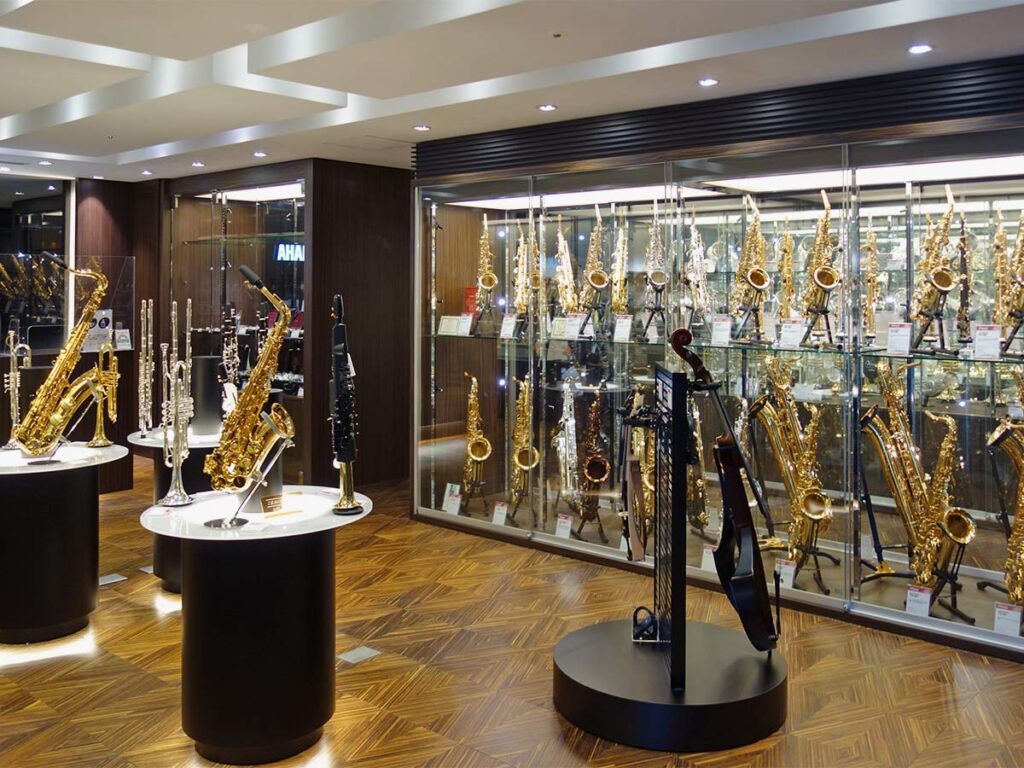
The 3rd floor is allocated for over 65,000 titles of printed music, music books and CDs. The 4th floor displays wind, string and percussion instruments including good number of them showed ready to try for the visitors. More than 50 models of Yamaha pianos, digital pianos and Electones, the largest class selection of Yamaha home keyboards in Japan are displayed on the 5th floor.
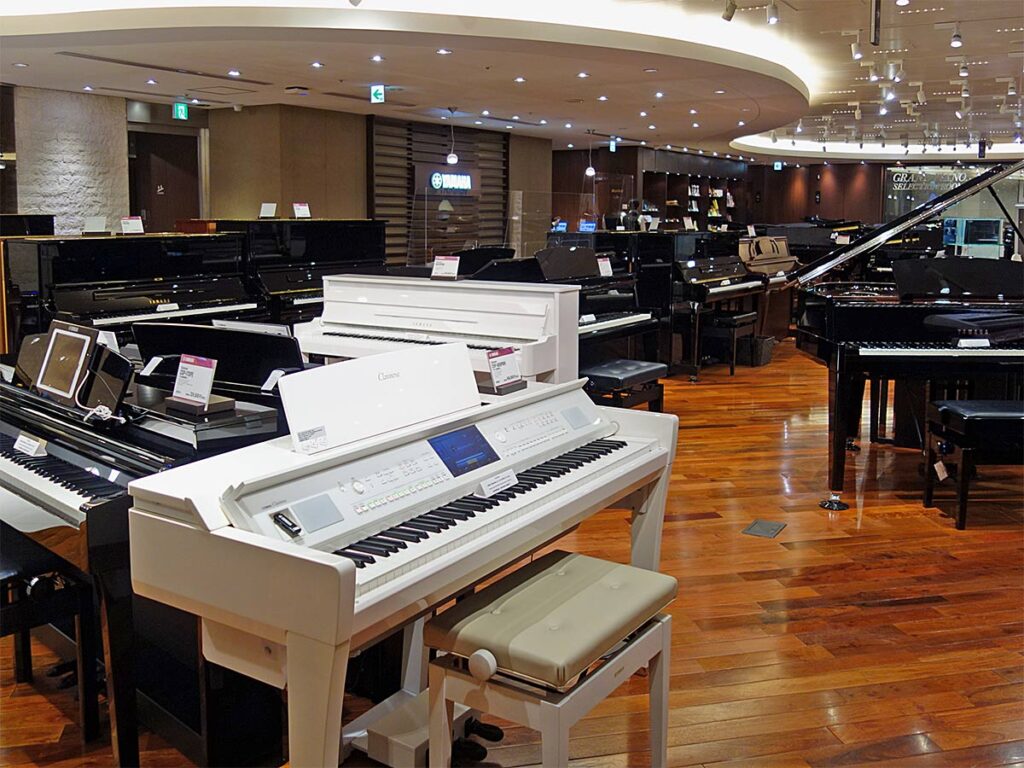
Mamoru Fukuzawa, manager of Ginza store says, “We are very pleased that the Yamaha Ginza Store was reborn as a friendly and comfortable communication spot more than ever for music makers and music enthusiasts. Customer can enjoy experiencing the latest Yamaha music products by visiting us or browsing virtually through our website. The in-store musical event programs are greatly enhanced with virtual live concerts, remote performances by Disklavier and live streaming.”
Obituary Masakatsu Yanagisawa (1963-2021)
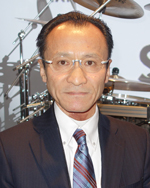
Masakatsu Yanagisawa, chairman, CEO of Pearl Musical Instruments Co., Ltd. passed away on March 29 at the age of 58.
As the 4th generation of Yanagisawa family, he headed the company founded by Katsumi Yanagisawa in 1952 until recently. He dedicated providing musicians with top quality Pearl percussion instruments and flutes. During his tenure, he much contributed to expand the domestic and international markets.
Pearl also distributes imported products including Sabian cymbals and gongs, Remo drum heads, Adams percussion instruments, Vic Firth sticks and mallets.
Pearl Celebrates 75 Years Anniversary Online
Pearl carried a special event on April 2 on Pearl YouTube channel in celebration of its 75th anniversary. The company announced new anniversary models and presented artists talk sessions, concerts featuring renowned drummers including Hiro Tsunoda, Maya from LUNA SEA, Natsume from Shazna and Raise A Suilen, and marching drills by Oarai Highschool Blue Hawks marching band. The visitors also enjoyed virtual flute factory tour of Pearl as well as flute concerts.
2020 Japanese Musical Instruments Export and Import
Japan exported a total of 60.3 billion yen worth of musical instruments, parts and accessories in 2020, a 15% decrease over the previous year. But almost all categories went down compared to the year before. While upright & grand piano exports which share the largest value of the total export declined 10%, brass instruments and other wind instruments significantly declined by roughly 30% and 20%, respectively.
5 top categories of upright & grand pianos, reed instruments & other wind instruments, piano parts & accessories, and brass instruments shared 78% of the total exports in 2020, and they all underperformed. Upright piano exports were 20,365 million yen, a 12.4% decline from the previous year, and grand piano exports were 12,002 million yen, a 12.7% decline. Digital piano exports jumped up 234% in unit and 142% in value, largely attributed to soared demands during lockdown worldwide. Reed instruments and other wind instruments also declined about 25.6%.
Electric guitar exports maintained upward trend with 46,000 units, a 16% increase and 3.1 billion yen, a 6% increase over the last year. Since this category includes used guitars, the sizable increase of this category may reflect increased shipment of them through cross-border e-commerce.
Export of the top 5 categories (2020 and 2019)
1.Upright pianos 20.37 (22.87)
2.Grand pianos 12.00 (13.52)
3.Reed instruments and other wind instruments 7.70 (9.67)
4.Piano parts and accessories 3.57 (4.77)
5.Brass instruments 3.36 (5.04)
( in billion yen)
Import trades also went down in many categories from 57.02 billion yen the year before to 47.9 billion yen, or 16% decline, but guitars and other string instruments imports rose 7% to 4.5 billion yen, and 18% to 1.1 billion yen, respectively. Though slightly decreased in value, import of electronic musical instruments with keyboard increased 17% to 770,000 units.
The top 10 import categories share 82% of the total imports.
Import of the top 10 categories (2020 and 2019)
1. Electronic musical instruments with keyboard 10.28 (11.25)
2. Electric guitars 5.97 (6.74)
3. Acoustic guitars 4.49 (4.19)
4. Parts and accessories of other musical instruments 4.42 (5.92)
5. Other wind instruments 3.65 (5.11)
6. Parts and accessories of electric and electronic musical instruments 2.88 (2.89)
7. Piano parts and accessories 2.70 (2.99)
8. Musical instrument strings 1.79 (2.16)
9. Other electronic musical instruments 1.70 (1.31)
10. Brass instruments 1.53 (2.21)
(in billion yen)
As U.K. left EU at the end of January, 2020, the January import and export data of the country are included in EU data.
(Source: Customs Bureau, The Ministry of Finance)
2019 JMIA Music Products Retail Sales Survey
Japan Musical Instruments Association has recently completed retail sales of music products from April 1, 2019 through March 31, 2020. JMIA sent out a questionnaire to 344 music retailer members throughout Japan, and 114 retailers responded. Total sales of 114 music retailers in 2019 were 78,418,653 yen.
Please take note that the 2019 retail sales data can not be simply compared with the data of the last couple of years because the retailers joined in the survey differ from year to year. JMIA had commissioned the survey to Japan Economic Research Institute in the past. For the 2019 survey, Tomoaki Tanaka, associate professor of Tokyo Keizai University undertook the task.
The 2019 data excludes product categories including PA systems, microphones, signal processors and recording equipment. And categories of other keyboard instruments and other musical instruments are listed as ‘cembali and harpsichords’ and ‘musical instruments with reeds and others’, respectively.
Pianos (including acoustic and digital pianos, automatic player pianos and used pianos)
A TV program “Station (Airport) Piano” apparently helped boost sales of the category. It featured an upright piano placed in a certain railway station or airport waiting area offered passers by for free use. In 2019 various media spotlighted the program, and it made a topic. 2 Years earlier in 2017 fall, Yamaha began a campaign, “LovePiano” in Japan. Obviously, the Station (Airport) Piano program inspired experienced pianists to play piano again, and students to continue their study, creating synergy effect to the sales of Yamaha pianos.
Grand pianos sold well. It is attributed some parts to the marketing strategies of piano dealers who have actively carried in-store consumer experience events recent years. Those prime models including Yamaha C3X, C1X, Kawai SK-3 and SK-2 achieved good sales during the year. While, consumer demands for used pianos remained strong.
Sales of digital pianos grew thanks to new models at reasonable price range put into the market during the year. Used digital pianos adaptive to online sales also sold well.
Organs and portable keyboards (including electronic organs and school model organs)
2019 was 60th anniversary for Electone. Yamaha celebrated the mile stone with massive events for organists and general music fans. Yamaha’s top line STAGEA continues to attract interest of players with upgrade capabilities providing replaceable and additional units. Demands were also high for used models.
Sales of keyboards with standard-size keys were much favored as casual and enjoyable instruments for senior players. Rich teaching aids and other helpful functions of portable keyboards at affordable price seemingly fulfilled their desire for making music.
Wind and stringed instruments (including brass, woodwind and violin-family instruments)
Retail price of wind instruments went up in general last year. While consumer taste remained high for expensive advanced models, demands for entry-level instruments were also brisk, which explains the market is polarized to two opposite ends.
Flutes and saxophones continued to grow largely by expanding demands from adult music makers. The healthy market is attributed to concerted market development and music promotional activities by music retailers providing regular free instrument inspection, consultation services, invitation to free instrument experimentation, clinics and mini concerts.
Understanding necessity of keeping instruments in good condition, music retailers are serving customers with professional level technical services which connect retailers and customers and generate confidence. Replacement needs of parts and accessories also contributed to increase sales.
Excellent sales of packaged string instrument for first time players contributed to healthy growth of string instruments category. Hit TV program “You and Me on the G String” helped increase string players. Further growth of wind and string instruments market much relies on how the industry can raise adult music makers.
Guitars (including acoustic and electric guitars, ukuleles, amps and effect processors)
Total sales of this category decreased nearly 10% in value and unit, but average unit price slightly increased.
Acoustic guitar sales rose 26% in unit, and 28% in value. On the contrary, those of electric guitars and basses which represent 45% of the category went down about 20% both in unit and value over the previous year. Given that average unit price rose and strong demands continued for standard and high-end models, sales of entry level models might have lacked luster.
The same went with used guitars. Acoustic guitars marked outstanding sales. It’s expected net sales of used guitars by individuals and cross-border trades will further accelerate.
Sales of guitar and bass amps ended in a peculiar result with significant increase in unit, and inconsiderable decrease in value. Declining trend continued for effect processors, tuners, guitar and bass strings which reflects consumer’s increasing choice of buying on the net.
As explained at the beginning, year-to-year comparison of this data is not logical, but sales of ukuleles dropped in unit and value, a reverse trend from the years back.
Percussions (including drumkits, marching drums, educational percussions, xylophones, glockenspiels, digital drums, cajons, sticks and hardware)
Total sales of percussion went down 50% in unit and 62% in value in 2019. However, drumkits sales in unit jumped up. Given that sales of drumkits as well as snare, tom and other single unit drums have been in down trend for years, the background of this sudden surge of drumkits is hard to explain.
Sales of digital drums which share 39% of the category went down both in unit and value.
Among the items reported slow sales, sticks and mallets kept relatively good performance. Educational percussion notably declined largely affected by internet sales.
Japanese traditional instruments (including shamisens, kotos and Japanese taiko drums)
Demands grew reflecting growing popularity for Japanese traditional instruments band and young artists using the instruments of this category. These instruments share only 0.1% of the total percussion, and nearly half of the sales come from shinobues and shakuhachis at reasonable price. It suggests there exist a small number of entry level users.
Digital musical instruments (including keyboard and wind synthesizers)
This category dramatically advanced with 183% increase in unit and 37% increase in value. Given that unit price of wind synthesizers notably dropped, and the skeptic growth of the total category, it is conceived that not all segments of the category achieved excellent performance in the year. Upward trend continued for music production-related device and tools.
Sales of keyboard synthesizers went down in unit and value. The market trend was felt in both ends i.e, entry level and high-end products.
Other musical instruments (including harmonicas, melodicas, accordions, recorders, ocarinas, etc.)
This category is listed as instruments with reeds and others in the 2019 survey. Sales of harmonicas, melodicas, accordions, recorders and ocarinas slightly went up supported by demands of adult players. Educational harmonicas, melodicas, accordions and recorders have been in downturn trend for years as the number of school-age children is declining.
Printed music
Total sales decreased 5% in unit, and 24% in value over the previous year. Average unit price declined to 1,600 yen from 2,100 yen a year ago. Such hit tunes including “Lemon”, “Marigold” and “Paprika” were released last year, and consumer purchased those tunes largely in type of single sheet music rather than songbooks. That may have caused decline of average unit price.
Self-teach books for piano, guitar and ukulele are likely bought by senior music makers at brick and mortal music stores, but not online.
2019 Music products Retail Sales Survey – data of 114 music retailers (in thousand yen)
1 Pianos 24,622,144
2 Guitars 23,427,678
3 Wind instruments 12,315,090
4 Printed music 5,911,705
5 String instruments 3,150,725
6 Percussions 2,312,429
7 Organs 1,635,257
8 Digital musical instruments 1,613,896
9 Musical instruments with reeds and others 1,583,338
10 Ukuleles 1,057,858
11 Portable keyboards 723,905
12 Japanese traditional musical instruments 58,930
13 Cembali and harpsichords 5,698
2020 Japanese Music Products Retail Market Survey
We much struggled with the pandemic in 2020. Covid-19 devastated almost all industries throughout the world. The music products industry was not an exception though some categories enjoyed unexpected sales growth brought by stay-at-home demands. School music education, extra-calicular band activities, music lessons and entertainment businesses all severely suffered. A terrible year it really was.
While customers came up to local music stores during the lockdown, business shift to EC accelerated. Also, marketing activities went online. Many social and economic changes occurred.
Japan Music Trades carried an annual retail music market survey, sending a questionnaire to 149 music retailers nationwide. 118 of them responded. We appreciate very much time and efforts they spent to meet our request during the unprecedented difficulties.
The 2020 music retail business was quite a somber one as 80% of the retailers reported sales decline. Given the social and economic obstacles, it is astounding that they are endeavoring to find the ways to increase communication online with customers, upgrading websites and seeking innovations in every aspect of business.
More than 80% report Sales decline
Among 113 retailers responded, 12% reported sales increase, 83% decrease and 5% no change. About the sales during the busiest year end/ new year season, 27% answered increase, 61% decrease and 12% no change.
Japanese music products industry was hard hit by COVID-19 after February, particularly after the Government declared a state of emergency in April, which new term starts in Japan. Music retailers were forced to temporarily close stores and music lesson studios. Stay-at-home demands pushed up sales of some types of musical instruments, but not enough to offset overall stagnant business.
Corona virus case began to increase again in larger cities in the latter half of November, which was followed by self-isolation from December through January, and the second declaration of a state of emergency.
Looking into sales by product category, only digital pianos, acoustic guitars, ukuleles and electronic keyboards increased, largely by the surged demands during work from home.
On the contrary, sales of grand and upright pianos, electronic organs, woodwind and brass instruments, violins and family instruments, drums, accessories and printed music decreased. Music lesson studio operations were also stagnant.
Sales of those categories as electric guitars, amps, effect processors, digital drums, other percussion instruments, keyboard synthesizers, digital equipment, DTM/DAW equipment, recording & PA system remained flat.
Which online marketplace and service do the retailers use?
1. Own website 75 retailers
2. Facebook 59 retailers
3. Twitter 50 retailers
4. Instagram 44 retailers
5. DigiMart 31 retailers
6. LINE 30 retailers
7. YouTube 30 retailers
8. Amazon 23 retailers
9. Rakuten 22 retailers
10. J-guitar.com 15 retailers
2021 business prospects
60% of the responded dealers replied business would be soft in 2021. Only 10% of them were positive about the business of this year. It is obvious that the business climate solely depends on development of workable medicines and the effectiveness of COVID-19 vaccines. During the pandemic, people rediscovered pleasure of music making. Once the society regains stability and confidence in life, hopefully their interest in music will last.
Not a few retailers commented that the industry can expect increasing opportunities to vitalize the market by collaboration with entities outside the industry, effective use of social media as well as offering music makers opportunities and stages to perform.
Obituary Seiichi Utsunomiya
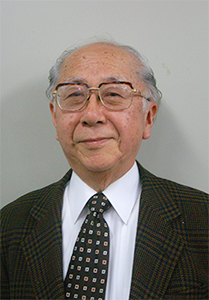
Seiichi Utsunomiya, former president of Japan Piano Technicians Association (JPTA) passed away on January 8 at the age of 94.
Utsunomiya contributed to set up JPTA, and served the chairman of the organization for 5 years from 1982. He also served as chairman of International Association of Piano Builders and Technicians (IAPBT) from 1987 to 1990.
In recognition of decades of dedication to the society of piano technicians, Utsunomiya received Medal with Blue Ribbon in 1992.
His book titled ‘A Guide for Selection and Maintenance of Home Piano’ describing details of piano from its history to tonal characteristics well advocates the need of maintenance and expresses his passion for piano.
Roland Relists Shares At Tokyo Stock Exchange -An Interview with Jyunichi Miki, president-
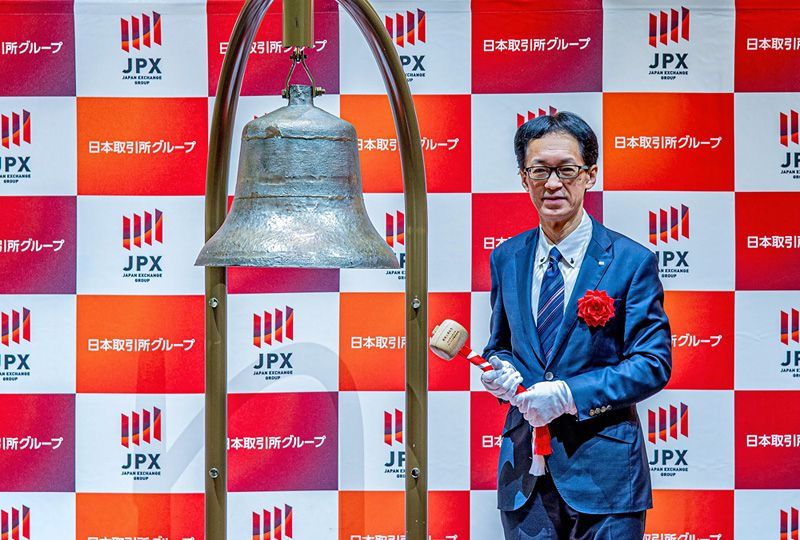
Roland Corporation relisted shares at 1st section of Tokyo Stock Exchange on December 16. Jyunichi Miki, president of Roland talked about the story of relisting and the goals of Roland in the coming years and future.
Back in 2008 Roland had struggled with slowdown of business after the financial crisis. As part of efforts to enhance organizational effectiveness, the company chose to operate as a private entity in MBO partnered with Taiyo Pacific Partners in 2014.
Since then, under the leadership of the new management team, Roland has pursued organizational restructuring and investment plans for growth, and escaped from the difficulties. In 2019, the company achieved a record 63.2 billion yen annual sales. The ground for relisting was set.
Launching Roland Cloud subscription business of sound generators and software streaming in 2020, Roland has accelerated the business as total solution provider offering customer from entry level musician to professional pleasure of music making. Here Miki talks about Roland’s next growth plan.
Will you please start telling the story in 2014 when Roland delisted shares?, How did it happen?
Miki: We had a very difficult time after the financial crisis in 2008. Strong yen and stagnant sales of high-ticket items much affected our business which resulted in 4 consecutive terms of loss in 2009. After I assumed the CEO position in 2013, we took a bold step to streamline operation under the new management team. We had to restructure our business, and at the same time desperately needed effective growth plans for the future. MBO plan in 2014 came as a natural course. I happened to have an opportunity to talk with a young owner of a venture company during the 2014 NAMM Show. His company rapidly grew. He led a very young vibrant management team, and it reminded me of the early times of Roland. He took completely different approach in product distribution and philosophy on product design from Roland. He moved quickly. I got inspired from him.
We had a good relationship with the U.S. investment fund, Taiyo Pacific Partners for over 10 years. Fortunately, we shared the goals to establish a strong base in Japanese stock market and enhance corporate value.
Along with streamlining operations, faster cooperative decision making and intensified investment for future growth, we announced a corporate plan that we would return to the normal track of success in 2 years.
Based on the new operational plans, we integrated 8 distribution units in Europe to one single holding company. Also, we settled distribution problems in U.S., China and Japan.
The restructuring plan included closure of the manufacturing base in Italy, sell-out of U.S. factory, and consolidation of 3 factories in Japan which was already in progress before the delisting. In 2015 we successfully opened a factory in Malaysia as a key manufacturing base. In addition, we sold inefficient Rodgers Organ and Cakewalk businesses, and realigned domestic music teaching operations. The delisting solved parent company and subsidiary relationship of Roland and Roland D.G.
During the period we concentrated on strengthening value of our product lines, and acquired V-MODA, a headphone brand. All these efforts paid and the business quickly rebounded by 2016 with 10% operating profit, one year earlier than the initial plan. 2019 was a great year for us having achieved historical 63.2 billion yen sales.
The relisting came right in the pandemic period. Is there specific reason that you selected this difficult time for the relisting?
Miki: Well, we experienced a host of unprecedented incidents during the lockdown. The distribution network collapsed, Malaysia factory closed for 2 months, and the sales declined. It was a great relief that demands grew for easy-to-play musical instruments, and shift to Ecommerce accelerated especially for manufacturers of electronic musical instruments. The factory in Malaysia resumed full-scale operation in June, and piled up back orders were properly resolved. The sales regained the previous level in the 3rd quarter. As our efforts for restructuring and investment concluded and governance system revised, we decided to get back to the public entity now.
What do you plan in the coming months?
Miki: With a financial support from a broad type of investors, I expect we can further strengthen value of capital efficiency, investment effectiveness and seek investment for future growth. Relisting will bring us increased confidence, opportunities of establishing new business alliance for Roland Cloud Service, development of platform and software as well as plans for strategic M&A. We were lucky to have rebuilt our business teaming and sharing mutual objectives with Taiyo Fund. Hereafter, I expect Roland management team takes full responsibility for the second stage. Also, coming back to TSE will help us connect with qualified human resources including engineers for future product and software development.
Which business segment do you explore next?
Miki: Cloud business is critical for growth of Roland. We have put a series of products including ZEN-core Synthesis System into the market since 2019. They are designed with BMC sound generators as a core to be explored to a universal platform. We have consolidated every content and sound generator Roland developed in the past to work on one single platform. The synth, dance, DJ sound generators, elements of digital pianos, drums, Aerophone and analog synths will be reflected in future product development and save manufacturing cost.
Zen-Core sound generators allow user to deliver sound produced on JUPITER-X with RD-88 stage piano or Aerophone. You can also enjoy music produced by your friend on your synthesizer, or play along music produced by favorite professional. The core sound generator platform provides us with unrestricted approach to various genre of hardware. Our goal is to offer music makers a multi-facet musical environment supported by rich contents, applications and services.
Roland has explored the market with excellent digital musical instruments and hardware to this day. While keeping the course, we are now contemplating to integrate music activities from music video production, share of performance data to online music lesson and user community on smartphone.
You mean a shift from “things” to “experiences”?
Miki: People have got almost everything they want today. Synth player has a workstation, controler and peripherals. They are not much impressed by minor upgrade of tonal quality or playability. They need a definite reason to purchase new instrument, i.e., extremely compact design, dream features and the like that give them satisfaction and greater progress in performance. We at Roland call it “User Benefit.” Unless we can offer solution, they will never buy new gears. We believe only solution provider can meet needs of customer and win their satisfaction.
Roland Cloud is the answer?
Miki: Roland Cloud started providing high-quality plug-in sound generators and software. Today we have a growing number of members with professionals and high-end amateurs as the core base. We expect paid members will reach 100,000 by the end of 2021. We think such fun-oriented services for entry-level players as ZENOLOGY and Zenbeats help boost our business.
Since the onset of COVID-19, all of us have been deeply affected, and social activities were completely shuttered. But just think, even before the pandemic, we already had more time for leisure activities and online shared larger part of our life. The pandemic accelerated the trend. Spend longer time at home, we seek things that are creative, enjoyable and relaxing more than ever. Roland is well prepared to serve the needs.
On the other hand, we are much suffered from long-lasting isolated life. It’s natural that we appreciate live events and concerts of their magical power evoking excitement, passion and pleasure in our mind. Real experience inspires our spirit. We devote ourselves to better serve music makers and bring joy to music enthusiasts with digital musical instruments.
Obituary Mototsugu Shimamura (1933 – 2020)
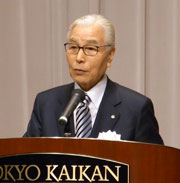
Founder and chairman/CEO of Shimamura Music, Mototsugu Shimamura passed away on Dec. 26. He was 87 years old.
Founded in 1962 by Mototsugu Shimamura, Shimamura Music has grown to one of the leading music retailers in the world market with total sales of 38.6 billion yen today with 175 music stores and music teaching studios throughout Japan and 5 locations in China.
Shimamura Music remained as one of local music chains in limited areas of Tokyo and Chiba Pref. until ‘90s, but it rapidly grew to the hottest music retail chain opening retail outlets and music teaching studios one after another at large shopping malls then emerged in suburban areas.
Shimamura said at the company’s 50 years anniversary reception held in 2012, “It’s our mission to offer people joy of music making, and increase music makers as many as possible. We will build real value in our business and win confidence of our customers. Also it’s my hope that all staff at Shimamura music grow themselves through the work and pursue self-fulfillment.”
He much loved jazz and classical music.
Yamaha Launches New Digital Saxophone

Yamaha started distribution of YDS-150 digital saxophone developed to provide first time and entry level players with pleasure of music making on November 20. Prior to the distribution it was presented on the online press conference.
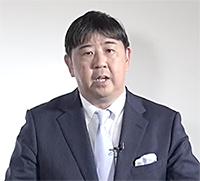
Atsuki Goto, manager of Wind/String/Percussion Instruments Sales Division of Yamaha Music Japan commented, “Saxophone is said to have tonal character close to human voice with unlimited tonal colors and expression capability. YDS-150, a fusion of acoustic and digital technologies, provides entry-level musician fun of playing saxophone in unrestricted environment anytime in any style.” (photo right)
YDS-150 offers 15-level tonal volume control capability. Player can enjoy the sound of saxophone through headphone or earphone at night without disturbing family members. It comes with the same key layout including the side key as acoustic counterpart.
Outfitted with an exclusive mouthpiece designed for alto model, it provides natural and easy play feel free from delicate expression by embouchure. It comes complete with a yellow brass bell, a speaker unit, body and an acoustic tube which delivers sound like acoustic saxophone as the body resonates allowing player communication with his instrument.
Yamaha has developed new sound generators for YDS-150 by sampling sounds of professional saxophonist to provide 73 voices including 56 soprano, alto, tenor and baritone voices. The breath censor controls tonal volume and the output tube generates authentic resistance in play.
Optional YDS Controller app allows player to customize favorite tonal voice, fingering, resistance level, tuning and other settings on own smart device.
Yucco Miller, saxophonist and demonstrator said,“I like sound control capability and easy play feature of YDS-150. As a digital instrument, it provides stable intervals, and you can enjoy sound of any models from soprano to baritone. It may be fun playing in ensemble.”
Korg Opens Experience Lounge
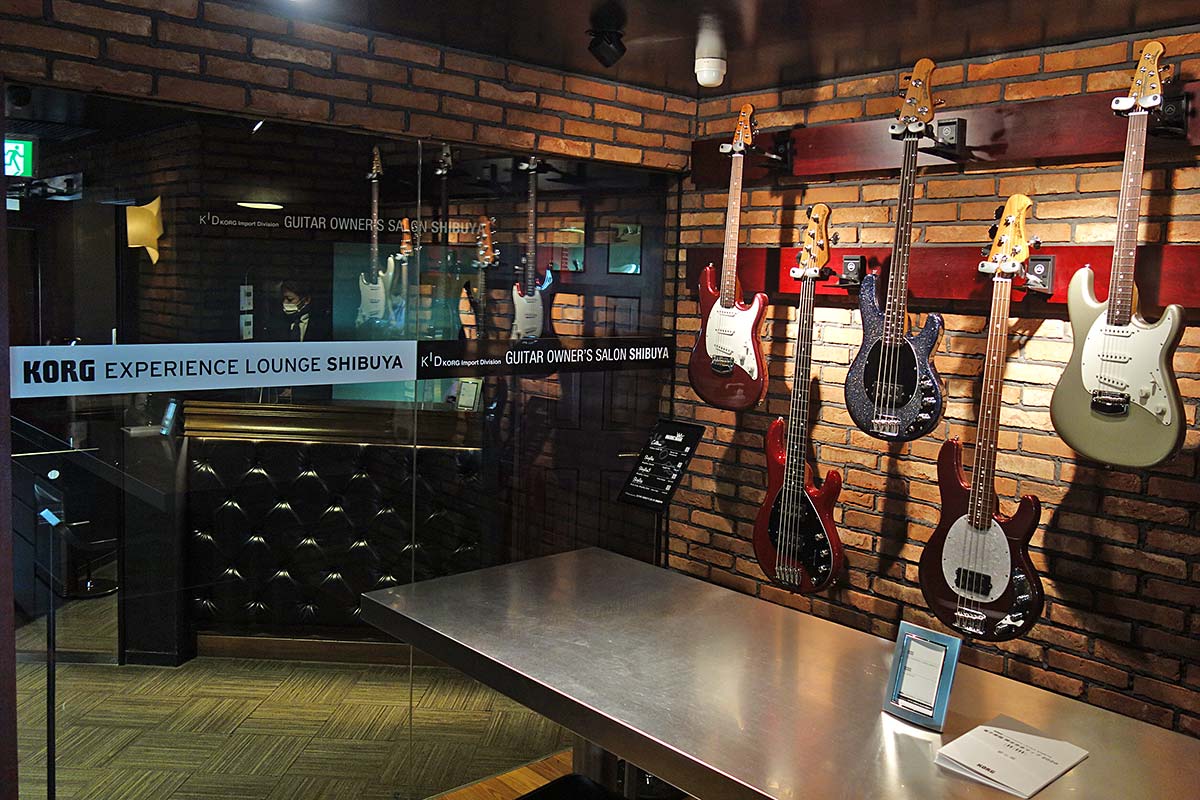
Korg Experience Lounge Shibuya showroom invites visitors to experience all types of Korg digital instruments including latest models.
Launched on November 14 at Sakuragaoka, Shibuya-ku, it also has Guitar Owner’s Salon Shibuya outfitted with two separate rooms for sound check in the same premise where Vox and Musicman electric guitars and basses as well as Blackstar, Kemper, Aguillar and other amps and effects are showcased.
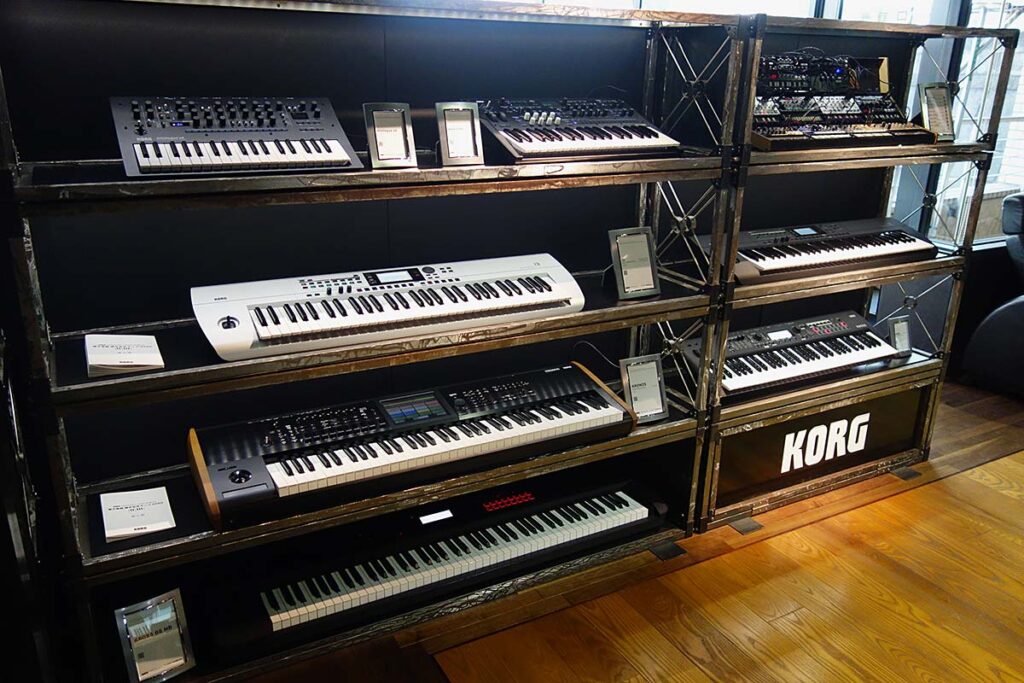
Takasumi Tanaka of Sales Planning CDM Dept. says, “We expect the showroom promotes business relationship with music stores in the area. Customer can try our instruments at the showroom and go to nearby music stores for purchase. Or he can try instruments that music stores do not have.
“We have also redesigned the showroom for Korg digital pianos and other home keyboards located in the headquarters in Inagi, Tokyo to Korg Piano Experience Lounge. So, we now have two showroom facilities for improved convenience for customer.”
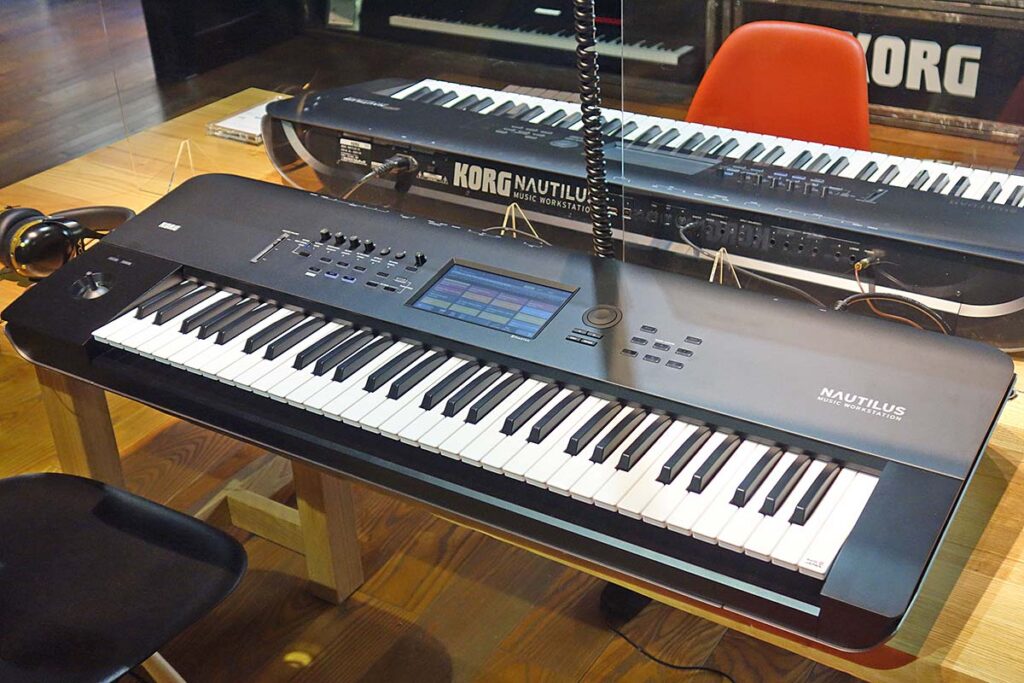
Korg regularly replaces gears at the showrooms and organizes music events intensively on weekends to increase customer traffic. On the opening day, it held Live Extreme 4K+DSD Experience session which was followed by a seminar on new NAUTILUS workstation the next day. (photo bottom right: NAUTILUS new workstation)

Says Hiroomi Hayakawa, Korg Service Division, “You can bring in your own instruments to examine connection capability, and compare sound of your instruments and the Korg gears at the showrooms. We are open until 9:00 in the evening so that businessmen can visit after work.”
(photo left: Masahiko Mitsutake, right and Tsuyoshi Okamura. They were involved in developing NAUTILUS and opsix altered FM synthesizer, individually.)
Shinshu(Nagano)Guitar Festival
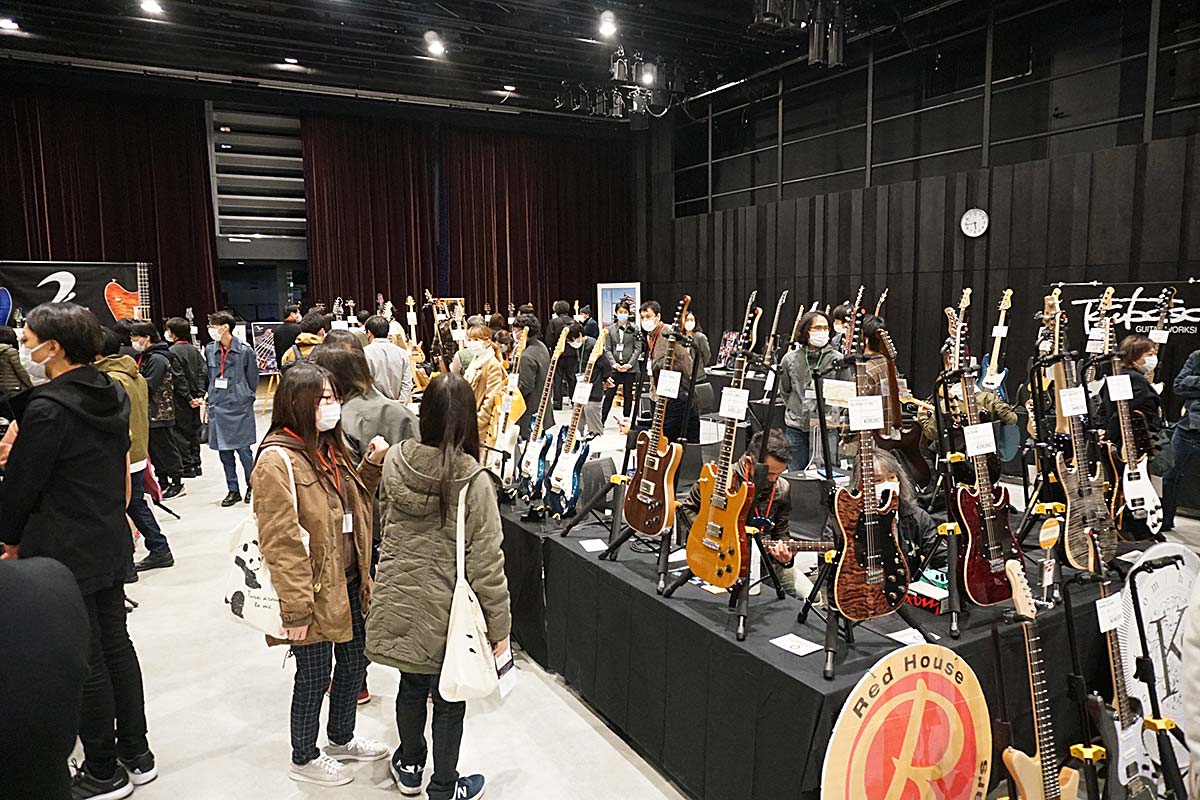
More than 48% of guitars produced in Japan come from Nagano. For more than half century the guitars born in Nagano have been highly appreciated both in Japanese and overseas music scene. In recent years, the center of guitar manufacturing in Nagano has been consolidated in Chushin area, and the high-end guitars built by acclaimed luthiers and master craftsmen are gaining global popularity.
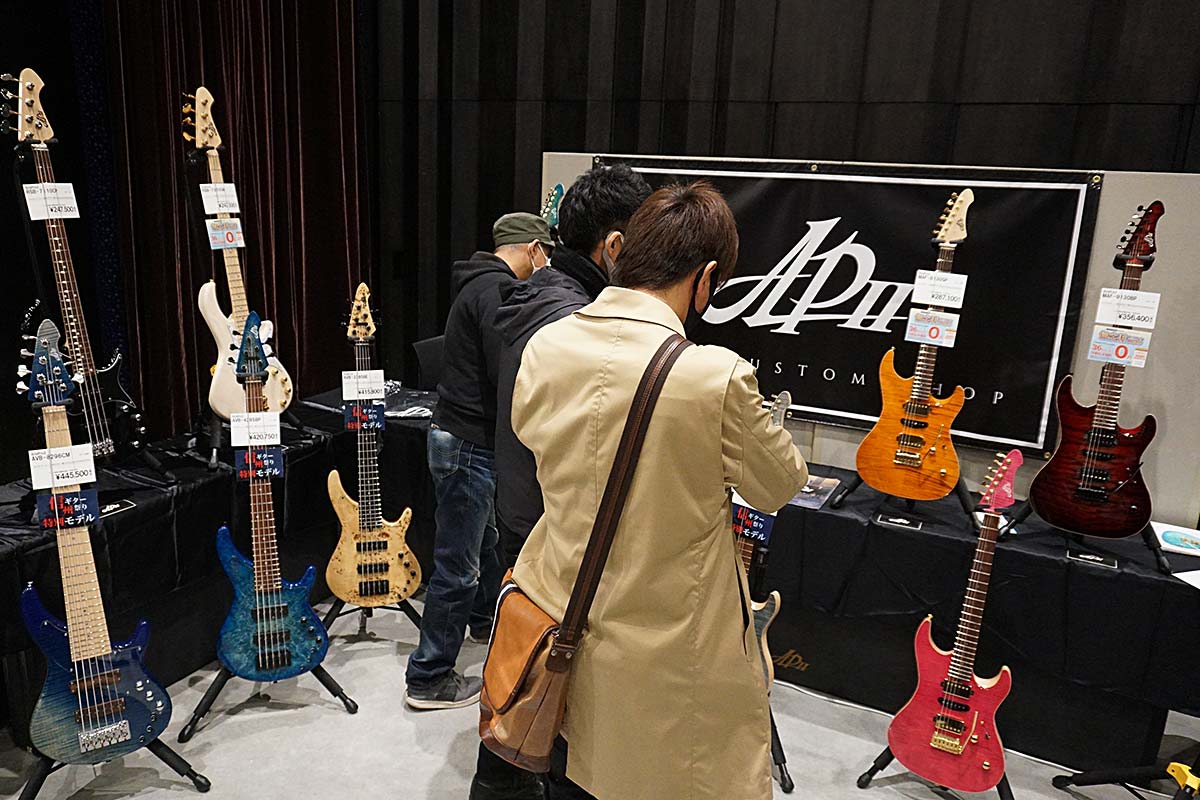
First staged in 2019, Shinshu Guitar Festival, an exclusive exhibition of electric guitars and basses took place on November 14 and 15 at Shinmai Media Garden in Matsumoto. The first event drew 1,500 visitors, but this year in difficult time of the pandemic, the organizer set it out under strict control of visitors based on appointment system, sanitation and temperature check at the entrance.
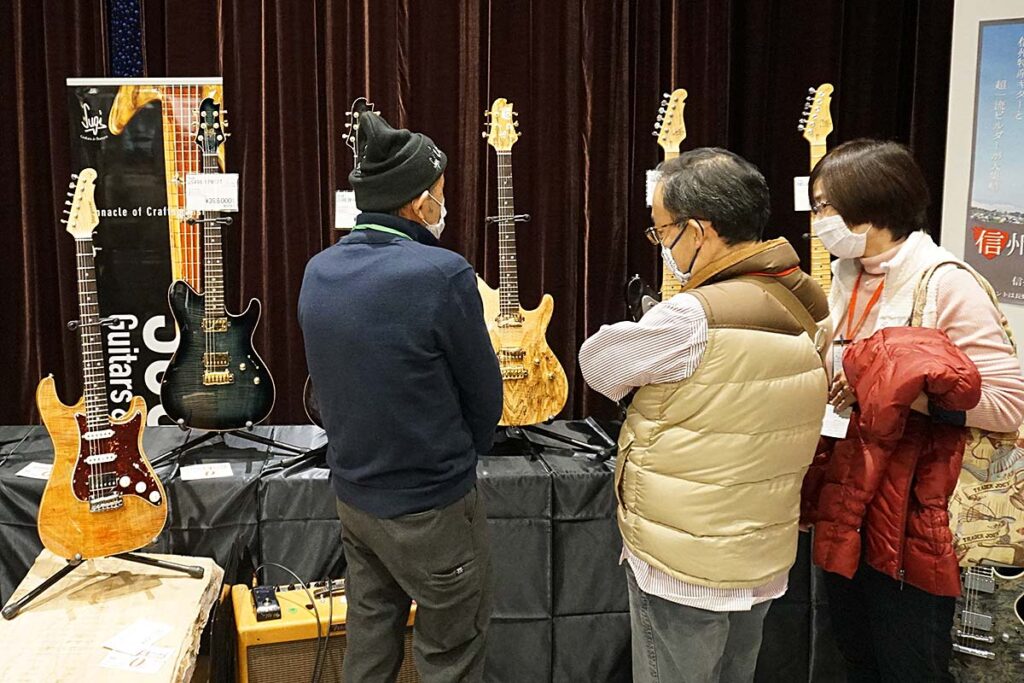
Around 800 visitors about 70% from outside of Nagano enjoyed the exhibit of 150 models from 12 local brands in Nagano, tried favorite models and talks in person with the builders. In coincidence, the guitar makers provided visitors with demonstration of high-end guitar building and talk sessions at the 6th floor site at Parco Shopping Complex in Matsumoto.
Mikio Ohta, a member of the executive committee and manager of Shimamura Gakki Parco Matsumoto Store said, “It’s an event to let people outside of Nagano, Japan’s utmost guitar building and high-quality standard of guitars produced here. At the same time, the event focuses to vitalize local guitar business.
“The appointment system worked very well. We saw serious visitors came, and the exhibitors reported that they had excellent business talks with prospective customers. Actually, we achieved over 10 million yen sales, exceeding the results of the last year.”
The proceeds from the charity auction held at the event is planned to grant to local autonomies to be used for local disaster support programs.
Suzuki Completes New Headquarters

Hamamatsu-based Suzuki Musical Instrument Manufacturing Co., Ltd. started operation at its new headquarters bldg. on October 19.
The 4-story building has enabled the company to consolidate every division from manufacturing to R & D, engineering, sales, administration and import and export businesses under one roof.
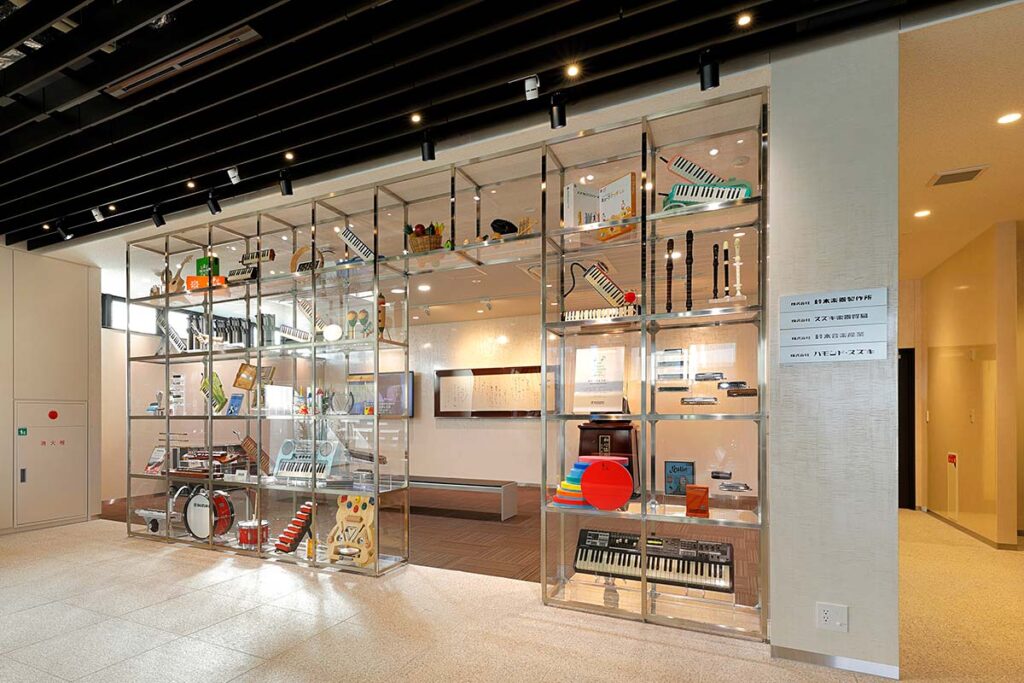
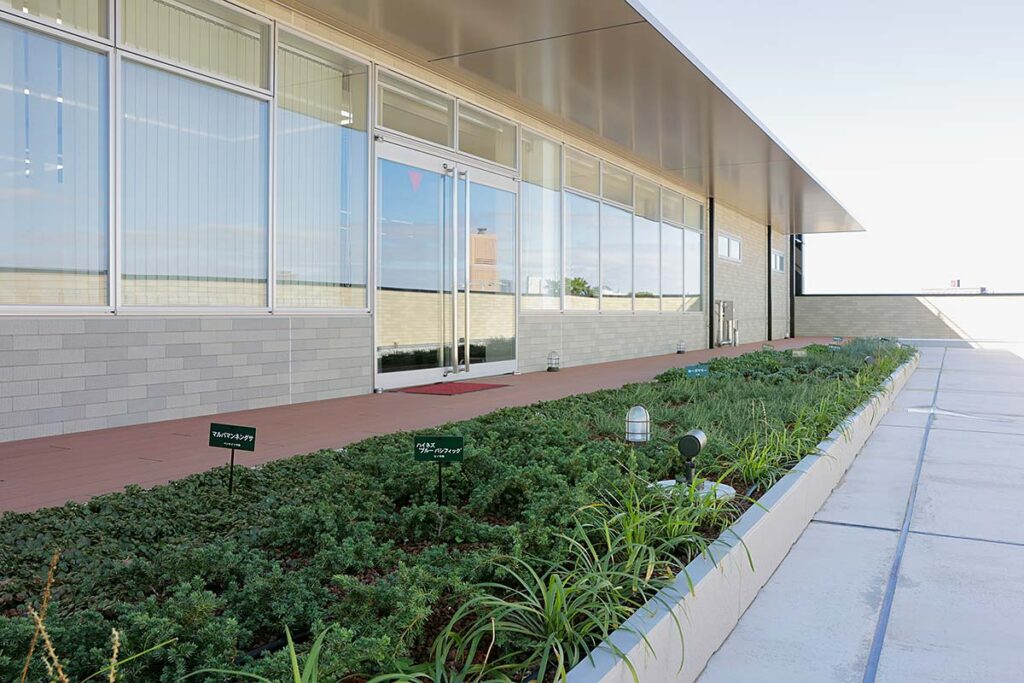
On the first floor, it has a spacious section showcasing well-known products of Suzuki where visitors can watch video introducing business concept of the founder, late Manji Suzuki. (photo left top)
The R & D division has upgraded with a new sound-proof studio. It also has a spacious rooftop garden and a cafeteria for the workers. (photo right )
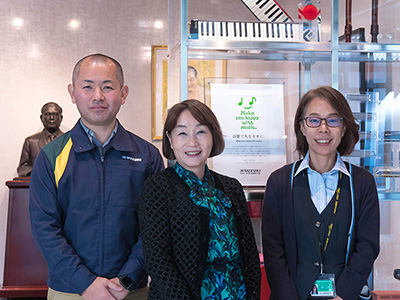
Reiko Suzuki, president, said, “Since inception, Suzuki Musical has grown to this day always dedicated to educational market supplying schools with musical instruments and teaching materials. We are happy to keep moving on seeking how we can serve the society under the concept of my father Manji, “Provide customers with dreamful musical instruments” On this occasion, we chose a new company slogan, “Make you happy with music.” All staff are enthusiastic about the refined manufacturing and social environment.” (photo bottom: Reiko Suzuki, president is flanked with Seitaro Yamauchi, manager of Sales Division, left and Hitomi Aoyama, Planning Dept. right)
Obituary Sanjiro Kawamorita(1924 – 2020)
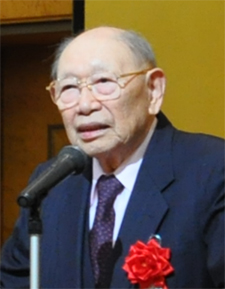
Sanjiro Kawamorita, former vice chairman of Kawai Musical Instruments Mfg., Co., Ltd. passed away on September 18 at the age of 96.
Joined Kawai of its Shimada factory in 1947, he was promoted to manager of Products Dept. in 1967. After having experienced several key posts he took responsibility as board of directors vice chairman in 1987.
While serving upper level board at several Kawai subsidiaries, he contributed to the music products industry as vice chairman of Shizuoka Musical Instruments Manufacturers Association, director and vice chairman of Japan Musical Instruments Association in its earlier stage.
Kawamorita also spearheaded all-industry activities to enact Music Promotion Act. He committed himself on promotion of music making personally funding for the 1st concert at Kenyoshi Elementary School in Aomori Pref. where he learned as a child, and donated a concert grand piano and a series of wind and percussion instruments to elementary and junior high schools in the area.
He was loved by all generations of the industry for his warm open-hearted character.
2019 JMIA Music Products Industry Manufacturers Survey
Japan Musical Instruments Association recently completed the Music Products Industry Manufacturers Survey conducted by Tomoaki Tanaka, associate professor of Tokyo Keizai University and his group. They sent a questionnaire to 81 companies in the industry, and 56 responded. The Retailers Survey will be available early spring.
The pandemic struck every segment of the industry from manufacturing, to distribution after the last spring. Under the chaotic environments, it took extra time and labor for them to collect the data from the manufacturers. The effect of Covid-19 was scarcely reflected in the survey as it was subjected to a full year term from April, 2019 to March, 2020. The actual influence by the virus will be remarked in the 2021 survey.
Brisk export of large keyboard instruments
The domestic sales and export of acoustic pianos including grand and upright pianos, and automatic player pianos in 2019 marked 55.2 billion yen, and gained 19% share of total domestic sales and export. Domestic sales and export of Digital pianos were 68.3 billion yen and shared 24% of the total. The entire category shared 43% of the total domestic sales and export.
Export of acoustic pianos maintained the same level as the previous year in unit, but value-wise they counted 47.5 billion yen, minus 2%. Grand piano export slightly declined both in unit and value, but the domestic sales increased 9% to 3,678 units and 8% to 3.97 billion yen in value. Upright piano export kept the level of the year before last in unit, but the domestic sales declined 4% in unit to 8,936 units and 3% in value to 3.58 billion yen. Automatic player piano also tracked the same pattern as upright pianos with no change in export but 8% decline in the domestic sales to 143 units and 16% decline to 140 million yen.
Export of digital pianos increased 6% to 1,389,000 units and 3% to 55.53 billion yen, while the domestic sales were stagnant with 14% decline in unit and 12% decline in value.
The domestic sales of electronic keyboards with standard-size keys jumped 39% in unit, and 57% in value, but export kept the level of the year before last in value. Those with mini-size keys enjoyed continuous growth in domestic sales and export with 10% gain in unit, and 22% domestic sales increase and 31% export increase in value.
Minor decline of wind instruments in domestic market
In 2019 domestic sales and export of wind instruments in Japan were 31 billion yen, sharing11% of entire value. Export gained equivalent sales in unit and value, but the domestic sales declined 10% in unit and 8% in value. Sales of every segment of this category slightly went down.
Export of saxophones and clarinets gained 9% and 3%, respectively in unit and 8% and 2% respectively in value, and other woodwind instruments and trumpets/cornets increased 2% and 1% respectively in unit. Since these products gained sales in unit than value, average unit price narrowly declined. It suggests sales of entry level instruments Increased last year.
Brass instruments struggled both in export and the domestic market with 6% and 10% declines, respectively. Trombones significantly went down 16% in export and 12% in the domestic sales.
Sales of string instruments including violins, violas, celli, double basses and electric models increased marginal 2% in unit, while declined 6% in value. Naturally, it caused lower average unit price.
Production and sales of other string instruments such as mandolins, banjos and harps went down 90% in unit. However, export and the domestic sales of them declined just 6% and 2%, respectively. Considering the size of the market, it’s likely that the dramatic decline in unit has not much influenced the market.
Excellent sales of digital drums and educational percussions
The domestic sales and export of percussion instruments in 2019 were 21 billion yen which shared 7% of the total industry sales.
Digital drumkits are the largest segment of the category with 6.87 billion yen sales. Export of them declined 10% in value, but the domestic sales increased 2% in unit and 3% in value.
The domestic sales and export of acoustic drumkits and single drums, the second largest segment of the category, declined to 3.12 billion yen with 3% and 16% minus in the domestic market and export, respectively.
School-use small percussions dramatically increased 58% in unit and 12% in value in the domestic market. Other digital drums increased 18% in unit and 27% in value. Hardware gained 11% in unit and 17% in value. Cajons increased 11% in unit but decreased 10% in value.
In addition to the above products, table-top xylophones (28% increase in unit and 23% in value), table-top glockenspiels (15% increase in unit and 11% in value) and other percussion instruments (25% increase in unit and 3% in value) contributed to export growth.
Minor increase of guitars and related products
In 2019 the domestic sales and export of guitars and related products including acoustic and electric guitars, electric-acoustic guitars, electric basses, amps, effect devices, tuners and guitar strings were 36.3 billion yen sharing 12% of the total industry sales. They marked meager 4% increase in unit and 2% increase in value in the domestic sales.
The domestic sales of electric-acoustic guitars increased 21% in unit and 12% in value. Acoustic guitars also gained 6% in unit and 1% in value. Guitar and bass amps also sold well in the domestic market with 44% increase in unit and 35% increase in value. These segments have showed the largest growth since 2016 when the present data collection system started.
This category also showed an excellent result in export; electric guitars and basses with 15% increase in unit and 30% increase in value, electric-acoustic guitars with 7% increase in unit and 8% increase in value, guitar and bass strings with 4% increase in unit and 16% increase in value.
Sound export of harmonicas and accordions
The domestic sales of other musical instruments including harmonicas, keyboard harmonicas, accordions, recorders, ocarinas and Taishokotos declined between 10% and 15%, however, they showed excellent performance in export. Harmonicas gained remarkable 48% increase in unit and 78% increase in value. Also, accordion export rose 39% in unit and 36% in value.
Though the domestic sales and export of ocarina declined 15% in unit, they kept the level of the previous year in value. It suggests high-quality models are purchased by adult players.
Taishokotos which upturned the previous year fell 54% in unit and 46% in value in the domestic market.
Digital musical instruments made in Japan boosted the market
The domestic sales and export of digital musical instruments were 15 billion yen sharing 5% of the total sales. While overseas production of synthesizers with keyboard and other digital musical instruments dramatically went down, domestic production jumped up from 8 times to 50 times depending on models. The trend was also evident on other digital musical instruments. Production of them in the domestic market outperformed overseas production.
Except the domestic sales of other digital musical instruments which increased 20% in unit but decreased 3% in value, every segment of this category recorded overwhelming increase of sales in value reflecting significant increase of average unit price.
Export of other digital musical instruments gained 33% increase in unit and 57% in value, seemingly value-added models of wind synthesizers and stand-alone music production tools successfully explored overseas market.
Growing demands for compact PA systems
Portable PA systems, power amps, mixers and speaker systems earned 15.2 billion yen sales in the domestic market and export. They represent 5% of total industry sales.
Portable type PA systems significantly increased 60% in value in the domestic market and export. The domestic sales of mixers and speaker systems grew 17% and 22%, respectively in value.
Hard disk MTR gained 6% sales in the domestic market and over 56% growth in export suggesting continued demands among considerable number of musicians.
Yamaha Ginza Store Renews 1st and 2nd Floors

Yamaha resumed operation of the 1st and 2nd floors of Yamaha Ginza Store, Tokyo, redesigned as Brand Experience Floors on October 23.
Entering the 1st floor, visitor is greeted with a 25-face large display screen and a ‘keys between table’ digital piano built in a table. Movie contents carrying Yamaha’s brand concept ‘Make Waves’ and images connected keys between table displayed on the screen are visible by passersby through the window. (photo right: ‘keys between table’ digital piano built in a table)
The 1st floor offers a cafe stand and a music table. Visitor sets a cup drink purchased at the caf? on the music table, then a camera captures it and music matched to the image projected on the music table is automatically delivered. It provides the visitor a unique experience even if he or she does not play musical instrument.
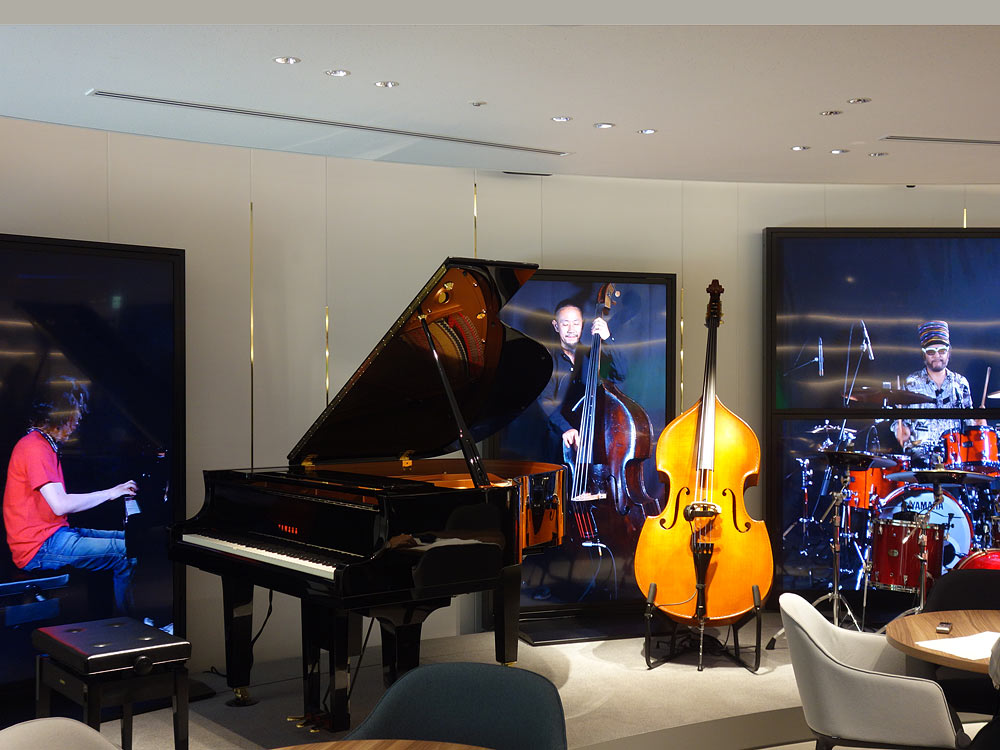
The 2nd floor accommodates music books and scores all over the walls in sedate natural settings using wood materials. An eye-catching Real Sound Viewing area with a piano trio set is offered for virtual live stage where artist image is shown along with automatic music performance. Live music is delivered on stage, and attached NOTES BY YAMAHA authentic cafe lounge serves visitor food and drinks related to performed music and composers. (photo right: Real Sound Viewing area)
Also, Yamaha concept models exhibited at overseas design competitions, and prototypes are displayed at Design Exhibition area.
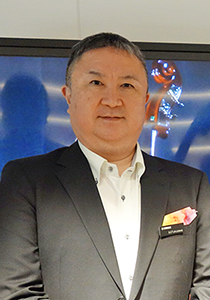
Mamoru Fukuzawa, manager of the Brand Experience Floors says, “In the time of Internet, we are exploring what real stores can offer. This is a special place to let music makers and non-music makers know spirit of Yamaha brand. Here we offer progressive technologies not yet implemented into any Yamaha products for maximum musical experience. We expect this place serves the community and as a means to connect people through Make Waves concept.”
Jeugia Kyoto Sanjyo Flagship Store Refurbished
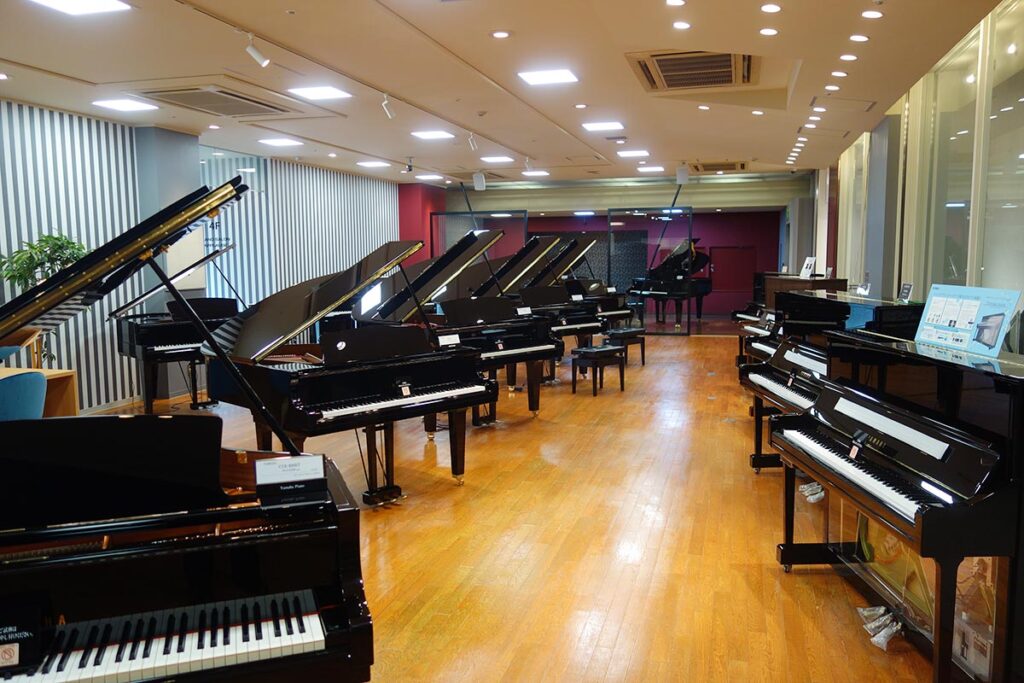
Kyoto-based Jeugia completed renewal works of Sanjyo flagship store on October 1.
Adding new Piano Salon, consolidated music software division and an expanded repair section for woodwind and stringed instruments (photo bottom right), the company expects to enhance advantages of the flagship store, being a center of local music culture. Also it is expected to serve both music makers and amateur music fans offering them opportunities to learn music playing, a performance stage and fun experience.
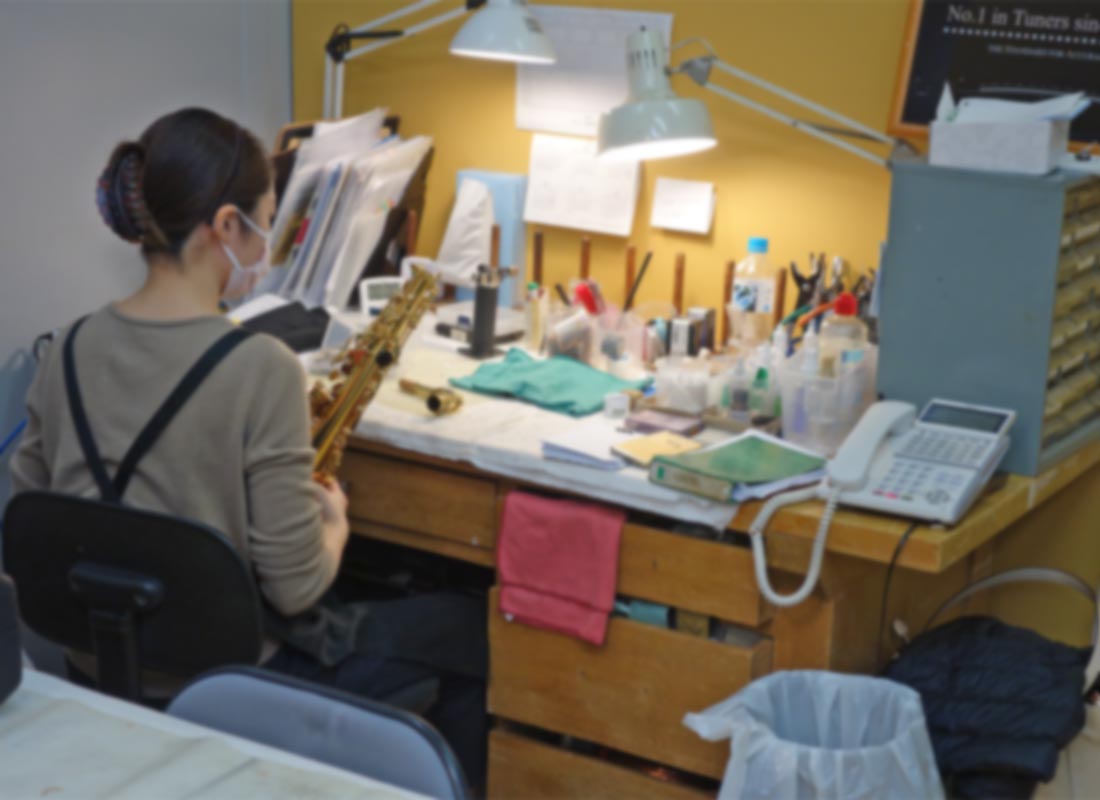
Applause Piano Salon on the 4th floor showcases highest class grand pianos of Yamaha, Boesendorfer and other brands, all of them are offered ready to play for selection. It has also two piano lesson rooms furnished with a grand piano individually. (photos top, Applause Piano Salon and expanded repair section)
Music Salon on the 6th floor further upgraded adding two lesson rooms to existing 11, totaling 14 throughout the store including 3 at the Piano Salon. The store reports enrolled students reduced during the lockdown are returning almost to the level of last year.
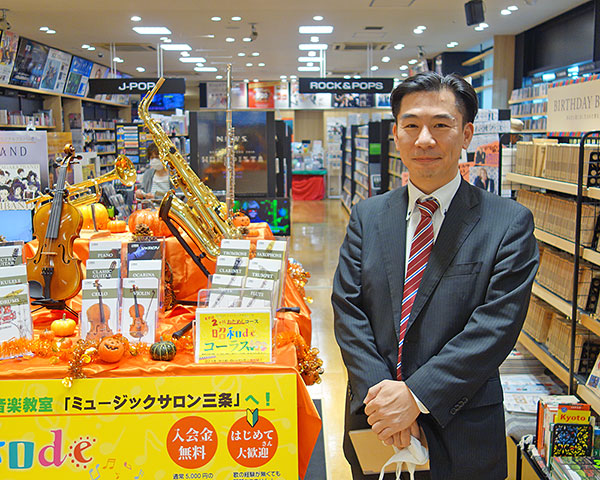
The store renewal apparently contributes to store traffics after October. Masayoshi Ogasawara store manager says, “In addition to stronger store sales, we expect the renewed environment inspires more people to get involved in music making at the teaching studios and enjoy in-store and town recitals. Consequently, it will help increase instrument sales. We are still affected by the coronavirus but we are vitalized with these many refinements toward the coming business season.” (photo right, Masayoshi Ogasawara, store manager)
Roland Applies For Relisting
It’s announced on November 11 that Roland Corporation applied for relisting of stocks to Tokyo Stock Exchange. The company became a private entity by MBO in 2014. The total market value of Roland is estimated to be 80 billion yen. It’s going to be one of the largest IPOs in Japan this year.
Most Wind Instruments Proved Safe In Concert Amid Pandemic
After experts in Berlin indicated appropriate social distance in classical music concert as 1.5 meters space between individual stringed instrument players, and 2 meters space between individual wind instrument players last May, classical music concert was only held in Japan under strict control of the guidance until September. Japanese Government recently lifted the restriction, and classical music concert is now held under the equivalent conditions to the days before the coronavirus started to spread.
Japan Association of Classical Music Presenters and Japan Academic Society of Wind Music worked together last August to examine how instrument players and audience can keep themselves safe in musical performance. They measured droplets of players and audience seated consecutively and in every odd of a row of their dispersion level and distance.
The test was held under guidance of the experts at a clean room of Shin Nippon Air Technologies Co., Ltd. in Chino, Nagano Pref.
A total of 40 orchestra members of NHK Philharmonic Orchestra, Nagoya Philharmonic Orchestra, Tokyo Kosei Wind Orchestra, New National Theatre, Tokyo Chorus and The Philharmonic Chorus of Tokyo, and a 30-member medical team, experts and engineers joined the test. It’s considered the test results obtained in an unventilated clean room may be a little worse than circumstances of ordinary ventilated concert halls.
Here are results the participated group came by the test.
The subject instruments included flute, oboe, clarinet, double bassoon and alto saxophone, horn, trumpet, trombone, euphonium, tuba, violin and cello. Ordinary conversation, cough and chat at concert hall sitting area as well as soprano, tenor voices were also subjected to the test.
1. When putting face mask, the test showed there was not much difference in infection risk between sitting seats side by side and every odd of a row of seat.
2. The experts found no evidence of increasing risk of virus infection when playing string instruments, all woodwind instruments, euphonium and tuba in ordinary distance from next players in orchestra when compared with keeping distance.
3. When horn player plays in ordinary distance, the chances to contract the virus through respiratory droplets are seemingly low when compared keeping distance. However, experts suggest adequate air ventilation.
4. When trumpet and trombone are played, the risk of virus infection is considered to be low tested at 200cm ahead of the players.
The experts didn’t get any indicative data of virus infection at left and right sides and back of the players in ordinary distance.
The experts concluded while we have no measures to completely shut down infection of the virus, but logical combination of prevention measures can effectively reduce the risk and control the infection in limited area.
2020 Musical Instruments Fair Japan Online Planned in December
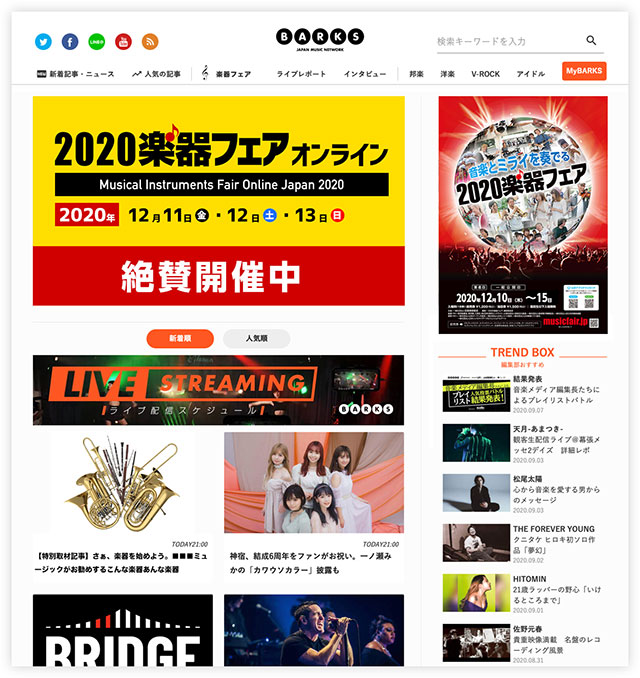
Japan Musical Instruments Association plans a consumer music event, 2020 Musical Instruments Fair Japan Online from December 11 through 13. Organized as a special program substituting to 2020 Musical Instruments Fair Japan slated in October, it collaborates with BARKS, a leading music information website in Japan.
Under the banner of ‘Why Not Making Music Now? Music Never Stops’, it provides experienced and first-time music makers with a host of entertainment contents only enjoyable online in promotion of pleasure of music making and development of music market. (photo right: 2020 Musical Instrument Fair Online is planned on BARKS web site.)
Japan Music Network, organizer of BARKS has delivered latest information on Japanese and overseas music scenes online for over 20 years with 8.40 million pageviews and 3.10 million unique users. BARKS is proud of overwhelming support from music fans, music industry and artists.
2020 Musical Instruments Fair offers exclusive pages reserved for all exhibitors on which the exhibitors can upload company name, logo, and product info along with images.
The highlight of the contents is a communication room offered for individual pages that allows the direct communication between the exhibitor and user or business partner with help of Baroom web chat service provided by Japan Music Network. The exhibitor can stream live clinic session on product, live performance by artists and talk sessions. It supports music retailers with EC capability. (photo below: The communication room allows the exhibitor to stream clinic sessions, product presentation, live concerts and talk sessions.)
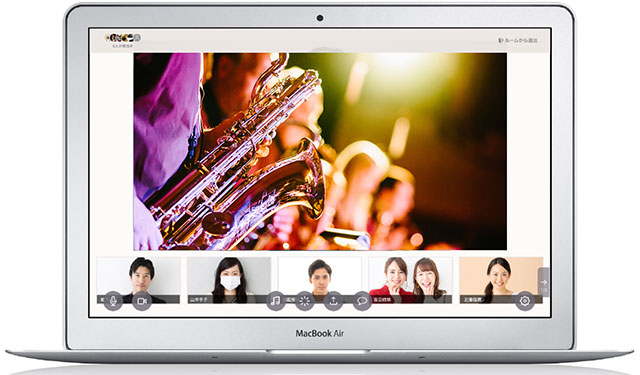
Depending on plans, the exhibitor is eligible for uploading news and interview reports on BARKS site.
The site is open from November 11 through December 10 prior to the official opening for free view of the exhibitor site. Every exhibitor news is accessible for a year after the event is closed.
The event has 4 exhibit plans from A to D with exhibit fee ranging from 55,000yen to 550,000yen. The top all-inclusive plan A offers exhibitor the largest exhibit page that allows 10 products listing, 10 images per product, 5 movies per product, 3 communication rooms with up to 5 times of access per day and 45 minutes of use per access, and listing of 24 news coverage and one interview report on BARKS web site.
Hideo Nonaka (1920-2020)
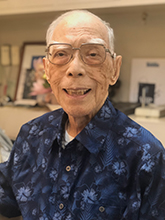
Hideo Nonaka, founder, and chairman of Yokohama-based wholesaler Nonaka Boeki passed away on September 16, right a day after celebration of his 100th birthday. Memorial reception took place on 22nd inviting industry leaders and musicians. The funeral mass was held on 23rd at Yamate Catholic Church, Yokohama in conformity with his wishes.
He succeeded Nonaka Gakkiten, musical instrument importer founded by father in 1918, and in 1953 launched Nonaka Boeki. Since the first overseas business trip flew from Haneda then U.S.-controlled air base in 1957, he has travelled around the world seeking business opportunities concluding exclusive distributor agreement with Vandoren, Selmer, Vincent Bach and other world-class brands of wind and percussion instruments, and accessories to introduce them in the Japanese music scenes. Today, Nonaka Boeki represents more than 50 renowned manufacturers throughout the world in the Japanese market.
He also contributed to expand Nonaka’s business adding Nonaka Inc., wholesaler and Nonaka Music House which serves as a showroom of Nonaka Boeki.
In recognition of his decades of commitment in promotion of symphonic bands and classical music, he received Medal with Dark Blue Ribbon from the Government in 1981. Accolades he won includes Blue Chip Company Award given from National Tax Agency in 1982 and The Ministry of Trade and Industry Award as a best contributed company through import business in 1991. In 1995, he was granted Chevalier de L’Ordre National du Merit(France).
Nonaka stepped down to chairman of the company in 1995, and son Hideki took over the business.
Manji Suzuki (1923 – 2020)
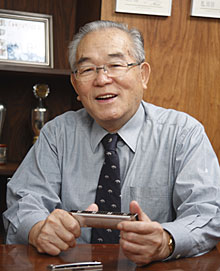
Manji Suzuki, founder and chairman of Suzuki Musical Instrument Manufacturing Co., Ltd. passed away on August 21. He was 97 years old.
Harmonica enthusiast since elementary school days, Manji Suzuki eagerly sought to get a job at the harmonica factory of Kawai Musical Instruments Manufacturing Co., Ltd. in his hometown, Hamamatsu. After mastered all works of harmonica manufacturing, he launched his own workshop in 1953. It was actually start from a scratch borrowing an irrigation motor pump from a landlord for metal press works nightly when it was not used.
While expanding Suzuki harmonica line in the ensuing years, Manji developed Japan’s first keyboard harmonica under Melodion brand in 1961. Six years later, it was recognized as a qualified educational instrument in the framework of Course of Study of the Ministry of Education. It turned out a milestone for the future of the company.
In course of time, Suzuki Musical successfully expanded business adding 5 subsidiary companies including Suzuki Musical Distribution, Universe Precision Works, Suzuki Educational Software and much later Hammond Suzuki which manufactures Hammond electronic organs.
Though the company grew to a diversified business group, Manji Suzuki never changed his philosophy throughout life that educational musical instruments were a core of the business. He commented in the interview by Japan Music Trades in August, 2015, “Engaged in this business for 60 years, music education has receded year after year, and choir music superseded the instrumental lesson at public schools. Music products industry should advocate the government and parent importance of music education which helps children and students nurture human sense.”
He also said that he hoped to maintain strictest eyes to find what is wrong with the harmonica he built at the age of 90 for the sake of further improvement of his instrument. He was a real craftsman in every way.
Manji Suzuki served the industry as president of Japan Musical Instruments Manufacturers’ Association and a member of the board of directors of Japan Musical Instruments Association. In recognition of his decades of contribution to promotion of lifelong learning using harmonica and Taishokoto, and penetration of music education, he received The Order of the Rising Sun, Gold and Silver Rays Medal from the Japanese Government in 2016.
Kanda Shokai Sets About Monthly Guitar Subscription Service
Tokyo-based music products wholesaler Kanda Shokai began Play G guitar subscription service for first-time and experienced guitar players on August 3. The company expects the new service meets the demands of consumer of every age group and help them to start guitar playing at reasonable fee, and try versatile guitars including coveted models of favorite artists.
Rokushiro Sasaki, manager of Marketing Dept. says, “It has long been said that interest in guitar waned among young people. We feel the background for that is they fear it is a costly choice. Young people can get access to a host of inexpensive entertainment programs today. You must pay tens of thousands of yen for the first guitar. If they don’t need to worry about high starting cost, we thought the first hurdle would be much lower. Play G idea has thus taken shape at us.” He also takes recent city lockdown as a trade wind.
Kanda Shokai offers more than 250 items from acoustic guitars to electric basses and ukuleles with greatest share of electric guitars in various brands, finishes and features as well as left-hand models for the service. The company sets monthly subscription fees in 3 stages: Stage 1 for entry level players and young teenage students at 2,700yen, Stage 2 for intermediate and upper class players at 6,800yen, and Stage 3 for well experienced players at 18,000yen.(excluding sales tax).
Sasaki continued, “It is a great advantage for the customer to be able to choose favorite gears from the huge popular brand names. All models guaranteed of their quality standard come from our latest stocks. Even first-time player can start with one of the finest models of the price range at reasonable fee. We offer experienced guitarists already having guitars or seasoned senior players good selection of high-end models.”
Rented guitars can be switched to upper class models after certain period of use. It is fun picking up guitars in different styles and finishes matched to feeling from time to time, only realized in rental system.
Customer can buy instruments in use at market price deducting total rental fees paid. (Maximum deductible fees are regulated by models.)
Sasaki concluded saying, “We are ready to enhance selection of models for subscription system to better meet requests from customer. We see first-time guitar players are increasing after the pandemic, but it is a pity that they quit shortly. We want to provide them with an exciting experience and support them to continue enjoying music playing even after we beat the virus. Subscription system may expand to include amps and effect pedals in coming months.”
Music Retailers Report: Demands Grew During Lockdown
Music retail business was hard hit as COVID-19 spread throughout the spring school season. After the declaration of a state of emergency lifted in the middle of May, music retailers slowly returned to business and in-store music lesson resumed in June. Customers began visiting music stores.
Great number of people have found pleasure of music making during lockdown, and demands sharply grew for fun-oriented casual type musical instruments. Seasoned musicians sought out gears for music production and streaming from home studio.
Japan Music Trades sent a questionnaire to 133 music dealers throughout Japan asking their business environment 5 months later the pandemic. 77 out of the total responded. Here is a report what happed to the music retailers and how they coped in the difficult times. We appreciate very much their commitment to our survey.
45% of music dealers reported sales and store traffic went down from June through July, and 88% replied the lockdown contributed to generate substantial demands for musical instruments and sound production system.
What did people buy during self-isolation?
1. Acoustic guitars (53 stores)
2. Digital pianos (44 stores)
3. Ukuleles (39 stores)
4. Electronic keyboards (22 stores)
5. DAW & streaming gears (16 stores)
6. Digital drums (13 stores)
7. Acoustic pianos (12 stores)
8. Electric guitars (12 stores)
Price points of purchase (all instruments)
up to 50,000yen 87
Up to 100,000yen 41
Up to 200,000yen 36
Up to 500,000yen 31
Up to 10,000yen 27
Over 1 mil. yen 7
Up to 1 mil. yen 6
Acoustic pianos
Over 1 mil. yen 4
Up to 1 million yen 3
Up to 500,000 yen 3
Digital pianos
Up to 200,000yen 21
Up to 100,000 yen 16
Up to 500,000 yen 15
Up to 50,000 yen 6
Up to 1 mil. yen 1
Acoustic guitars
Up to 50,000 yen 52
Up to 100,000 yen 16
Up to 200,000 yen 3
Up to 10,000 yen 3
Up to 500,000 yen 2
Ukuleles
Up to 10,000 yen 11
Up to 50,000 yen 7
Up to 200,000 yen 1
Electric guitars
Up to 50,000 yen 4
Up to 100,000 yen 2
Digital drums
Up to 200,000 yen 3
Up to 100,000 yen 2
Up to 50,000 yen 1
DAW & streaming gears
Up to 50,000 yen 10
What did the music dealers focus most between April and July?
・Over 20 times of product lines listed on EC site than the same period of the previous year. (one dealer in Aichi Pref.) Some dealers also reported excellent EC business thanks to enhanced and redesigned websites.
・Enhanced or newly started online music lessons. (20 dealers out of 77)
While some dealers were satisfied with the results, not a few dealers commented that only limited number of students had taken online lesson in preference to onsite lesson. The dealers also reported difficulties in promoting online lesson as students’ digital environment at home is different, or luck of skills of instructors.
・Introduced web meetings. One dealer reported It helped communicate better with studio staff.
・Increased production of sales promotional video, sales and technical training for staff and reviewed online product listings.
・Provided online workshops. Demands grew as they were recognized.
・Enhanced online store site to connect the real-world shop. A performance video streaming campaign on SNS drew more than expected 300 postings. Held a special sale during June through July as online store redesigned, and it generated 8 million yen sales a month selling as many as 140 different items.
・ Increased store information and products sold online so that customers can contact and buy instruments and accessories anytime. Customer response was positive.
・Started distribution through 3rd party online marketplace, and it contributed to explore new markets in much distant areas.
・Enhanced website listing carefully selected high-quality merchandise as it assures users no-nonsense purchase at home.
・Introduced online sales marketing using Zoom at key stores in May. It’s hard to verify the effect since the declaration of a state of emergency lifted soon.
・Web reservation for tryout of piano was well accepted. Keeping social distance, business closed successfully in many cases. It could be continued after the society returns to normal.
Japan Musical Instruments Association General Affairs Committee Approves A Substitute Plan for Musical Instruments Fair Japan 2020
Japan Musical Instruments Association held the 2nd General Affairs Committee meeting online on July 7 with participation of 13 members.
Masato Oshiki, president of the Committee asked the members to talk about music promotional plans in place of Musical Instruments Fair Japan 2020 cancelled on July 1. He said “Music products business stalled for 3 months. Sales we lost in the period have not recovered yet. On the other hand, it is great that we had strong demands for some types of products generated during the lock down. Considerable number of music makers including beginners confirmed and found value and pleasure of playing music. We are still exposed to enormous social and financial pressure, but also feel this is an opportunity to promote music and the benefit of music making for the industry as a whole.”
The Committee agreed to hold an online musical event offering products presentations, seminars and clinics encouraging general consumer to take part in November or December.
Yamaha and Kawai Provide Online Services and Live Concert
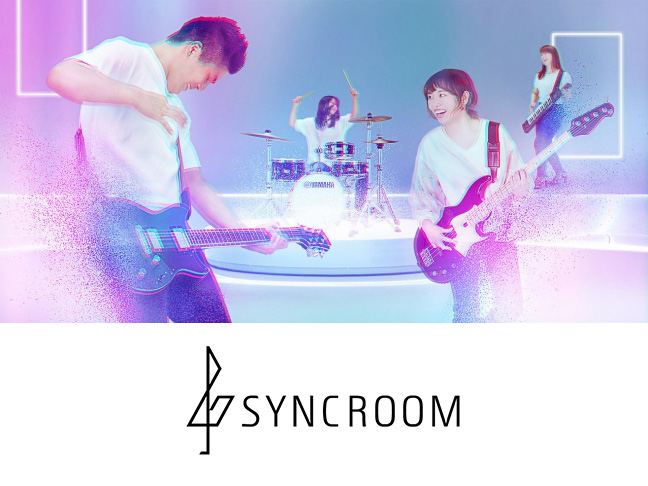
Yamaha made an online SYNCROOM ensemble session app, (for Windows and macOS) open free encouraging music players in distant areas to communicate via music online. It provides online sessions by 5 players in 5 different places as a member offers a virtual Room and invite 4 session players to join.
By minimizing latency of audio data sent via internet with help of Yamaha’s exclusive technology, group members even in remote areas can enjoy comfortable ensemble session. Yamaha upgraded the app. adding reverb and metronome functions.
The app. is offered free. Just installing it into each personal computer and opening account, everyone can enjoy online session play. Yamaha also offers beta version of the application for Android for free use.
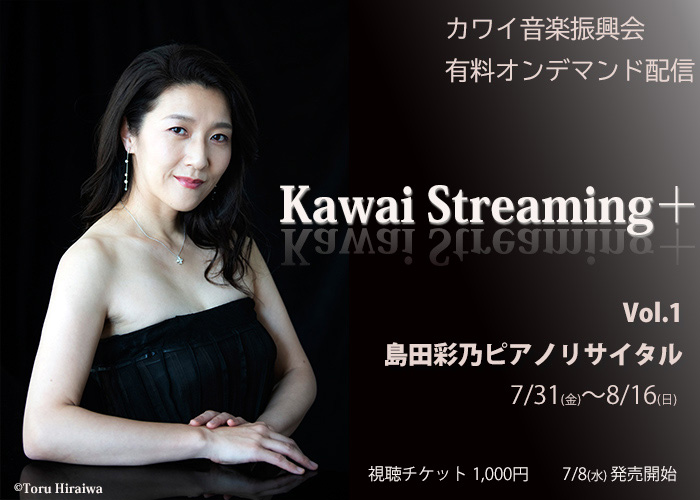
Kawai provided first piano concert streaming by Ms. Ayano Shimada on July 31. As the opening program of Kawai Streaming+, she played works by Mozart, Debussy and Brahms on Shigeru Kawai SK-EX concert grand piano.
In the time every live concert was cancelled or postponed, Kawai opted to deliver music fans live piano concert in a new style. Program archive is open free for all ticket holders until August 16. Video shooting took place at Kawai Pause Piano Salon in Tokyo. The ticket was sold at 1,000 yen.
Yamaha Showcases Music Gears For Home Entertainment
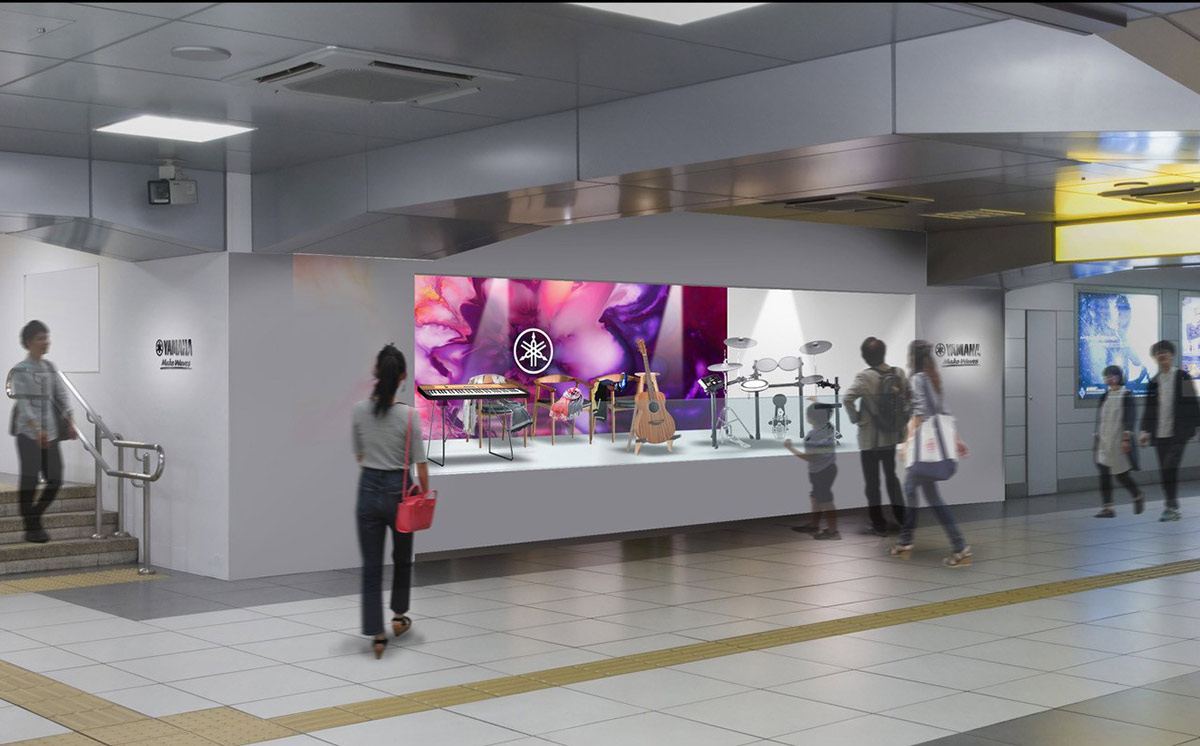
Yamaha is presenting music-related products helpful for nesting at the small exhibition area in Japan Railways Hamamatsu station bullet train concourse. The products include SYNCROOM online ensemble session application, speakerphones, Silent guitars, Web Casting Mixer, etc. all capitalizing Yamaha’s established sound and network technologies. They support people enjoy music making and connect friends safely at this isolated time.
The special exhibition lasts until June 30, 2021.
Kawai Ryuyo Factory Marks 40th Anniversary
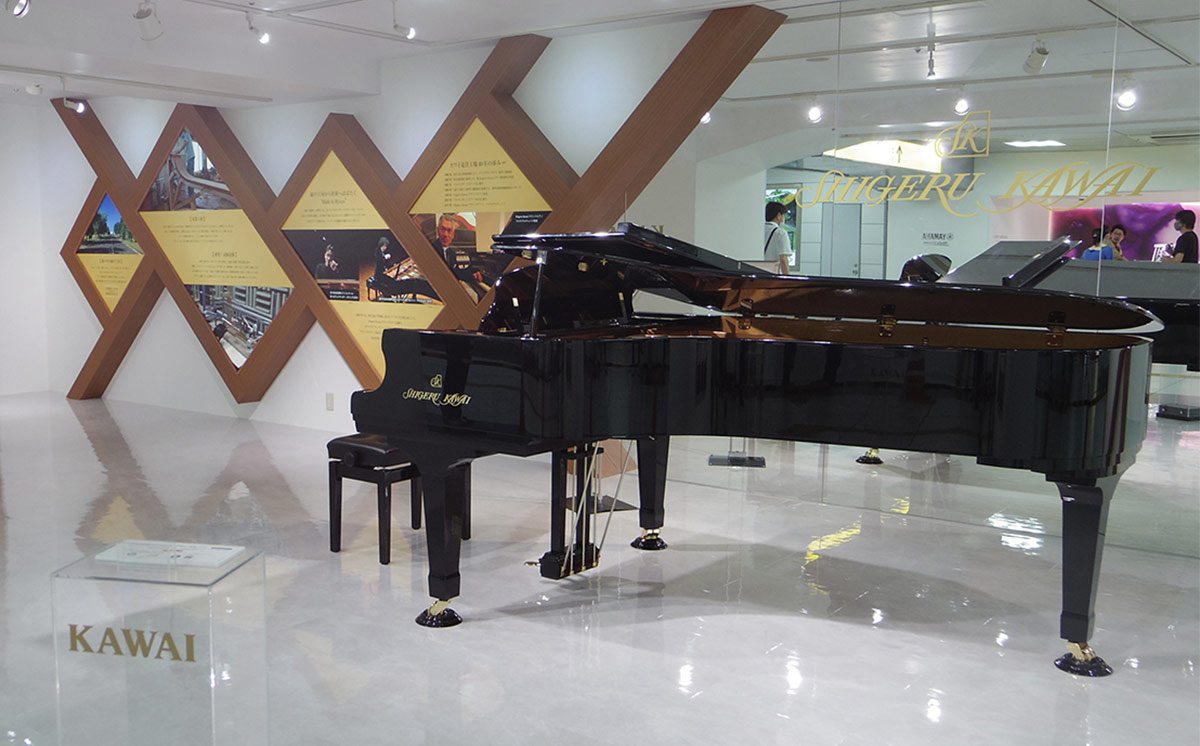
In celebration of 40 years history of Ryuyo piano factory, Kawai is opening a special photo-exhibition telling 4 decades of piano building at the small exhibition area in Japan Railways Hamamatsu station bullet train concourse.
The exhibit also includes a digital signage showing seasoned craftsmen and their works of building pianos inherited from the founding period as well as an exhibit of Shigeru Kawai SK-7 grand piano. The special exhibition lasts until June 30, 2021.
Yanagisawa Adopts MAPKA, Environment-friendly New Material for Ligature Caps
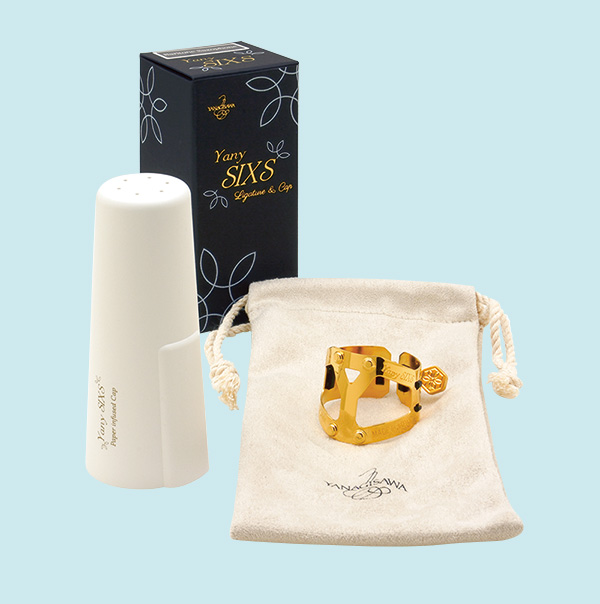
Concerns for better environment for the earth are increasing worldwide, retail stores, convenience stores and supermarkets in Japan stopped providing shoppers with free plastic bags on July 1. It is part of all-industry consolidated activities to reduce plastic waste in seashores.
Yanagisawa Wind Instrument Inc., a Tokyo-based saxophone specialist maker, selected MAPKA, new material for its ligature caps in replace of plastics.
Developed by Eco Research Institute Ltd., MAPKA is an eco-biotic plastic and paper composite material made of 51% paper powder and 49% polypropylene. Easily molded as plastic materials, it is a remarkable material developed in Japan with low contraction, stiffness and heat resistant features. Yanagisawa has completed a new cap for Yany SIXS ligature using MAPKA and started distribution recently. (photo left: New Yany SIXS ligature in a paper package comes with an exclusive cap made of eco-friendly MAPKA material.)

Yukihiro Sato, engineer of Yanagisawa Research & Development Laboratory, says, “Throughout the industries manufacturers are moving to eliminate plastics in their products toward environment-friendly society adopting bio plastics and other alternative materials. In search of new paper-based materials we have found MAPKA. It has made clear that it can be processed and molded just like conventional ABS plastics. The new ligature cap completed after intensive studies of the new material.” Largely made of paper, it has equivalent or superior capabilities and features than plastics. (photo right: Kiyoshi Murakawa, left and Yukihiro Sato)
Yany SIXS ligatures for alto, soprano, tenor and baritone saxophones now come with a cap made of MAPKA along with a paper package and a cloth pouch. The production line underwent streamlining, they are distributed at 22,000 yen a little lower than the previous models.
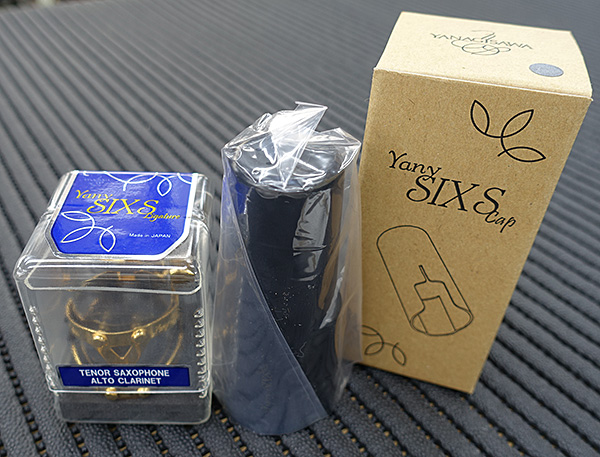
Kiyoshi Murakoshi, Sato’s colleague at Yanagisawa Research & Development Laboratory commented, “We are sorry that official introduction of the new ligature cap came in at the time of COVID-19 outbreak. We have lost opportunity to launch the new cap at Musical Instruments Fair Japan in October. But fortunately, it has gained recognition in the market after June. Yany SIXS’s rich and brilliant tonal color and great sound dispersion capability are attributed to patent pending 6 different spaces created on 6 points of the ligature which professional players both in Japan and overseas highly praise. It is also well referred on SNS. We expect the renewed eco-friendly package to be selected by wider walks of players including students.” (photo right: former Yany SIXS left and matched cap. Plastics and vinyl are used for the package and envelopes.)
Using paper 41%, MAPKA has acquired biomass label which supports prevention of global warming, and Sustainable Development Goals(SDGs) proceeded by 193 UN member countries. It is a clever step of saxophone manufacturer to serve better and sustainable environment.
2020 Tokyo Music Fair Cancelled
Japan Musical Instruments Association announced cancellation of 2020 Musical Instruments Fair Japan (Tokyo Music Fair) scheduled from October 2 through 4 due to COVID-19 pandemic. The event is held biennial, and the association has not yet revealed plans for the next fair.
13 Music Products Industry Leaders Talk About How to Survive the Difficult Time
Much has been talked about the impact of CORVID-19. Since the declaration of a state of emergency over the virus in Japan on April 7, manufacturers, wholesalers and retailers struggled to minimize the impact while temporarily closing store fronts, reducing work hours and employing remote working. Japanese government lifted the statement of emergency by May 25, but the virus has changed our traditional lifestyle and behavior in society completely.
Music activities from live concerts to band and ensemble performance are no longer the same in style as before. Besides preventing the infection and adapting to the sense of social distancing, how can the industry re-structure business? Japan Music Trades interviewed 13 industry leaders.
Adapt to new lifestyle
Our sales and music studio operation have been heavily impacted. On May 11, we started providing music studio students with online lessons. Though infection case is declining in Japan, it still expands overseas. We understand music activities will expand as 5G wireless technology for digital cellular networks is deployed, and hope to keep pace with the technology innovation to contribute to development of music culture.
We appreciate very much music retailers their consistent efforts to support musicians and the industry on the frontline. We would like to support them with value-added products committing to the needs of music makers.”
Kentaro Kawai, Executive Director, Kawai Musical Insts. Manufacturing Co., Ltd.
Begin from scratch
“Considerable number of retailers have temporarily closed stores or if not, only find quite a few customers visit the stores. Naturally, wholesale business like us is much affected. Present restricted social conditions will not change any time soon. What we can do is to adapt to new lifestyle. Restriction of band activities indisputably impact music industry.
“People have more time at home, and they are likely to buy acoustic guitars, ukuleles and DAW-related products online. On the contrary, there are limited demands for electric guitars as they can’t be played in live concerts.
Anyway, there is no way but we begin from scratch, away from the conventional basics of business. We hope we all survive this hard time!”
Masatoshi Kojima, president, Kanda Shokai Corporation
Support retailers and Work together
“We expanded support for retailers who are increasing share of online business with E-mails and phone calls after the declaration of state of emergency. For example, we added Kikutani original guitar and ukulele packages for the first time players. The picture we see after the battle with the coronavirus may be different from present days. Once remote working and online sales have become standard, music products sales and music activities will be done online more than ever.
“Wholesale business never exists without close-knit relationship with retailers who directly connect to users and market. We are divine partners, and we can work together to win this battle.”
Akira Kikutani, president, Kikutani Music Co., Ltd.
Opportunity to upgrade online skills
“After the declaration of a state of emergency, sales of fretted instruments, wind instruments and drums and related products have devastatingly declined, but online sales of primarily inexpensive acoustic guitars and ukuleles through our website and business at the storefronts located in shopping malls have been going up.
“The coronavirus pandemic has changed our traditional marketing strategy and it provides us to upgrade online skills we haven’t planned before. When we acquire advanced know-how, we will see sales increase of high-ticket models online.
“It’s encouraging that demands for music making is growing in this difficult time. As a retailer we work together with our suppliers, and as a wholesaler, we are ready to support retailers at our best.”
Tomohiro Kurosawa, president, T. Kurosawa & Co., Ltd.
The industry is recession intact
“Production level at our manufacturing bases in China and Hong Kong has went down to 60% or 70%, and about 80% in Vietnam because of short supply of parts.
“Sales in the domestic market dipped from 10% to 20% in March as shipment stumbled, but thanks to healthy online marketing, they didn’t decline much after April backed by surging demands for digital pianos and guitar strings reflecting revived popularity for acoustic guitars. Overseas business maintains 80% of former level.
“We set our priority now on restraining unnecessary cost and keep our strength. Recognized for its expertise, music products industry has been traditionally supported by core fans, and less influenced by negative trend of macro economy. I believe our users come back.”
Seiki Kato, president, Korg Inc.
Society needs real shops and exciting musical experience
“We closed most storefronts temporarily as of middle of May. Part of music instructors at music studios started online lesson after the spring holiday season in May, and resumed teaching at studios nationwide in June.
“We have already carried out networking with storefronts in local cities outside of Tokyo area since some years ago, and prepared for remote working during Tokyo Olympic Games planned this summer. All these helped us adapt to remote working and online meeting environment without much difficulty.
“Net sales have significantly increased since March, but they are insufficient to compensate the sales dip of real shops and music teaching business. We see impact is greater for music teaching operation and our original events including band contest which attracts about 2,000 bands every year than store sales.
“Having experienced many customers rushed into our stores right after the statement of emergency lifted, we are convinced that real time musical experience is essential for our life and society.
“As we recognize importance of real time musical experience, we feel customers expect us good selection of products and customer service more than ever. We will lose support from customers unless we have expertise at both real stores and online platform. This pandemic made it clear.”
Toshiaki Hirose, president, Shimamura Music Co., Ltd.
To enhance additional value
“As retailers closed doors, our sales have steeply declined. Order cancellation and postponement from overseas partners flooded in, but they now resumed distribution. We are grateful. We are anxious that production of entry model guitars in China went down by 50%. It is going to be a serious damage.
“Staying at home, more and more people are seeking communication and music playing by means of PC and mobile. Musicians are doing recording at home studio. We will see soon guitarists plug their electric-acoustic guitars into interface connected with PC.
“Music market won’t recover in a short time, demands diminish, and customers withhold purchase of musical instruments. It is time to keep cash flow and make efforts to reduce loss in daily operation. Restricted flow of people and goods, our sales will largely depend on online, but we should remember what face-to-face deal means. It is the real strength of music stores.”
Hayami Tahte, president, Takamine Gakki Co., Ltd.
Be prepared for growing online sales
“Chinese market is gradually coming back. On the contrary, domestic sales and export to Europe and U.S. declined, to nearly half as a total. The point is it takes long time to win this battle. At this moment we are preparing to improve our online marketing skill as we believe remote working and online business will take a larger share in our society.
“It’s a difficult time for manufacturers like us and wholesalers, but retailers are more distressed than us. We want to support them and work together to serve customer and save music culture.”
Teruhisa Mano, president, Tombo Musical Instr. Co., Ltd.
Provide students with continuous support
“Schools are closed, it’s a hard time for school market wholesalers like us as Spring is the most important season as we provide schools with instruction books and musical instruments. We undertake this time a special occasion to help support students of symphonic bands to have knowledge on instrument maintenance and cleaning. We hope students get back to school with smile soon and play music and enjoy ensemble session.
“Business is slowly reverting in some areas, but it will take a long time before demand comes back. We are ready to meet the needs of retailers with good selection of inventory.”
Masato Horibe, president, Niimi Gakki Co., Ltd.
Music is deeply rooted in our mind
“Schools closed, symphonic band activities banned, declaration of a statement of emergency and stay home request by the government have swept customers away from music stores. It has affected our business.
“As an importer and wholesaler, we are seeking ways to better serve our customers in this difficult time. When we win the virus, business may take a different shape from what we see now. The key words for the present turmoil is ‘Connect people without direct contact’. There will emerge myriad of new solutions meeting the need in coming months. We must keep pace with development of new technologies.
“As we confront unprecedented difficulty, music gives us pleasure and comfort. Because we are involved in music business we should remember that music is deeply rooted in our mind.
“Business is really awful today. But we have overcome the bad times with history-proven resilience, and hopefully can defeat this difficulty. Get through this storm and we hope to see you soon!”
Hideki Nonaka, president, Nonaka Boeki Co., Ltd.
Team with outside industries
“We open all stores time shortening in Osaka area except 1 store located in a shopping center. Music studio operation was shut down for 3 months and store traffic has almost gone. Online sales increase but hardly offset sales decline of real stores. Sales for overseas tourists diminished and wind instruments sales are getting worse month after month. All store events were cancelled which evolved cancellation fees in some cases.
“Even after we don’t need to worry much about the virus, it’s sure to say way of business wouldn’t be the same as today. We feel music industry can better adapt to the new society by working together with outside industries related to music and sound.”
Akira Furuyama, president, Miki Gakki Co., Ltd.
Soothing effect of music
“We have tentatively closed real stores and music lesson studios operating nationwide since middle of March. During the period, we asked the music teachers for a video message addressed to students to help them keep interest in music making.
“In parallel with closure of the real stores, we closed our EC site for system upgrade. Online sales through 3rd party marketplace including Digimart and Rakuten greatly help us. It’s really nice to know that there are definitely strong demands for musical instruments. Music teaching studios are carried now in different styles, shifting group classes into private classes and introducing online lessons.
“Everyone stays at home, we see more and more people are enjoying music regardless they have music playing experience or not. They visit our website looking for sound control tools and information on maintenance of musical instruments. They appreciate information and value-added services only real stores can provide. Price only comes after quality. It well matches our policy as a music retailer and wholesaler.
“The power and role of music in our life will never change. We hope all members in the industry work together to advocate music helps keep our mind in good condition in this chaotic time.”
Masahiko Yamano, president, Yamano Music Co., Ltd.
Great Turning point for the industry
“We recognize this particular period to enhance product knowledge, customer service and communication skill. Sales of wind instruments and large keyboards including pianos and Electones as well as sound system used at live spots and outdoor events have been badly afflicted. On the contrary, staying at home spending has boosted sales of home audio products, acoustic guitars, compact type mixers for entry-level musicians and DTM products. Silent Series violins, brass instruments and electronic drums also sell dramatically, but they hardly compensate the loss of the struggling product lines.
“In this exceptional time, we concentrate on customer support and providing repair services upon request to meet the needs and increase loyal customers. Also, we posted on SNS movie contents named “Music Making at Home” suggesting first time players self-teach desired musical instruments at home. Consumer response was great with 10 times more access.
“Researchers report that the chances we acquire the virus is slim when playing recorders and wind instruments. This fact will help us to convince school authorities and parents to resume instrumental lesson and symphonic band activities.
“Working from home is now standard, online meeting increases and business trips to distant areas are quite few today. As new work style quickly prevails in our society, we have abundant time to entertain ourselves. Knowing the fact that music playing is most liked hobby among broad walks of people, we expect more and more people opt music making and demands for the tools for music grow.
“The industry members can cooperate and work together to explore demands and promote music making. In a way, this will be a great turning point for the music products industry. As long as we adapt to new lifestyle and innovative technologies we can accomplish the goal to increase music makers. Yamaha will continue to commit to healthy growth of the industry.
Masato Oshiki, president, Yamaha Music Japan Co., Ltd./Yamaha Music Retailing Co., Ltd.
How Do We Re-build Business After CORVID-19 Pandemic? – Piano Teachers Find Advantages in Online Lesson
As the coronavirus continues to spread and affect our life and business, music teachers have been hard hit by lockdown being unable to provide students with lessons at their studios.The Piano Teachers’ National Association of Japan (PTNA) with 17,000 registered members throughout Japan carried out a survey at the end of February sending 2,000 members a question sheet to know how the piano teachers are coping with the present difficulties. A total of 340 music teachers responded.
Upon consent from PTNA and based with the survey result, Japan Music Trades interviewed 4 music teachers successfully keeping business online.PTNA Survey Results
1. Do you provide online piano lesson?
*Have an interest but not yet 53%
*Ever tried on specific conditions 30%
*Getting involved regularly as part of regular lesson 9%
*No interest 8%2. Reasons to provide online lesson
*For security reason under the coronavirus circumstance 85
*Moved, or live in remote area 51
*As an additional support before competitions and exams 39
*Parents are unable to accompany children to lesson 28
*Teachers’ and students’ specific reason 253. Service tools in use
*LINE 120
*Skype 39
*Zoom 26
*FaceTime 23
*Messenger 15
*YouTube (limited access) 5
*Mobile or phone 4
4. Advantages and drawbacks of the service tools
*Advantages:Save time (46); Used anywhere (44); Effective support of home practice(29); Can continue lesson when in lockdown/Help prevent drop-off(24); No direct contact (17); No need of transportation (13); Can know home practice of students (13); Can meet the needs of different lifestyles and conditions (12)*Drawbacks: Difficult to assess tonal expression as it’s not acoustic sound(89); High latency (32); No physical contact sometimes causes difficulty in teaching(29); Lacks smooth communication (26); Unstable operation because of the difference of device and service in use (16); Can’t play the piano in the lesson studio (10); Difficult to deliver energy and passion(9); Only limited part is shown on the display screen (8)On May 7 PTNA carried the second survey sending a questionnaire to selected 1,172 music teachers excluding those replied not provided online music lesson in the first survey, and 192 responded. The second survey showed 170 music teachers or 89% provided piano lesson on online or would be preparing to start, 15 or 8% expressed interest to go online when they are ready.161 music teachers reported that they much needed information to improve tonal and visual quality followed by 89, to get better knowledge on applications and software, 86, to settle fee and payment method of online lesson, and 85, to get suitable devices and technical data.The responded music teachers also commented on present online piano lesson.
The largest 56 teachers felt difficulty or have problem in network environment, 32 in tonal quality, 27 in communication with students and parents, 23 in maintaining lesson level at teaching studio.Four music teachers Japan Music Trades interviewed are positive on online lesson as they can know home practice environment of students, provide students living in remote area with private lesson alternative to studio; can offer different approaches in teaching, for example, showing performance with web camera shooting from eyesight of teacher or shape of hands from under the keyboard; students can concentrate more on what teachers explain on online lesson.One music teacher noted that video and communication platform like Zoom becomes a good tool of sharing communication and information among fellow teachers. She reported more colleagues visited her lesson session through Zoom than ordinary studio lesson.Another teacher reported an online competition stimulated interest of students as they played well dressed and performance judged by themselves. Surprisingly, online lesson generated trade-up demands of pianos at home seeking better view.They unanimously cite merits of online teaching as it helps them keep motivation of students to continue playing the piano while in lockdown. Recognizing limit of teaching online, they are optimistic saying they can deliver students energy and passion for music making via display screen.
An Immediate Survey- How Deep Has The Industry Been Affected by CORVID-19?
Japan declared a state of emergency over coronavirus on April 7th to Tokyo, Osaka and 5 other large cities. On 16th, it expanded to include entire areas throughout Japan.
According to the request from the Government, most music stores temporarily closed operation or continued to run cutting business hours. In-store music lesson programs were cancelled until May 6 (extended to the middle of May). All businesses in the industry are coping with the situation by remote-working, work shifts and staggered working hours.
Japan Musical Instruments Association conducted a survey sending a questionnaire to 19 manufacturers, 12 wholesalers and 46 retailers at the beginning of April. In recognition of the serious financial difficulties of the JMIA members, the organization has decided to apply The Ministry of Economy, Trade and Industry for compensation for the loss of income, rescue packages for continuation of business for the industry members, and effective measures to resume and rebuild the businesses in coming months. Also, it asked the ministry understanding role of the music products industry that provides artists with tools for music making and help support their pursuit of original musicality and artistic expression.
Here is a report on what the industry leaders see and confront in this extremely chaotic time, and about how much their businesses are affected.
How is the coronavirus infection affecting business?
Retailer operation has been much impacted with stagnant sales as a result of devastatingly slow foot traffic to stores, and the closure of music lesson programs which now lasts for 2 months. They also commented reimbursement of advanced payment for planned but cancelled event programs affect their operation.
Consequently, the manufacturers and wholesalers face declined orders from the retailers in the domestic market. In addition, import and export businesses with overseas partners in Europe and the U.S. have been faltering. In many cases delayed shipment of parts from providers and shortage of staff are afflicting factories. As of this date, the Government plans to lift the state of emergency against nearly 40 prefectures excluding Tokyo, Osaka and some other cities still struggling with coronavirus infection.
How much did the retail sales decline in March in comparison with the same month of last year?
40% of the retailers replied that their sales in March went down more than 40%, and 29% commented 19% decline at the largest. About the in-store music lesson programs, 56% of the retailers reported the largest 80% decline.
37% of the manufacturers and wholesalers replied sales dip between 20% and 39% over the same month of last year, which was followed by 30% of manufacturers/wholesalers reported 19% maximum sales decline.
Retail sales in March ( percentage of retailers, compared with the same month last year)
Plus over the previous year 5%
Minus between 0% and 19% 29%
Minus between 20% and 39% 18%
Minus between 40% and 59% 40%
Minus between 80% and 100% 8%
Revenues from in-store music lesson programs (percentage of retailers, compared with the same month last year)
No change or minus 19% at the lowest 3%
Minus between 20% and 39% 11%
Minus between 40% and 59% 9%
Minus between 60% and 79% 12%
Minus between 80% and 100% 56%
Manufacturers/wholesalers sales in March (compared with the same month last year)
Plus over last year 4%
No change or minus 19% at the lowest 30%
Minus between 20% and 39% 37%
Minus between 40% and 59% 15%
Minus between 60% and 79% 7%
Minus between 80% and 100% 7%
2019 Japan Musical Instruments Export and Import
Export growth of pianos and acoustic guitars
The statistics compiled by The Ministry of Economy, Trade and Industry show that total shipment of acoustic pianos surpassed 40,000 units for the first time in the last 5 years. It gained 4% growth in value over the previous year.
Healthy performance of piano industry last year is verified by the statistics of Shizuoka Musical Instruments Manufacturers’ Association with increases of grand and upright pianos in production and export as well. While domestic shipment of upright pianos remained stagnant with 9,758 units, a modest 2% increase, export which shares 70% of total production increased 6% to 18,159 units, the largest growth since 2011.
Domestic shipment of grand pianos went up 4% to 3,832 units, and also export rose 3% with 8,843 units and 9.77 billion yen in value.
According to the METI statistics, shipment of electronic pianos and electronic home organs went down 3%, the lowest level in history to 139,000 units. Shipment of electronic keyboards slightly recovered in unit with 6% increase to 79,000 units, but in unit it sunk into historical leveI.
Wind instruments achieved 4% plus shipment of 179,000 units, and 7% increase of acoustic and electric guitars to 160,000 units is attributed to brisk exports.
The export and import data of The Ministry of Finance show that Japan exported 70.7 billion yen worth of music products last year, which is a minimal 2% increase almost the same level as the previous year. As in the past years, upright and grand pianos led the export sharing 50% of the total value with 22.9 billion yen, an 8% increase for upright pianos and 13.5 billion yen, a 3% increase for grand pianos.
Other segments with shipment increased include reed instruments and other wind instruments, 7 % up to 9.7 billion yen and piano parts and accessories, 5% up to 4.8 billion yen.
While, export of electric guitars decreased 6% to 2.9 billion yen from the previous year, export of guitars and other stringed instruments significantly increased 8 % to 1.1 billion yen.
Total import advanced 2% to 55.4 billion yen. The best performed segments include electronic musical instruments with keyboard (11.2 billion yen, +8%), guitars (4.2 billion yen, +8%), piano parts and accessories (3 billion yen, +9%), grand pianos (1.9 billion yen, +40%) and upright pianos (1.2 billion yen, +15%).
Industry Manufacturers and Distributors Meet To Know New Japan-U.S. Trade Agreement Import Tax

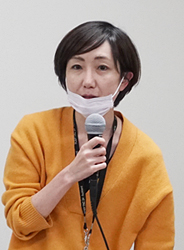
Tokyo Musical Instruments Association held a meeting on February 25 to acquire latest information on new import tax of Japan-U.S. Trade Agreement at a meeting room of Gakki Kaikan (Japan’s music products industry members headquarters), Tokyo. A total of 36 members took part from Tokyo Musical Instruments Manufacturers’ Association and Eastern Japan Musical Instruments Distributors Association.
Ms. Kazuyo Aoki, an expert of Economic Partnership Division, The Ministry of Economy, Trade and Industry (photo) explained the proceedings of the agreement, which an official announcement came on September 25 last year.
As to musical instruments made in Japan, 1.7% import duty levied on upright and grand pianos in the first year will be abolished in the second year. Also, 1.9% import duty applied to brass instruments in the first year will be abolished in the second year.
On the other hand, 2.7% import duty imposed to electronic keyboard in the first year will be kept unchanged in the second year.
2% import duty on other musical instruments in the first year will be abolished in the second year.
Woodwind instruments, accordions and instruments parts & accessories will be imported free of import tax in and after the first year.
The new import tax took effect on January 1, 2020.
Yamaha and Kawai Support Children Staying Home Because of the Epidemic
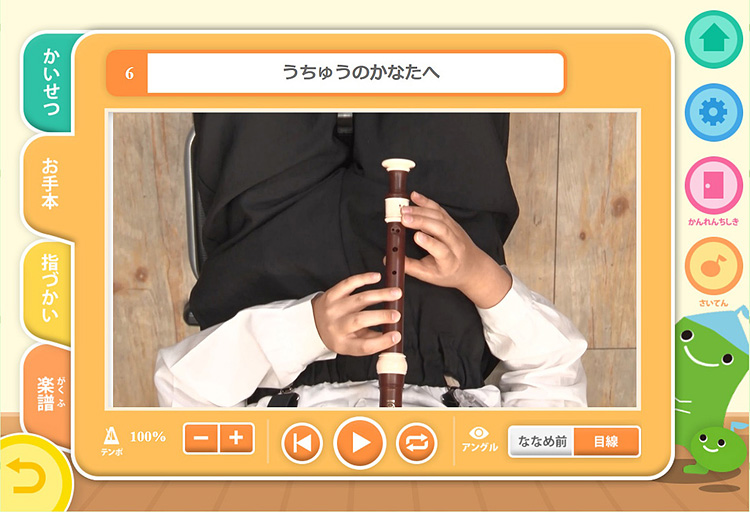
Yamaha now offers Smart Education System, a digital music teaching material of soprano recorder lesson for elementary school children, and alto recorder lesson for junior high school students free of charge in support of children staying home due to temporary shut-down of public schools. (photo right top)
They are designed to support learning to play soprano and alto recorders with rich instruction videos combined with effective practice function.
Children and students can access to Yamaha website, https://ses.yamaha.com/special/gift-digital/ to enjoy the lessons without user registration.
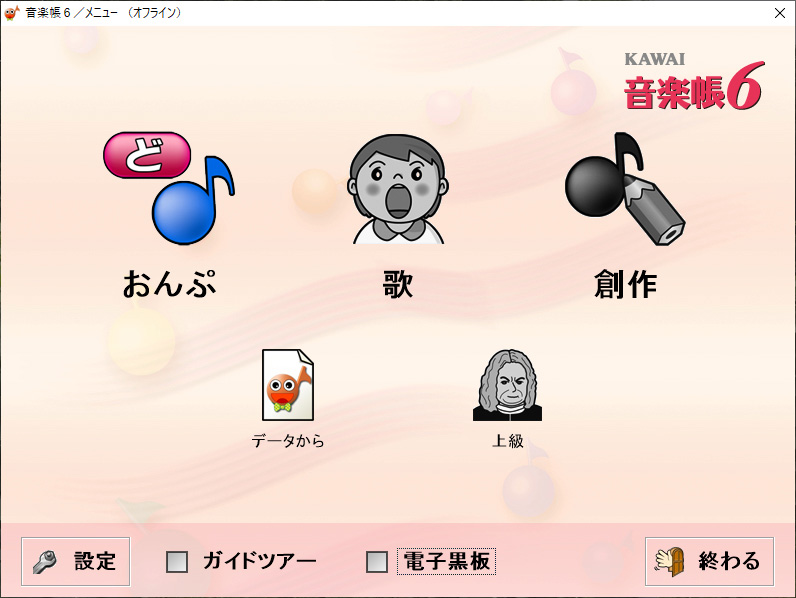
Kawai is offering Study of Notes, music education software for school, free of charge, for children and entry-level musicians staying and studying home under the coronavirus-related government regulations. (photo right bottom)
The software instructs reading and writing notes, principles of pitch and length of notes, etc. in pleasurable lecture.
Yamano Music Leases 3 Sales Floors to KDDI

Yamano Music recently announced that the company had reached an agreement with KDDI to lease basement, first and second floors of its main store in Ginza Tokyo.
The 7-story building had mainly CDs on the 1st floor, but the company moved them to upper floors in the summer of 2019 as CD market has been stagnant for long. KDDI plans to open Ginza 456 concept store this summer using the 3 floors.
Yamano Music expects the lease will contribute to increase not only store traffic but also generate synergy effect in the Tokyo’s luxurious shopping district by organizing attractive events in collaboration of the two companies.
How Much Is The Coronavirus Affecting The Music Products Industry?
Since the coronavirus first emerged in Wuhan, China last year end, the highly infectious disease has spread throughout the world in astonishing speed. China sealed off the entire city of Wohan on January 23, but the confirmed cases and death toll rise up day by day. Without any workable medicine and vaccine, the world now confronts hard battle with the harmful disease.
As a result of strict migration control by Chinese government in the epicenter, great parts of economic activities from manufacturing to distribution have halted in one of the largest industrial cities. Just last week, Chinese government announced that the country has gained control over the deadly virus. However, the rest of the world, contaminated and in panic, is unable to see any sign to get back to normal life they have had before.
Japan Music Trades sent a questionnaire by E-mail or fax to 92 manufacturers, distributors and retailers throughout Japan in between February 10 through 18 to know present conditions and how we can cope with the unprecedented difficulties. A total of 56 companies cordially responded to our request. Here is what we have found.
Your business relationship with China
38 companies or about 70% of the respondents are involved in import of some kind of music products and parts from China. They are 33 manufacturers who make products in China at their own factories or with local partners, or OEM base, 22 exporters and 38 importers, 7 companies don’t have direct business relations with China, and 2 companies import materials for production from China. 7 companies are involved in production and import business, and another 7 companies engage in production, import and export businesses.
Current influences in doing business with China
While the responded manufacturers, importers & exporters, and retailers selling Chinese made products reported that their business is not much affected, 32 companies reported some impact on import from China.
4 companies stopped production in China. Many anticipated further slowdown of production in coming weeks as factory workers haven’t returned from new year holidays for fear of the virus.
As of the middle of February, there is not much impact for export to China, but they foresee retail sales decline in China, and more difficulties if delay in customs clearance continues. They also reported cases of unsettled payment.
7 companies reported delay of ordered products. Japanese retailers and manufacturers are increasingly alerted for import from China as shipment of finished products and materials for production delays may cause shortage of inventory at retailers and affect production plans in Japan. (Orders placed before the New Year holidays have been already filled. So far, business goes on with the present inventory in stock.)
6 retailers reported sales down caused by restriction of overseas vacation tours by Chinese government. They worry that it would bring negative impact to Japanese economy. They also concern shortage of inventory in case the Chinese factories remain out of operation and transportation system deterred after March.
How much do you think Japanese music products business will be affected from the present conditions?
. Distribution and sales will deteriorate without products made in China, inexpensive items in particular.
. As China is the fast growing market, companies relying large percent of business on China may be hard hit.
. Chinese products have dominant position in the world market. Factories stop operation in the country, world-wide industries will suffer from unstable supply of products from China.
. Chinese tourists are the largest customer group in the Japanese retail market, and products supply much relies on China. It’s possible that the industry is affected harder than now if the present conditions continue in months.
. Even after we return normal conditions, like other industries, music products industry may accelerate plans to transfer production sites from China to other countries and areas.
Our thanks to the 57 companies responded to our request for the questionnaire.
Aoyama Harp Co., Arai & Co., Inc., Atelier Z Guitar Works, ATV Corporation, Buffet Group Japan Ltd., Bunkyo Gakki Co., Ltd., Canopus Co., Ltd., Casio Computer Co., Ltd., Central Musical Instruments Co., Ltd., DCT Japan Co., Ltd., Devisor Co., Ltd., Duplex Co., Ltd., ESP Co., Ltd., Free The Tone, Ltd, Freedom Custom Guitar Research, Ginza Jujiya Co., Ltd., Hook Up Inc., Hosco Inc., Itoshin Musical Inc., Kanda Shoka Corporation, Kawai Musical Instruments Mfg. Co., Ltd., Kikutani Music Co., Ltd., Kiwaya Co., Ltd., Kokusai Gakki Sha, Ltd., Komaki Tsu-sho Co., Ltd., Korg Inc., T. Kurosawa & Co., Ltd., Mac Corp., Miki Gakki Co., Ltd., Miyazawa Flutes Mfg. Co., Ltd., Miyachi Shokai Co., Ltd., Muramatsu Flute Mfg. Co., Ltd., Morizono Import & Export Co., Ltd., Moridaira Musical Instrs. Co., Ltd., Nakabayashi Boeki Co., Ltd., Nakano Co., Ltd., Nice International, Niimi Gakki Co., Ltd., Nonaka Boeki Co., Ltd., NOMIX Co., Ltd., Ohashi Industry Co., Ltd., Pearl Musical Insts. Co., Ltd., Prima Gakki Co., Ltd., Roland Corporation, Shecter Corp., Shimamura Music, Shirakawa Sogyo Co., Ltd., S.I.E., Steinway & Sons Japan, Ltd., Takamine Gakki Co., Ltd., TMC Co., Ltd., Taurus Corp., Tombo Musical Instr. Co., Ltd., Yamano Music Co., Ltd., Yamaha Corporation, Yanagisawa Wind Instrument Inc.
2019 Music Products Retail Market Survey
It seems that the largest concerns for retailers in Japan in 2019 were hike of consumption tax, which is complicated with different rates applied depending on conditions and commodities, and up to 5% pay back system of consumption tax on purchases under the Government-funded cashless payment promotional program. It’s understandable that considerable number of retailers got discomposed to handle these issues.
The consumption tax hike was much smaller and less influential compared to the last time 5 years ago. Accordingly, it didn’t generate last minute sales as expected in general, and sales dip thereafter hit the retail market.
However, the real problem for industries was economic slowdown caused by a series of devastating natural disasters and U.S.-China trade conflicts. Uncertainty in social issues, in particular pension plans affected not only retired senior citizens but also younger generations of thier discretionary spending on luxuries including musical instruments.
Japan hosts Olympic Games this coming summer, and industries are much expecting broad effects they may bring out. However, no one can tell how much the event helps grow business of music products industry. Also, it’s the year that we organize biennial Musical Instruments Fair Japan in Tokyo. We hope all these important events 6 months ahead will bring the industry great opportunities for success and growth.
Japan Music Trades carried out an annual music retail market survey sending a questionnaire to 150 music retailers throughout the country. A total of 107 stores responded. We appreciate very much the cooperation of the music retailers kindly helped us to gauge the pulse of music products retail market.
More than half retailers foretell business slowdown in 2020
As to the 2019 business, 33 retailers reported growth, while 53 retailers replied sales down, and 18 retailers commented no change in their performance.
The retailers reported declined sales of grand and upright pianos, wind instruments, electric guitars, amps and down trend of music school operation for children. No retailers reported items with increased sales.
Presumably reflecting negative view for this year, they just listed acoustic guitars, ukuleles and music school operation for adults as most expectable.
In recognition of limited effects of maximum of 5% cash back campaign on cashless purchases which comes to an end in June, and benefits of tourism generated by Olympic Games is just felt by limited areas, Japanese government announced 1.32 billion yen economic stimulus package, and it will be augmented with additional commercial funding to be a 2.6 billion yen package in total.
Aside from these positive external conditions, it’s obvious that music products industry needs extensive self-help efforts. As part of soliciting music making activities to elderly people, Japan Musical Instruments Association has been promoting “Benefits of Keeping Healthy Brain” project for some time. According to recent research works, music making helps prevent people from dementia and maintain physically and mentally healthy life.
Senior market is apparently important for the industry, but at the same time we should take note that number of newborn children declined under 900,000 level in Japan last year that is 1 third of about 70 years ago.
Coping this quickly aging society, the industry requires upgraded and consistent efforts to provide people of all age groups with much more sophisticated and detailed approaches to advocate benefit of music making, and rich applications and solutions matched to any requirements and stage of their life.
Japan-U.S. Trade Agreement Enforced
Japan and U.S reached agreement on trade and digital trade October 7 in White House, Washington D.C, and it took effect Jan. 1 this year.
U.S import tax on Japanese origin upright pianos, grand pianos, brass and woodwind instruments, large keyboard instruments, accordions, electronic keyboards, other electronic musical instruments, parts & accessories is now reduced. Bowed instruments including violins, guitars and percussion instruments are excluded from the agreement.
Tokyo Musical Instruments Manufacturers’ Association gives a briefing for the industry members inviting a specialist from Ministry of Economy, Trade and Industry at Gakki Kaikan, Tokyo on Feb. 25. The briefing will also be held in Central and Western Japan districts.
Yamaha Refurbishes Flagship Retail Store in Ginza
Yamaha Music Retailing, recently announced a plan to refurbish limited floors of its main store building in Ginza, Tokyo. The ground floor and 1st and 2nd basement floors will be tentatively closed from March 2 to July.
After March 2, sales space for guitars, drums and digital musical instruments on the 1st basement will move to 4th floor. Digital piano and Electones on the 1st floor will be relocated on 5th floor, and CDs, DVDs, printed music and music books on the ground floor will be found on 3rd floor.
1st Tokyo Effects Pedal Summit
Presented to transmit information and promote communication among effects pedal manufacturers, boutique builders and media, 36 exhibitors took part in the first Tokyo Effects Pedal Summit to introduce 100 brands pedal effects on November 23 and 24 at ESP Entertainment Tokyo. Total attendance was 1,100 for the two days.
Along with broad selection of new and best seller effects pedals on display, the visitors were invited to educational and talk sessions including “Early Days of Effect Pedals: When Uni-Vibe Was Developed” by Fumio Mieda, Korg auditor, known as the designer of Uni-Vibe.
While the visitors were allowed to experience the sound of effects pedals on exhibit through headphone, special sound control room was provided to meet the demands of over 100 effects pedal mania to examine sound directly delivered from the individual units.
500 visitors were busy collecting stamps provided at each exhibitor booth to win attractive gift items including effects pedals by lottery draw. They stayed at the site far longer time than this kind of events. The exhibitors positively evaluated the event that it contributed to sales of 2.25 million yen in total and increased brand awareness.
The 2nd session of Effect Pedal Summit is planned in conjunction with 2020 Musical Instruments Fair Japan in October.
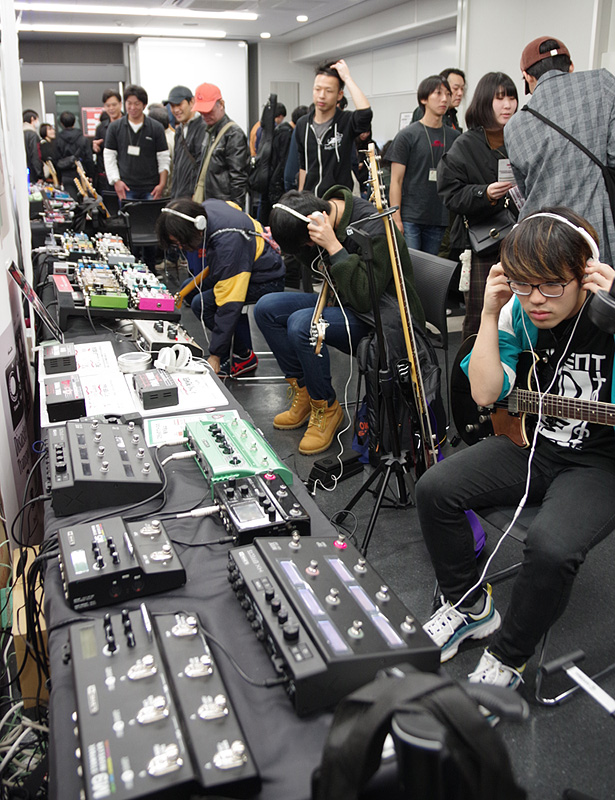

Electronic Musical Instruments Exhibition: 100 Years History
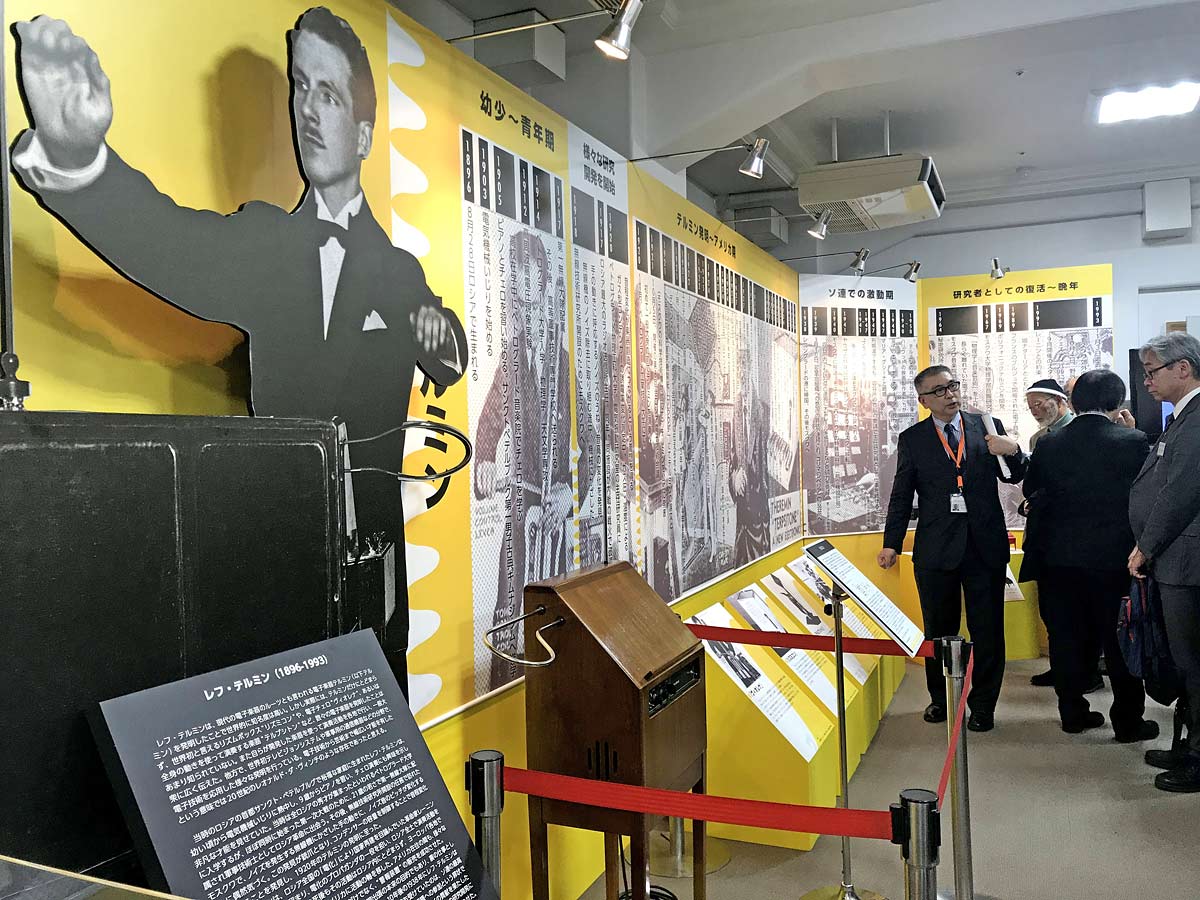
Termen, which is recognized as the first electronic musical instrument was invented by Dr. Lev Termen, Russia in 1920. In the ensuing 100 years, electronic musical instrument has dramatically progressed scientifically and artistically. National Science Museum in Tokyo and Kakehashi Foundation co-staged a special exhibition putting the 100 years history of electronic musical instrument into spotlight from Dec. 3 through 15 in support of Music Dept., Tokyo University of Fine Arts and Music, Takarazuka City, Tezuka productions, Japan Musical Instruments Association, Association of Musical Electronics Industry and music products manufacturers.
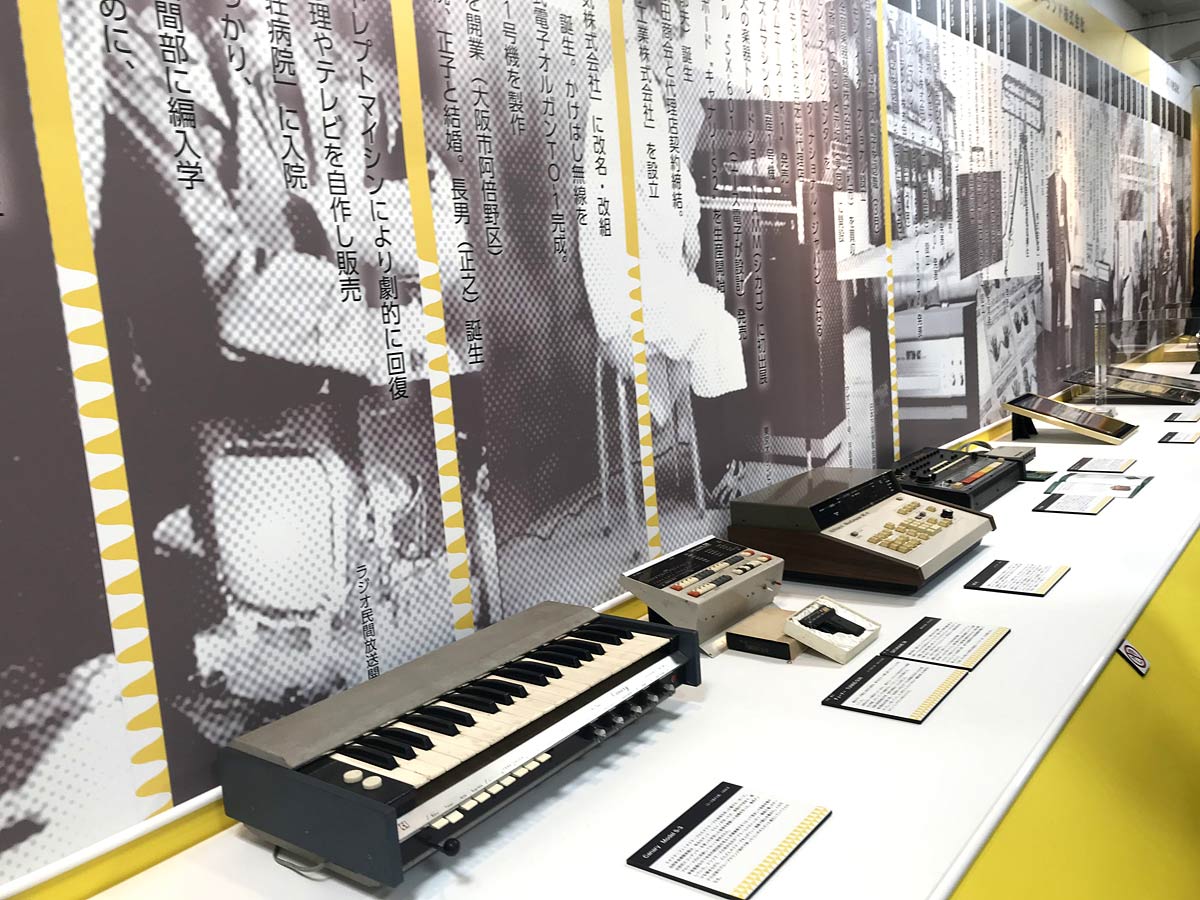
The program included earlier products exhibition, seminars, hands-on experience and concerts. The visitors confirmed great contribution and footstep in development of electronic music of Dr. Termen, Isao Tomita, composer, who devoted his life to electronic music, and Ikutaro Kakehashi, inventor of MIDI, founder of Roland Corp. and pioneer of electronic musical instruments, with the exhibition of original scores, a Grammy Award trophy and other memorabilia. (photos right: Legendary Roland instruments, and Isao Tomita’s original hand-written scores.)
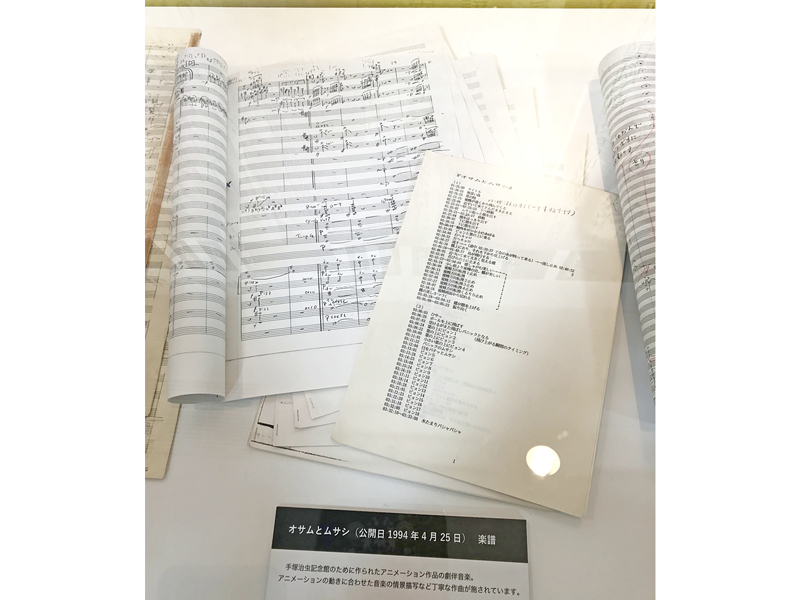
During the 1st week, it presented a consolidated work of Tomita’s surround sound, image and lighting combined with vocaloid keyboard, A-Frame and other cutting edge electronic musical instruments at the main hall atrium.
In addition to workshops of Termen and LittleBits, it provided a special admission free concert using electronic musical instruments and a modular synthesizer at The Tokyo University of Fine Arts and Music Hall.
The event drew a total of 37,635 visitors to the exhibition and concerts, and 1,100 for the seminars.
Casiotone Returns After 40 Years Break
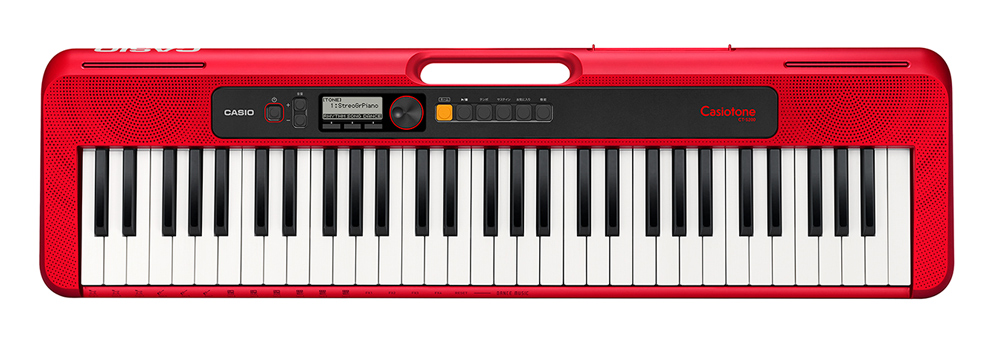
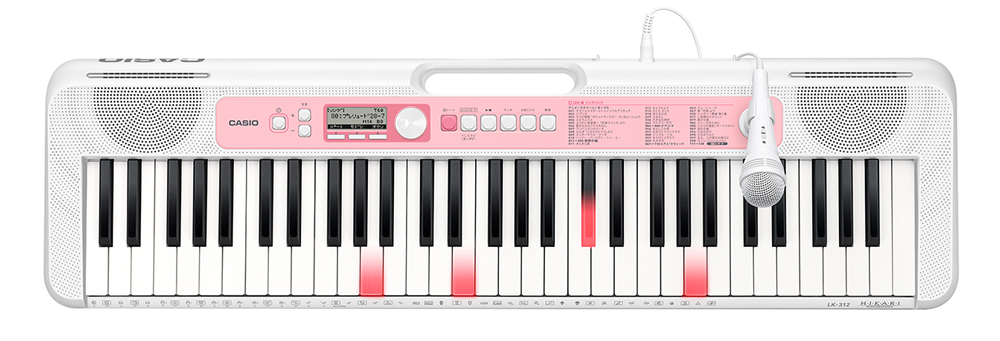
Casio has recently revived Casiotone brand, with which the company got involved in the music products industry and launched first compact electronic keyboard line 40 years ago. The new Casiotone comes in two models of CT-S200 and LK-312. Japan Music Trades interviewed with Takao Matsuda, manager of Music Pruducts Business Unit to have him talk on the new Casiotones and the revival story. (photos above: Casiotone CT-S200, left, and LK-312)
Casiotone 201 came into the market in 1980 as the initial electronic keyboard from Casio. With speakers and rich tonal voices built into a compact chasis, and attractively priced, it made an instant success as one of the pioneer electronic keyboards.
In the ensuing years, Casio expanded the line introducing innovative models including those with built-in automatic backing system and light-guided key function. After 1990, Casiotone brand disappeared from the market. They contributed to broaden the market of electronic keyboard from children to adults.
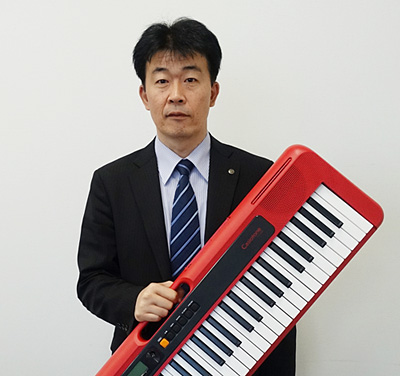
Matsuda says,“Keyboard instruments dominate educational market and live stage performance. The target market for new CT-S200 and LK-312 is young entry-level players. Going back to the original concept of Casiotone, which was to promote music making among broader walks of people regardless of musical experience, we set out our goal to develop new instruments to be played anytime and anyplace in superior tonal quality and style matched to the needs of individual players under Casiotone brand.”
CT-S200 and LK-312 are compact, and 3kg lightweight models with a grip cut out on top to be carried easily. Rich functions are hidden behind fewer buttons to realize simple operation for entry-level players.
Matsuda continued,“School music and music teaching laboratory are traditionally main market for entry level electronic keyboards, but we expect teen agers as core customer for the two models, CT-S200 in particular. We want to tap experienced students who once took piano lesson when young but abandoned for various reasons in the course they grew up. If we can stimulate their interest in music playing again, additional music makers will be created and the market expands. CT-S200 comes in inviting design and color finishes of black, red and white.”
While old users of original Casiotone keyboards appreciate return of the brand and new models introduced. Matsuda concluded, “They are accepted better than we expected, and we hope these new models inspire the experienced musicians. As demands grow, we can meet their upgraded requirement adding advanced models. Some upper class models will follow soon.
2020 Musical Instruments Fair Japan Takes Place in October
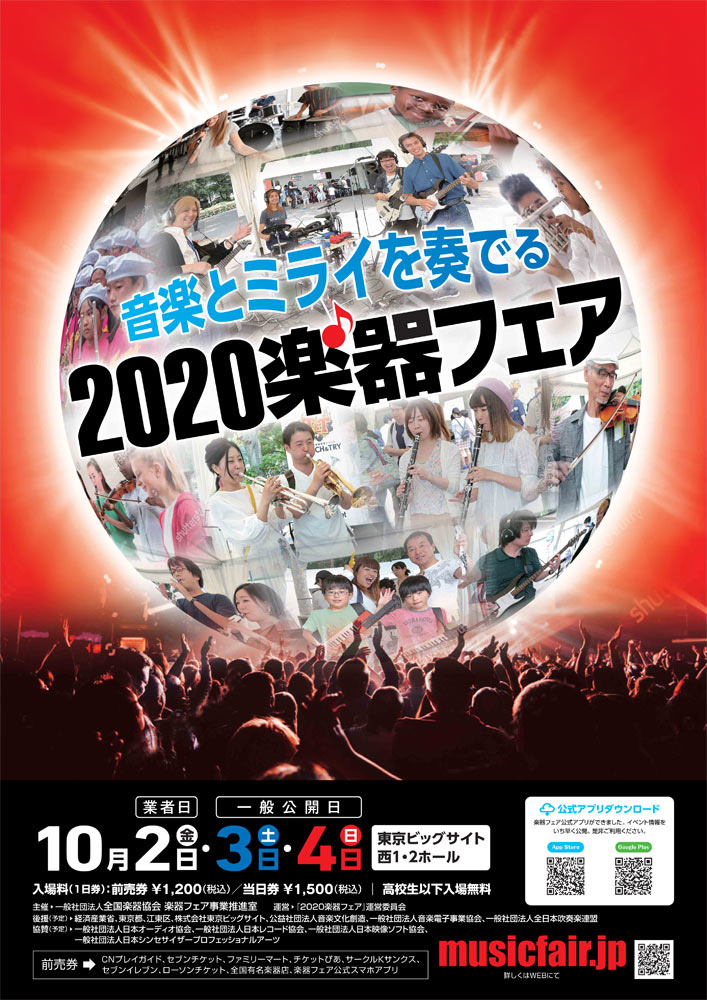
Japan Musical Instruments Association (JMIA) hosts 2020 Musical Instruments Fair Japan, a biennial consumer music products exhibition from October 2 (Fri.) through 4 (Sun.) at Tokyo Big Sight. The 2020 session will be first organized by Japan Musical Instruments Association, which has 474 members from music products industry in Japan.
JMIA staged the first meeting announcing regulations and guidelines of the event in Tokyo on November 22 (Fri.) with a total attendance of 250 prospective exhibitors and related industry members.
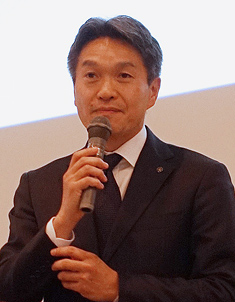
Masato Oshiki, director of JMIA (photo right) delivered an opening message, “We see increasing number of consumers shop online these days, and they are missing opportunities to touch and experience musical instruments themselves at brick and mortar stores. Musical Instruments Fair Japan provides every visitor with music playing experience using myriad of newest attractive products, enjoy music performance, hands-on, and a meeting place for music makers regardless of performance level and genre as well as a host of targeted seminars for business. ”
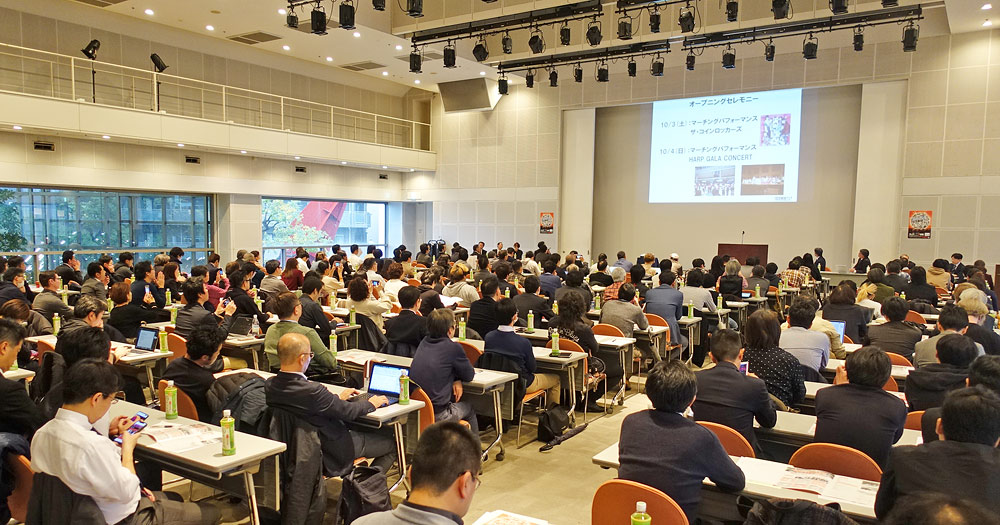
The 2020 Fair will further explore hands-on sessions encouraging first time music makers to experience versatile musical instruments. The 2018 Fair successfully attracted 1,500 visitors to the seamlessly staged free instrumental lessons.
In addition to intensified pre-fair promotional activities by means of SNS to young generations, the 2020 Fair upgrades musical events inviting guest musicians widely supported by children, junior and senior high school students, students marching bands and symphonic orchestras.
It also sets a business day again in the first day afternoon providing the manufacturers/distributors and dealers with business contacts and sales opportunities.
For the first time in its history, the organizer plans registration badges easily identified of holders’ main interest by the exhibitors.
Steinway Showcases Black Diamond Model
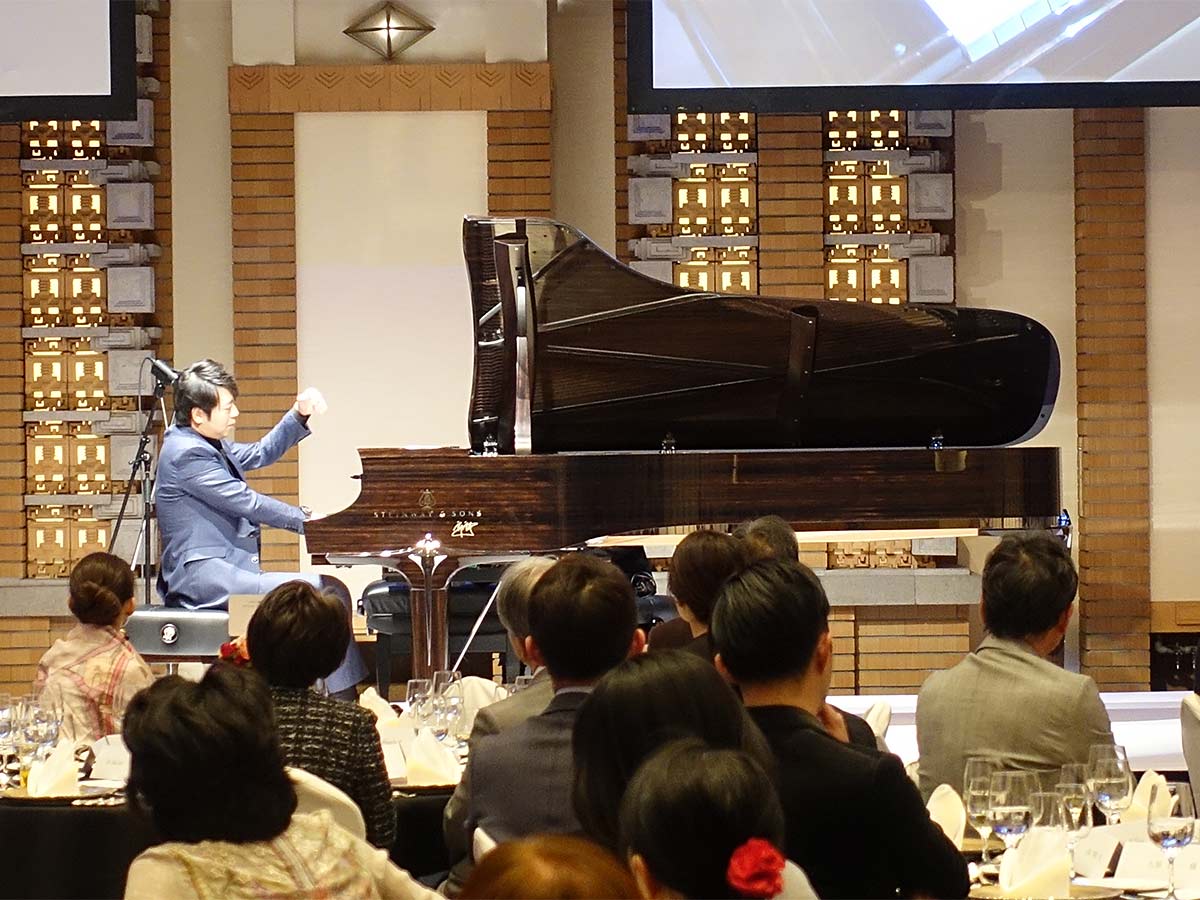
Steinway Japan held ‘Lang Lang Plays Black Diamond’ event at Imperial Hotel, Tokyo on Nov. 21 to publicize Black Diamond models incorporating SPIRIO r automatic playing/recording system inviting 80 Steinway pianists and press members.
Black Diamond pianos were born in collaboration between Lang Lang, Steinway artist, and world-class furniture designer Dakota Jackson. They explained the image of Black Diamond likened to the phenomenon developed by explosion of supernova as it generates authentic exquisite sound with the first touch of a single key, instantly came into them while they talked vis-a-vis and shared music together.
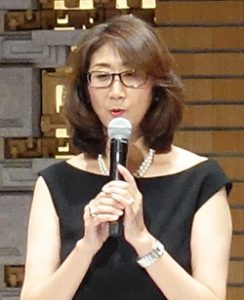
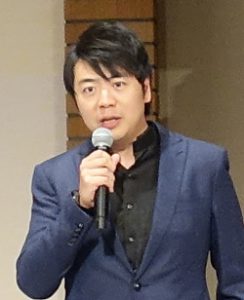
To this day Dakota Jackson has designed 3 special Steinway pianos including the emblematic model built in celebration of 300 years history of piano in 2000 as his first collaborative work with Steinway & Sons, and later in 2014, Arabesque, the 160 years anniversary model of the piano maker.
Steinway Japan unveiled SPIRIO top-notch automatic playback system last year. Black Diamond comes with SPIRIO r, an upgraded system with recording capability. Distribution of SPRIO r unit is planned early next year. (photos: Lang Lang and Yuriko Akiyama, president, Steinway Japan)
Lang Lang commented after the performance, “Black Diamond is not only stunningly beautiful but also has overwhelming tonal quality created by state-of-the-art technology. I have listened to some pieces of the music library and felt extraordinary level of sound authenticity just as the pianist actually performs beside me. Playing back my performance, it was exactly I play in every way.”
Black Diamond Model D concert grand
World Distribution: 8 units
Macassar ebony finish
Black Diamond Model B
World Distribution: 88 units
Choice of ebony or Macassar ebony finish
All Black Diamond models come with an exclusive SPIRIO Play List performed by Lang Lang as well as more than 3,600 pieces played by world famous Steinway artists, and recorded only to be played back on Black Diamond, and iPad Pro.
2019 International Music Day Forum in Hokkaido
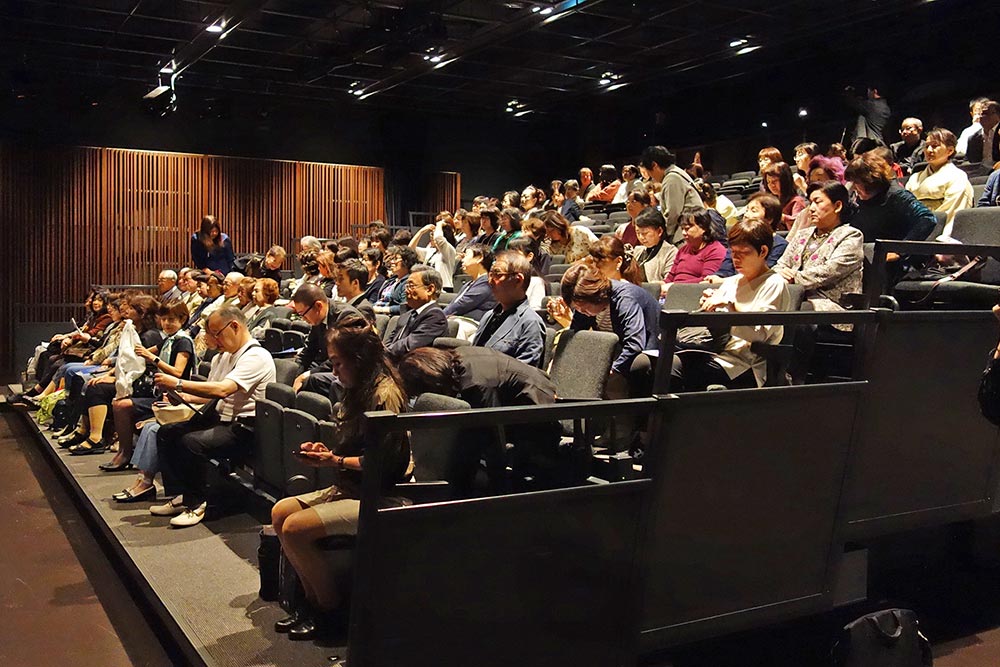
Japan Life-time Music Education Instructors Conference held 2019 International Music Day Forum in Hokkaido-A Gift From Northern Land on September 28 and 29 at Sapporo Community Plaza in association with Ongaku Souzou (Promotion of Music Culture) and support of the Ministry of Culture, Hokkaido Education Committee, Japan Musical Instruments Association, Yamaha Music Japan and Kawai Musical Insts. Mfg.
Consisted of qualified educators authorized by Ongaku Souzou, Japan Life-time Music Education Committee provides and supports music education rooted from individual local culture. It plays a role of a frontrunner for the industry in promotion of music making.
Yoshinori Terada, president of Elm Music in Sapporo says, “Music products industry much owes to music educators, and we must support them as they help us promote music culture and music playing.”
In response to his appeal, Industry associations, manufacturers, distributors and local music dealers including Yamaha Music Foundation, Korg, Sankyo Gakki, Zen-On Music, Prima Gakki and Niimi Gakki joined forces and backed up the event.
With total attendance of 330 educators throughout the country, the first day closed successfully with rich programs including a keynote speech by a freelance TV personality and music performances.
The highlight program of the second day was the seminar titled in “Children’s Songs Inspired by Kodály Zoltán Hungarian composer, educator, psychologist and philosopher” by Ms. Yoko Minami, music educator, a member of International Japan Kodály Association. Kodály is recognized as trailblazer of music educational method. (photos right: Ms. Yoko Minami and the seminar)
She studied in Hungary inspirited by Kodály’s phylosophy, “Music can influence human character-building. That’ s why we need music education.” She talked how music educators can raise children who can understand and appreciate broad types of artistic music by experiencing songs arranged for children in the beginning. Children are best inspired by first encounter with music in early days of education.
Kodály said that it’s critical to raise qualified audience who can appreciate art of music more than raising creators of art.
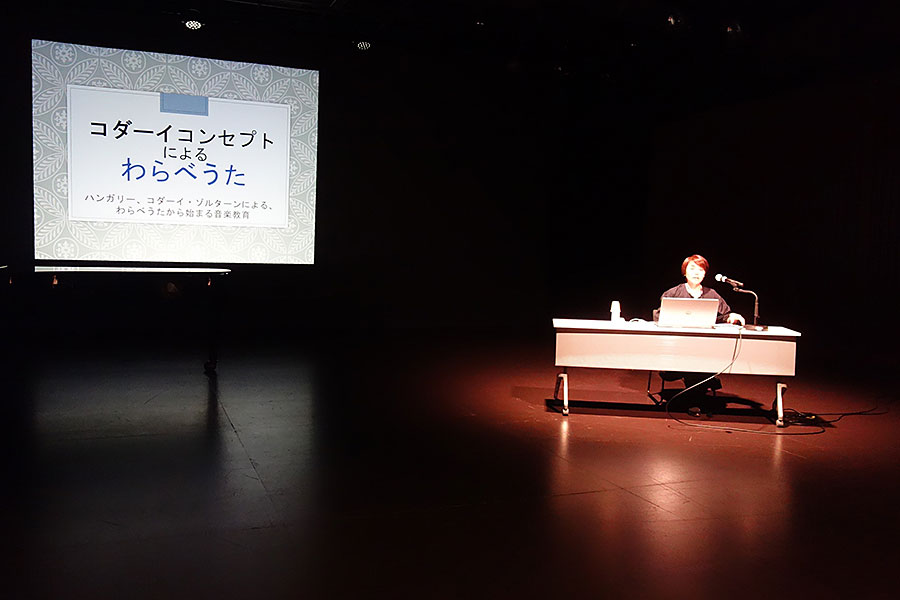
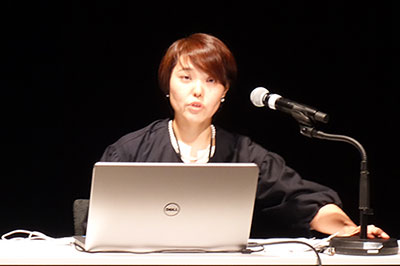
Kawai Celebrates 20th Anniversary of Shigeru Kawai Grand Piano
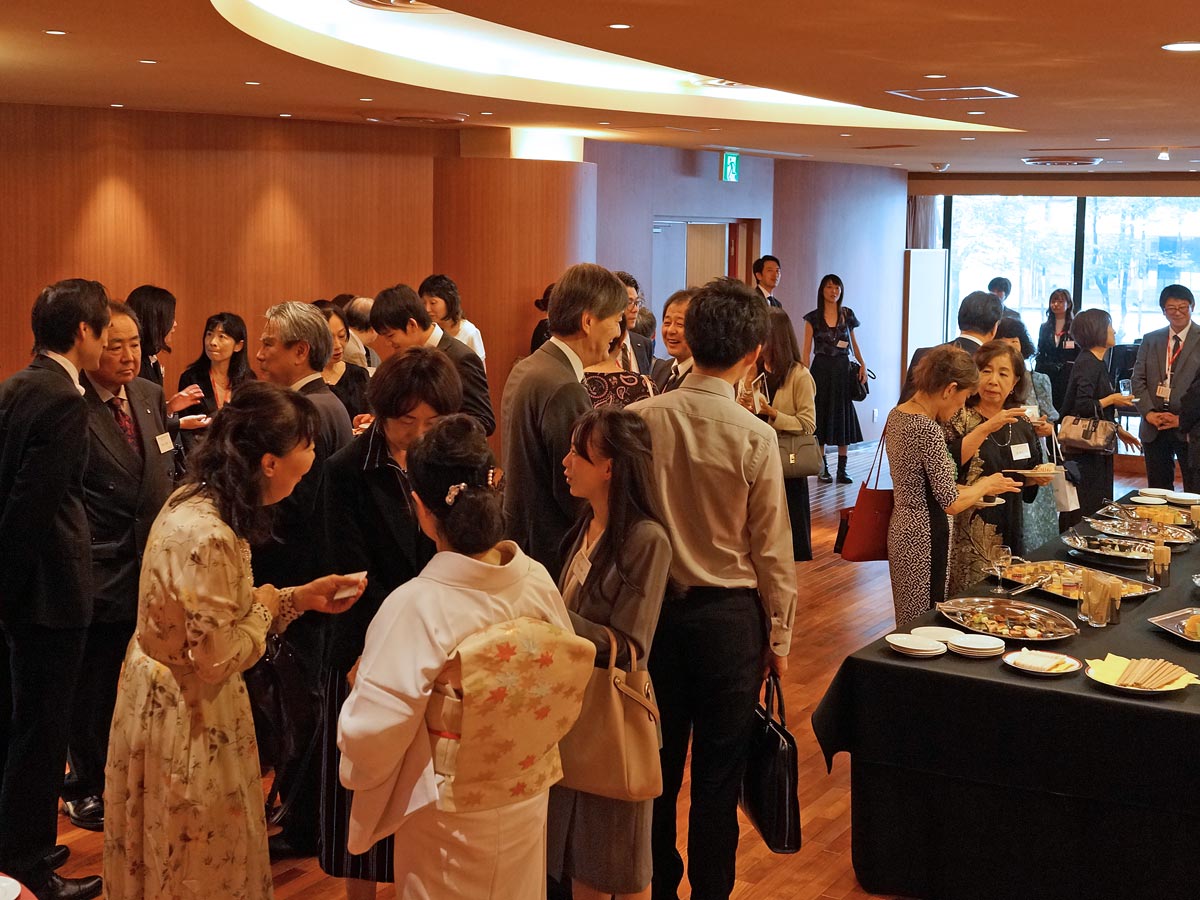
In 1999, Kawai launched Shigeru Kawai grand pianos named after Shigeru Kawai, second generation of Kawai family succeeding his concept to build ‘Most-acclaimed Pianos In The World Markets.’
In celebration of 20 years history of Shigeru Kawai brand, the company held a reception on Sept. 29 at Pause, Kawai Piano Salon, in Omote-sando, Tokyo inviting about 70 piano teachers and technicians.
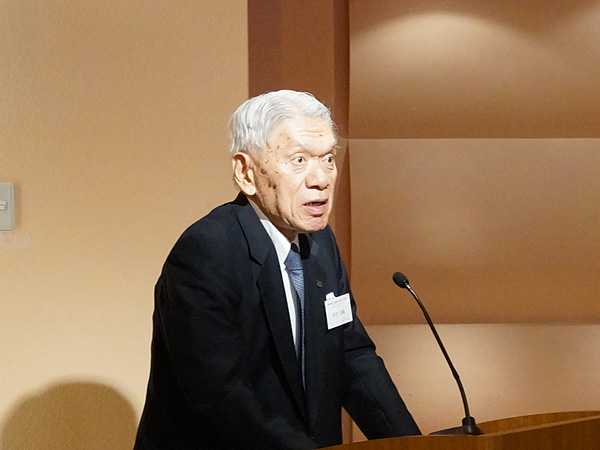
Hirotaka Shigeru, chairman and president of Kawai delivered an opening remark saying, “We are happy to announce today that Shigeru Kawai pianos have established themselves and are widely recognized in the global market. Pianos have a long history dating back 300 years ago after it was first introduced. We at Kawai don’t agree that piano is a technically matured musical instrument. While it inherits legendary, history-proven design concepts and manufacturing technologies, it’s our belief that we can continue developing refined building methods and searching better materials for truly innovative advanced instruments. (photo: Hirotaka Kawai)
“We build Shigeru Kawai pianos meeting the needs of pianists feeding back their comments and requirements today and in the coming years.”
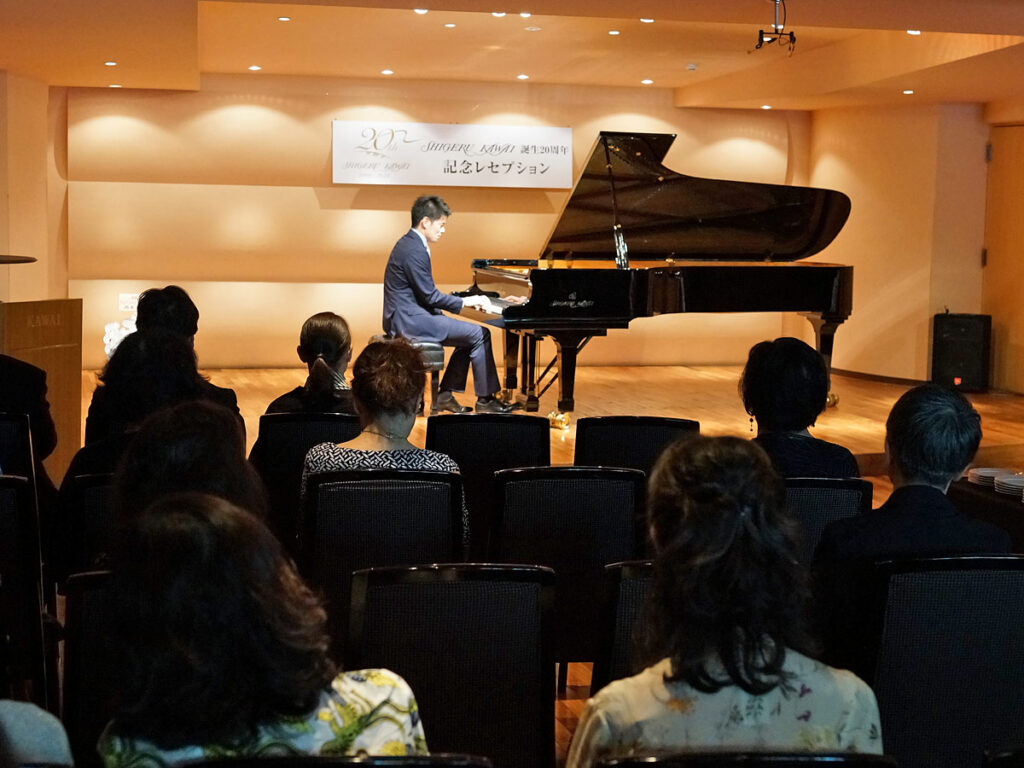
Yutaka Nakao, chief of Shigeru Kawai Piano Laboratory, who is one of the few original product development team 20 years ago told early days of their struggle to satisfy critical technical standards set out for Shigeru Kawai grand pianos including use of every material same as Kawai full concert models, newly developed acrylic action mechanism and allotment of selected technicians for tuning.
After a mini concert by Keisuke Toyama, the guests were invited to a reception where Teruyuki Ito, vice president and Masakazu Kusaka, executive managing director of Kawai greeted them. (photo: Keisuke Toyama delivered a mini concert on SK-EX)
A leaflet telling 20 years of building of Shigeru Kawai pianos was presented to the guests.
Korg Supports Survival of Sakae Drums
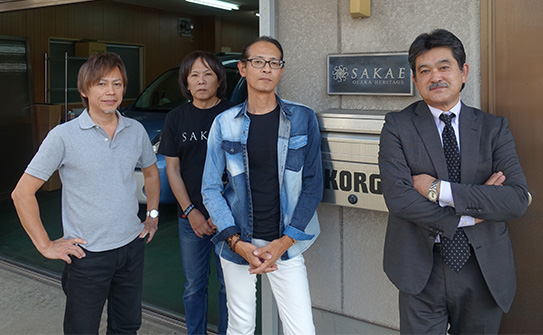
Korg announced launch of SAKAE OSAKA HERITAGE PROJECT BY KORG, a revival plan of Osaka-based legendary drum brand at 2019 NAMM Show. The company showcased cajons and kick pedals as the first lines this fall. Japan Music Trades interviewed with Norio Iwasaki and Shunsaku Tsuji, a driving force of Korg/Drums Project. (photo right: from r. to l., Norio Iwasaki, Shunsaku Tsuji, Masaaki Tawada and Michihiro Tsuchida.)
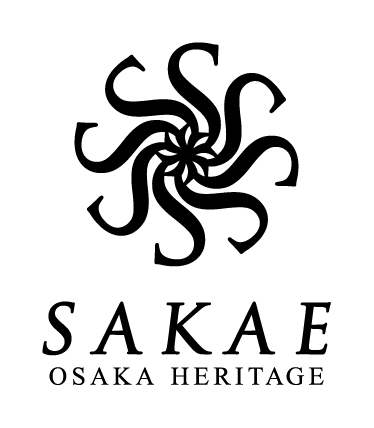
Established in 1925, Sakae Rhythm Gakki was an well-established drums and educational percussion instruments manufacturer in Osaka. For more than 40 years the company had provided world-renowned top brands with drums. In 2009 it ventured into original products manufacturing, and launched drum products under SAKAE Drums. Their expressive sound and high standard of quality instantly won acclaim of Japanese and overseas artists.
In 2017, however, the company ceased operation because of financial difficulty and the SAKAE brand went on the verge of extinction. In 2014, KORG Inc., former domestic distributor of SAKAE Drums took over the trade name and in 2019 launched SAKAE OSAKA HERITAGE PROJECT BY KORG.
Norio Iwasaki says, “Sakae is a legendary maker having over 90 years of history, and has substantial manufacturing know how providing world’s top drum makers with drums in their brands. We didn’t want to see the established brand disappears from the industry. But Korg is an amateur in terms of drum manufacturing. We needed the hands of technical experts of old factory of Sakae. We were lucky to have the present staff joined us. At this moment the project bears the name of Korg, but it’s absolutely the story of Sakae.”
The revival project could have taken off in Tokyo, however, they opened an office in Yodogawa-ku, Osaka, as a tribute to Sakae’s origin and its proud history. Four people are now engaged in management and production of new Sakae products.
Iwasaki explains about manufacturing concept of revived Sakae drums, “We understand that we succeed production of legendary drums. That means we seek innovation in every aspect from shell and parts making to finishes while maintaining high standard of quality of the original products. It’s not simply designing high quality drums. The new Sakae drums should sound perfect in ensemble. Sound making determines tonal characteristics of drums, which can deliver sound well coordinated in session play and performing environment. It takes us long hours and efforts to polish new drums to the level that can satisfy musicians, but we never compromise to accomplish our goal.”
A host of drummers appraised such attitudes and continued to play Sakae instruments. After Sakae ceased operation, Tsuji volunteered to provide over 100 Sakae artists with technical support and maintaining services for nearly 2 years.
The project launched this fall multiple type cajons CAJ-100 and CAJ-100W using thinner plywood materials for increasingly resonant sound as well as Axelandor Single/Double light weight and agile kick pedals.With many new innovative ideas packed, the first lines are attracting attention of music retailers. It’s notable that the cajons follow the same design concept and features of the original models, which Sakae launched right before the closure 2 years ago, and production discontinued shortly.
A new snare drum will be unveiled at the coming NAMM Show, and professional new models and hardware will follow.
About the marketing of new Sakae lines Iwasaki says, “The original products were well received in the Japanese market. We plan to promote their tonal characteristics and high standard of quality. In terms of the global distribution, the drum manufacturers including us seek larger presence and success in the U.S. The Sakae products haven’t yet established themselves there, but we see we have great opportunities and untapped market ahead. Our plan is to increase exposure of Sakae brand in the U.S. market with extensive artists relations and promotional activities.”

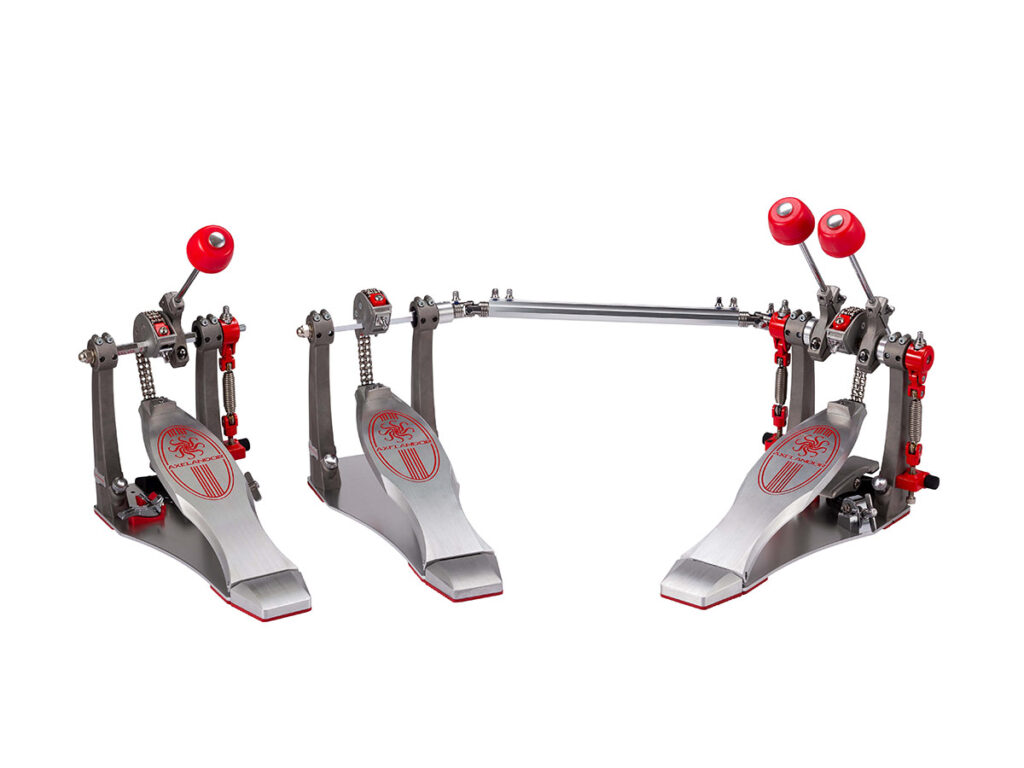
Yamaha and Roland instruments Registered As Technological Heritage
National Museum of Nature and Science, Tokyo selected Yamaha D-1 Electone electronic organ (1959), DX-7 digital synthesizer (1983), YM3526 and YMU757 FM sound generator LSIs (1984), and Roland TR-808 rhythm machine (1980) for Japan’s Leading Historical Technologies (technological heritage).
National Museum of Nature and Science has recognized products made in Japan as a legendary technological achievement, which impacted people’s life, economy, society and culture, and to be remembered by future generations every year since 2008. It’s the first time that musical instruments and related technologies were selected for the heritage. (photos clockwise from top to bottom, Yamaha D-1 Electone, Yamaha DX-7 digital synthesizer, Roland TR-808 rhythm machine, and Yamaha YM3526 and YMU757 FM sound generator LSIs.)
The registration ceremony took place on September 10 at the Japan Pavilion of the Museum.
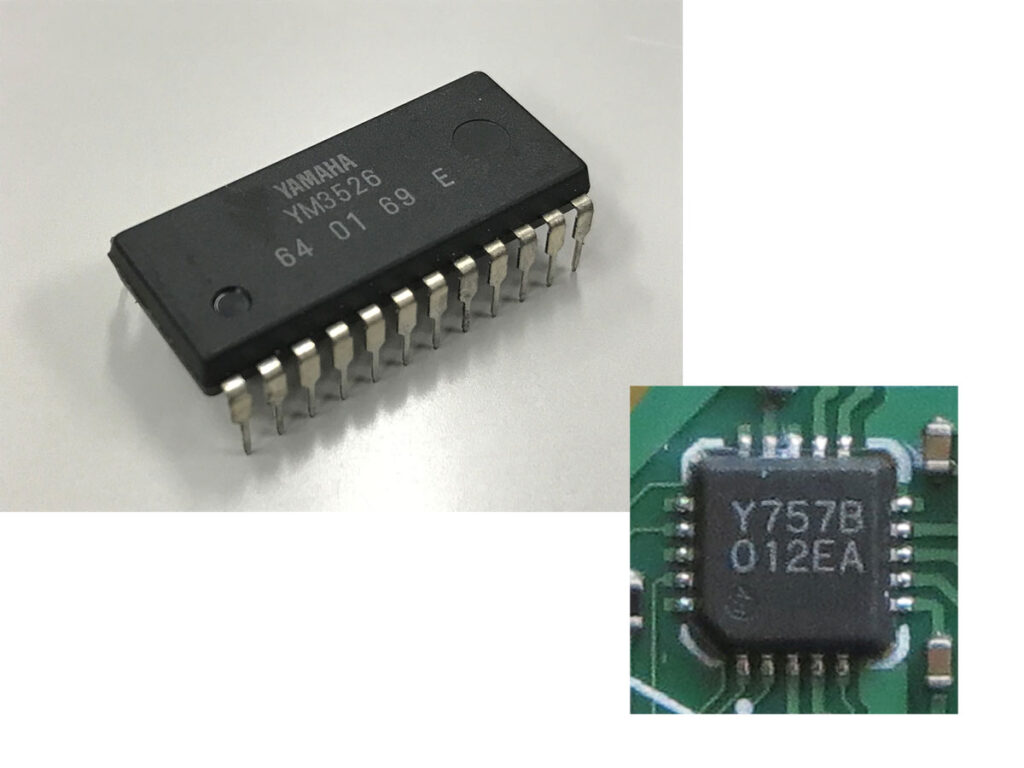
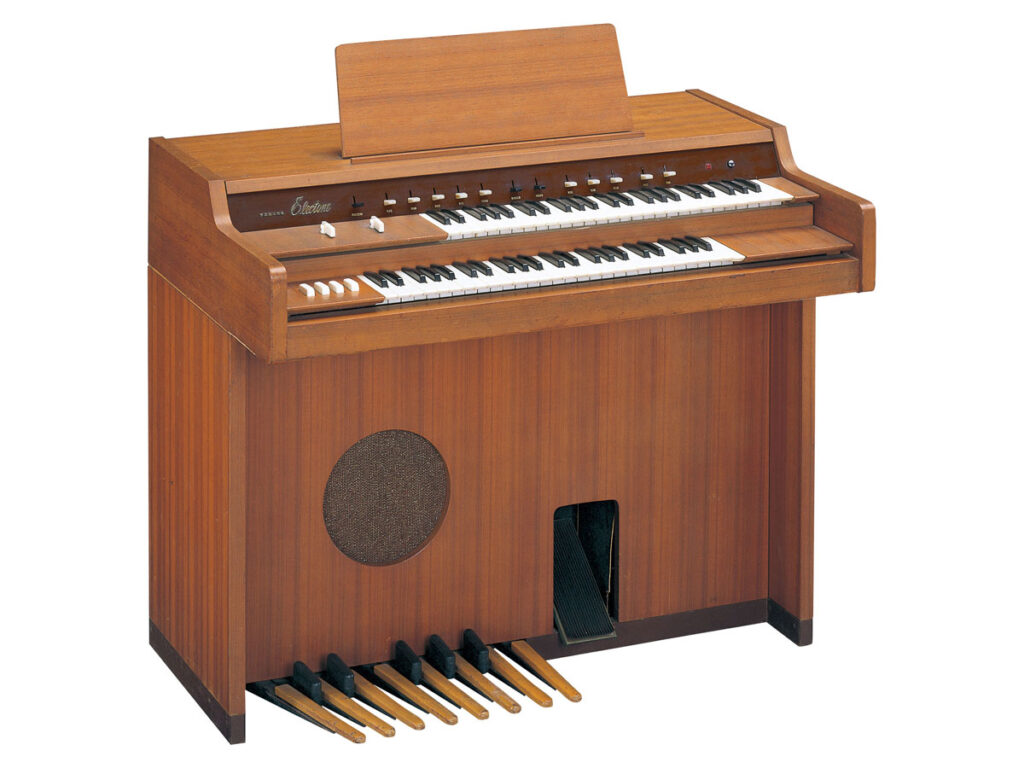
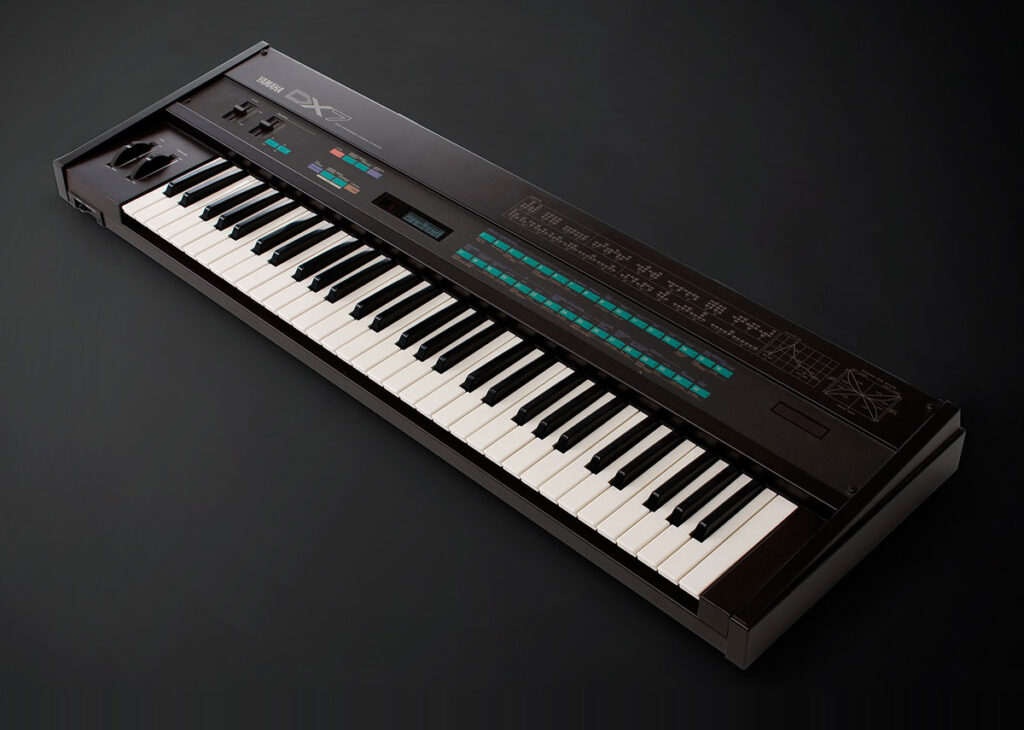

Casio Privia To Be Furnished Into Luxury Hotel Rooms
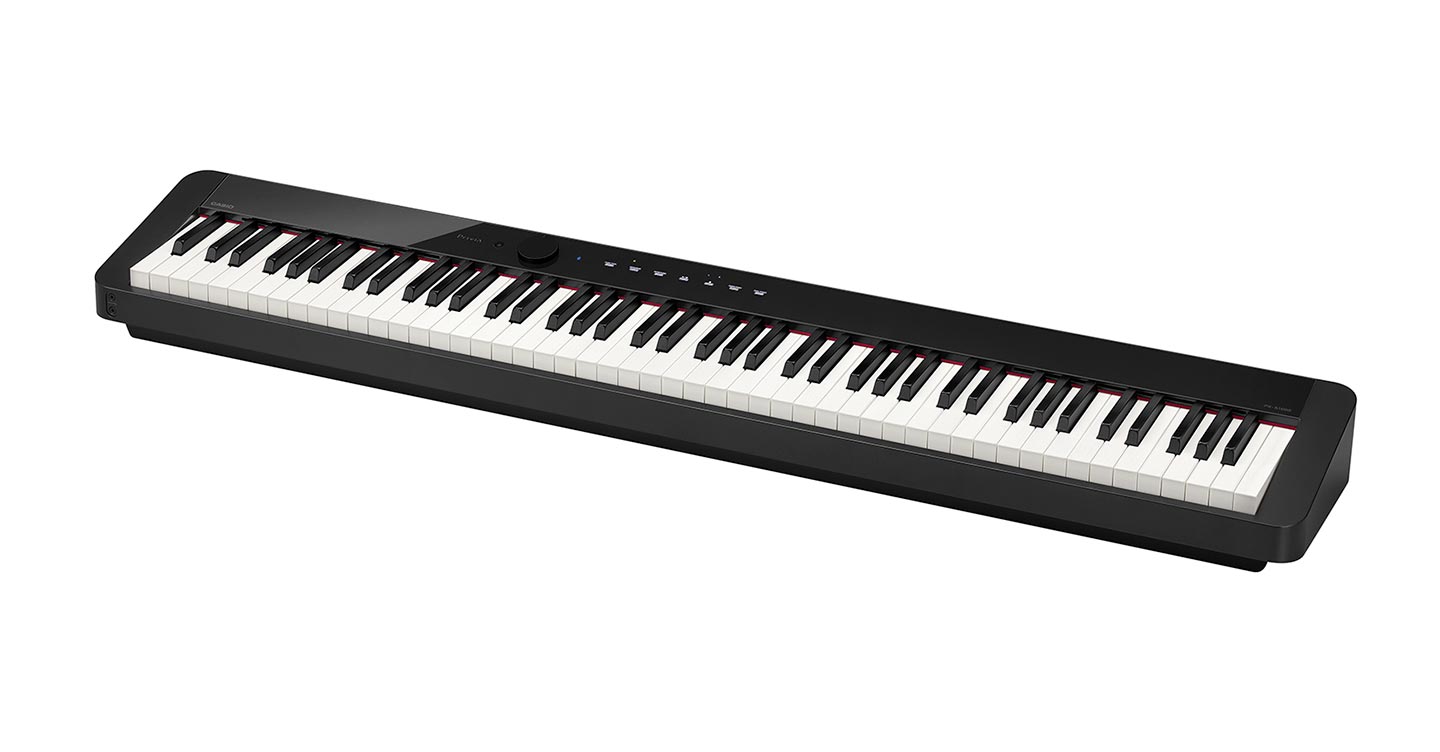
mesm Tokyo, Autograph Collection Hotel which will start operation in April 2020 has decided to furnish Casio Privia PX-S1000BK into all 265 guest rooms.
Located in Takeshiba, Tokyo waterfront, luxury mesm Tokyo hotel aims to provide the guests with fun and exceptional experiences, which inspire human sense. Based on “Japan Quality” as its concept, it plans to collaborate with many different industries to accomplish the goal.

Casio Privia PX-S1000BK is standard to all guest rooms and expected to offer the guests pleasure of music playing in private musical environment. Built most compact among slab style digital pianos, the stylish design, authentic key touch and rich and brilliant sound of PX-S1000BK finely met the requirements of the hotel.
Casio spokesperson commented that the company continues to contribute to the market and expand music players with high-quality instruments.
21 Japanese Companies Take Part in Music China 2019 at Japan Pavilion
Music China 2019 takes place from October 10 through 13 at Shanghai New International Expo Centre. Last year, the event drew 110,000 visitors from 81 countries throughout the world.
In addition to 10 companies staging their own booths, and those represented by China branches and local distributors, 21 companies and industry associations will promote their products at Japan Pavilion set up at 4 halls of E4 for stringed instruments, E5 for music education, W1 for wind instruments and W2 for classical guitars.
A host of forums, seminars and musical events will be offered by NAMM and China Musical Instrument Association during the period.
CITES Rosewood Regulation for Musical Instruments Lifted
At the COP18 convention held from August 17 in Geneva, CITES voted to exclude musical instruments, parts and accessories using rosewood from permission requirement for cross-border shipment. The members voted to revise Annotation 15 regulated 3 years ago.
Importers and exporters of musical instruments and musicians carrying them across national boarders will be freed from preparing documents, but instrument manufacturers will still be required to securing permits for all unfinished imported rosewood logs, boards, and veneers.
The new ruling will be effective on November 26, 90 days after the regulation was officially revised on August 28.
2018 Japan Musical Instruments Industry Surveys Summary
Japan Musical Instruments Association (JMIA) recently completed the 2018 industry survey in relevant to the production and retail sales of musical instruments in Japan from April 1, 2018 to March 31, 2019.
JMIA sent questionnaire to a total of 71 manufacturers and 364 music retailers, and 50 manufacturers and 116 music retailers participated in the survey.
Manufacturers Survey
(Musical instruments production in 2018, 71 manufacturers participated in the survey)
Export of total music products in 2018 decreased 2% in unit over the previous year but increased 4.7% in value to 223.68 billion yen. Also, the domestic sales decreased 4% in unit but increased 8.9% in value to 55.3 billion yen. Increased unit price brought excellent result in value both for export and the domestic sales.
Large keyboard instruments
Looking into product category in detail, the domestic shipment of grand piano went up 3% to 3,375 units, but unit price slightly declined. While, upright piano shipment decreased 3% to 9,344 units though unit price went up marginally. Automatic player pianos performed well, but digital pianos were stagnant with minor decrease in unit. Unit price also went down moderately. The trend has continued since 2017.
Shipment of electronic keyboards with standard-size keys dropped 7% in unit, however, jumped up 40% in value, which suggests grown-up players is expanding in the market. The same goes for electronic keyboards with mini-size keys.
Export of upright and grand pianos, and digital pianos were solid both in unit and value during the year. The manufacturers reported that they had stepped up production in Japan and overseas as well. Export of the electronic keyboards with mini-size keys rose 25% in both unit and value.
Wind and stringed instruments
The woodwind and brass instruments including flutes, piccolos, saxophones, trombones, horns, euphoniums and tubas achieved excellent performance in export both in unit and value. Export of trumpets and cornets decreased in unit but increased in value.
Domestic shipment of flutes, piccolos, clarinets, saxophones, oboes, bassoons and trombones all increased in value. The fact that they failed to meet the 2017 level in unit suggests there were substantial mark up and upgrading to higher models, and growing demands from adult music makers.
Healthy shipment of band instruments is verified by increased import from EU countries. In 2018, Japan imported 14% more band instruments from the area, and their total value increased 12%. One negative trend is that shipment of trumpets and cornets went down 21% in unit, and 15% in value over the previous year. Given that trumpets are one of the most popular brass instruments and known easiness of maintenance when compared with woodwind instruments, good percentage of the instrument may be distributed through mass merchandisers.
Domestic shipment of stringed instruments including violins, celli, violas, double basses and electric violins went down in unit, but went up in value thanks to increased unit price. Other stringed instruments including mandolins, banjos and harps for export advanced more in value than unit. It looks that expensive instruments such as harps contributed to the result.
Percussion instruments
Export of drum kits, single drums, cajons, electronic drum kits and drums gained both in unit and value. Hardware, table-top xylophones, ethnic percussions also showed excellent performance in value.
Domestic shipment of drum kits, hardware, sticks and mallets declined in unit and value. A slight slowdown came in 2018 after having experienced good performance a year before. Domestic shipment of educational percussions including castanets, tambourines, triangles, electronic drum kits and single electronic drums outperformed the results of 2017. In particular, educational percussions increased 25% in unit and 18% in value. It may reflect surging popularity for simple rhythm instruments, which are said to ward off demensia, provide senior citizens with pleasure of music making while contributing to their wellness.
Guitars and related products
Export of acoustic and electric guitars, electric basses, guitar and bass amps as well as effect processors and tuners maintained positive trend last couple of years. According to the export statistics of The Customs Bureau, The Ministry of Finance, export of electric guitars and basses rose 50% in unit in 2018 with good sales in the U.S. market in particular.
Domestic shipment of electric acoustic guitars, electric guitars & basses, guitar & bass amps also increased. Exceptional shipment of electric guitars & basses brought the industry a dramatic 2.3 times increase in value over the previous year. That may explain extraordinary shipment of high-end models to adult experienced guitarists provided by some manufacturers.
Digital musical instruments
Keyboard synthesizers and other digital musical instruments including digital wind instruments showed steady growth in both domestic market and export. Japanese consumer is more inclined to advanced models of keyboard synthesizers. Portable digital recorders also achieved excellent shipment in the domestic market and export.
It’s apparent that Japanese manufacturers of acoustic pianos, digital pianos, synthesizers and guitars are increasingly moving production sites overseas these recent years.
Music Retailers Survey (116 retailers participated)
Pianos (including acoustic pianos, digital pianos, automatic player pianos and used pianos)
There was little change in acoustic piano market, but unit price of new and used grand pianos, used upright pianos slightly went up. On the contrary, unit price of new upright pianos, automatic player pianos and digital pianos has moderately declined. Sales of new upright pianos are continuously affected by broader selections of digital pianos and used models. Advent of new products featuring light weight and compact structure in attractive price forced to reduce average unit price.
In the long run, large keyboard market may become a bright spot as JMIA is now promoting a massive market development campaign, “Music Playing Revitalizes Your Brain and Leads A Happy Life.” From a host of researches by specialists, music performance has proven to ward off dementia and help keeping good physical and mental conditions of senior citizens.
Organs and portable keyboards
Electronic organ is widely recognized as an educational instrument for children. Thus, sales of organ keep falling as number of school-age children declines. Though there were no remarkable new models put into the market during the year, average unit price of organs rose 30,000 yen to 416,000 yen reflecting popularity of the instruments among the players.
Sales of portable keyboards mildly dropped as a whole, but models with standard-size keys significantly increased both in unit and value. Average unit price rose about 20%. While demands of the instrument are in downward trend among young families, senior market is moving upward.
Wind and stringed instruments
The market has traditionally a broad and massive customer group from school-age children to adult band members. Number of school-age children is declining and it adversely affects school market, but it’s expected that the entire market will keep its size as the industry will have new customer groups of middle-aged, and senior ex-wind players who have rich musical experience in coming years.
Total sales of the segment surged slightly in unit but declined 3% in value. Unit price of flutes/piccolos, clarinets, saxophones and trombones rose partly due to mark-up and customer preference for upper grade products.
There is no sign of change for stringed instruments market. Japanese consumer once lost interest in Chinese instruments, but as their quality standard improves, they are increasing their exposure in the Japanese market. Imports from European countries declined only at a moderate level. Demands are stable for fractions, which tell healthy conditions of the market.
Guitars (including acoustic guitars, electric guitars, amps, effect processors and ukuleles)
Total sales of guitars as a group went down about 10% in unit, but increased slightly in value, which indicates rise of unit price.
While sales of new acoustic guitars including electric acoustic guitars slightly declined in unit, they remained unchanged in value. New electric guitars and basses achieved a mild increase with in unit and value. It may suggest in part, growing band activities among teens and young adults in their 20s, and middle-aged and senior.
Used electric guitars and basses sold well, an increase of 4% in unit and 2% in value. The market for used gears looks to be expanding through both existing store distribution network and on the Internet.
Consumer interest continues to shift to more compact and low-priced models for guitar and bass amps. Sales of them leveled off in value, but went down a bit in unit.
Sales of guitar effects processors and tuners declined 4% in unit. Sales of guitar and bass strings deceased 15%, which are largely attributed to bulk purchase on the Internet bypassing brick and mortar retail network.
Backed by continuing interest among music makers, ukulele sales increased 37% in value, and average unit price also went up.
Percussion instruments (including drum kits, marching drums, educational percussions, xylophones, glockenspiels, digital drums, cajons, sticks and hardware)
The segment sales dropped 27% in unit, but rose 2% in value. The drum kits went down about 10% both in unit and value, but snare drums and toms significantly declined by 30% or so in unit and value.
Cymbals, sticks, mallets and digital drums share more than 50% of the segment sales. Sales of digital drum kits which are the largest of the category went up 30% in value, but average unit price slightly diminished. Cymbals rose 10% in value. Sticks and mallets decreased 30% in value.
Though share of the category is relatively small from 3% to 8%, sales of educational percussions, xylophones with legs and glockenspiels with legs showed a significant growth between 200% and 300% in value.
Digital musical instruments (including keyboard synthesizers)
In 2017 sales of keyboard synthesizers were only 3,000 units or so. A year later, they recovered 10,000-plus units again, another record after 2016 both in unit and value. The average unit price of them was yen74,000, but industry experts point that the market is divided into two opposite price points; high-end models and inexpensive entry models.
Other digital musical instruments declined 40% in unit, but kept marginal 10% decline in value. Average unit price went up to yen59,000.
The report doesn’t indicate which kind of digital musical instruments was the market leader, but it’s likely that sound modules for high-end users and integrated sound production systems connected with samplers, sequencers and the like priced between yen50,000 and yen100,000 sold well.
Other small musical instruments (including harmonicas, key harmonicas, accordions, recorders and ocarinas)
Harmonicas, key harmonicas and recorders individually share from 20% to 30% of the total segment sales, 80% in all. They maintained stable business in the year. Because influential number of new retailers participated in this year’s survey, their comments are relatively broadly reflected on this segment.
Sales of recorders were almost flat, but harmonicas increased 37% and key harmonicas, 17%. These instruments much suffer from soft school market as number of school-age children is decreasing year after year. On the other hand, the market is expanding among amateur musicians of young and older generations, who find pleasure in music making again.
Ocarina sales went up 10% both in unit and value as music activities grow in local communities with more adult music makers taking up the instrument.
PA System, recording equipment (including power amps, mixers, speakers, microphones, MTRs, etc.)
Sales of self-contained PA systems, which share 46% of total category doubled over the previous year in value. They achieved excellent sales in unit, and average unit price significantly increased. As retail price of wireless microphones coming down to around yen28,000 level, they are a good substitute to cable microphones these days. It resulted in excellent sales of wireless microphones in unit and value.
Market for portable digital recorders was stagnant except for some high-end models during the year as consumer preference shifted to recording apps of smartphones. Sales of the category went down about 20% over the previous year.
Computer music and DJ Hardware (including music production software, peripherals, DJ mixers & controllers, lighting equipment, etc.)
Industry specialists view entry-level digital musical instruments will be substituted by software applications. The industry survey verifies the prospect, and computer music category has outperformed digital musical instruments since 2017.
Influential You Tubers and V Tubers are contributing to explore net streaming market these years, and the trend boosted the sales of music production software and hardware for private use. Sales of related hardware including audio interface and controller slipped down 21% in unit, but jumped 47% in value. Plug-ins and loops also increased from 30% to 40% in unit and value, while recording & sequence software dropped 40%.
Despite rather humble market size, DJ products are gradually expanding among amateur musicians. The category as a whole failed to achieve better sales than previous year, digital DJ controllers continued to grow with a 16% increase in unit.
Printed music
The downward trend continued from last year in unit, but increased 30% in value. As a result, average unit price rose about 40% to yen2,100. It may be led in some part by expensive songs books of name artists like Queen, and scores of hit movie tunes such as Bohemian Rhapsody. We don’t have any reliable source and information what has contributed to raise average unit price to such a high level.
It’s widely said that sales of printed music has been lost 10% annually at retail store, possibly by sales increase on the Internet. Self-teach piano and guitar books are popular among senior customer.
An Interview With Music Retailers:Healthy Ukulele Market
“Ukulele market is healthy and stable today with main customer group of over 30 years old. They come to us looking for our original and exclusive brands including Leilani which Shinji Takahashi, master builder of Seiren Ukuleles builds, G-string and handmade models made by Japanese builders.
“Business is good at all price points from ¥10,000 entry level to expensive high-end level. Some customers often pick up ukuleles priced around ¥800,000 as they are inspired by culture and environment of Hawaii and find ukulele music. On the contrary, professional players tend to avoid extremely expensive instruments to secure safety during transportation and avoid possible accidents on stage.
“Since experienced players already have Kamaka and other name ukuleles, we need upgraded approaches to draw their attention and further explore the market. Rich selection of strings and scores will make difference, I believe. Exotic ukuleles using cherry wood are much popular among customers from abroad.”
(Haruomi Yasuhiro, Ikebe Music Acoustic Station Revole Akihabara, Tokyo)
“We regularly display around 100 ukuleles for all level of players. Entry-level players tend to buy instruments priced around ¥10,000, while students learning playing at music laboratory in town are likely to choose ¥30,000 class instruments. Kamaka and Koaloha ukuleles are much favored by experienced players.
“Our customer base is broad, and female players between 20 and 30 years old are expanding these days. They choose soprano models as first instrument, and buy concert and tenor models next as they progress.
“From my experience as a guitarist from a Hawaiian band, I’m pleased o tell the customers pleasure of Hawaiian ukulele music while explaining features and sound of instruments.
“As part of our promotional activities for local customers, we have organized Choshi Hawaiian Festival every July since 2014. It’s so popular with 10,000 audience take part every time. We hope this kind of fun programs help increase ukulele players and expand the market in other areas as well.”
(Teruo Kobayashi, Ishibashi Music Store Shibuya Store, Tokyo)
“Contrary to stagnant sales of entry models of fretted instruments and drums, first time users dominate the ukulele market. That doesn’t necessarily mean inexpensive models sell most. Rather, not a few first time players opt Kamaka and other premium brands once they hear themselves the sound of those instruments. The recent trend is growing demand for models with built-in pickups as the second gear, or mountable pickup system for their favorite instrument.
“We invite both experienced and first-time ukulele players to our weekly workshop. They enjoy the event which include tuning seminars and performance sessions as well as lectures on Hawaiian culture and history very much as we see it’s crowded to capacity every time. We understand the event to be effective to let them know the instrument of its musical ability hidden under an image of a casual fun tool.”
(Shinsuke Ohkura, store manager, Ukulele Planet, Chiyoda-ku, Tokyo)
“According to the industry experts, ukulele sales vary depending on stores for some time. The market is much influenced by local ukulele community. It looks that stores keeping good relationship with local communities are successful being able to maintain store traffic. I say, the communication capability through SNS helps our business.
“Our customer base remains unchanged with female players as the largest group, but young male players are increasingly interested in the instrument regardless of music genre and fashion trend very recently. Ukulele has established itself as a standard musical gear performed all year round. That’s why we always have 300 units in inventory which make our customer easy to choose favorite instrument from a broad selection.
“The best sellers include domestic and overseas brands priced around ¥100,000. Famous, Kala, Leho ukuleles are popular among entry-level players.
“We organize live events regularly in an effort to increase loyal customer. Located in the center of Osaka shopping area, we have a host of foreign guests, but ukulele doesn’t look an instrument of their interest. One topic we take note recently is the growing demand of the instrument in Taiwan.”
(Yu’ki Asano, Miki Gakki Acoustic In, Cho-ku, Osaka)
Roland Participates In Special Event Program in Hamamatsu
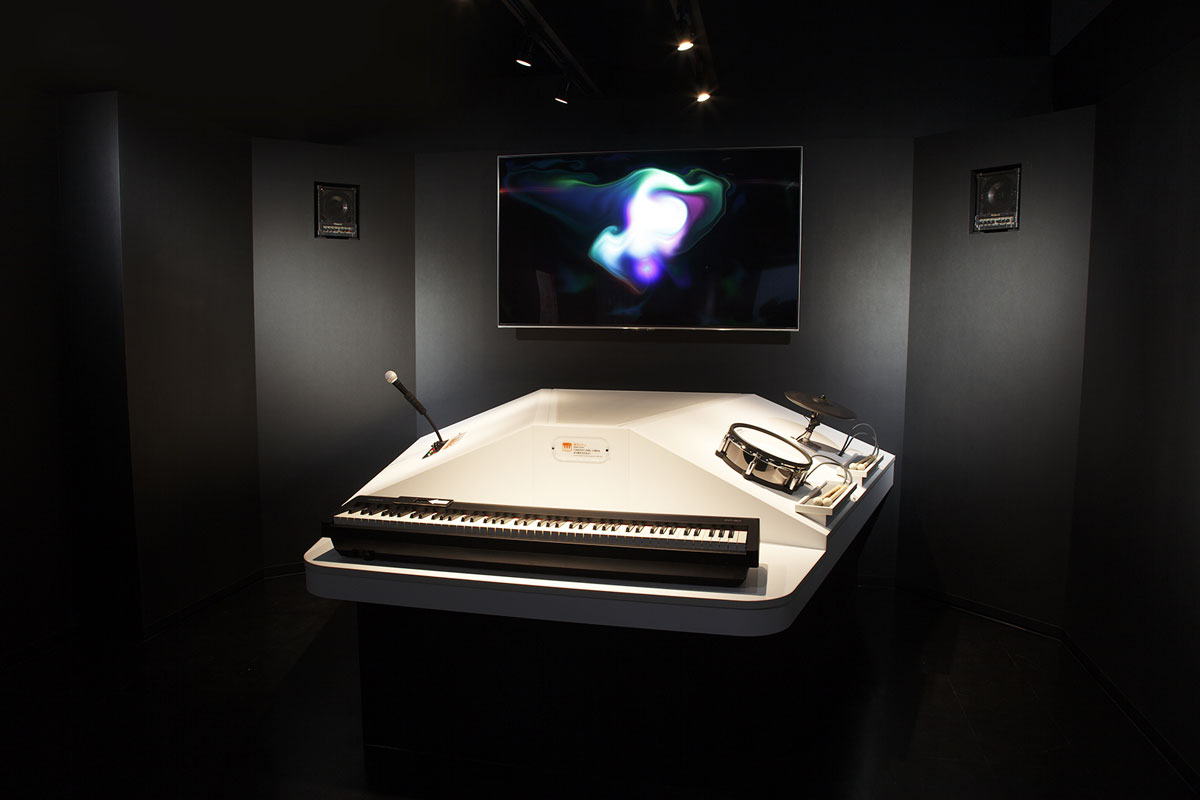
Roland takes part in a special event with 6 different themes of Nature, Sound, Light, Power, Universe and New Technology organized by Hamamatsu Science Museum.
Named “The World of Digital Musical Instruments,” the company provides the visitors with multiple musical experiences including characteristic music performance with digital piano, digital drum and voice transformer, and a synchronized music of piano, drum and vocal, and image with help of MIDI technology.
Kawai Displays SK Grand Piano At Hamamatsu Bullet Train Station
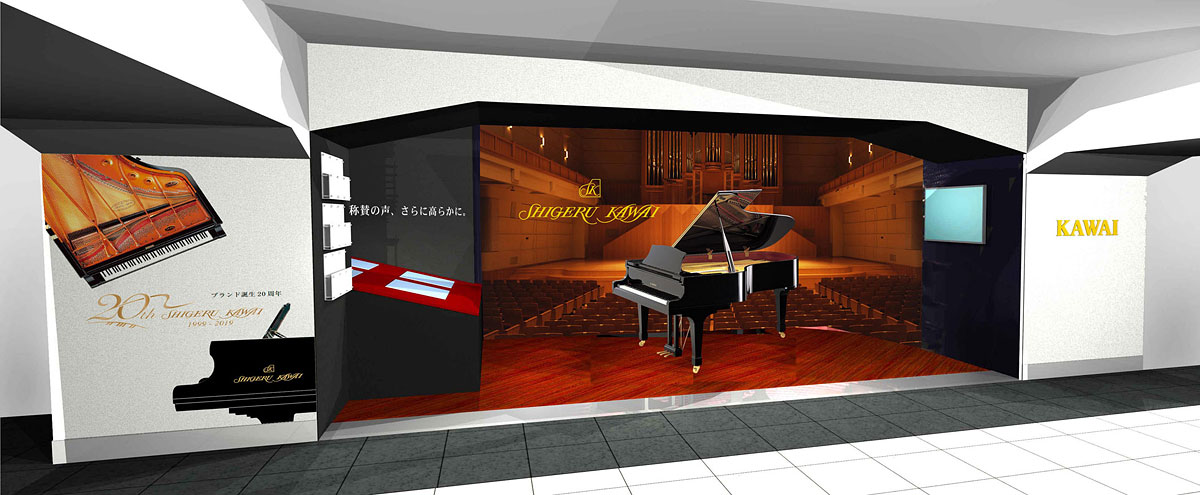
An SK-5 Shigeru Kawai Grand piano has been shown for passers-by at Shinkansen (bullet train) Hamamatsu station in the similar setting of concert hall. The visitors can enjoy authentic concert hall experience, and take photos sitting at the piano.
Kawai celebrates 20th anniversary this year after the company first launched SK-5.
Hamamatsu station set up one individual large and small exhibit spaces inside the ticket gate and concourse in 1979, and offers them local industries today. Three companies including Kawai use the small space to introduce products and disseminate information of the music products industry each for a year.
Kawai introduces history of Shigeru Kawai piano from its debut to today, and a video featuring can Chkmur, grand prix winner of 10th Hamamatsu International Piano Competition playing Kawai SK-EX full concer grand t piano.
Japan’s 2019 First 6-month Term Retail Music Market Survey
Japan Music Trades conducted 2019 first 6-month term retail music market survey sending a questionnaire to 47 music stores throughout Japan in hopes of finding recent climate and trend of retail music business in Japan.
Q1. How was the business in comparison with the same term last year?
19 music stores (40%) replied better and 13 stores (28%) reported no change. 15 stores (32%) commented it went down.
Number of stores which reported better business went down to 40% from 54% in the same term last year. While, 32% stores replied business went down which got worse from 17% last year. Broadly, market environment has deteriorated during the term.
Generally speaking, business during the extra-long 10-day holiday in May was well backed by vibrant demands among students of pop and symphonic bands. Guitars, in particular, achieved considerable growth.
Though most music retailers sell less than 20% of their total product mix on line, the number is gradually increasing.
More than 80% of music retailers replied they are complying recently regulated law to improve workplace environment and work-life balance of store staff.
Q2. How much does your Web business share of total sales?
Over 50%…..6 stores (13%)
Between 20% and 49%…..8 stores(17%)
Less than 20%…..33 sores (70%)
Q3. Plans to improve work-life balance of staff
Already improved to satisfactory level…..10 sores (21%)
Slowly but steadily improving…..29 stores (62%)
Not yet much improved…..8 stores (17%)
Q4. What do you plan for the latter half?
Invest in better product mix…..10 stores (21%)
Upgraded customer service…..13 stores (28%)
Human resources…..21 stores (45%)
1st Hibiya Music Festival Takes Place In Tokyo
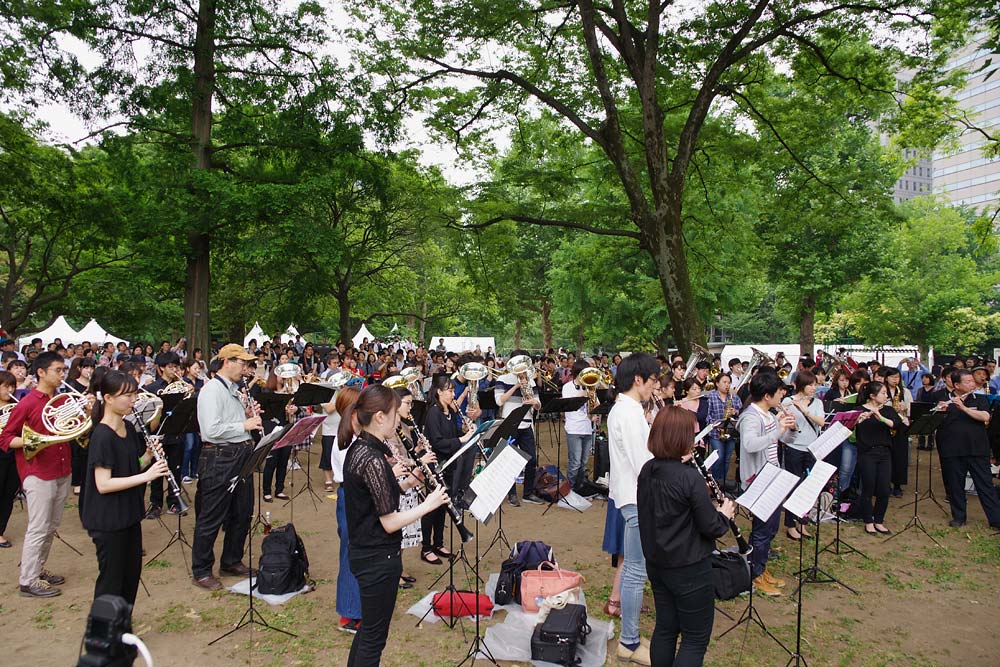
1st Hibiya Music Festival took place at Hibiya Park, Tokyo, on June 1(Sat.) and 2 (Sun.), which was open to music makers and music fans of all age groups and nationality with and without musical experience free of charge. Produced by Seiji Kameda, bassist and music producer, it was backed by Tokyo Metropolitan Government and Chiyoda-ku, and supported by top artists and private corporations. From the music products industry, Yamano Music, Yamaha Music Japan and Rittor Music offered the organizer a special support.
According to the organizer, the event successfully drew 100,000 visitors and, the special concert “Hibiya Dreams Session” featuring Seiji Kameda and his band, The Music Park Orchestra, Sayuri Ishikawa, Torayasu Hotei, JUJU and other renowned singers and musicians received massive media coverage. The visitors enjoyed a host of concerts of various genre, talk sessions and music workshops staged here and there in the spacious park.
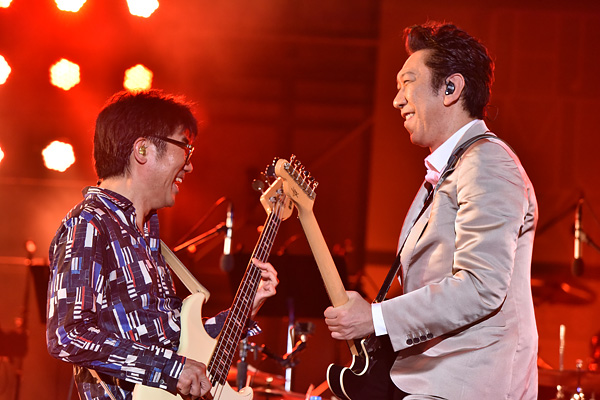
Casio Computer, Korg, Yamano Music, Yamaha Music Japan, Rittor Music and Roland offered hands-on sessions, while 9 member companies from Japan Musical Instruments Association including Otsuka Gakki, Kikutani Music, Kiwaya, Suzuki Musical Instruments Mfg., Tombo Musical Instruments, Niimi Gakki, Prima Gakki, Mishimaya Gakkitenn and Moridaira Musical Instruments set up booths offering accordions, keyed harmonicas, digital pianos, electronic keyboards, percussion instruments, guitars, ukuleles, ocarinas, wind and stringed instruments for free experience for first time music makers, and entertained them with demos and workshops. (photo left: ‘Hibiya Dream Session’ concert featuring Seiji Kameda, producer, left and Torayasu Hotei right, below right: Ukulele workshop presented by Kiwaya Co., Ltd. and Roland/Boss booth where V-drum workshop, experience sessions of digital Japanese drum and Aerophone were offered.)
The organizer plans to stage the second session on May 30 and 31, 2020.
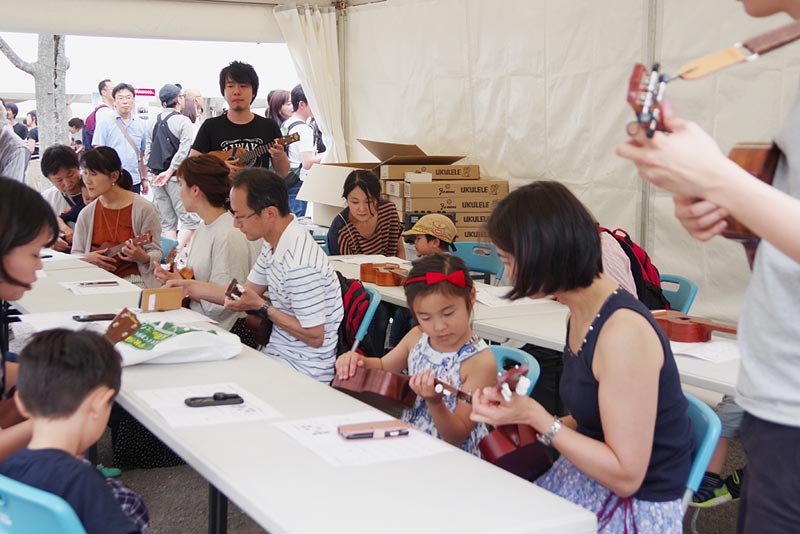
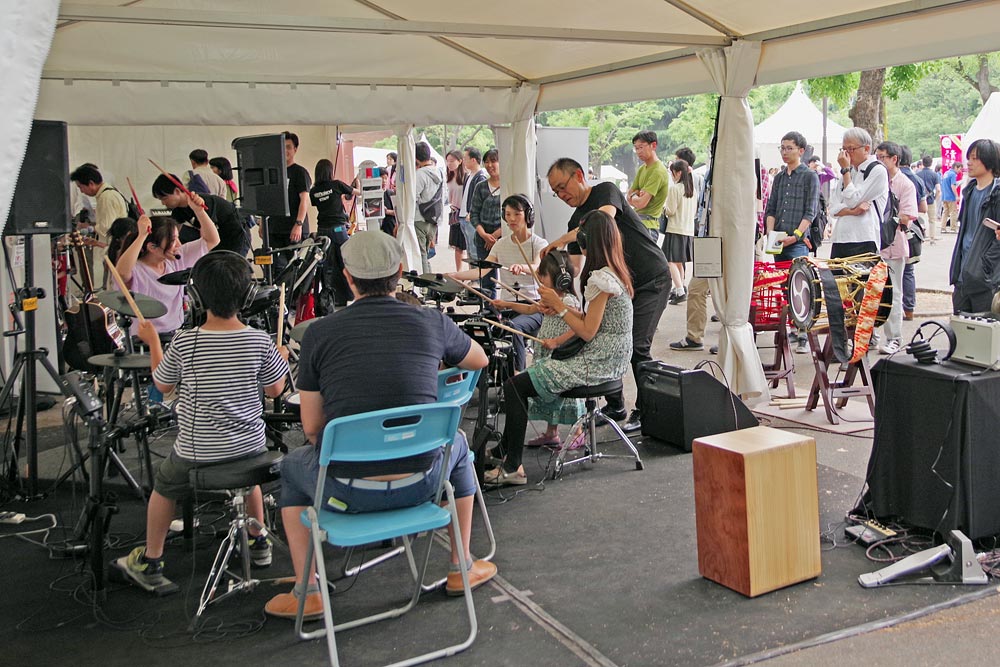
21st International Piano Builders and Technicians Meeting in Hamamatsu
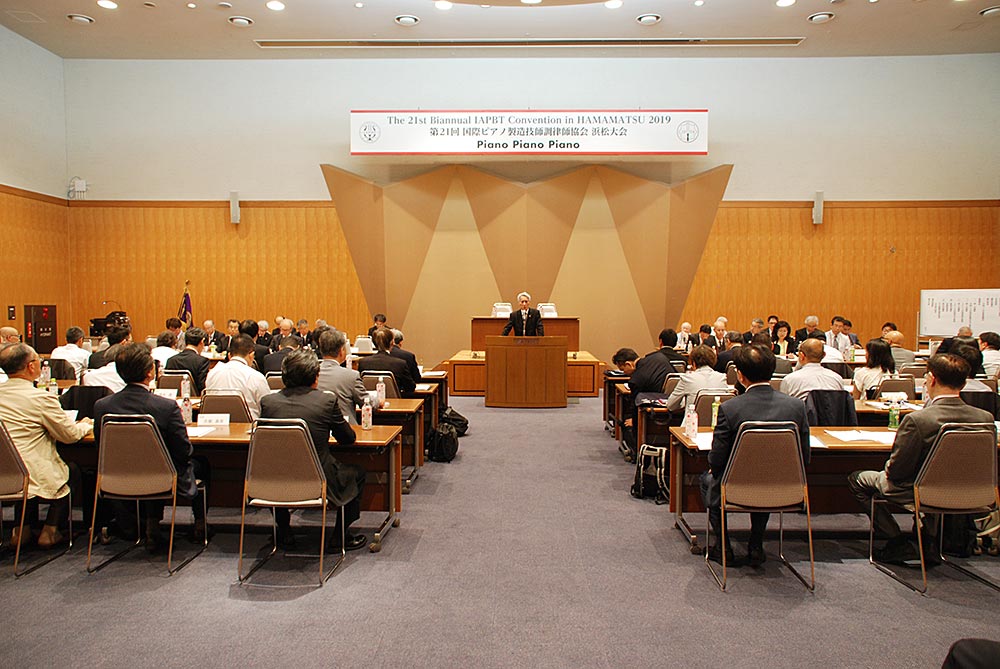
International Association of Piano Builders and Technicians(IAPBT)and Japan Piano Technicians Association (JPTA) hosted once every two years meeting of the associations on May 25 and 26 in Hamamatsu.
Dubbed ‘Piano, Piano, Piano’, the event drew more than expected 852 members working in global piano societies including 114 from overseas and students studying piano building and technology in Japan.
While IAPBT meeting provides attendants with opportunities to share information and communication among the members, it serves as a precious occasion where piano technicians can improve their technique attending versatile seminars. As Japanese piano market has been in down trend for decades, piano technicians largely independent operators face increasing pressure for survival. Every technical seminar was fully packed with technicians seeking upgraded skill and knowledge, which will help support their business for coming years.
Takeshi Saida, chairman of JPTA said in his first day speech that spreading pleasure of piano playing was the association’s mission. He suggested strengthening the roles of the association toward the future, the need of reregulation of membership and fee as well as effective use of its website to better transmit and share business information among the members.
The 22nd meeting will be organized by Euro Piano, and takes place in Warsaw, Poland in 2021, and the 23rd meeting follows in U.S. organized by Piano Technician’s Guild in 2023.
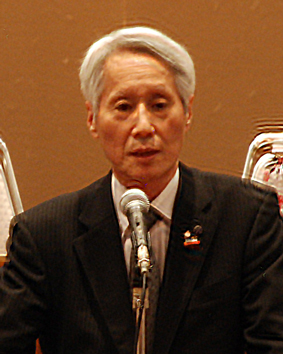
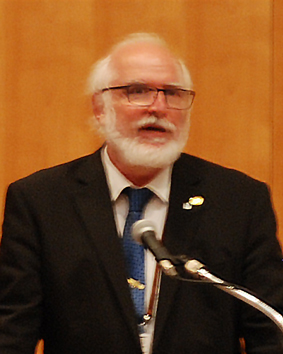
IAPBT elected Gunther W. Schaible as the next chairman of the association. He took over the role immediately at the meeting from Takeshi Saida. (photos right: Gunther W. Schaible, new chairman of IAPBT and Takeshi Saida, ex-chairman)
A series of symposiums by leaders of individual association followed on the theme of ‘The Piano Brings Us Rich and Happy Life.’
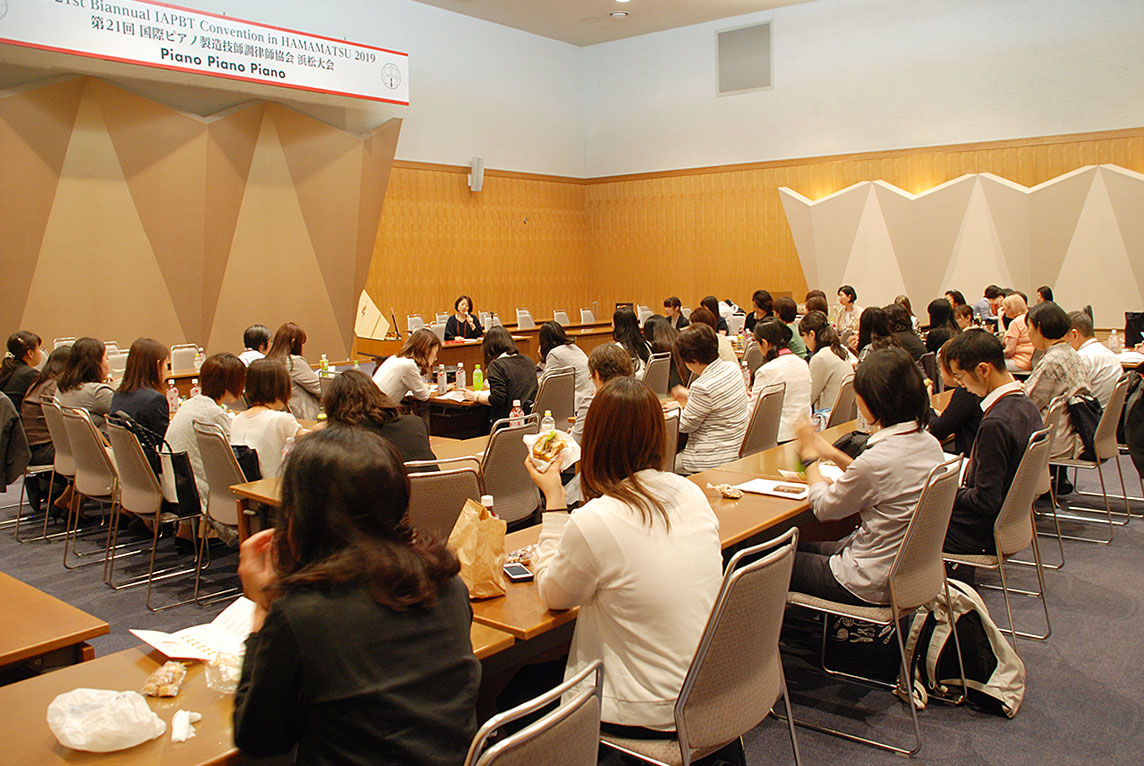
Such piano and accessory manufacturers as Pianos Bolduc (Canada), B?sendorfer, C. Bechstein, Kawai, Renner Japan, Steinway & Sons, Fazioli and Yamaha provided the members with seminars on the subjects of soundboard, crown, tonal characteristics, voicing, piano structure as well as hands on training. (photo left: Women’s Forum drew about 50 female members.)
The Hamamatsu meeting marked 90th anniversary of JPTA and 40 years anniversary of IAPBT.
Sound Messe in Osaka 2019, Japan’s Largest Guitar, Amp and Ukulele Exhibition Market
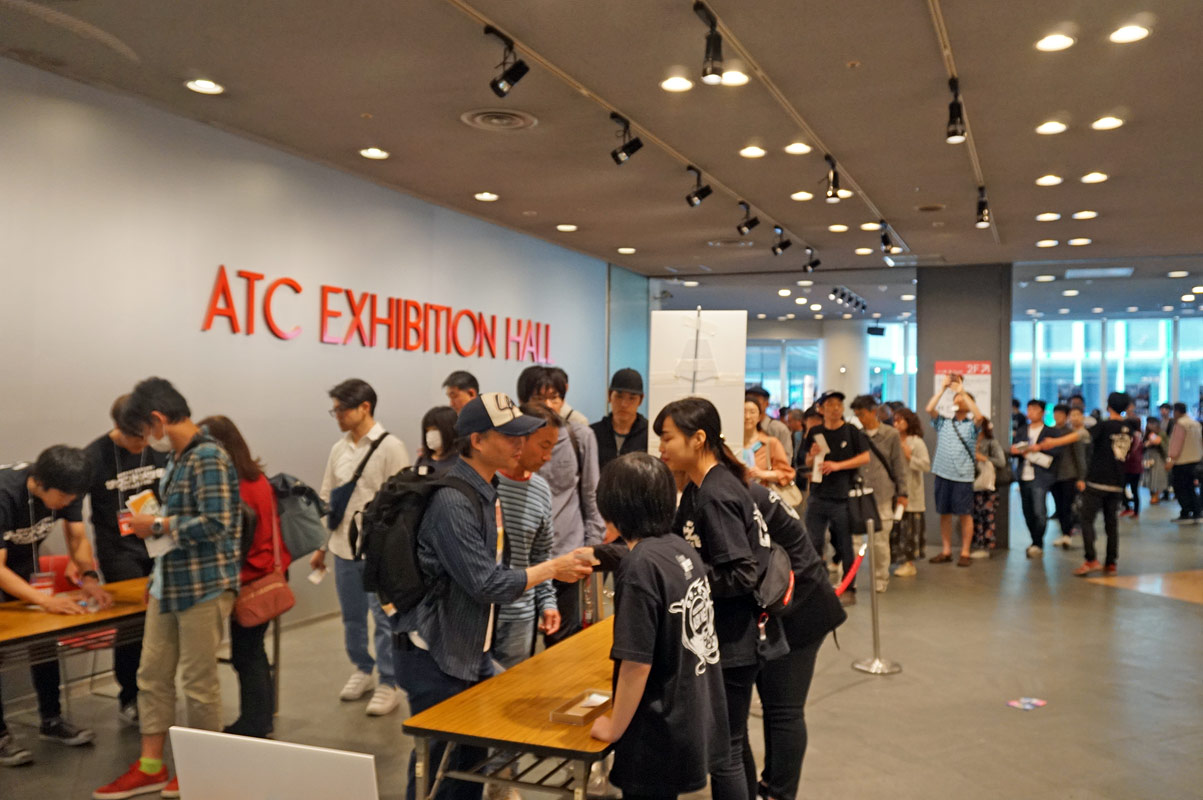
Established as one of the largest exhibitions and markets for guitars and ukuleles in Japan, Sound Messe in Osaka Executive Committee organized 9th session on May 11 and 12 in Osaka. (photo left, the visitors making a long queue before the opening.)
Initiated in 2010 by acoustic guitar manufacturers, distributors and music retailers, it’s widely recognized among guitarists and guitar enthusiasts where they can experience unique and exciting gears and buy them on site. Sound Messe in Osaka has successfully expanded in the ensuing years both in terms of attendance figures and proceeds.
It added electric guitars and related products segment in 2014, and now attracts visitors from not only in Western Japan but also remote areas, and overseas exhibitors.
The total attendance this year reached a record 6,834 including exhibitors’ staff members. (It was 5,900 excluding exhibitors’ staff members) The music retailers participated in the market area sold 53 million yen worth of music gears compared with 66 million yen in 2018.(photos right, from top to bottom, The visitors experimenting coveted gears for sale at the market area, overseas luthiers are increasingly interested in taking part in the event year after year, Yamaha showcased the latest FG/FS Red Label Series guitars featuring a new bracing, Atmosfeel pickups and state-of-the-art technology, and the unique guitars built by young promising guitar builders who now study guitar making.)
Exhibitors included 76 acoustic guitar & ukulele manufacturers and luthiers, and 46 electric guitar manufacturers, and at the market area. In addition to the market place where 15 retail music stores offered them characteristic instruments, the organizer invited the visitors to attractive food court, caf?, FM COCOLO satellite studio, even a foot massage parlor and a golf pro shop from outside the industry.
A host of name guitarists also entertained the visitors with outstanding music performance and talk sessions. This year, they included such veterans as Hirokazu Ogura, Takashi Hamazaki, Tokio Uchida, Tetsuo Sakurai as well as Yoshie Kurasawa and Anna Takeuchl young popular artists, SATSUMA3042 renowned YouTuber. (photos below: D_DRIVE Demonstration at Roland booth. Boss Waza Tube Amp Expander was offered for experience, and SATSUMA3042, bottom enthralled the audience with his astonishing technique.)
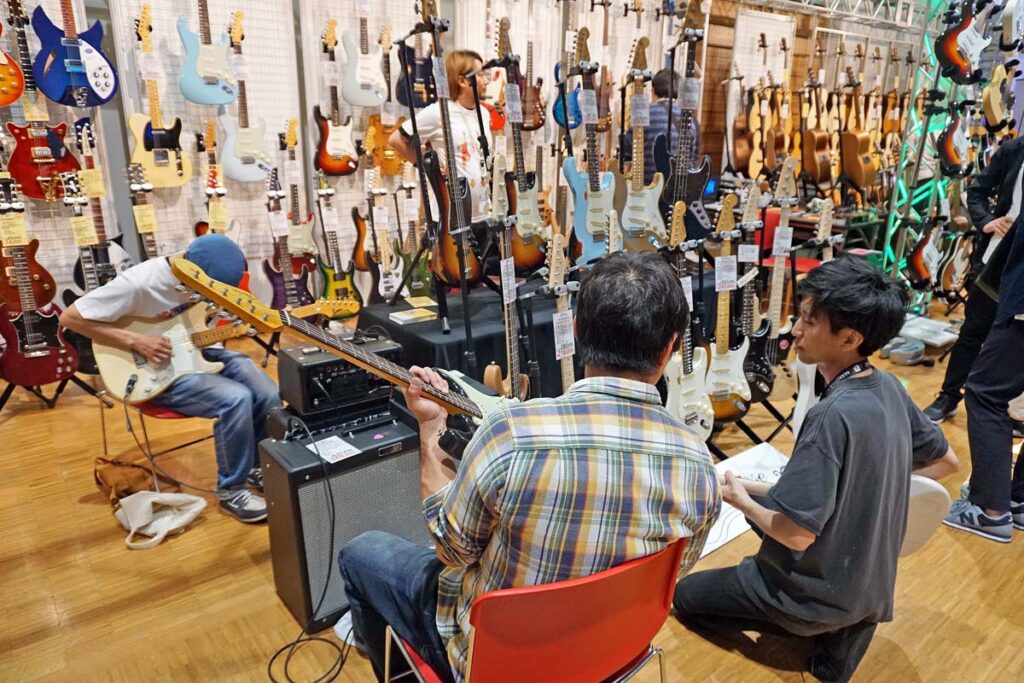
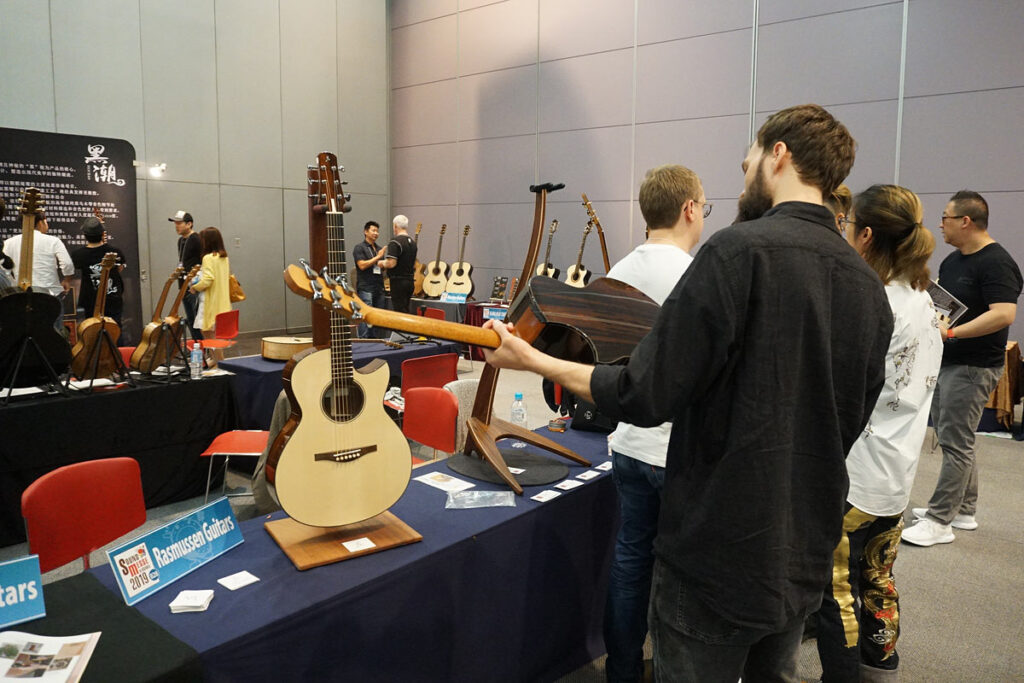
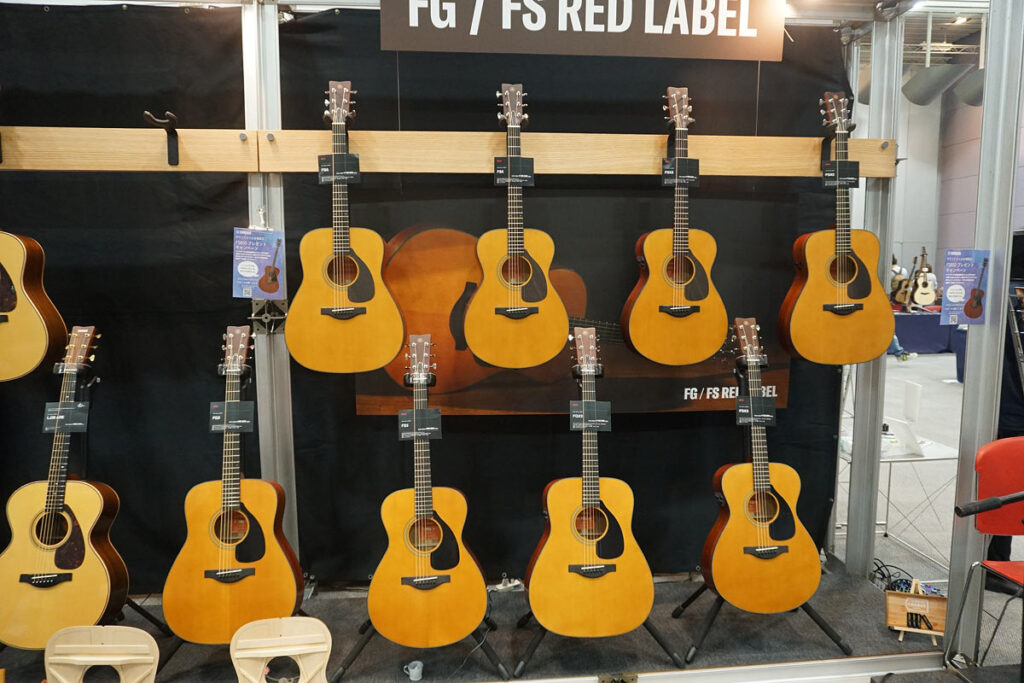
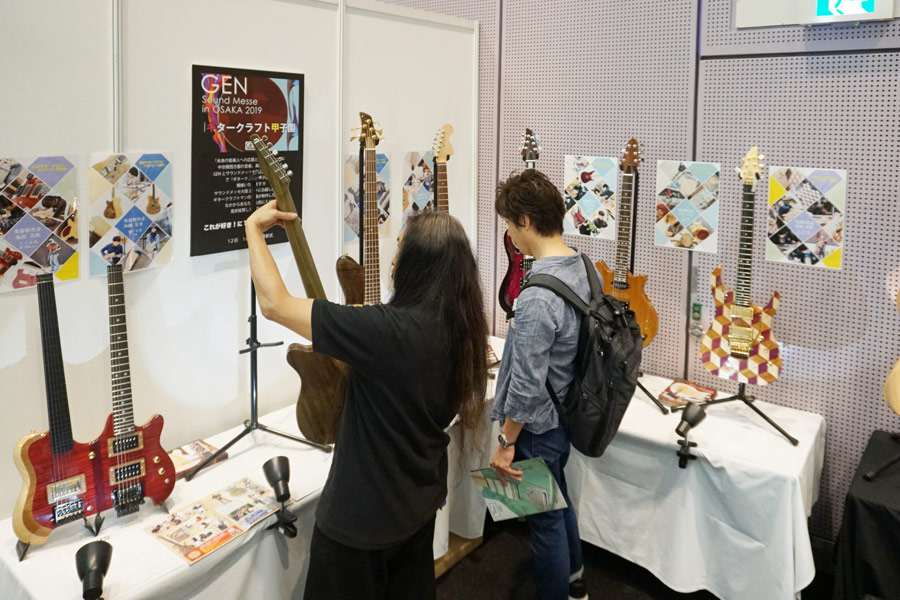
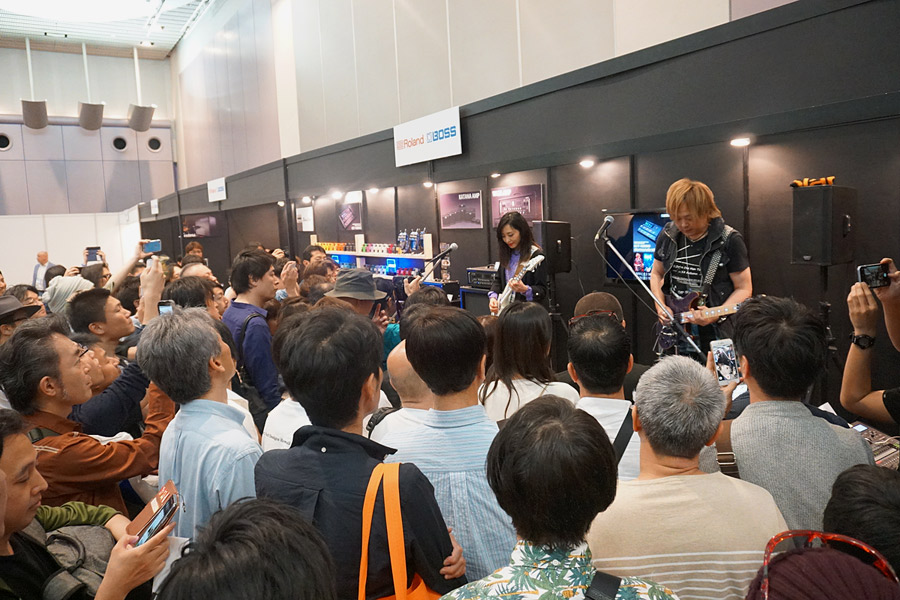
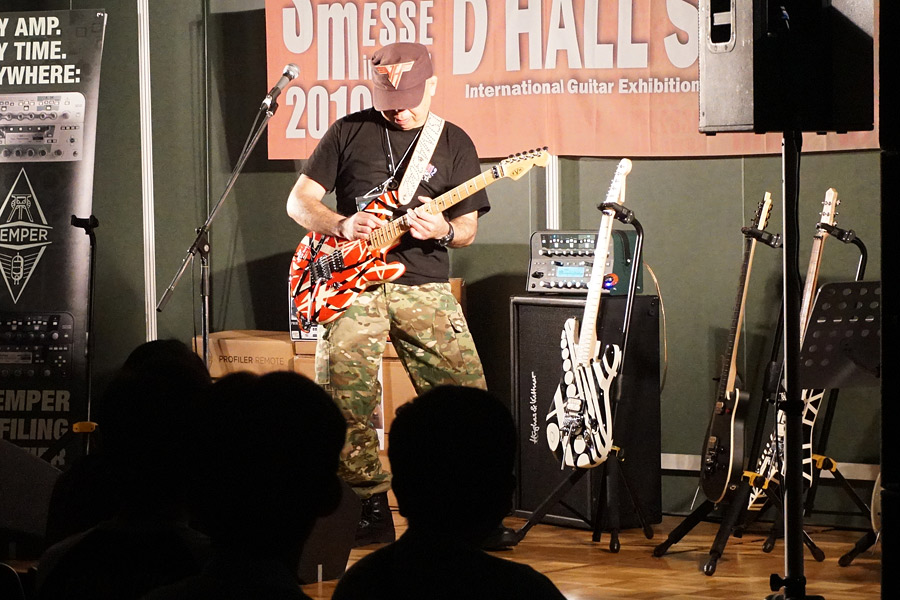
Gakki Engine of Nippon, a group of 22 master guitar builders in Japan provided a series of talk sessions featuring luthiers of the members, a special exhibit of original guitars crafted by young promising guitar makers who now study guitar making at school. About 500 visitors cast a ballot on favorite gears on exhibit.
On the day before the official opening, the organizer staged Buyers Day for the industry, and 82 buyers from 44 music retailers including from Tokyo and Kyushu areas took part in search of unique and original gears.
Kawai Closes Latest Term With Growth
Kawai disclosed consolidated annual report for 12-month term ended in March 2019. The sales for the term were 72.4 billion yen, an increase of 1.58 billion yen over the previous term. The operating revenue was 3.67 billion yen, an increase of 0.92 billion yen. Ordinary income increased 0.85 billion yen to 3.92 billion yen. The net income was 2.01 billion yen, an increase of 0.058 billion yen.
Educational instrumental business increased 3.05 billion yen to 58.59 billion yen. The operating revenue also increased 0.94 billion yen to 2.58 billion yen.
The acoustic pianos, the largest business line of Kawai, gained successfully headed by 2-digit growth in China and favorable performance in Europe, North America and Japan. In particular, sales of the high-end value-added models including Shigeru Kawai, AURES and ATX models were brisk.
MPVUS NV10 and CA Series digital pianos sold well in Europe and Japan. Integrated recruitment programs carried for piano courses at music teaching laboratories contributed to boost new enrollments and additional piano sales.
Yamaha’s 2019 Revenue Increases About 15%
Yamaha announced that its sales gained 1% or 4.4 billion yen to 437.4 billion yen for the 12-month term ended in March 2019.
The operating revenue increased 14.7% or 7.2 billion yen to 56 billion yen, and the ordinary income increased 18.7% or 9.2 billion yen to 58.4 billion yen. Thus, sales growth has continued for 7 consecutive terms to set another record.
Music business sales rose 2.7% to 282 billion yen, and operating revenue jumped up 24% to 42.9 billion yen. Two-digit sales growth in China was a drive force for overall strong performance of acoustic piano sales. Digital pianos and guitars also achieved 2-digit growth in China and North America. Wind instruments generated excellent sales on entire overseas markets as well.
Sales of pro audio decreased marginal 0.9% to 120.7 billion. The operating revenue ended up with 10.6 million yen, a 0.9% decline. The sales of this segment brought a healthy growth during the term with vibrant domestic sound installation business. On the other hand, sales of professional audio declined in North America and some other markets.
Slow market demands affected the sales of musical instruments parts and device with 34.7 billion yen sales, a 5.4% decline and 2.5 billion yen operating revenue, a 29% decline.
The company expects positive sales and operating revenue for 2020 term, which represents the 1st year of new mid-and long-term business plan.
Red Dot Design Award to Yamaha and Roland Digital Pianos
German Red Dot Design Award 2019 Products Design Award was given to Yamaha CSP Series Clavinova and Roland LX700 Series digital pianos among approximately 5,500 entries submitted from 55 countries throughout the world. (photo left)
Roland LX700 Series also won Products Award of German iF Design 2019. (photo below)
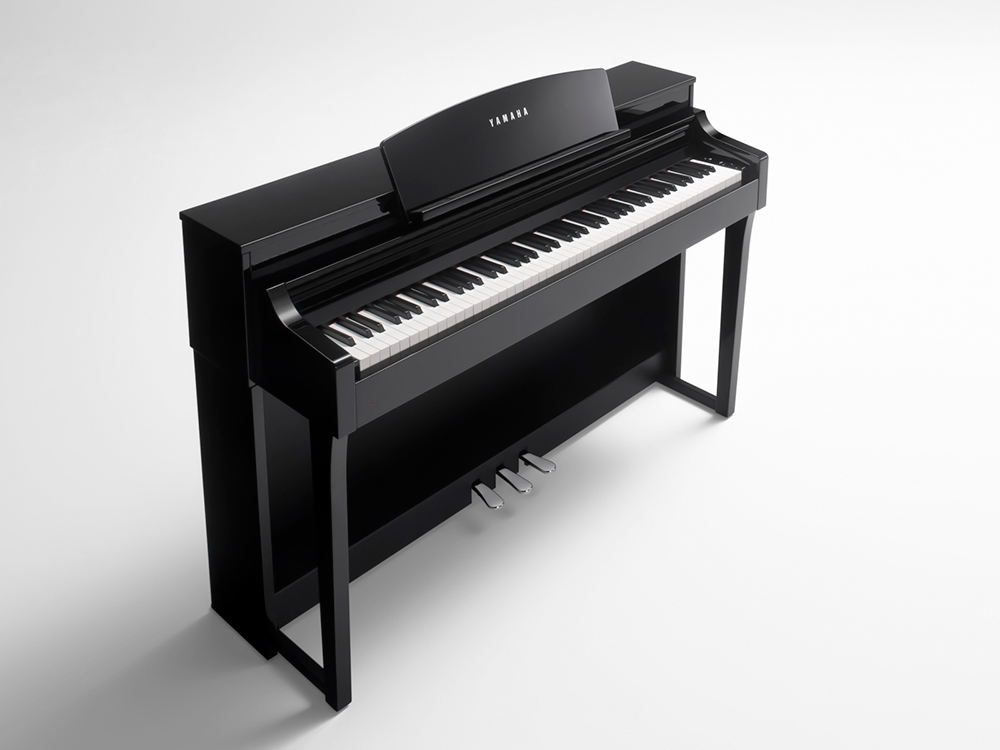
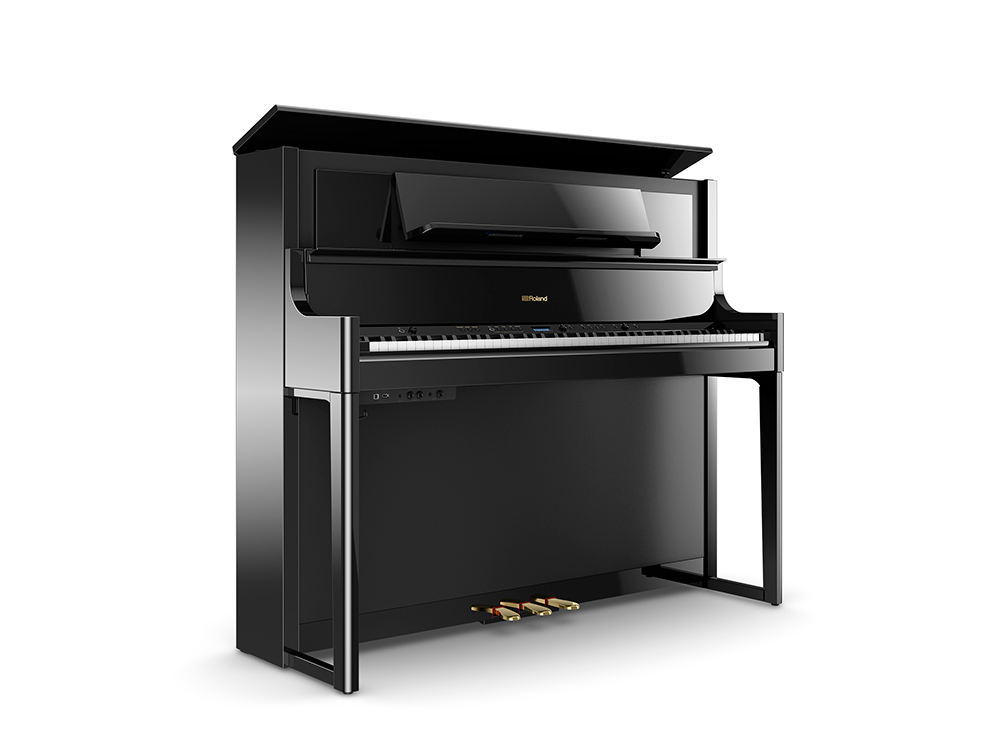
Fender Shop Opens in MIKIGAKKI AMERICAMURA, Osaka
Asia’s first Fender official shop opened in Miki Gakki Americamura location, Osaka recently. Miki Gakki has explored a new market approach to serve as a professional group of specialist stores in recent years. In that context, Americamura outlet has just turned into an electric guitar specialist store. (photos right: Fender Custom Shop, top, and the electric guitar section where more than 300 gears are shown.)
The Fender Shop in MIKIGAKKI AMERICAMURA shows about 300 Fender electric guitars with characteristic models including custom handmade gears built by seasoned craftsmen laid out in each individual section.
The Fender Shop is segregated from other sales area, with decorated glass partitions, and special models featuring relic touches and unique color finishes as well as photos of Fender master builders all which make it a premium space for electric guitar enthusiasts. The shop also provides a rich selection of models and accessories for first time players.
Miki Gakki held an opening reception in the evening of April 1 inviting a host of artists, guitar freaks and press members.
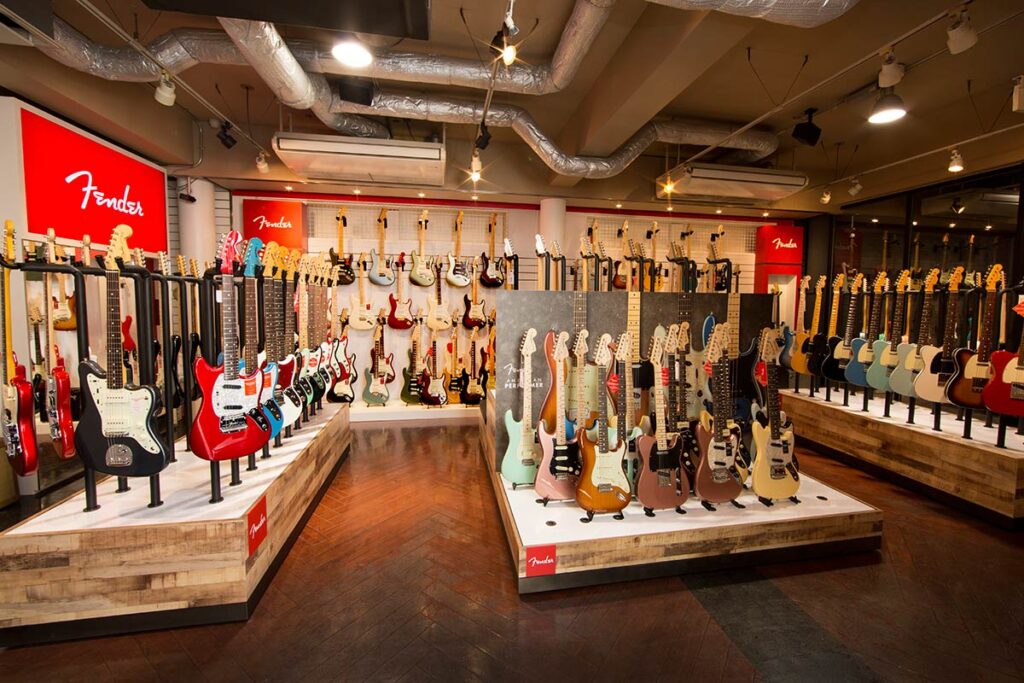
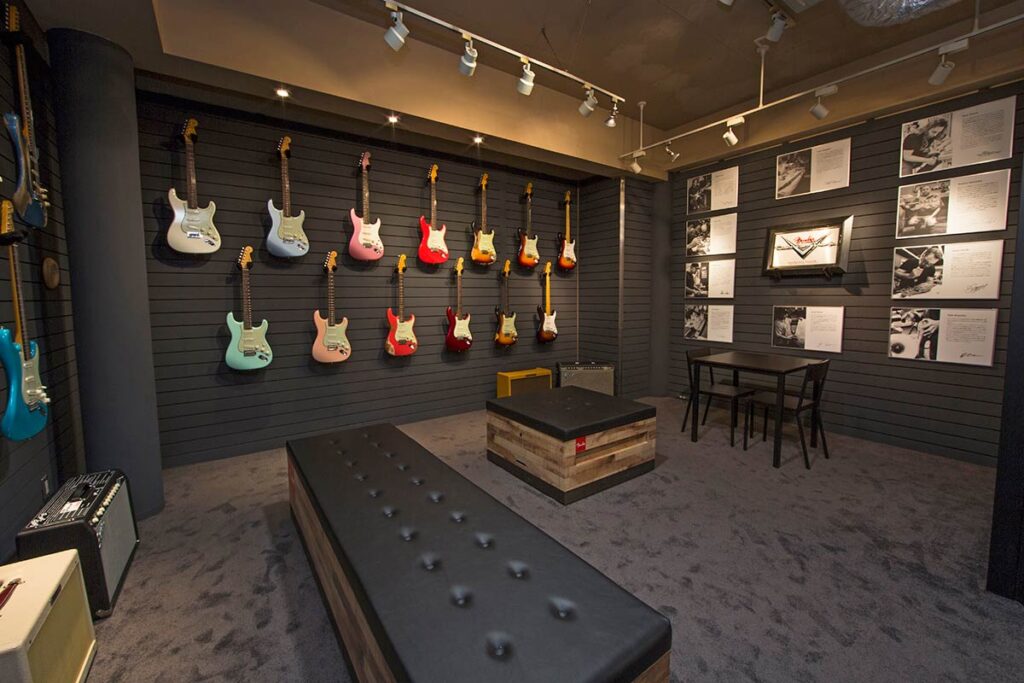
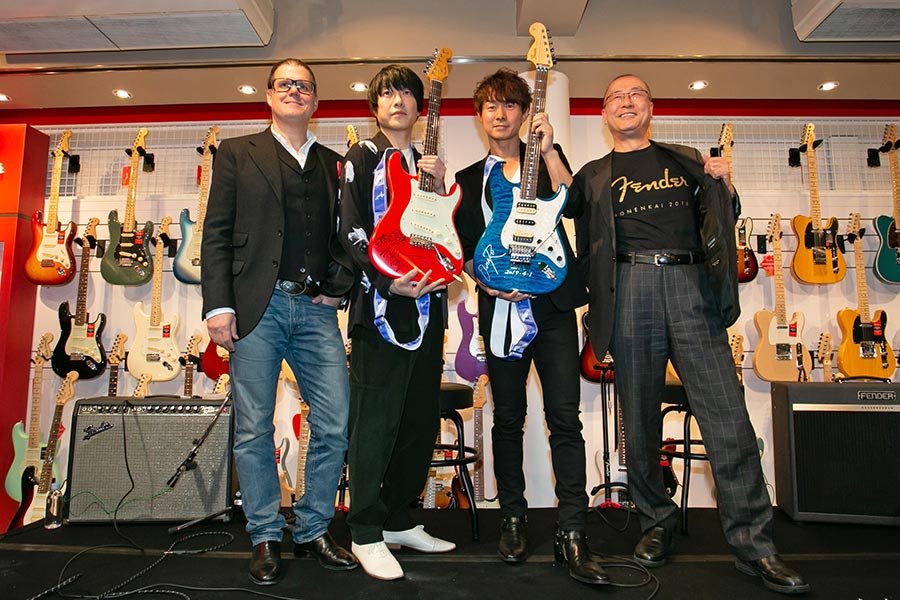
Akira Furuyama, president of Miki Gakki in T-shirt with a Fender loo
commented in his opening remarks, “We have integrated our business from a traditional full-line M.I. retailer to a more p
rofessional specialist group in the last couple of years. We are now realigned to better serve our customers and share information with them. We have realized at last an exclusive Fender Shop on the second sales floor of Americamura location.”
Edward Cole, president of Fender Musical Instruments Japan said, “Americamura is one of the most exciting towns for musicians in Asia. It’s our most critical mission to support players everywhere on the globe. We have tried to keep happy relationship with independent retailers providing our customers with the highest level of shopping experience. You can expect more Fender Shops to appear in Japan and world’s markets in coming years.” (Photo above: Edward Cole, far left, Michiya Haruhata and Soichiro Yamaguchi with their autographed guitars, and Akira Fukuyama.)
After the guests gave a toast, Michiya Haruhata from TUBE and Soichiro Yamauchi from Fuji Fabric greeted the visitors talking how they had met their favorite Fender guitars, background stories of developing signature models and a live session.
Corporate Name Change
Days Corporation (Hiroyoshi Motohashi, president) has changed the corporate name to ATELIER Z Guitar Works in celebration of 30th anniversary.
New distributions
Nihon Electro Harmonix started distribution of U.S. VUE audiotechnik PA speakers on April 1.
Arai & Co. now imports and distributes Cherub and NUX products.
Kikutani Music now imports and distributes TECH21 products.
2018 Japan Music Products Production, Import & Export
Advanced export
Statistics of Shizuoka-ken Musical Instruments Manufacturers’ Association shows acoustic piano production in 2018 ended with nearly the same level over the previous year in both units and value. While domestic shipment slightly went down, export increased 3% in units and value. Japanese piano export has increased year by year since 2013, and 2018 saw second largest growth after 2011 with 26,000 units.
Domestic shipment of upright pianos was 9,600 units, 11% decrease from the year before last. On the other hand, grand pianos, which declined in a row in the last 3 years rose 10% in 2018 to 3,700 units. Value wise they increased meager 3% to 13.43 billion yen, and unit value of grand piano slightly declined.
Export of upright and grand pianos, reed instruments and other wind instruments, brass instruments, and piano parts and accessories shared 77% of total export in 2018. Upright piano exports increased 11% to 21.1 billion yen, and grand piano exports gained 6% growth to 13.1 billion yen. Acoustic pianos shared 50% of total export.
Export of electric and electronic musical instruments with keyboard decreased 18% to 4.3 billion yen, and also a few more items underperformed.
Import Remained Flat
Total import kept the same level as the year before last with 55.4 billion yen. Import of acoustic musical instruments including other wind instruments (5.6 billion yen, +17%), bowed instruments (2.8 billion yen, +19%), accordions (0.9 billion yen, +11%) positively increased. Also import of parts of electric and electronic musical instruments & accessories rose 13% to 2.8 billion yen, but electric and electronic musical instruments with keyboard and electric guitars declined 8% to 10.4billion yen, and 13% to 6.6 billion yen, respectively. Top 10 import categories shared 82% of the total import.
1st Hibiya Music Festival in June
First Hibiya Music Festival will take place at Hibiya Park, Tokyo, on June 1 and 2. Seiji Kameda, music producer and chief of Hibiya Music Festival Executive Committee has played a key role in organizing the event from the scratch.
From the music products industry Yamano Music patronizes and Yamaha Music Japan supports the event to provide the visitors with versatile workshops and hands-on experiences. Japan Musical Instruments Association(JMIA) has also expressed participation in the festival having reserved exhibition space to meet the requests from the manufacturer and distributor members.
As of this date, Yamano Music, Yamaha Music Japan, Casio Computer, Korg and Roland set up their booths at Elm Square of the park. Also, JMIA has accepted exhibit space requests from Otsuka Gakki, Kiwaya, Suzuki Musical, Tombo Musical and Mishimaya, which plan to give workshops, hands-on experiences and demos.
Organized as a free-for-all musical event, it persuades everyone, regardless of nationality, age and musical genre, to participate and enjoy music making.
In addition to a special concert featuring Kameda’s The Music Park Orchestra and name guest musicians, the event provides a host of acoustic music concerts featuring stringed instruments and Japanese folklore instruments, brass band performances, talk sessions and workshops throughout the days. Tokyo Midtown Hibiya serves as a satellite stage.
The organizer expects to attract from 50,000 to 100,000 audience to the festival.
New Imported Products Distribution in Japanese Market
Korg started distribution of Earnie Ball, Earnie Ball Music Man and Sterling by Music Man products on April 1.
Kikutani Music now distributes Mi-Si musical instruments pickups, preamps , etc.
Hoshino Gakki now represents Thailand-based Tycoon Percussion products.
Casio Wins German iF Design Award
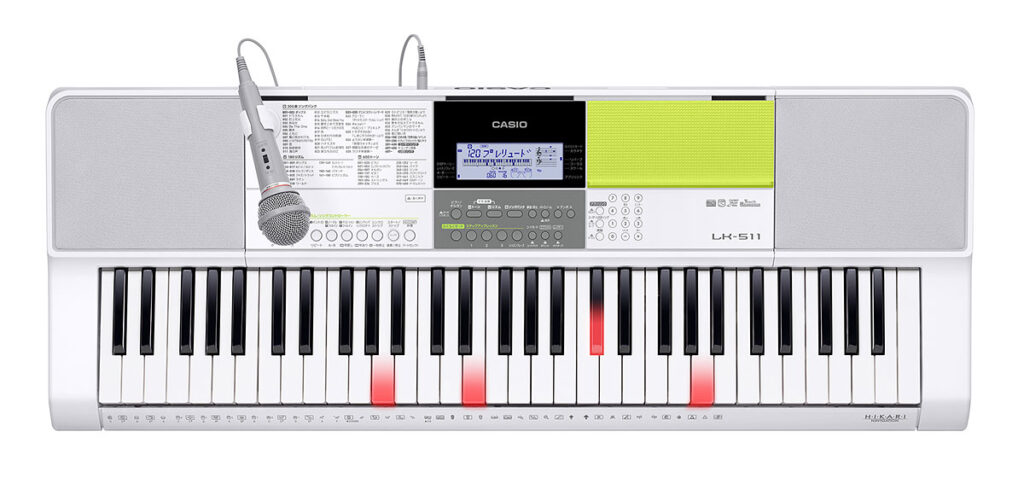

Casio LK-511 light-guided electronic keyboard won prestigious 2019 German iF Design Award. This year, 6,400 products were applied from 52 countries and districts.LK-511 has realized easy performance using tile style button layout, and compatibility with smartphones and tablets to add song libraries and practice capability through matched applications.
Management Change: Steinway & Sons Japan
Steinway & Sons Japan, Ltd. announced on February 9 that Yuriko Akiyama (Ms.) had succeeded the position of president from Kazuhiro Goto.
Yamaha Closes 3rd Quarter with 3% Music Products Sales Increase
According to the 2018 3rd quarter fiscal report announced on February 5, Yamaha closed the term with 333.9 billion yen sales, 1.6% up from the same term a year earlier. Operating revenue rose 16% to 48 billion yen, and ordinary income increased 17.4%. However, net profit went down 25.9%.
Sales of music business segment for the term increased 3.0% to 215 billion yen. Acoustic pianos continued to achieve 2-digit sales increase in China, and also grew in North America and other markets. Digital pianos and wind instruments sold very well in all overseas markets, and guitar sales significantly rose in China, and were reportedly well in North America and developing markets. As a result, operating revenue of the segment increased 27.2% to 35.8 billion yen.
Sales of pro audio products segment decreased 1.4% to 91 billion yen due to soft domestic installation services during the term as orders traditionally generate in 4th quarter. Sales of audio products went down in North America and other markets.
2018 Japanese Music Products Retail Market Survey
Not a few economists have revealed negative views for Japan’s general economy in 2019. Japanese economy has grown from December 2012 to present, the longest 6 years and 2 months beating the previous record after the World War II from Feb. 2002 to February 2008. Despite the positive forecast of the Government that the trend will continue through to 2019, it’s not fully felt by ordinary citizens.
The world economy may be affected by the ongoing trade conflicts between U.S. and China, and thus impact Japan’s export. The worldwide stock market downfall last year end casts dark clouds over future global economy.
Japan Music Trades carried out an annual music retail market survey sending a questionnaire to 149 music stores throughout the country. A total of 107 stores, which were fewer than previous year, responded. We appreciate very much the cooperation of the music retailers kindly helped us to depict the present climate of music products retail market.
28% of the retailers reported that their 2018 sales went up, while 49% replied decline and 23% commented no change. It tells that more than 70% of the retailers felt the market was soft last year.
Looking the sales trend by product category, only grand piano showed a good performance. Sales went down for almost all product categories including upright pianos, digital pianos, electronic organs, woodwind instruments, electric guitars, printed music and music books, and music teaching studio operation for young children. There was no change in sales of brass instruments, violin family instruments, acoustic guitars, ukuleles, amps, effect devices, acoustic and digital drums, other percussion instruments, keyboard synthesizers, electronic keyboards, digital devices, DTM/DAW-related products, recording & PA equipment, accessories and music teaching studio operation for adults. Ukuleles had kept excellent sales growth for past years, but stalled last year.
Music retailers anticipate flat sales of all these products except for woodwind and brass instruments, and music teaching studio operation for adults which they expect good performance in 2019.
It’s a common understanding for music dealers that consumption tax hike to 10% from present 8% slated this coming October will bring the industry extra buying rush, but impact with significant sales dip thereafter.
Japanese government is also promoting cashless payment in the society. While digital payment helps reduce aggravating payment in cash, it costs music dealers additional expenditure for installation of terminals and commission fee.
Music retailers are also concerned about preference of consumer spending from buying to subscription style. Product rental service is quickly expanding. People are shifting to rent or share goods whatever they need. Domestic share for sharing economy is expected to double in 2020 from 28.5 billion yen in 2015 to 60 million yen level. Young consumers are more inclined to buying used goods or sharing products with others. They have different cognition for owing products themselves.
Yamaha launched Sound Rent system, a musical instrument rental service in 2003, however, it still shares only a small portion of total businesses. The industry may tap a new market promoting leasing and rental services of musical instruments.
How music retailers can compete with net dealers and mass merchandisers?
“I believe promoting ourselves as a full service provider from sales of music gears to education and maintenance services makes us differentiate from outside competitors.”
Masatoshi Matsu’ura, Sanritsu Gakki, Miyagi Pref.
“There are not many ways that a small, local music store can cope with. We just meet requirements of our loyal customers who understand how we can serve them. Probably it’s no longer a time we can expect great sales.”
Noriko Saito, Saito Gakki, Hokkaido
“One idea is to educate customers that every acoustic musical instrument has its own characteristics and they can select instruments matched to their feeling by playing instruments themselves at us. Volume sales at lowest possible price no longer fit in Japanese market today. We are trying to be a professional music store providing customers with technical services and educational seminars to win their confidence.”
Mitsuhiro Sekiya, Sankyo Gakki, Hokkaido
“Consumers can get as much information as they want from different sources today. There are no ways we can change the trend. We can’t compete with net dealers when the listed products are inexpensive and maintenance-free. Mass merchants have their advantage as they are largely located in busy shopping streets, which generate good store traffic. We just hope them to have the notion that the products they sell are gears to make music, but not simply commodities.”
Akihisa Kunii, Kawai Sendai Store, Miyagi Pref.
“No one can resist the present stream of the market. All we can do is to intensify our strength as music store which means to train our sales staff to be a real professional, the explicit reason that the customers buy from us.”
Kaita Nose, T. Kurosawa & Co., Ltd., Tokyo
“Information you can get on SNS can be false in many cases these days, and people are increasingly aware of this. We keep our strategy that we are the source of trustworthy and valuable information.”
Yoshiaki Kamagaki, Shinkyo Gakki, Hyogo Pref.
“We tell our customers risks of buying music products on the net taking every opportunity, educating people that to buy such delicate musical instruments on the net simply for price is incorrect, and they and their children can get maintenance services after the purchase only from music stores with qualified staff.”
Isamu Kodama, Kodama Gakki, Nagano Pref.
“It’s good that consumers have wider choices when they buy musical instruments, but some net dealers just destroy the market with heavy discounting. We have customers who believe in their extremely low price. It’s not easy to have them understand the need of after-sales services and who provides them with that services. We expect that the suppliers evaluate the services we provide for customers, and take positive steps to compensate good retailers with more favorable inventory purchase or withhold dealership with under-serviced retailers.”
Kenichi Suemasu, Klostermusic, Gunma Pref.
“The suppliers can stop selling products to net dealers and mass merchandisers as they can expect volume sales. As long as the industry as a whole continues huge discounting, we will never win the battle, keep loosing profit, and are not afford to promoting music making and increasing lifetime music makers. On the other hand, we understand that we can’t do anything to revising present consumer buying pattern.”
Yasuyuki Matsuishi, Matsuishi Gakki, Aichi Pref.
“We find no effective solutions in terms of selling price-sensitive products, but probably the best answer is to have characteristic and original products not found in our competitors, and added value. All in all, personality of sales staff makes difference.”
Kazuma Ebata, Elm Gakki, Hokkaido
“People who buy on-line visit roadside store at least once to check the instrument themselves before making a decision. Any mass merchandisers don’t necessarily have professional sales staff. Friendly communication at music teaching studios and well-trained professional sales staff with expertise will be our asset in doing business.”
Masayuki Tadokoro, Ikebukuro Gakki, Tokyo
“We advise our customers that the best way to buy musical instrument is to visit their near-by friendly and reliable music store. They get maximum satisfaction in the end. Since musical instruments is played for long, we provide our customers with meticulous consultation services, expertise and quality services.”
Kazuhisa Ikeda, Misuzu Gakki, Nagano Pref.
“Net dealers and mass merchandisers have their strong points, rich products selection and convenient location, so to speak. We are required to improve our weakness to compete with them. We can only cope with Amazon by regularly organizing fun to experience musical events that they can’t provide.”
Eijiro Takahashi, Nakazen Gakki, Aichi Pref.
“Musical instruments are largely hobby items. I tell our sales staff that only music store can communicate and make customers feel pleasure of music making directly.”
Tomio Katayama, Umeda Nakai Gakki, Osaka
“We don’t blame customers who buy music gears on line as it’s a standard means of shopping today. We do our business in our society serving needs of local musicians keeping good communication with them. I believe it’s our advantage.”
Masakatsu Yaguchi, Fun Music Systems, Akita Pref.
“It’s natural that consumers prefer net shopping and there’s no reason to complain. But they will learn in no time risks of shopping online, such as the instruments they purchased were different from what they conceived, product failures, inappropriate tuning, etc. Our trained professional sales staff gives customers technical advice. We also provide them with full maintenance and repair services, rental studios, recording experience and a concert hall. We expect those unique facilities and capabilities will be appreciated by our customers.”
Tatsuki Mouda, Miyachi Gakki, Tokyo
“We will see more sales on the net in the near future, but we don’t want to do business in the same field as them.”
Atsushi Hyodo, Hyodo Gakki, Shizuoka Pref.
“Fine after-sales services are indispensable for musical instruments. We plan to upgrade our repair/maintenance division so that our customers can count on our services. We hope to serve every musician with best conceivable performing conditions. Current practice that manufacturers sell products at Amazon platform directly will devastate music retail network in Japan.”
Name withheld by request.
“The largest problem is that the manufacturers sell their products at low price to net dealers and mass merchandisers bypassing distributors and authorized dealers. Ordinary music dealers are disappointed with heavy discounting and lost interest in handling mass-marketed products including digital pianos. The most effective means to cope with this is not to distribute low-priced maintenance-free musical instruments. Music stores can survive and maintain profit with enhanced repair/maintenance services, and serve the needs of small circle of loyal customers, and broaden customer base by words of mouth in the society.”
Name withheld by request.
“Pleasure of making music is created by collaboration of musicians and music stores. Net dealers and mass merchandisers have no interest in creating music. Music market will demise as long as the manufacturers and distributors rely their distribution channel on net dealers and mass merchandisers.”
Name withheld by request.
14 Music Retailers Forecast 2019
Japan Music Trades interviewed 14 leading music retailers in Tokyo and Osaka area to ask what they foresee 2019 market and business. 6 retailers replied they expect much in the 2019 market, 7 retailers remarked business would remain unchanged. While, only one retailer expressed negative view that they would anticipate stagnant sales. Here are their comments.
“Sales of our main lines including large keyboard instruments and wind instruments were flat in 2018. I anticipate consumption tax hike in fall will impact our sales with significant level of ups and downs before and after new rate is applied. Other than that we expect there will be no large change in our business.
“To increase music makers, we make our utmost efforts this year providing customers with multiple opportunities to touch and feel the instruments, and fun experiences. For example, we plan Premium Morning for prospective piano buyers for 30 minutes of free experience before the store opening, mini lessons, free consultation programs for first-time wind and string instrument players, and drum experience. We believe these kinds of program will help increase our store traffic. Consumer is increasingly interested in fun experience these days and there are many ways we can stimulate their desire to play music.”
Hiroshi Funayama, Ginza Store manager
Yamaha Music Retailing, Chuo-ku, Tokyo
“We spent much more time last year on SNS-related works including taking pictures of products for our website, internal works involved in computer and revised E-commerce system aside from store and online sales and marketing. They contributed us to achieve two-digit growth amidst stagnant music retail business in general. It’s simply because our chief sales staff of each category have now better skills and undertaken more responsibilities. I understand it’s a key that we provide them excellent work environment so that they can keep motivation in 2019.
“Our sales staff members are spontaneously engaged in improvement of sales technique, product packaging, etc. While, we are trying to increase opportunities to visit overseas business partners in selection of our lines, establishing better communication and building friendship. I believe it will benefit our customers with more reliable product information, wider selection of products, and thus, result in broadening our customer base.
“We will face a host of new issues including announcement of a new imperial era in April, 10-day holiday related to its ceremony in May, consumption tax hike to 10% in October. We will also experience consumer rush into buying, and sales slow-down before and after the tax hike, and we must be well prepared for ongoing cashless payment.
G”oing back to basics what consumers expect in purchasing goods, we will heavily concentrate on providing them with fun and exciting buying experience.”
Masayuki Takada, manager
Watanabe Musical Instruments Co., Ltd.
“We shifted our marketing toward items of higher unit price last year to better meet the needs of broader customer groups from entry-level musicians to professionals as we moved into the new location in Shibuya, Tokyo. Customer response is mixed. Eliminating inexpensive products, customers under 20 years old, mainly senior high school students, drastically went down. While, sales surged as total volume of purchase increased. More customers came to us to sell old gears.
“Another advantage of our shift toward more expensive products is that foreign customers from Asia went up, and sales of expensive Japanese-made guitars increased. Customer musical genre changed too, from HM/HR to modern types.
“We organized a special event, which presented audience at our store all procedures that a professional drummer Seiichiro Hayakawa built up a drum set. It was very well accepted as this kind of event wasn’t provided before. We plan to organize another one at our Osaka store in February.
I say you will see our business more exciting in 2019. Customers will definitely visit your store when you have exciting products and nice, friendly staff. Besides getting out words without interruption on SNS, I believe it’s most required to build up inviting environment for customers and staff as well.
“The store has a cozy lounge like an automobile showroom. All staff encourages customers to sit on a comfortable sofa, try any instruments and talk over a cup of coffee.”
Soichi Takashima, sales manager, Eastern Japan Area
Music Land Key、Shibuya-ku, Tokyo
“Business was unstable last year. We will close 2018 with sales leveled off, but frankly speaking, we could have achieved a better result.
“Stringed instruments sold relatively well. It’s the market we can further explore. On the other hand, guitar sales were flat, especially in the latter half.
“As part of our market development initiative, we joined the all industry campaign, ’10 Days to Experience Musical Instruments’, and heavily promoted it with our original programs in June. Simply encouraging visitors to ‘touch, and take a photo with musical instruments’, a total of 800 people enjoyed experiencing some types of musical instrument in 10 days. It suggests there is a sizable market we have not yet exploited.
“Japanese consumption tax will be raised to 10% from present 8% in October. It will impact our sales more after it takes effect. Obviously, high-ticket products will be hard hit for a while. Where as, customers buy whatever they want. The point is how we can present our products attractively and effectively. Last year we launched original flute bags with great success, which were produced in collaboration with popular apparel brand Samantha & Thavasa. Apparently, we need that kind of positive approach this year. Well prepared and carried out properly, then our efforts will be paid. ”
Shuji Miyazaki, associate store manager
Yamano Music Ginza Main Store, Tokyo
“We refurbished our Shinsaibashi flagship location in Osaka to be the specialist store of pianos and Electones. This is the last and latest addition to Miki Gakki Specialist Stores. The American Village store moved Fender guitars on the 2nd floor in July, following Gibson guitars.
“Excellent sales in spring and fall events were offset by severe damage from devastating North Osaka earthquake in June and the typhoon in fall. In the time of net shopping, brick and mortar stores should better be prepared to provide customers coming to the store with goods of real value. I think the keys are improved network of our specialist store group and intensified sales training of the staff.
“As part of our projects to become a more specialized music store group, we redesigned our website in December. It’s expected to increase store traffic and better serve our customers.”
Masashi Komatsu, Marketing & Planning Section manager
Miki Gakki, Chuo-ku, Osaka
“Business was better than expected in 2018. Our original products kept us afloat. Consumer trend is shifting to ‘Experience’ from ‘Buying goods’. It seems they are increasingly spending on ‘Viewing’ these days. That’s the background that we refurbished Kanda store in November. It offers the visitors exciting experiences.
“REC Studio, which presents visitors self-recording experience with use of professional recording gears is very well received, and we have customers visiting regularly and from remote areas.
We have expensive H?fner, Rickenbacker, Strandberg guitars priced between 300,000 yen and 400,000 yen, which are picked by seasoned guitarists. They search on the net, come to us to try and purchase when the guitars fit them. Their purchase pattern continues.”
Tatsuki Boda, store manager
Miyachi Gakki, Chiyoda-ku, Tokyo
“Generally speaking, sales weren’t bad last year despite small fluctuations continued. We spent busy days having taken part in various events. 2018 Musical Instruments Fair in Japan helped boost our sales of small accessories. It also led customers to visit us for larger instruments after the Fair.
“As a distributor of wind instruments, we have successfully increased import brands visiting Frankfurt Musikmesse every year. Our efforts have been paid off and such approach contributes to strengthen our sales.
“Our mission is to promote high quality products throughout Japan. Carefully selected, they are well recognized by discerning players. We often organize promotional campaigns and events in cooperation with local dealers to provide customers opportunities to experience such instruments.”
Ayumu Inouye, manager
DAC Musical Instruments Shop, Shinjuku-ku, Tokyo
“Being a specialist store of accordions, business was better than the year before in 2018. Entry models and used accordions are gaining popularity among young customers. They are not a main stream in music scene, and seldom heard in public schools today, but young people find it new and attractive. It was witnessed during 2018 Musical Instruments Fair in Japan as not a few visitors dropped in our booth to experience accordion. Concerts and seminars of chromatic harmonica and concertina also drew massive crowd.
“We expect we can keep present level of business in 2019 as sales will increase through to 2020 Tokyo Olympic Games as number of foreign tourists go up though domestic sales will be stagnant.
“We are now heavily promoting Ochanomizu, a mecca of musical instruments to music makers nationwide, and to raise its awareness. The more people come to know Ochanomizu, the more the industry will be benefitted as retail business boosted.”
Hiroshi Iwata, president
Taniguchi Gakki, Ochanomizu, Tokyo
“In short, 2018 sales was rather poor. Even though, all our stores have characteristic product lines, well-trained staff and different customer base, we understand that we are in a right course. Every effort is taking effect.
“In December, we redesigned first sales floor of our Sanjyo Store putting all products away to secure space for experiencing musical instruments. Various musical events take place there every Saturdays and Sundays. Our 120th Anniversary event held earlier before proved the market trend is ‘Experience’ than ‘Purchasing products’. It also represents our message addressed to customer. They can get product information just by clicking mouse. They find no reason to visit music store on street themselves. Bottom price can’t be a key factor in making purchase decision. We will see this trend continue in 2019.”
Hitoshi Ikegami, Sales Group Manager
Jeugia, Kyoto
“There is no much change in sales with occasional ups and downs. School music dealers like us are affected by declining child population, but customers who buy their first instrument themselves tend to buy a high quality model from the outset. Accordingly, average unit price goes up. What we are worried about is price increase. Some of the products are priced double from 20 years ago. Such price hike affects the market and musicians as well.
“We started in-store events 2 years ago on every weekend to encourage all level of musicians to visit our store. Tuning workshop for oboe players teaming with manufacturers was quite successful.
Being discretional items, we can’t expect dynamic market growth of musical instruments. But they will never be discarded. I believe we can go on doing something small, but appreciable experiences which please customer.”
Tadashi Sato, store manager
Central Musical Instruments Co., Ltd.、Yokosuka
“We enhanced accessory lines to build up our entire sales last year. Since we are located in a shopping center, our product mix is largely consisted of regular type of musical instruments and brands usually purchased by street-goers. We will keep us not to be too professional, but make our place easy to come in, touch and feel the product lines we have. Recently, we come to see new type of shoppers as a food court opened at lower level.
“We provide original cables as I do electro magnetic shielding of cables myself, which are appreciated by professionals and live house staff. Coupled with maintenance and repair services, they make us differentiate from our competitors.
“I believe building up communication with our customers, and providing them with information in need will create long-lasting friendship between loyal customers and the store.”
Tomio Katayama, president
Umeda Nakai Gakki, Kita-ku, Osaka
“A trend continues for years that our sales slightly go up or keep the level of previous year as higher unit price fills the dip of sales decline. Digital pianos and drums maintain good business.
“A notable trend is uptick of electric guitars. They had been stagnant for years, but we see them coming back in a year or two. They sell well in every price range from entry level to high-end models. The same goes for acoustic guitars, and we sold considerable number of expensive models during an event in Yokoyama last November.
“Our net sales are growing since we redesigned our web site 2 years ago. Albeit, we maintain our store sales with utmost care as it’s our main field. Based on our new internal rules we regulated some years ago we are improving work environment and raising motivation level of staff. They are taking effect in fact. We believe people power plays a vital role in business whatever challenges we see in the future.”
Kaita Nose, manager
T. Kurosawa & Co., Ltd.
Toshima-ku, Tokyo
“Though soft market adversely affected our business in 2018, we see positive changes in our market development programs we carried out extensively in the recent years. We see customers from far remote areas these days. All in all, we have confirmed integral part of business is excellent shopping experience for customers and how better we can meet their needs. In times of 24-hour shopping anywhere, we understand excellent communication skill of our sales staff will make change our business more than ever and contribute to our healthy growth.
“We analyze individual locations and their sales performance every March. Some new stores will open in busy areas with good traffic though they are more compact in space. Cost-efficient operation and attractive product mix are the points.
“Improved music teaching operation is another key factor of our business in 2019. While taking necessary measures to increase new enrollment, and helping students keep their motivation to go on playing, we are seeking opportunities to play live, and also collaborate with people outside of the industry. A series of musical events and launch of special products are on the way in commemoration of our 70th anniversary.”
Ryuji Maruta, store sales manager
Aikyoku Gakki, Showa-ku, Nagoya
“The largest news in 2018 was relocation of our outlets in busy Shibuya area. Pro Shop Tower store with eye-catching exterior located in very attractive settings is successfully contributing to draw new customers. We expect they become another core base of our customer group.
“The market condition is mix, depending on segments. While sales of synthesizers and recording equipment as well as digital amps and processors are increasing, guitar business is stagnant. Slow sales of entry models are now felt for models in mid-price range. But guitar market is expanding as young people are getting to know guitars with recent animation movie and video games. I believe we can do better and promote pleasure of guitar playing to first time players. Pro Shop Tower has greater potential as a music store with many fun features not found in web stores. We are determined to provide the visitors with a host of original programs with real touch of Ikebe’s during the 2-year rent period.”
Masataka Yamada, managing director
Ikebe Musical Instrument, Chiyoda-ku, Tokyo.
3rd Shigeru Kawai International Piano Competition
Kawai stages 3rd Shigeru Kawai International Piano Competition summer 2019. Initiated in 2016 to inspire young talents, help them pursue their musical career, and for promotion of international friendship, the 2nd session drew 239 entries from 17 countries in 2017.
Participants must submit application by January 31 (Thur.) to Shigeru Kawai International Piano Competition Committee Office (Tel: 81-03-3407-1738)
Participants are required to be born between April 2, 1992 and April 1, 2002.
Preliminary stages begin in March 20 at Tokyo, Nagoya and Osaka. (Video screening for overseas participants in February.)
First stage takes place from July 28 through 30, 2019 at “Pause” Kawai Omote-sando Concert Salon, Tokyo
Semi finals take place from July 31 through August 1 at “Pause” Kawai Omote-sando Concert Salon, Tokyo
Finals take place on August 3 at Tokyo Bunka Kaikan Small Hall.
Industry Close-up-Suzuki SHINOBIX Harmonica with Silencer
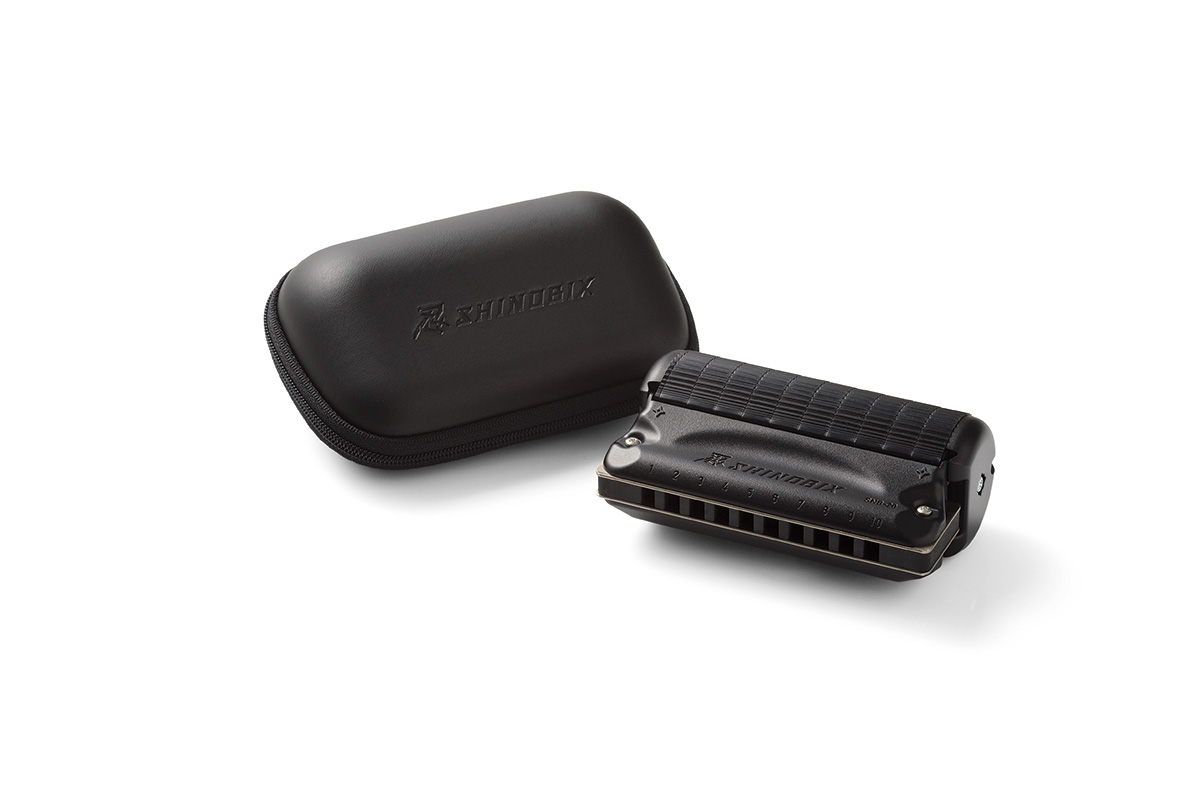
Harmonica is a popular and attractive instrument easy to play among wider walks of people. But its comparatively loud sound often becomes a burden when players practice. New Suzuki SHINOBIX 10-hole harmonica with a silencer is expected to solve the sound control problem.
SHINOBIX reduces sound pressure of harmonica to 1 fifth of regular level, allowing players enjoy harmonica performance regardless of place and time. The world’s first mass-produced harmonica with a silencer is attracting interest in the market for its unique character and impressive product name (meaning Ninjya).
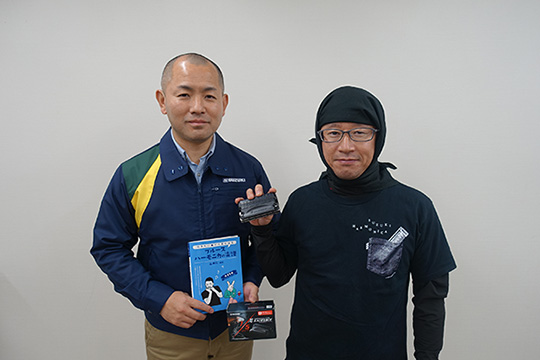
Kiyota Yamauchi of Suzuki Musical Instrument Manufacturing says, “We understand there are players who have difficulties practicing harmonica. It goes the same with every type of musical instrument. It’s required that manufacturers provide customer with solutions to expand the market and increase music makers.”
The cylindrical silencer built into SHINOBIX is consisted of 10 parts each responds to individual mouthpieces. By making internal parts helix, the silencer effectively reduces sound pressure. The silencer is removable when not necessary, and maintenance and cleaning are easy. (photo above: Kiyota Yamaguchi, l. and Tokuichi Inoue in Ninjya costume)
Tokuichi Inoue, Product Development Dept. of Suzuki says, “What we sought was a no-nonsense instrument as a traditional harmonica. It should come in close size and be played in the same play feel as standard 10-hole model. Otherwise, it looses its role.” Users with almost all conventional Suzuki 10-hole harmonicas can take advantage of the silencer capability of SHINOBIX simply by replacing top cover.
Player can monitor his or her performance when a microphone is attached to the silencer through headphone, or enjoy different sound adding sound effects.
Suzuki offers 2 packages; Complete Package of a silencer and harmonica for first-time player, Owners Package of a silencer and harmonica cover in addition to a single cover. They are attractively priced, and user-friendly as player doesn’t need to buy multiple silencers for harmonicas of different pitches.
First introduced at the 2018 Musical Instruments Fair in Japan in last October, SINOBIX drew attention and interest of professional and amateur players as well as music retailers. According to Suzuki spokesman, it has almost sold out instantly. The company is planning to develop chromatic harmonicas with silencer.
Yamauchi comments, “We are very excited with the responses from the market and customers. It tells us there’s a sizable market for musical instruments with silencer. We feel customer expectation for unique ideas and products not available in the market before. It’s our great pleasure if SHINOBIX inspires people and get them involved in making music with harmonica.”
Suzuki plans to showcase SHINOBIX at the coming NAMM Show in January and expects distribution in the world markets.
Yamaha Venova Wins 2018 Asia Design Award
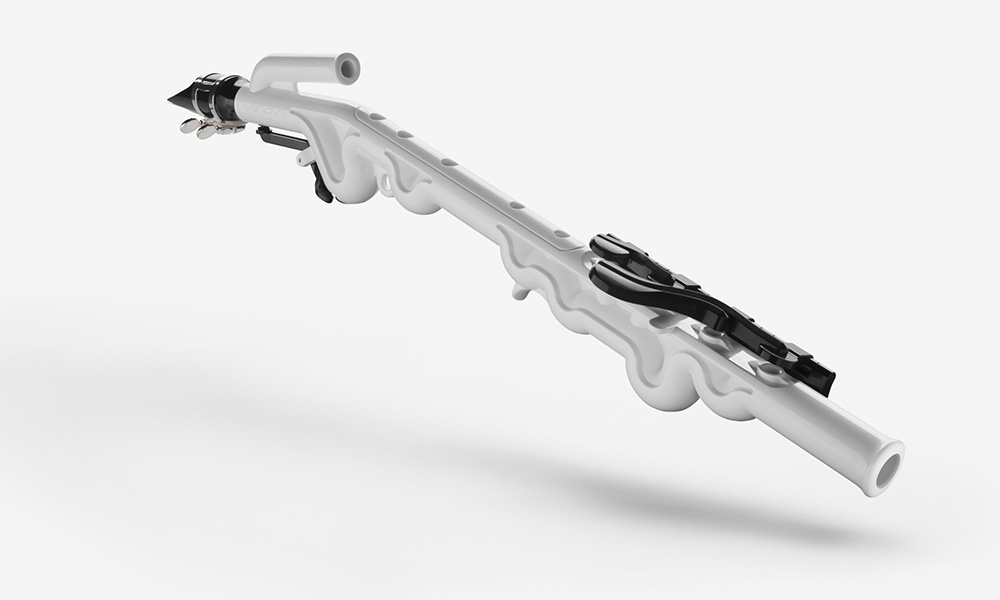
Asia Design Award 2018 chose Yamaha’s casual style wind instrument, Venova, as Grand Award with Special Mention.
Organized by Hong Kong Design Center, Asia Design Award was inaugurated in 2003 in Hong Kong to celebrate excellent designs and their designers representing and influencing Asian life style. Awards are chosen from 26 individual categories, and Venova received Excellent Award in nomination for Grand Award.
Venova won 2018 Design Award as the second honor following the Good Design Award last year.
61st String Instruments Fair: Overseas Exhibitors Increases 27%
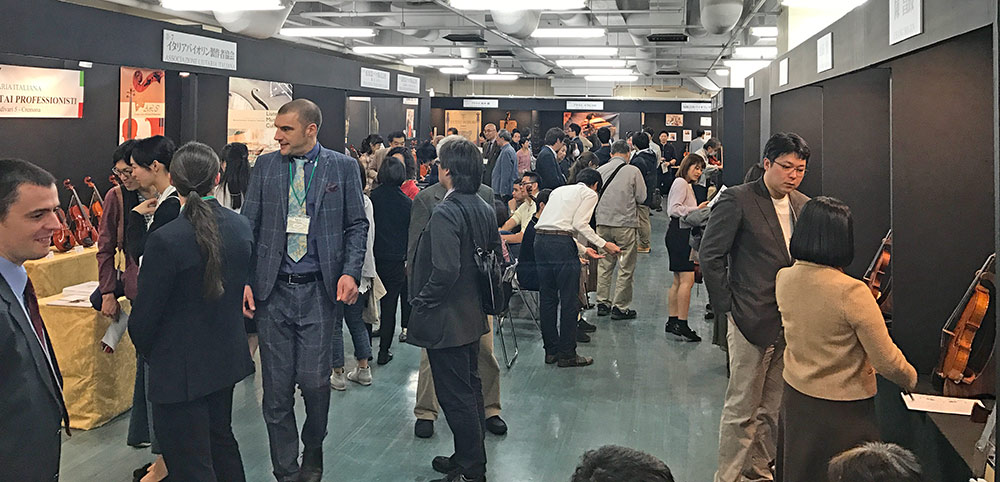
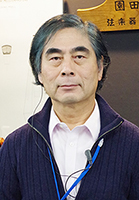
Japan String Instrument Makers Association held 61st String Instruments Fair from Nov. 2 through 4 at Tokyo Science Museum.
A total of 3,258 visitors filled the exhibit floor looking for hand-made violins, guitars and bows by the luthier members of the association and imported models as well as related accessories and printed music.
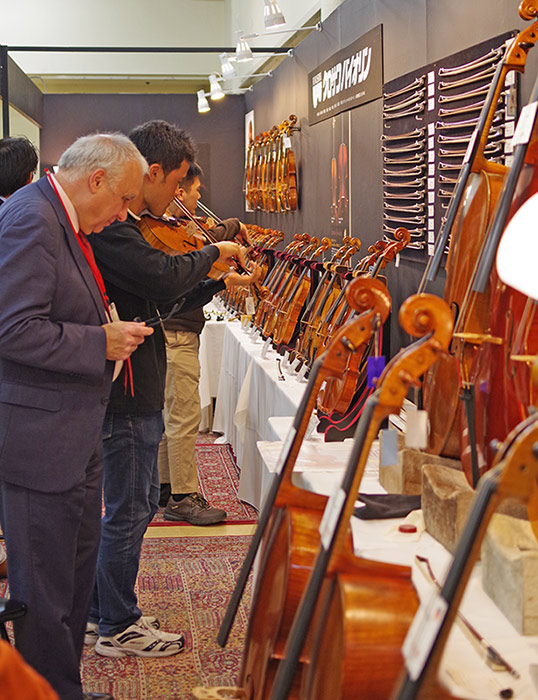
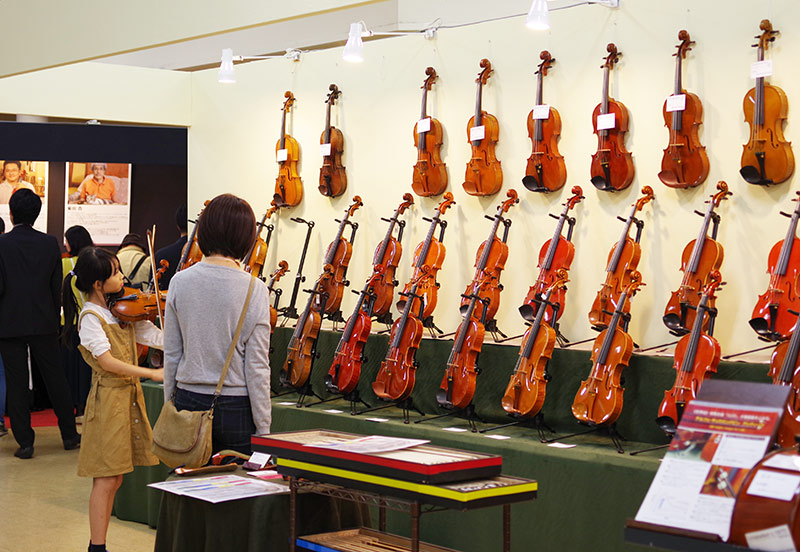
The 61st session welcomed 28 exhibitors from Europe, China, Taiwan and India, a 27% increase from the previous year. Nobuhiro Sonoda, (photo top left)president of the association attributed it to growing recognition of the fair in the global string instruments society.
A host of musical entertainment programs and seminars also helped draw general music fans.
Record Attendance for 2018 Musical Instruments Fair Japan
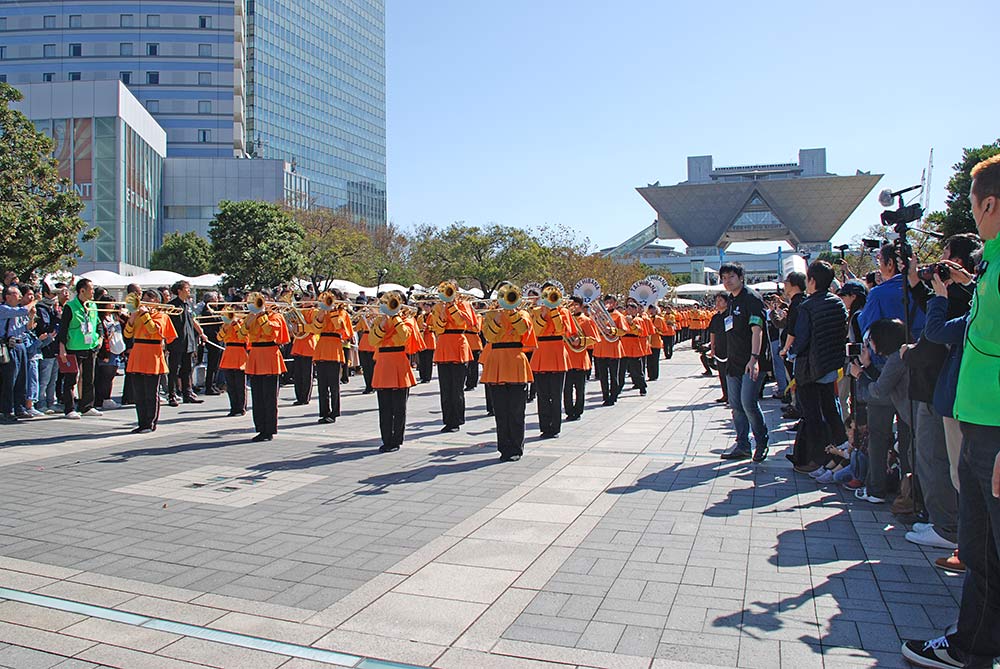
Musical Instruments Fair Japan, which celebrated 50 years history took place for 3 days from October 19 (Fri.) through 21 (Sun.) at Tokyo Big Sight, and closed with a great success marking the largest ever 50,000 plus visitors.
Under the banner of “Play, Blow, Hit! Let’s Enjoy Music!!” the event provided general public with a host of enhanced hands-on programs for first time music players as well as demos, demos of exciting new products and a mega shopping mall where the visitors got inspired by the on-site music lessons could buy any musical instruments of their interest. (photo: Kyoto’s Tachibana Senior Highschool Marching Band enthralled the visitors with their dynamic performance.)
It drew 50,841 visitors, a record level, though the number of exhibitors including music stores represented at the shopping mall were 150, fewer than the previous fair. They flooded throughout the exhibit floors, and enjoyed music playing experience and entertainment programs. The excitement and pleasant atmosphere felt at all areas well reflected high expectation for the Fair held once every two years.
Outset as a public show, but this session the organizer reserved 19th morning exclusively for business, and more than 400 music retailers visited the fair site for checking new products, Fair special models and looking for new business connections.
The attractive music entertainment programs including popular senior high school marching band shows, Drummers Paradise which invited drummers to compare sounds of 21 brands, 40 sets of drumset provided by the exhibitors, Synth Fest and Premium Grand Piano Experience staged at atrium, reception hall and exhibit floors apparently helped contributed to draw record number of visitors. (photos right: Premium Grand Piano Experience and Drummers Paradise)
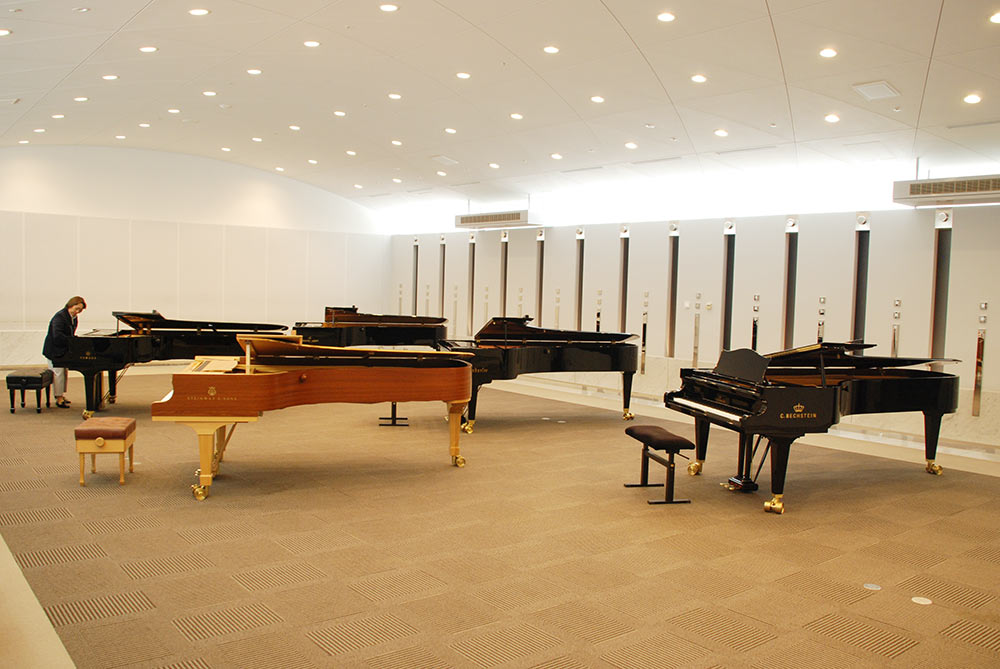
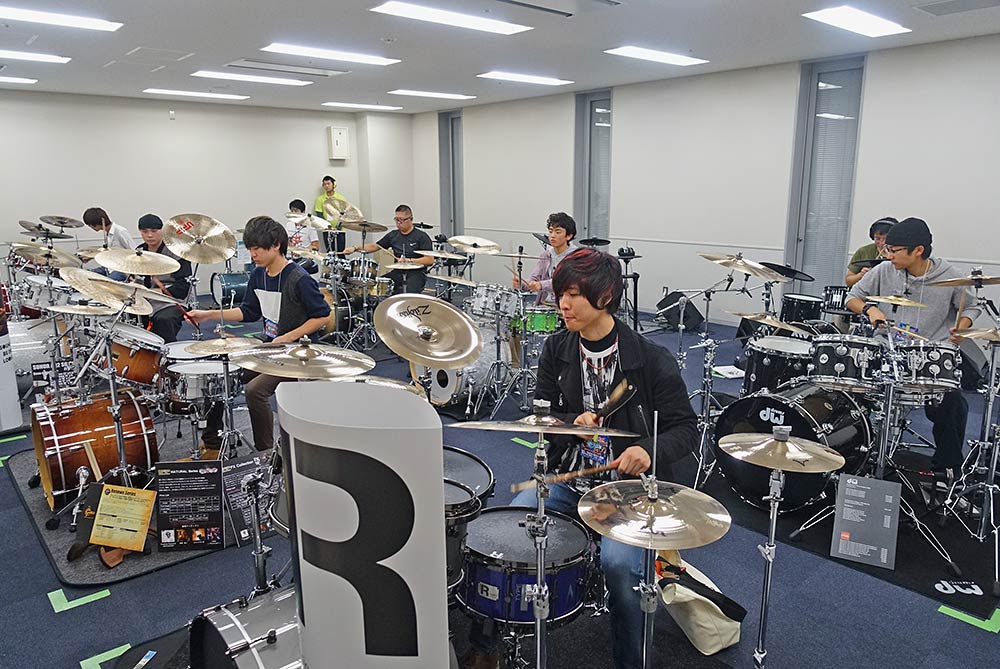
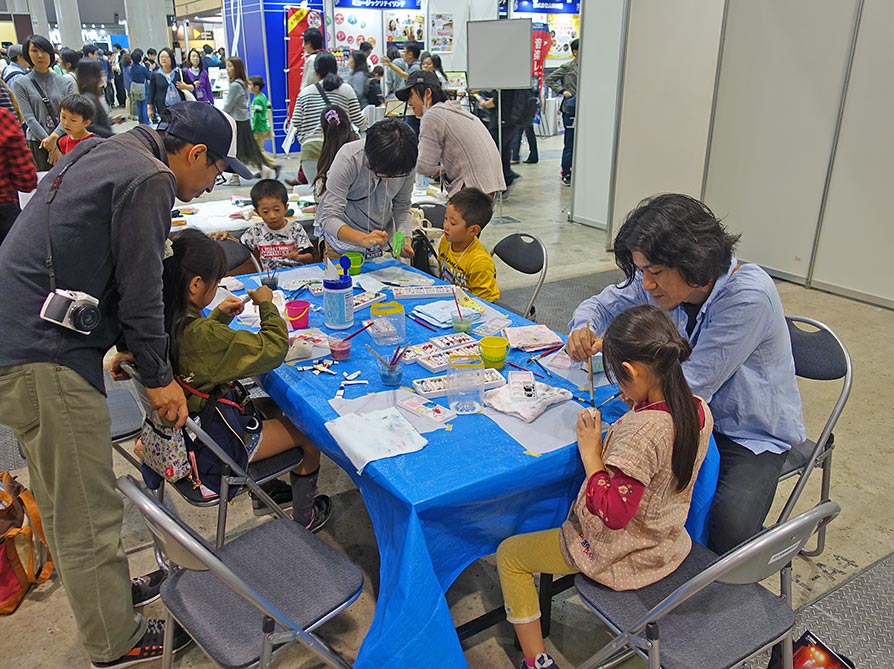
It’s quite natural wanting to buy interested musical instruments after experiencing hands-on. The visitors directed to mega shopping mall to purchase 49 million yen worth of music products for the 3 days. The music stores participated in the mall apparently appreciated the opportunity to promote themselves and inventories to prospective customers from remote areas for the coming best business season.(photo left, parents and kids build original musical instruments.)
2018 Musical Instruments Fair effectively served the purpose of increasing music makers with increased expectation for its role in the future. (photos: Mega Shopping Mall sold 49 million yen worth of musical instruments for the 3 days. visitors looking for music books and scores on sale.)
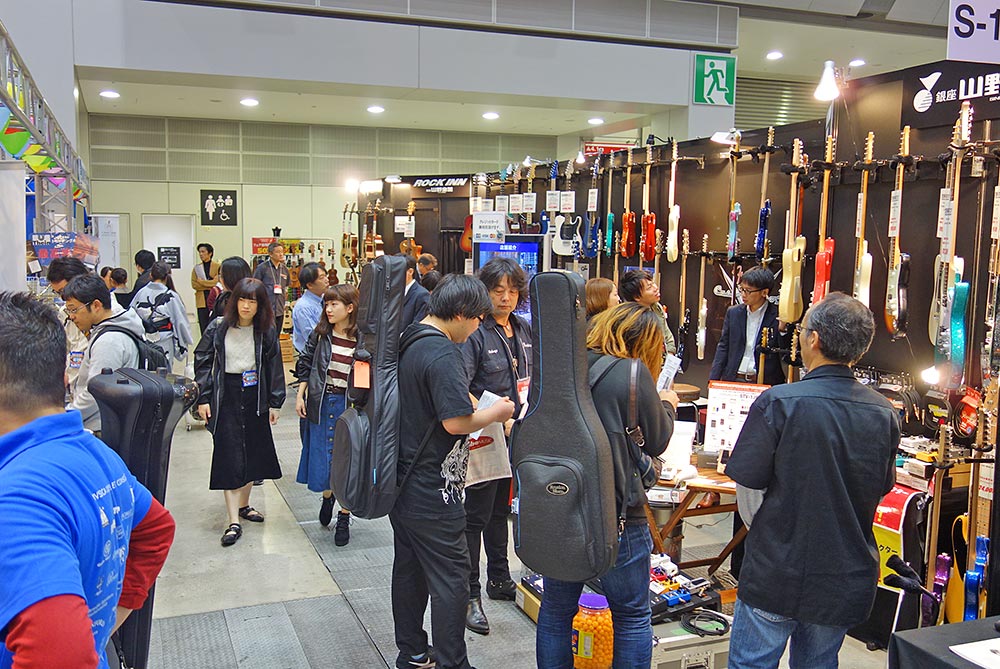
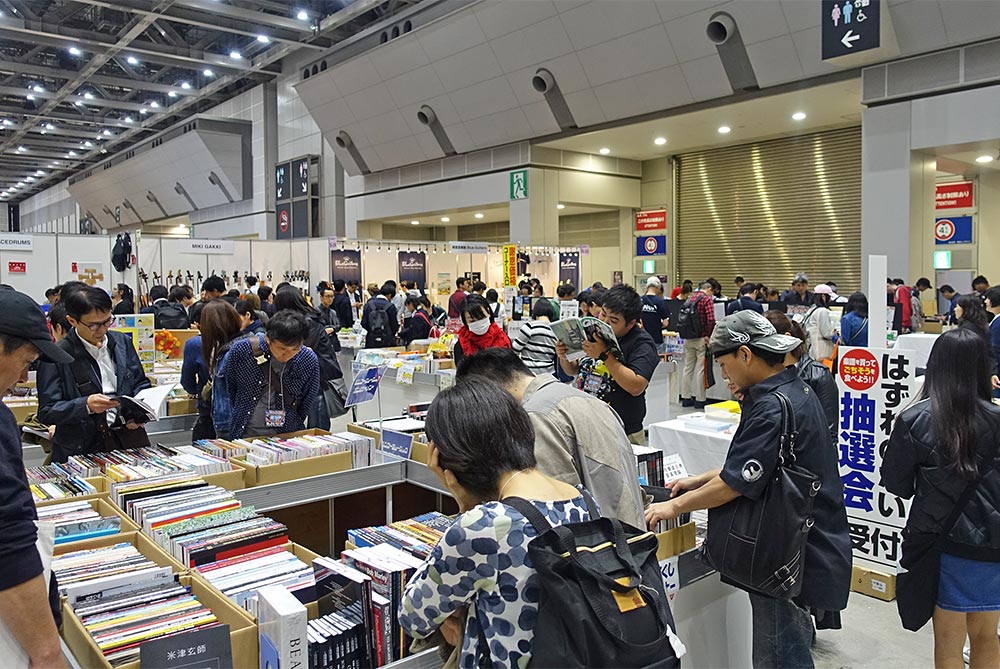
More Business-oriented 2018 Musical Instruments Fair Japan
In the 19th afternoon during the 2018 Musical Instruments Fair Japan, Japan Musical Instruments Association hosted 3 business seminars for the industry members:

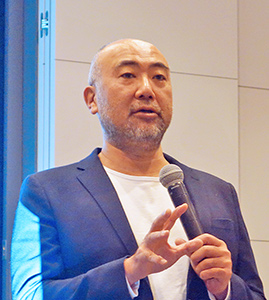
1. U.S. Music Products Retail Market Presentation by Mr. Joe Lamond, NAMM president
2. Competitive Strategy as a Narrative Story seminar by Ken Kusunoki, business scholor, professor of Hitotsubashi University Graduate School.
3. Panel discussion: Future Style of Music Retailers: Toshiaki Hirose, president of Shimamura Music Co., Ltd, Hiroaki Takeshima, president of Music La Festa and Daisuke Matsumoto, president of Rittor Music, Inc. as the panelists. (photos from l. to r., Joe Lamond, Ken Kusunoki, and the 4 panelists (Ken Kusunoki, Toshiaki Hirose, Hiroaki Takeshima and Daisuke Matsumoto)
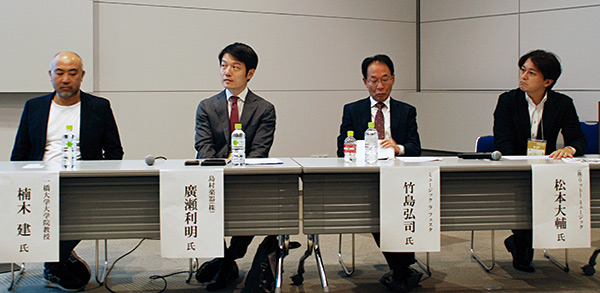
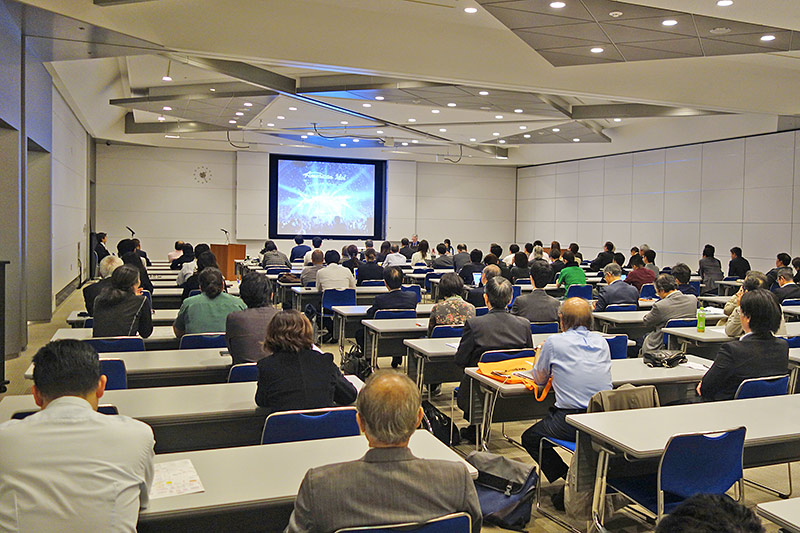
Japan Musical Instruments Association hosted an industry reception in the 19th evening at the Reception Hall of Big Sight. Takuya Nakata, JMIA president (photo bottom left), commented in his speech that the business seminars and the panel discussion gave the industry some key clues in doing business in a society where seniors share one third of the population in the near future.
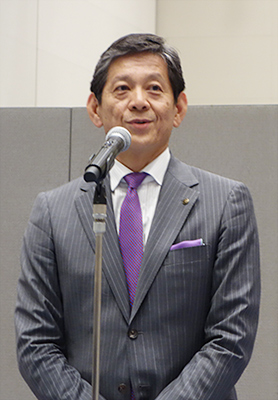
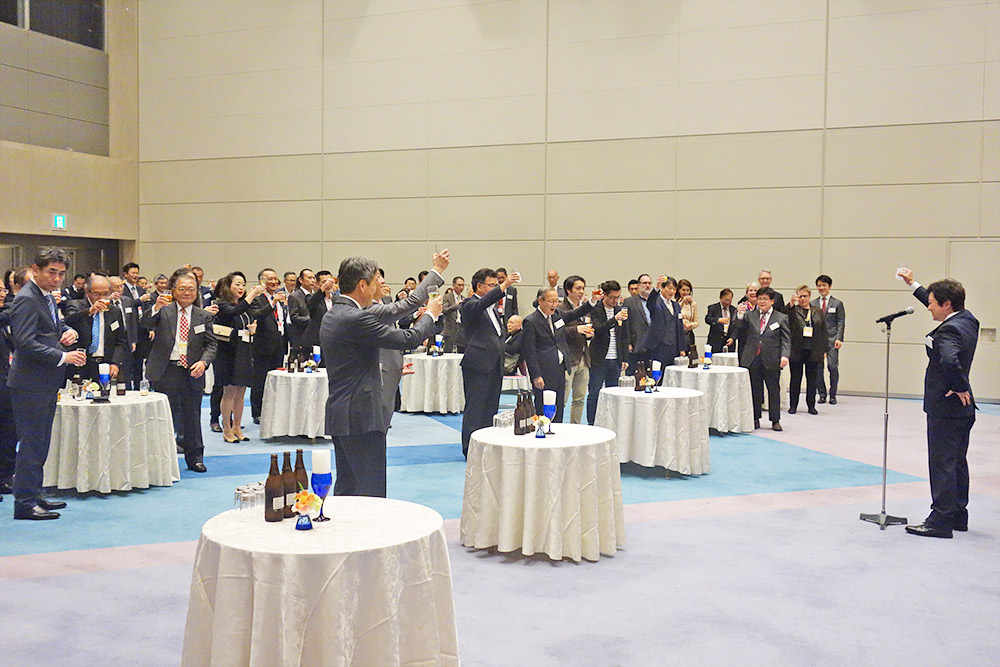
Kawai Unveils 100 Million Yen Crystal Clear Grand Piano
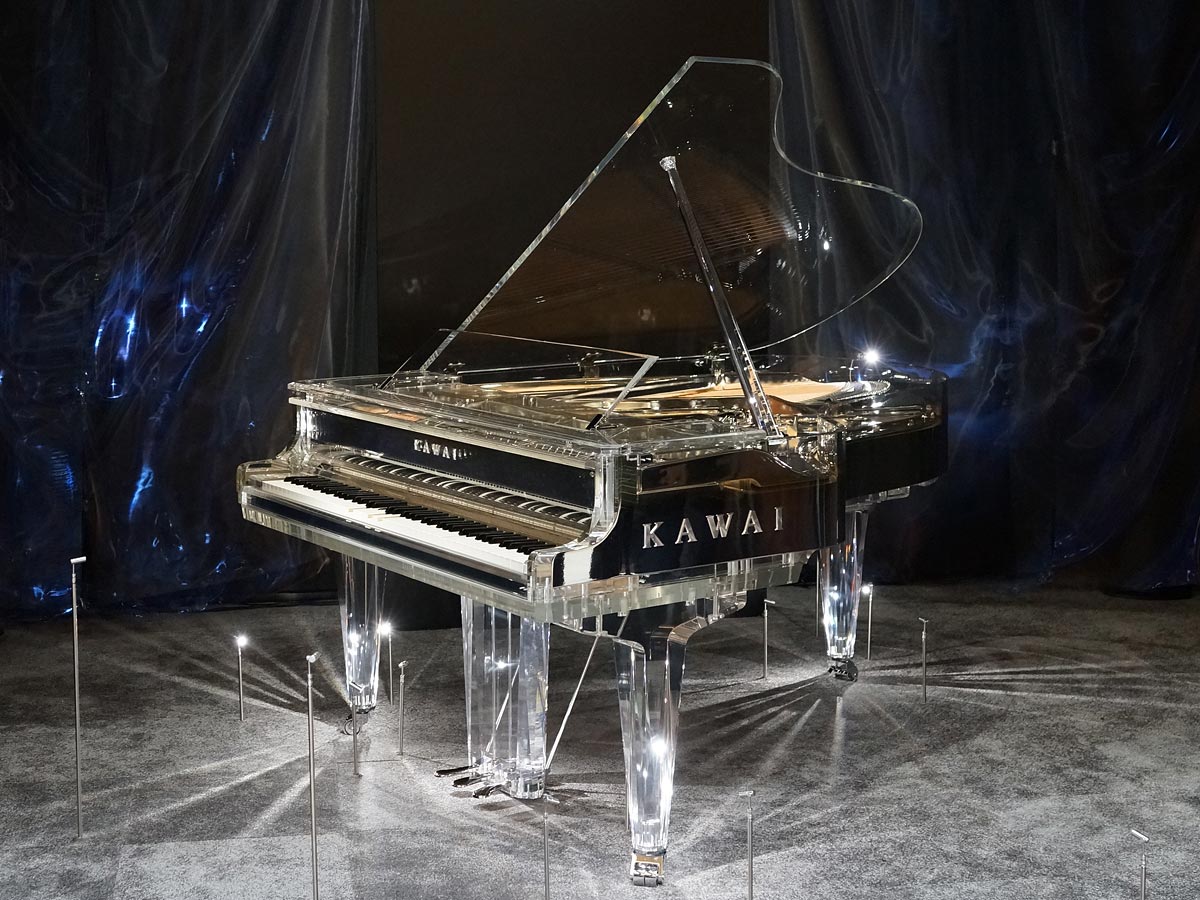
Kawai staged a press conference on October 19 at Tokyo Midtown, Roppongi, to announce CR-1M crystal clear grand piano built in commemoration of the company’s 90th anniversary.
As a limited production model, 5 units are exclusively built and distributed at 100 million yen retail excluding consumption tax.
Crystal clear piano cabinet isn’t new to Kawai. Actually the company started development of a piano in transparent case using acrylic material in 1971. A prototype completed in 1973, and advanced CR-40 put into the market in 1992. Today, the company builds CR-40A, 6.4 million yen retail, to order.
Coming in a completely new design, Kawai plans to explore a new luxurious market with CR-1M.
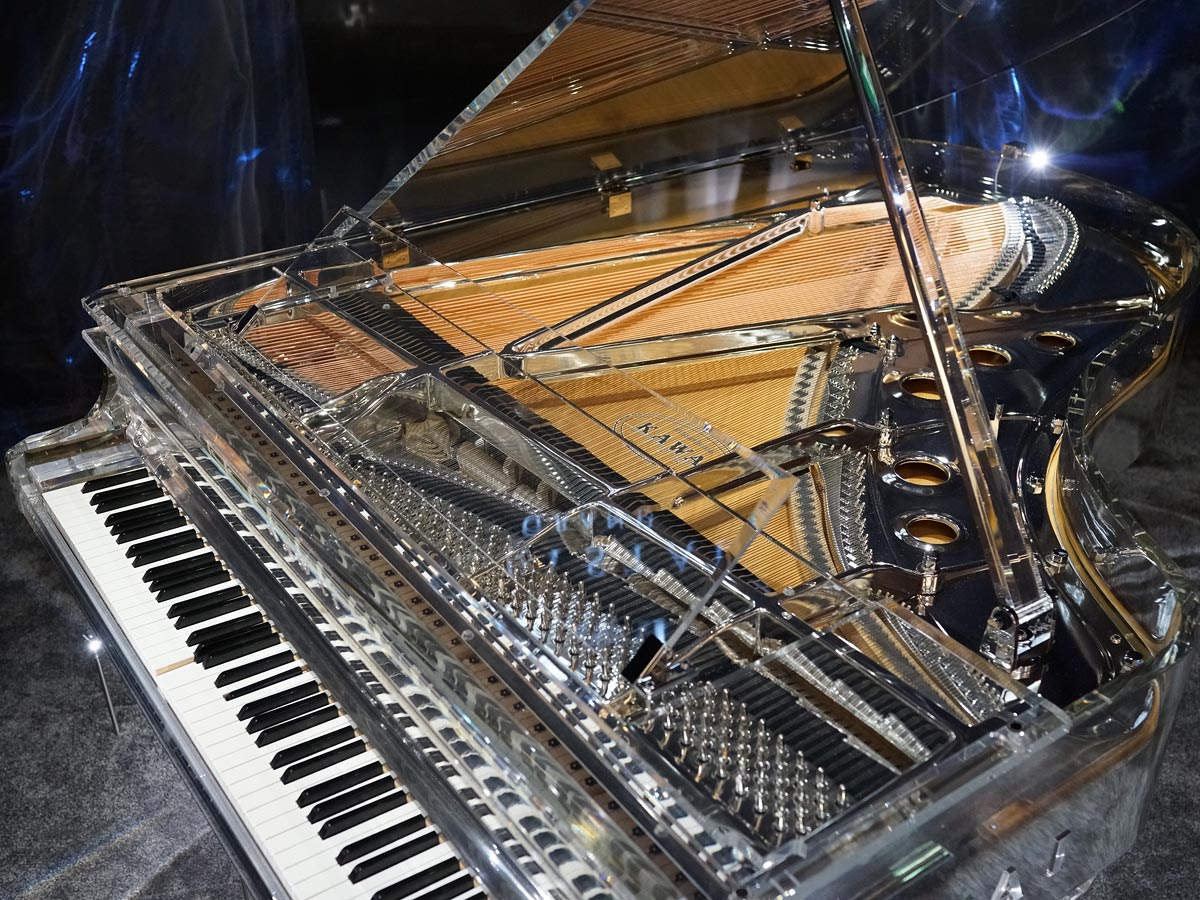
Kentaro Kawai, senior managing director of Kawai said in his opening speech, “It’s our first approach to build only 5 units of precious grand piano to order, and also it represents our pride as a piano maker making headway toward 100th anniversary.”
According to Shoe Eitaki, general manager of Product Planning and Design Section, CR-1M is designed to provide luxury atmosphere, and enhance elegance of pianists in pursuit of maximum effects of two opposite optical factors, light transmission and reflection.
Based on architecture of Shigeru Kawai, the flagship model, it’s carefully built with meticulous hands and eyes of Kawai master craftsmen in quite delicate balance.
Bottom half of the case comes in silver-plated mirror polish, while the upper half allows perfect transmission of lights. The two different parts meet in the middle of the case, and generate subtly gradient focal effect. As pianist expresses his or her emotion, the piano beautifully reflects the player’s personal characters. While keeping traditional form of piano, it employs a unique case 17% shallower than conventional grand model. CR-1M generates fantastic feeling as if it’s afloat. Kawai accepts requests for custom change of details.
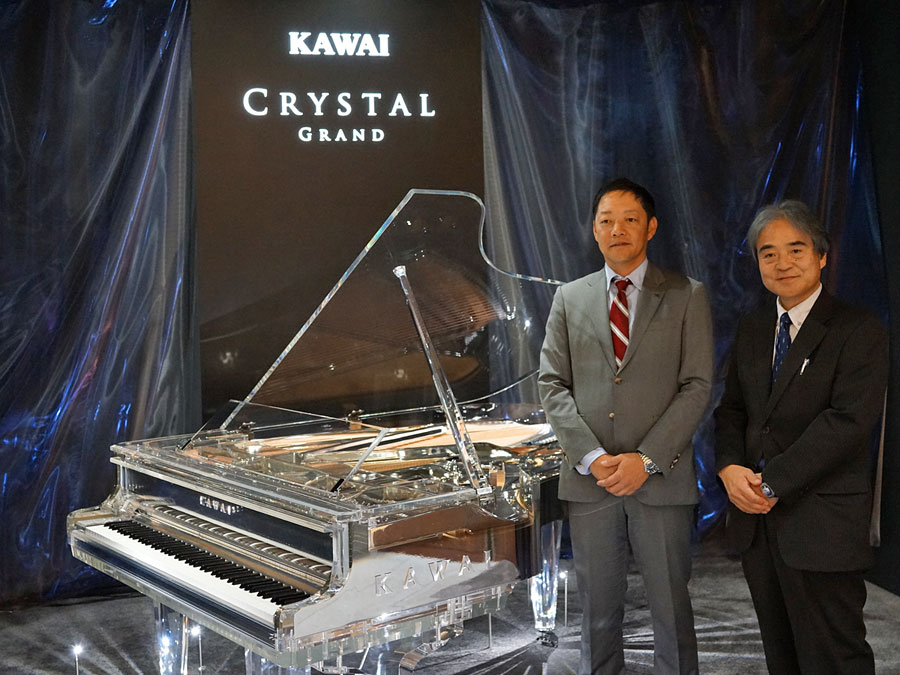
Yoshiki of X JAPAN, who loves crystal clear grand piano, commented in his video letter that he had been testing and playing the new model since two years ago, and eventually a great piano exceeding his expectation
was born, and it perfectly fits his taste.
About the pricing of CR-1M, Eitaki said, “It comes at an extraordinary price of 100 million yen. In the process of our engineers and craftsmen pursuing the highest level of technology and materials in every detail, it came out that not a few works could best be done only by human hands from silver-plating of the case to exclusively designed bolts and nuts carved and polished by hands, and two to three extra pieces of case built and selected for ultimately beautifullook.” (photo above: Kentaro Kawai, left, and Shoe Eitaki.)
Kawai displayed CR-1M at basement galleria of Tokyo Midtown Bldg. until November 4 to deliver alluring sound produced by the built-in automatic playing system.
Industry Close-up: Korg EK-50 Entertainer Keyboard
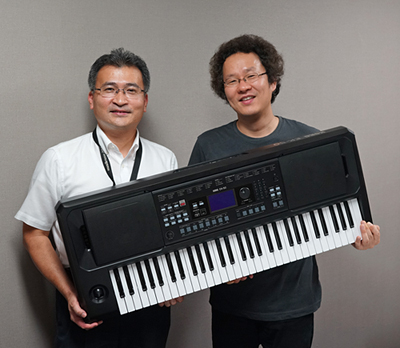
Korg has recently introduced EK-50 Entertainer Keyboard with built-in automatic backing capability, a refined model of Pa series keyboards, which provides inexperienced players with rich musical expression producing bass chords by one single left hand finger. Satisfying the needs of mobile musicians, the Pa series has already established itself in European markets.
Toshiya Nishida, Product Planning Dept. of Korg says, “Pa series deserves the name of Professional Arranger Keyboard. That’s why they have won reputation largely from professional and semi-professional players. On the other hand, the cost-efficient EK-50 provides more value than price, and is designed with entry-level customers in mind to further explore keyboard market.” (photo: Toshiya Nishida, left and Hideaki Aoki.)
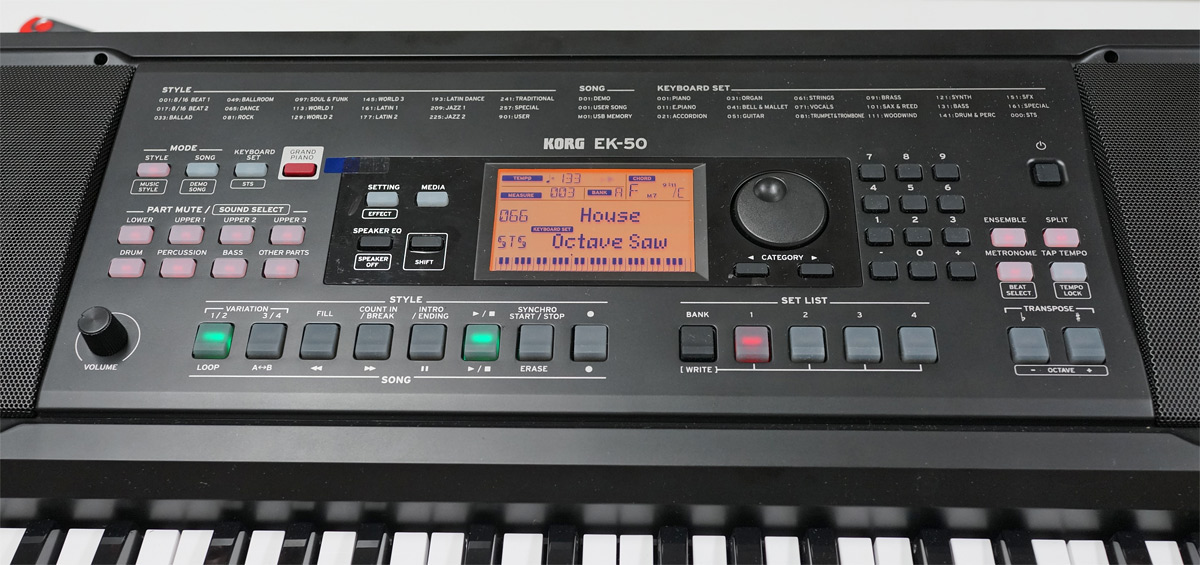
While Pa series comes at relatively expensive price range, EK-50 is an affordable instrument self-containing a keyboard with full-size keys and speakers. Recognizing market potential for the keyboards with built-in automatic backing capability, Korg expects that EK-50 can meet the demands among senior users having organ and piano experience. These days, increasing number of cafe is providing casual style live musical performances in Japan. Soon it may become a common scene that more professionals and semi professionals perform at restaurants and private homes carrying out own music and sound gears with them like their counterparts in Europe. (photo above: The control panel is meticulously designed for intuitive and simple edit works.)
Upgraded automatic backing styles
In designing EK-50, Korg developed original sound generators and 280 pre-programed automatic backing styles borrowed from Pa series models as well as new trend styles favored by EDM performers. They allow musician to select from two types each of Intro, Fill-in, and Ending patterns as well as different performance patterns depending on major or minor chord. All these ideas are outcome of accumulated database for Pa series.
EK-50 has a total of 64 music styles, which provide player with impromptu and user original musical sequences simply by selecting favorite style names good for in-store demo.
Remarkable features on live stage
Since EK-50 is designed to provide gorgeous backings just pressing chords matched to rhythms and jam along to melody, even player with little musical experience can enjoy performing a whole tune after practicing 15 minutes a day for 1 week or two.
Other features appreciated for live stage include key split and line out functions, two USB output ports and compatibility with WAV, MP3 and MIDI files. Speaker EQ button can instantly adjust tonal quality matched to living room, studio and live house. An elaborate joystick controller of Pa series is standard to EK-50. It allows intuitive control of choking and vibrato effects at the same time easier than maneuvering two wheel controllers simultaneously.
Hideaki Aoki, PK Group Manager of Product Development Dept. says, “EK-50 provides user with a pleasure of music playing instantly, but it also gives him a sense of accomplishment as performance improves little by little. It’s a great advantage of EK-50. Also, it has outstanding performance ability in this price range, which can even satisfy needs of professionals.”
To help boost sales of retailers, Korg is now developing matched stylish legs and a digital signage to be placed on the music rack and demo videos as well as optional downloadable music styles for individual local markets.
Korg Publishes A Book Describing 55 Years History
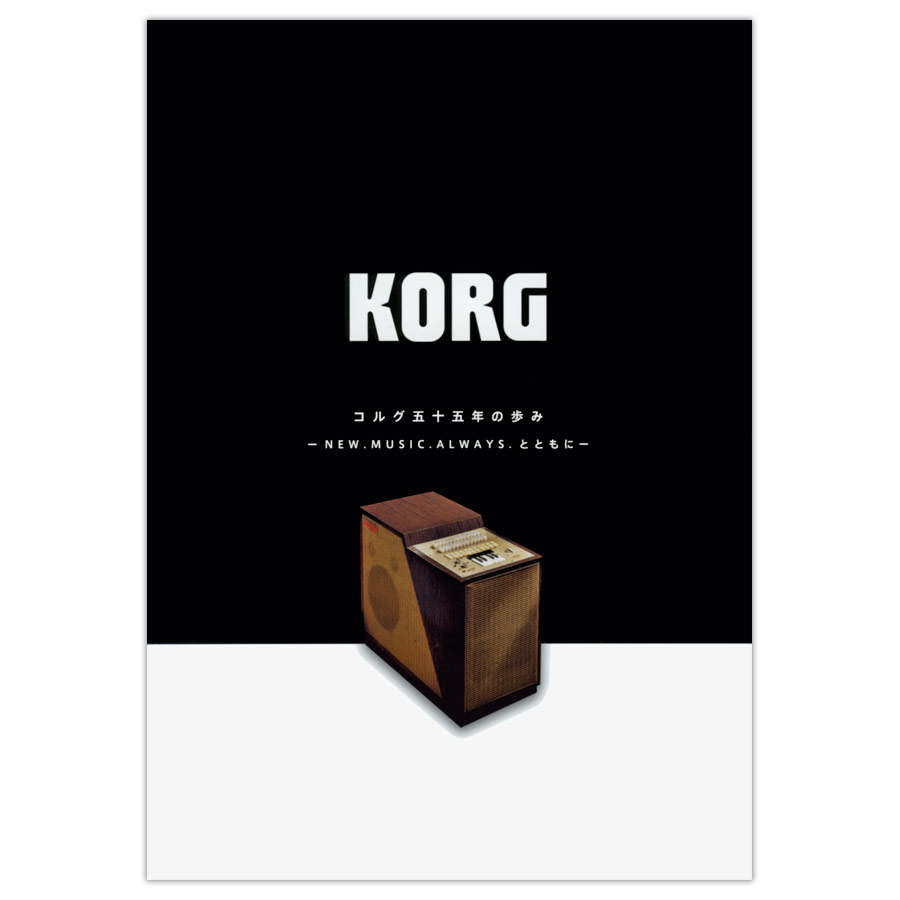
Korg recently published a book titled, “55 Years of History-NEW, MUSIC, ALWAYS, We Have Come Along With”. The 380-page grand publication contains impressive episodes of legendary Tsutomu Kato, founder of Korg, who passed away in 2011, flashback of early days, encounters with name collaborated musicians and engineers, advent and development of digital technology and competitive climate with the industry giants. It will be appreciated by wider walks of people in the industry ranging from young engineers to veterans.
When it comes to digital musical instruments, we are likely to spotlight on remarkable technical achievements and success, but Kato, who was born to a family in retail business, and spent early days in trading goods before launching Korg, had sharp eyes from the standpoint of customer, and showed a sense of astute businessman backed by definite corporate policies. Today, his philosophy is shared by later generations of Korg management team and engineers as well.
Tomoaki Tanaka, associate professor of Tokyo Keizai University, a supervisor of the project, is known as a specialist of musical instruments and music products industry.
Fumio Mieda, now auditor of Korg, and a fabled engineer in the industry, who has spearheaded product development of the company from earlier stage to today served as editor-in-chief.
Completed by veteran Korg staff with help of the two experts, the book not only tells detailed history of Korg but also provides insights into historical development of digital musical instruments.
2018 Musical Instruments Fair Japan, Oct. 19 (Fri.) – 21 (Sun.) At Tokyo Big Sight
A total of 111 companies and 9 groups take part in the coming 2018 Musical Instruments Fair Japan to be staged at Tokyo Big Sight. First staged in 1968, this session celebrates 50th anniversary.
Originated and still organized as a public show for general music players and enthusiasts, it has largely targeted to increase music makers of all age groups offering a host of musical entertainment programs including concerts, demos, hands-on sessions and programs to invite non-music makers to experience musical instruments of their choice.
The 2018 Fair emphasizes it’s efforts to attract visitors with no musical experience more than ever, and it plans to have them experience the sound of ocarina, accordion, harmonica, ukulele and key harmonica.
Pianists are cordially invited to experience premium grand pianos at minimum fee of 6,000yen per 25-minute timeframe to feel the difference and characteristic sound of individual brands.
Also drummers can experience acoustic and digital drums, and cymbals of various makes including overseas brands in sound-controlled rooms.
The first day morning is exclusively reserved for the music products industry members for business meetings. Participation to the Fair will give them ideas and thoughts for new products and marketing for the coming holiday season.
2017 Japan Musical Instruments Industry Surveys Summary
Japan Musical Instruments Association conducted the first ever industry surveys in 2016, sending a separate questionnaire to manufacturer and retailer members. The reports appeared in July, 2017 and April, 2018 issues of Japan Music Trades, respectively.
The association conducted the 2nd surveys recently, sending a questionnaire to 73 manufacturers, of which 44 responded, and to 384 music retailers, of which 80 replied. Here is the summary.
2017 Manufacturers Survey Summary
Wind Instruments Production Maintains Good Business
Positive Trend for Guitars and Related Products
Exports increased slightly in unit, but gained 17% in value to 213.54 billion yen in 2017. While domestic production showed a different pattern with a 12% increase in unit and an 8% decrease in value to 50.7 billion yen. That indicates average unit value of not a few items declined.
Production of large keyboard instruments including pianos and electronic organs went down with 8% minus in unit for grand pianos to 3,289 units, and 16% minus in unit for upright pianos to 9,657 units. Average unit value decreased 12% for grand piano and 11% for upright pianos. Digital pianos modestly declined in both unit and value.
Export of pianos jumped up in 2017 with a 67% increase of grand pianos, which were 12,924 units, and 60% increase of upright pianos, which were 142,309 units. Digital pianos also showed a healthy growth of 23% to 113,4092 units. Average unit price of all categories went up accordingly. Electronic organ export jumped by 25% in unit.
Domestic piano market remains challenging affected by strict competition with pre-owned acoustic pianos and digital pianos.
Wind instruments and guitars achieved rather excellent shipment in domestic market in 2017. Other than flutes & piccolos of which sales slightly increased in unit, average unit price of clarinets, saxophones, trumpets & cornets, trombones, other brass and other woodwind instruments went up by 10% (26% increase for other woodwind instruments), though they went down modestly in unit. It reflects growing user preference for more expensive models and demands for trade-ups.
Export of acoustic guitars, electric-acoustic guitars, electric guitars & basses, guitar & bass amps, guitar effects processors, tuners, guitar & bass strings advanced both in unit and value. Domestic sales (shipment) of acoustic guitar increased 5% in unit, and 35% in value. Electric guitars & basses increased 92% in unit, and 58% in value. Though domestic sales (shipment) of guitar & bass amps decreased 11% in unit and 18% in value, guitar effects processors and tuners increased 50% in unit and 31% in value. Guitar & bass strings also advanced 37% in unit and 13% in value.
Ukuleles have been keeping popularity in global markets these years, however, production significantly dropped to 354 units, one twelfth of the previous year. This apparently attributes to wrong reports from manufacturers or misprocessing of the collected data.
Production of percussion instruments was also good with 35% increase in unit for drum sets accompanied by some increase of hardware in both unit and value. Cajons increased 14% in unit though average unit price modestly declined. On the contrary, average unit price of marching drums went down 12%, but production decreased 14%. Production of educational percussion doubled in unit, but decreased 12% in value.
Sales of sticks and mallets indicate activity level of percussion players. Production of these items increased 18% in unit. Average unit price rose 5%. It’s a positive sign for the future business.
Production of digital drum sets decreased both in unit and value. After continuous sales growth, it seems to have come to a temporary stall.
Other musical instruments, which gained substantial production increase include accordions, 30% plus in unit and 39% plus in value and ocarina, a remarkable159% plus in unit and 24% in value.
In Audio products segment, upper models of simple self-contained PA systems increased 7% in value, while they decreased in unit. Demands remained high for hard disk MTRs and portable digital recorders.
(Note: The statistics only refer to production (shipment) level of musical instruments, and doesn’t include inventory in stock.)
2017 Retailers Survey Summary
The sales volume by category; guitars (30%), pianos (26%), wind instruments (16%), printed music (8%), percussion instruments (4%), stringed instruments (3%), miscellaneous (13%)
Pianos (including acoustic pianos, digital pianos, automatic player pianos and pre-owned pianos)
Sales of pianos excluding pre-owned grand pianos increased in unit over the previous year. New digital pianos were only single category with lower sales in value than the previous year. They increased 5% in unit, but decreased 12% in value. Average unit price declined by 30,000yen.
Pre-owned grand pianos restored in good conditions are harder to find these days reflecting growing popularity in overseas markets. The plain 2017 figure may tell poor inventory of qualified instruments in the market.
Sales of new grand pianos increased 15% in unit with a 100,000yen rise of average unit price. Upright pianos recorded 40% more sales in unit, and 44% in value. Average unit price rose 30,000yen. Pre-owned upright pianos also sold well with a 19% increase in unit. Average unit price went up 15,000yen.
Demands were strong for used digital pianos, which increased 75% in unit and 158% in value.
The background of big increase in unit on some items is probably more retailers responded to the survey than previous year. But higher average unit price suggests increasing demands among adult music makers.
Electronic organs and school-use organs, portable keyboards
Sales of portable keyboards increased 3% in unit and 21% in value. Average unit price rose 18% to 20,000yen. Music teaching laboratory for children is the single largest market for electronic organ. While it’s expanding to adult hobby market and attracting old time players, the category declined 15% in unit. Increased average unit price of 40,000yen helped saved the dip in value to minimal 5% level. Sales of school-use organs significantly increased 32% in unit and 42% in value. Average unit price increased 10,000yen.
Wind and stringed instruments
Wind instruments category recorded healthy growth except for clarinets, trumpets and cornets, which declined modestly in both unit and value. Saxophones were exceptionally strong with 14% sales increase in unit and 12% in value. The music retailers reported other brass instruments including horns, tubas and euphoniums were also robust, which resulted in 17% increase in unit and 14% in value. The market is supported by broad customer base of symphonic bands. Also, it’s safe to say that players are opting higher quality instruments.
Stringed instruments including violins are continuously growing backed by surging popularity among amateur orchestras and adult players. Demands are said to be high for fractional violins these days.
Guitars including acoustic and electric guitars, amps and effect processors
Sales of guitars in total dropped 12% both in unit and value. Average unit price of new acoustic guitars rose 24,000yen to 70,000yen. The category increased 20% in unit and remarkable 84% in value. When it comes to used acoustic guitars, average unit price climbed to 173,000yen, an increase of 27,000yen. They increased 31% in unit and 55% in value. Naturally, purchasers of used guitars are higher in age, and they are likely to find value more in used gears than new ones. Growing demands are also evident with electric guitars and basses though they are much inexpensive than acoustic counterparts.
Sales of guitar and bass amps dropped 34% in unit and 38% in value. Reflecting dull band activities, guitar effects processors, tuners and guitar & bass strings have all lowered the sales level of 2016 with 10% decrease in unit. Ukuleles maintained stable growth not much affected by increasing competition in the market with 14% plus sales in unit and 25% plus sales in value. Average unit price rose 10%.
Percussion instruments including drum sets, marching drums, educational percussions, xylophones, glockenspiels, digital drums, cajons, sticks and hardware
Sales of drum sets and unit drums kept the near level of previous year both in unit and value. But average unit price of unit drum rose 14% to 53,000yen. Robust demands for hardware pushed up sales 54% in unit and 63% in value. Based on the sales of small accessories, customer base for percussion instruments look to be the same at best, or a little slimmer than the past years. But percussionists keep passion in buying something to enhance their performance.
Sales of digital drum sets and unit drums declined near 30% in unit, however unit drums rose 122% in value, and average unit price jumped up 183%. It suggests consumer purchased higher-priced value-added products than the year before.
Digital musical instruments including hardware synthesizers
Last year saw sales of more than 10,000 units of hardware synthesizer. They dropped by 70% in unit, but average unit price rose 57% to 85,000yen. It’s said that enquiries for 88-key stage piano are growing, which means the market is driven by high-ticket models verifying the trend of demands divided into inexpensive basic models and expensive upper class models.
Sales of other digital musical instruments dramatically rose 292% in unit and 738% in value. This category is comprised of all digital instruments except for those models with keyboard. Because of the enormous variety, It’s hard to define which products most contributed to the exceptional performance, however, given the 253% average unit price increase to 38,000yen, we estimate that customers purchased many of the products in lower price range between 50,000yen and 100,000yen.
Other musical instruments including harmonicas, key harmonicas, accordions, recorders and ocarinas
Sales of harmonicas declined nearly 20%, while key harmonicas gained 107% in unit and 109% in value. Significant sales increase of accordions is likely attributed to vigorous purchase by individuals, not schools, which is the single largest customer of this category. It also reflects profiles of reported retailers much different from the previous survey.
Ocarinas maintained the sales level of the year before both in unit and value, which means stable demands among adult amateurs.
Sound and recording products including power amps, mixers, speakers, microphones, MTRs
Almost all categories of this segment well advanced in unit. Power amps rose 142%, wireless microphones went up 139%, and portable digital recorders achieved a remarkable growth of 434% though average unit price declined between 10% and 20%.
Computer software & DJ hardware including music production software, computer peripherals, DJ mixers & controllers, lighting equipment
Despite manufacturers and distributors commented flat sales of these products in the year, this segment nearly doubled or tripled both in unit and value. The survey suggests the figures don’t reflect the trend of the market.
Printed music
Sales went down both in unit and value, but average unit price rose 15%.
The retailers reported favorable growth of songbooks and self-taught books for adult players priced between 1,300yen and 1,500yen.
Sankyo Flute Marks 50th Anniversary
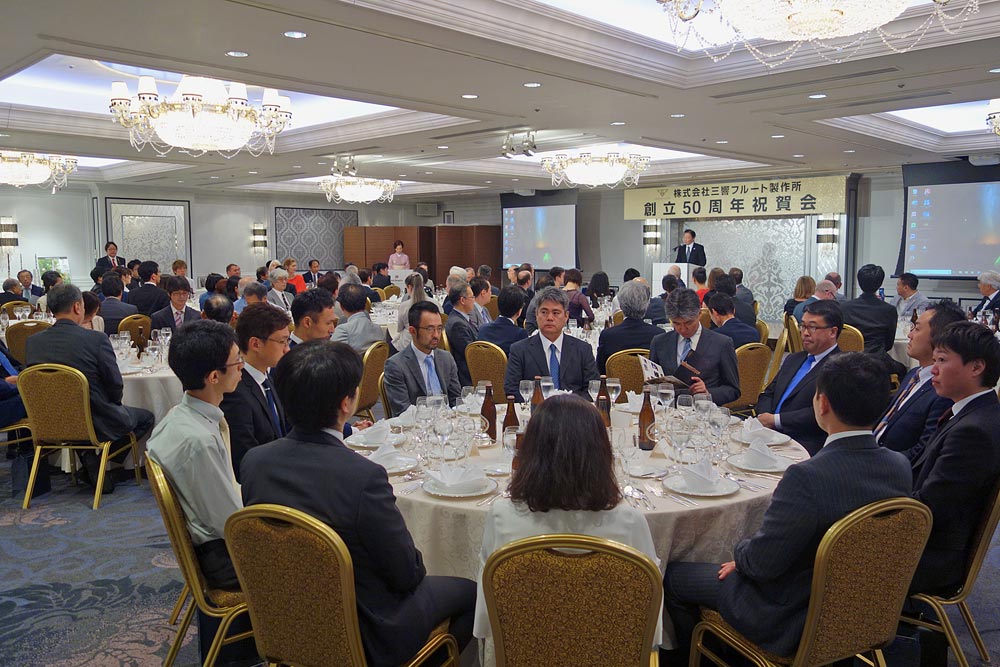
Sankyo Flute Seisakusho hosted 50th Anniversary Reception on July 6 at Hotel Metropolitan Tokyo, inviting more than 100 industry guests and endorsing flutists.
The company name stands on the 3 engineer co-founders; late Kikuo Hisakura, Hideo Takei, now chairman, and late Taichi Ohki.
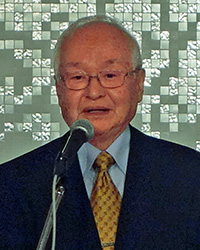

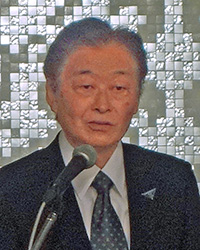
Yutaka Hisakura, president and son of Kikuo said, “Sankyo has designed and developed a host of models in the past 50 years using the best conceivable materials for the highest quality sound. My father passed away 10 years ago, and I’m now with the company for over 40 years. We are privileged to have had your decades of support. Marking 50 years’ history of instrument making, we continue to commit to artists and keep building instruments of greatest quality.” (Photos from l. to r., Yutaka Hisakura, Yukio Ohashi and Hideo Takei.)
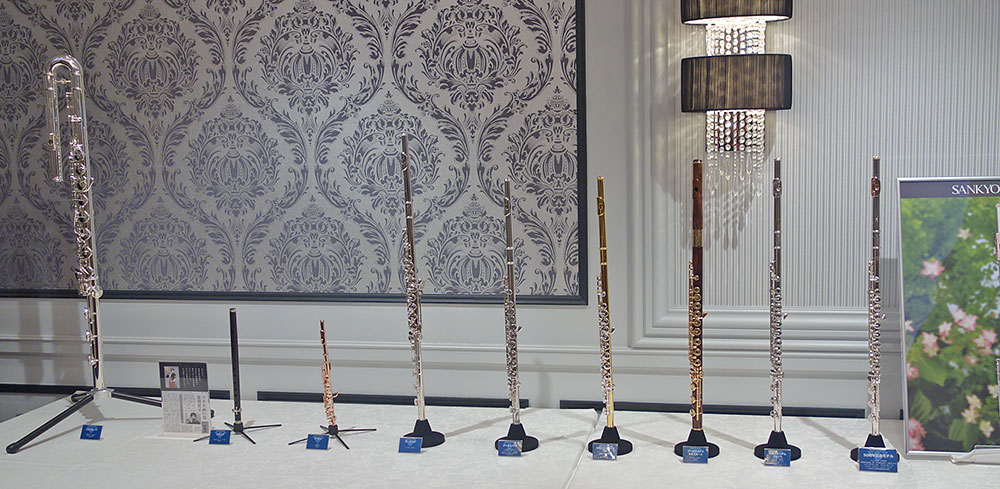
Yukio Ohashi, chairman of Prima Gakki, which is exclusive distributor of Sankyo flutes commented, “We know Sankyo Flute has been recognized as an excellent company with great ability in product development and engineering. I remember the unique High Wave head joint the company first developed shortly after it’s launch. It was first introduced at 5th National Flute Association Convention in U.S., and made a sensation for its massive sound among world’s flute society. New technologies and products have followed at almost every convention since then. The instruments in various mechanisms and materials have built the base of Sankyo.” (photo: Major products of Sankyo Flute including bass flute, far left, prototype, fife, second from left, prototype, and 50th anniversary model flute, far right)
Sankyo has established a world-wide network of 38 distributors today.
Yamaha’s 2nd Quarter Ordinary Income Increases 21%
According to Yamaha Business Report announced on August 1, second quarter ended at the end of June closed with 13.5 billion yen ordinary income, which is a 21% increase over the same period of the last year. Yamaha spokesperson commented that sales of the music products including pianos and guitars had been very well in China and North America. Increasing brand awareness allowed the company to mark up part of its product lines.
Sales for the quarter went up 4% to 105.1 billion yen. The good result is attributed to solid consumer spending in China and favorable sales growth of attractively priced digital pianos in North America. Increased tax burden influenced growth of net profit, which ended with 9.3 billion yen, a mild 1% rise.
Yamaha maintained expected annual net profit for 2019 as 40 billion yen, a 26% decline from the same period of the previous year.
June 6 Making Music Day
From June 1 to 10, music stores throughout Japan organized a host of music promotion programs inviting non-music makers to provide them with musical experiences in various styles.
Japan Musical Instruments Association set June 6 as Making Music Day in 1970 and has promoted to create new music makers in the Japanese market. June 6 comes from the Japanese old saying that it’s the best time to begin artistic studies at the age of 6.
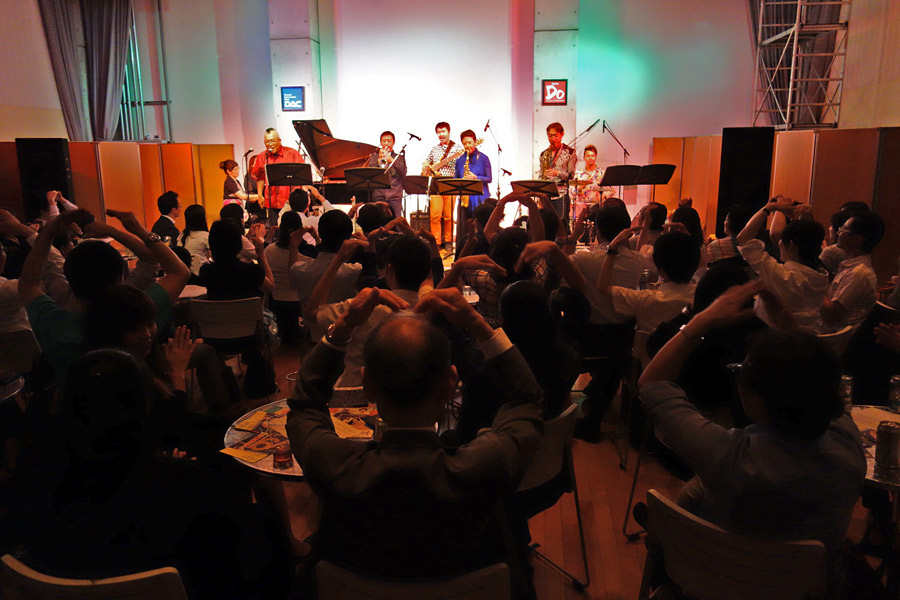
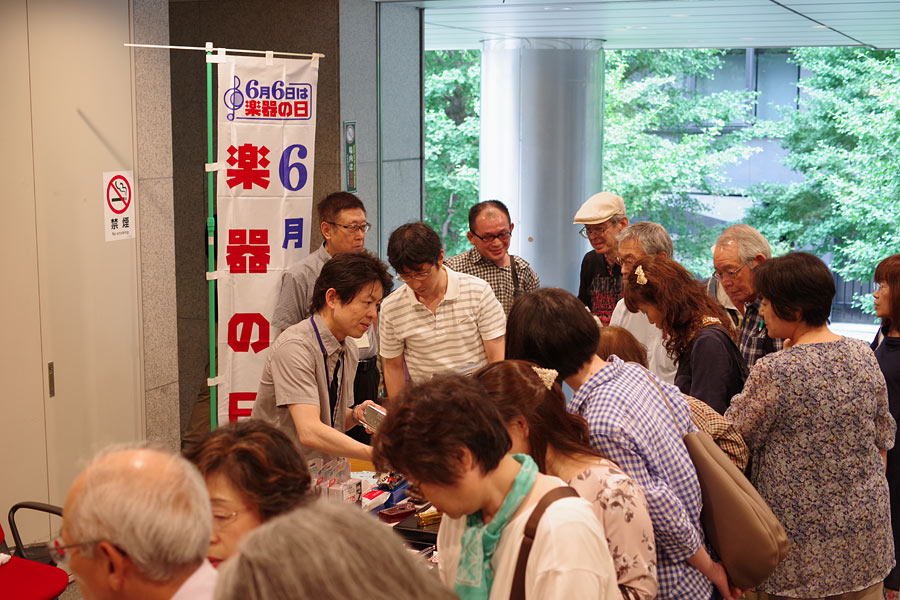
Tokyo-based DAC Musical Instruments Shop held “60 Years Old Anniversary Live” inviting 60 years old instructors in connection with Making Music Day at Da Capo Music Teaching Studio at Space Do on June 6. The audience enjoyed the live performance in relaxed atmosphere. (photo right)
Federation Internationale de l’harmonica Japan (F.I.H.Japan) hosted The 38th Harmonica Contest Finals Live sponsored by Moridaira Musical Instruments Co., Ltd. and Hohner Musikinstrumente on June 9 at Dentsu Hall, Ochanomizu, Tokyo. Harmonica has recently been increasing popularity among young generations. There are reportedly 2 million harmonica players in Japan, and 12 million people who have experienced playing harmonica.
The audience including both professional and amateur players shared pleasure of playing harmonica with top-level artists invited as guests and juries. (Photo left)
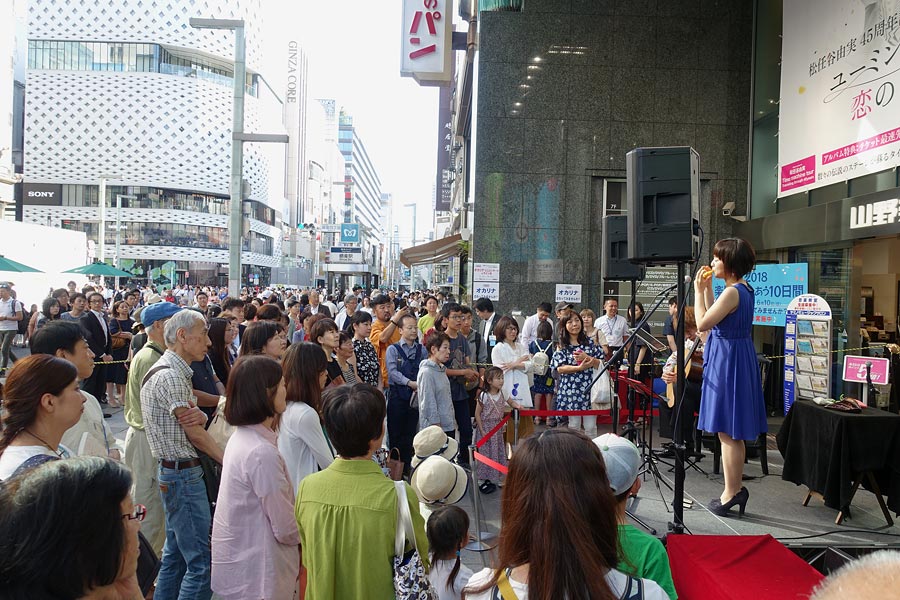
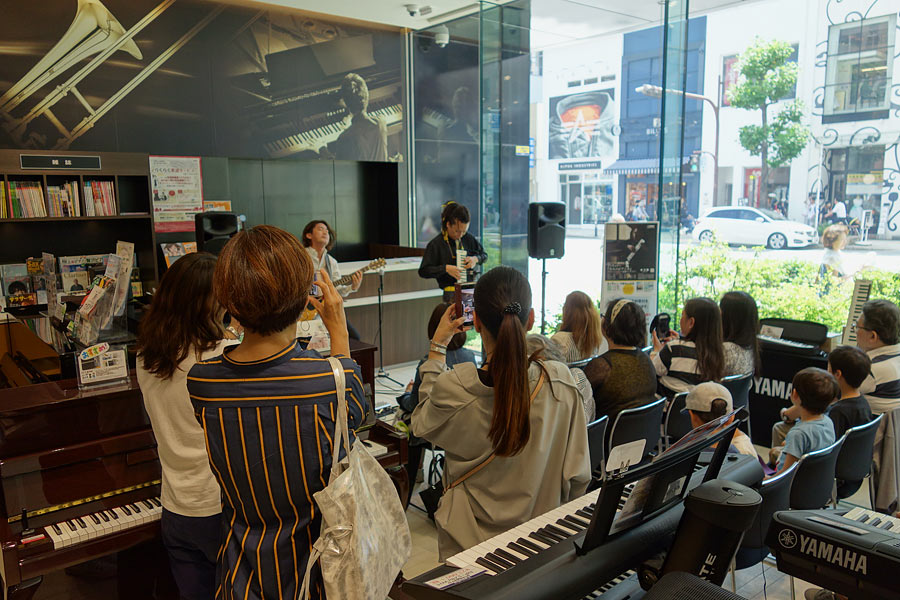
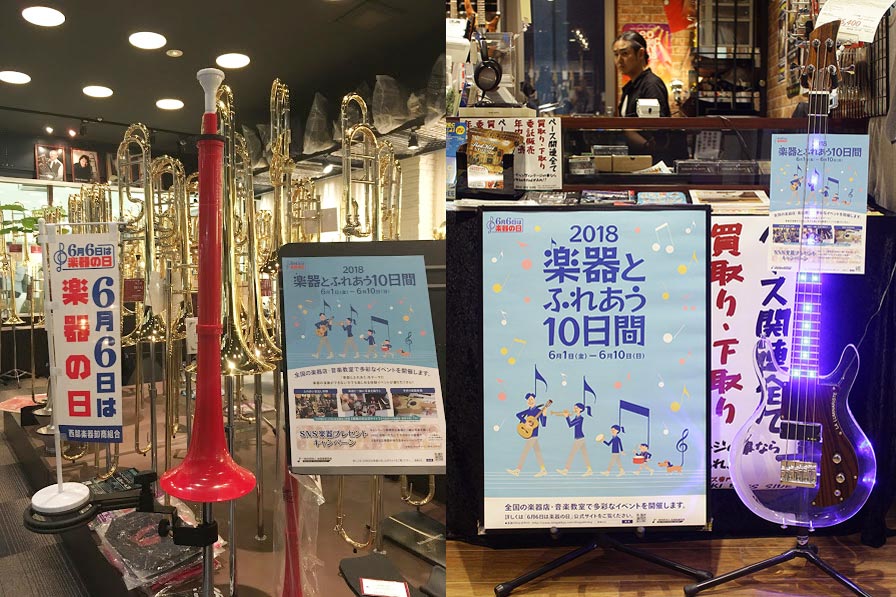
Yamano Music, Ginza, Tokyo, provided multiple music entertainment programs including “Take A Photo With Your Favorite Musical Instrument” and “Musical Instruments Quiz Rally’ during the 10 days. (photo below right)
Yamaha Music Osaka Nanba Store organized an in-store mini concert, “Key Harmonica for Adults” inviting Mi3, magical artist of Pianica, on June 9 attracting capacity audience. (photo below left)
Miki Gakki, Osaka, staged “10 Days Experiencing Music Making” at its American Village, Bass Side, Wind Forest and Low-Brass Center retail outlets. Posters and a banner flag of the special market-development approach gave the retail spaces an inviting look. (photo below right)
Music Products Retail Market Survey (Jan. ? June, 2018)
Japan Music Trades carried out an annual music products retail market survey, which focuses on performance of music stores for 6 months ended on June 30. A total of 48 music retailers throughout Japan responded to the survey.
Compared with the survey of the same period last year, 54% dealers replied their sales increased over the previous year, 29% reported flat sales and 17% commented sales decrease.
The performance was mixed depending on stores and areas, but collectively, they reported business started moving up in spring and peaked before and after holiday season in early May.
About 40% replied that young customers are increasing, and they mainly purchased band and orchestra instruments as well as guitars and related products early May for school and extra-curricular activities.
It’s safe to say that demands among young generations remain strong since only a few dealers commented that they don’t see much of young customers coming into their stores these days.
50% of the dealers replied that average sales price is increasing, and 60% of them expressed expectation toward the coming biggest business season of year.
Europiano Accepts Capital Investment from C.Bechstein
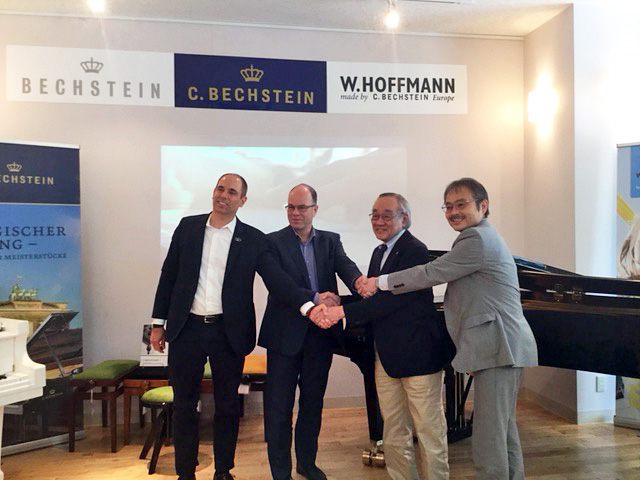
Europiano Co., Ltd., Tokyo, exclusive distributor of Bechstein pianos in Japan, announced that the company would accept capital investment from C. Bechstein, Berlin, becoming a wholly owned subsidiary of C. Bechstein on June 25.
Under management of Masato Kato, president and master piano craftsman (German Government-authorized piano making meister), Europiano will expand business to Southeast Asia and Australia to be a central marketing unit of C. Bechstein in the areas. (photo from r. to l., Masato Kato, President, Ryoichi Totsuka, founder and chairman, European, and Stephan Freymuth, president, C. Bechstein)
Obitury-Kazuo Kashio
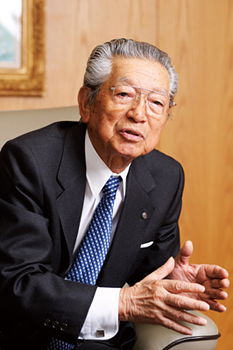
Kazuo Kashio, chairman, CEO of Casio Computer Co., Ltd. passed away on June 18 of aspiration pneumonia at the age of 89.
Casio plans a memorial service for him later.
Born as the 3rd son of 4 Kashio brothers, Kazuo served as the 3rd president of Casio Computer. The 4 brothers invented 14-A, world’s first compact type electric calculator and launched Casio Computer. In 1972, Kazuo spearheaded development works of Casio Mini personal calculator with which he successfully marketed compact calculator in the mass market.
He also played a key role in marketing G-SHOCK unti-shock wrist watch.
For 27 years of his tenure, he kept an exceptional passion in developing products helpful for people’s life and education.
Yamaha Expands U.S-based Guitar Business
Yamaha launched Yamaha Guitar Group Inc. in U.S., which is responsible for making marketing plans and implementation of U.S.-based guitar business in April. Co-headed by Marcus Ryle and Shoji Mita, the company recently purchased Ampeg, manufacturer of bass amps and bass effects processors, from Loud Audio LLC as part of expanding marketing strategies of the guitar business.
Founded in 1946 as a specialist manufacturer of musical instrument amps, Ampeg introduced numerous innovative and unique products including world’s first amp with built-in reverb unit in 1960s and amps featuring maximum output power among the existent models of the time. Ampeg products are widely supported by musicians in the global market today.
The acquisition of Ampeg is expected to strengthen Yamaha’s bass line and provide bassists with proven expertise and broad solutions.
Yamaha plans to accelerate growth of guitar business by integration of Yamaha, Line 6 and Ampeg brands under one roof, generating synergy effect by taking advantage of the individual brands, and expedite timely product development and efficient strategic marketing centrally based in U.S.
Obituary
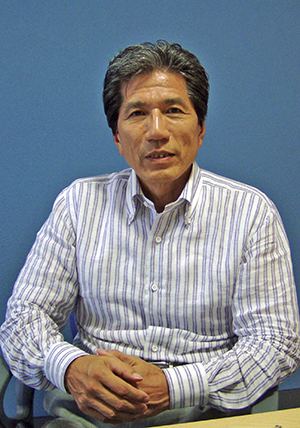
Masaaki Ohmura, founder of Mac Corporation, passed away by illness on June 9. He was 75 year old.
Worked for Rokkomann, Inc., for decades, he launched his own business in 1984 mainly exporting guitars, and later distributing imported wind and string instruments largely made in China in the Japanese market. More recently, the company exports attractively-priced J. Michael wind instruments made in China for first time players.
In an interview with Japan Music Trades in August, 2008, Ohmura looked back his early years of struggle in 1990s trying to hold a step in China. He sent engineers to Chinese partners, which were government-controlled factories, for providing technical support, but his efforts didn’t pay. After years of tries and errors, local private factories were about to set up in China, and Ohmura successfully partnered with one of those new companies. It became a milestone for the company running business as a wind instruments specialist distributor.
Funeral services will take place on June 12 and 13 in Nagoya. Mac Corporation is now headed by Shujiro Ohmura, second son of Ohmura.
Yamaha Innovation Center Completes In Hamamatsu
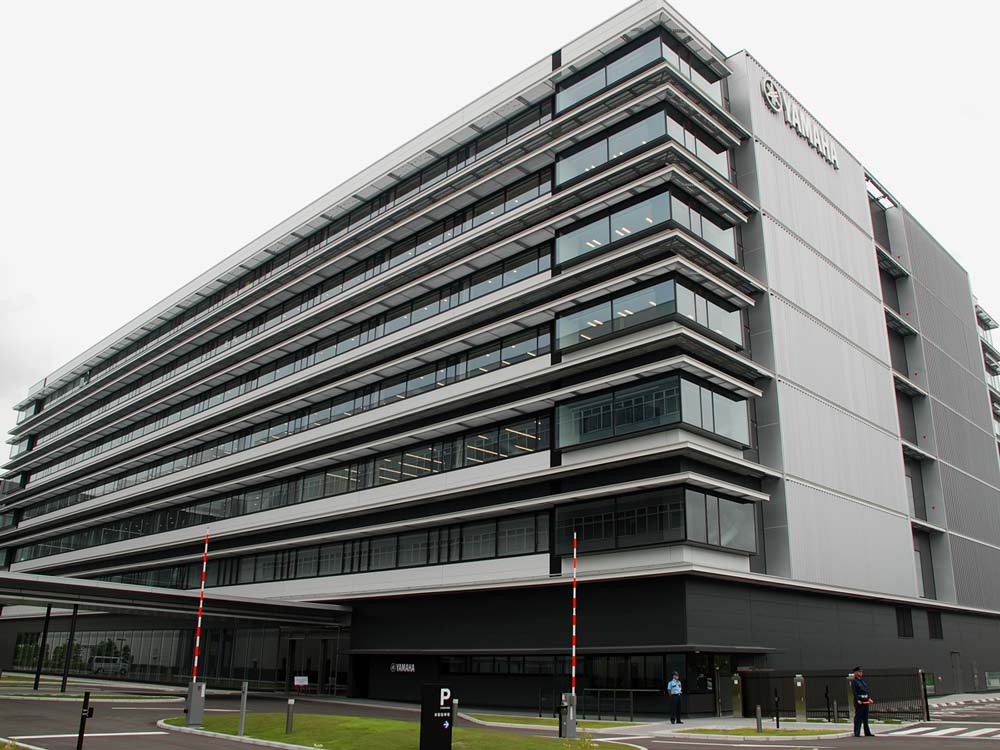
Innovation Center, which Yamaha had been building at its headquarters in Hamamatsu completed on May 28 and opened for the industry guests and press members.
Consisted of 3 buildings accommodating 2,500 engineers, the Innovation Center has research laboratories, musical instruments and acoustic products manufacturing headquarters in No. 18 Building, product warranty division in No. 20 Building, and Innovation Road museum which showcases Yamaha’s historical musical instruments manufacturing open to general public on the 1st floor in new No. 21 Building. In addition, it has anechoic and echoic chambers, a vibration testing room, human sensor room, human engineering laboratory which only permitted person can access, a selection room and a new recording studio in the attached building.
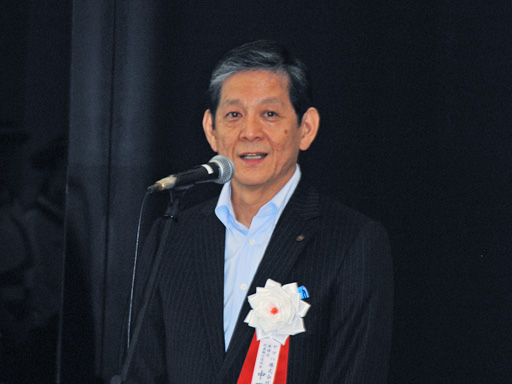
Takuya Nakata, president/CEO commented at the opening reception, “We thought to add something innovative when we build the new No. 21 Building. Integrating R & D divisions located separately by product categories before, we expect the engineers can better communicate and get inspired each other on the same floor under one roof. Such work environment in cross-sectional design could provoke new ideas and experiments to be implemented in future Yamaha products. The X-type stairways also promise a more open and flexible workplace.”
Nakata continued, “We have 130 years of product development history initiated with traditional organ. The Innovation Road on the 1st floor will effectively illustrate such our histories in real products, instead of images. The visitors can share experience and feel the spirits of Yamaha. It’s our hope that we can contribute to people on the globe with innovative and creative products related to music and sound. And that will bring Yamaha a further growth in the future.”
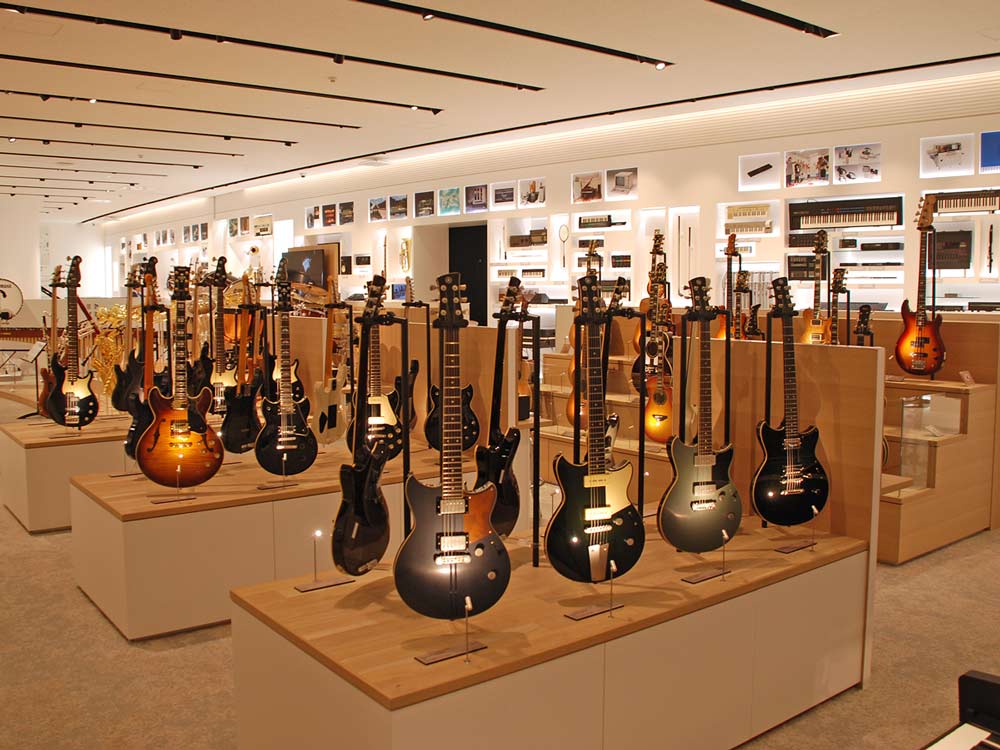
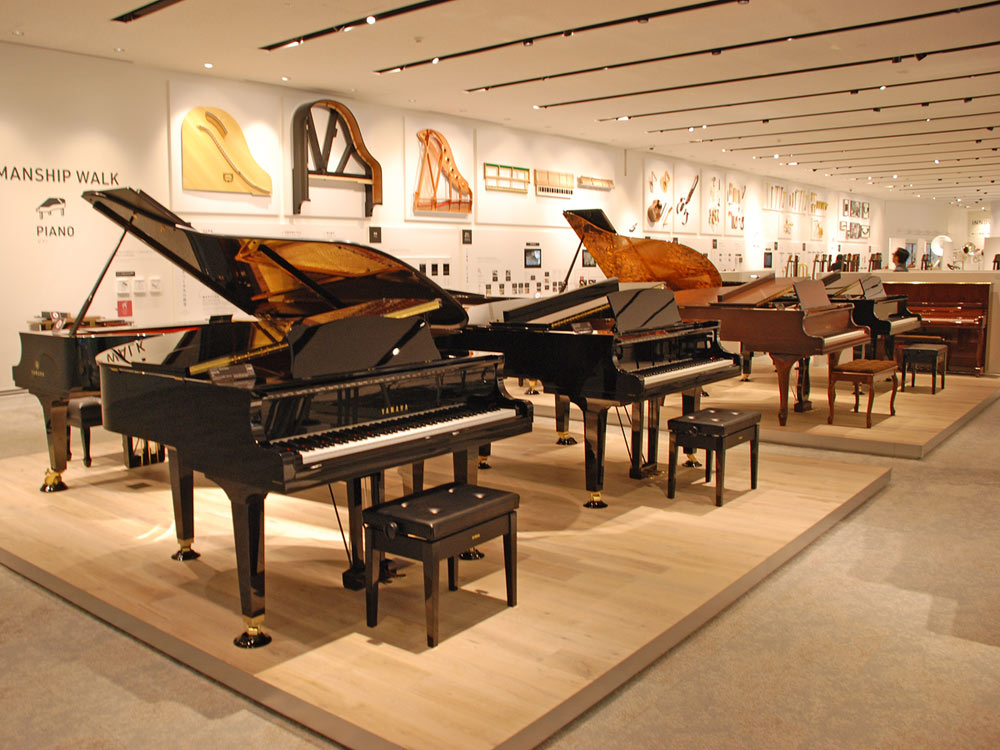
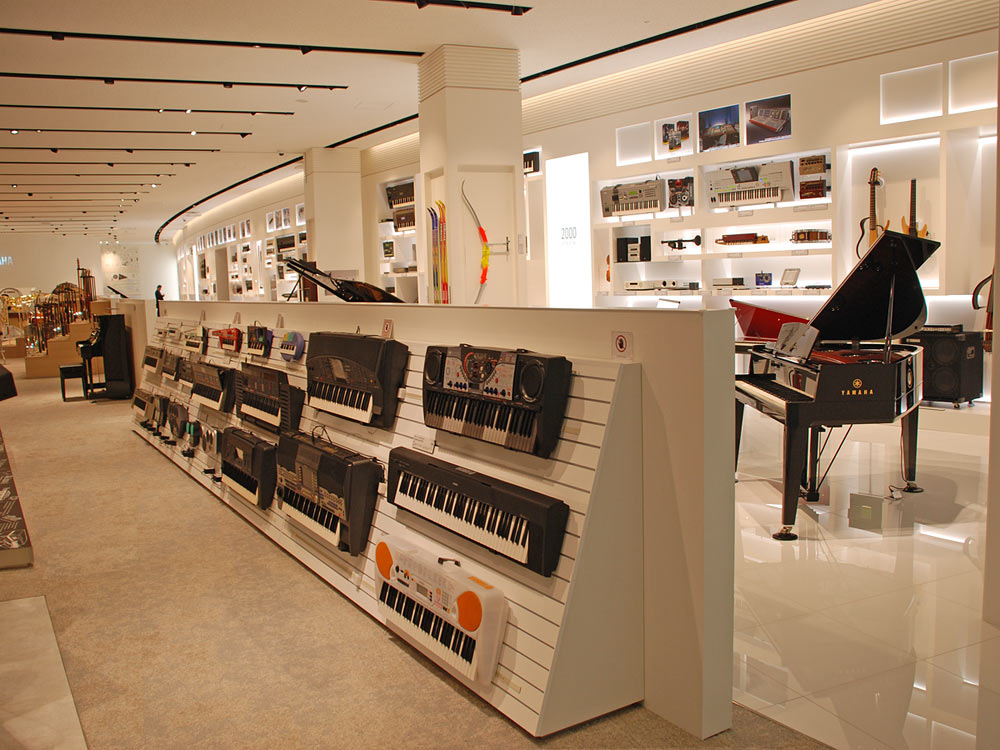
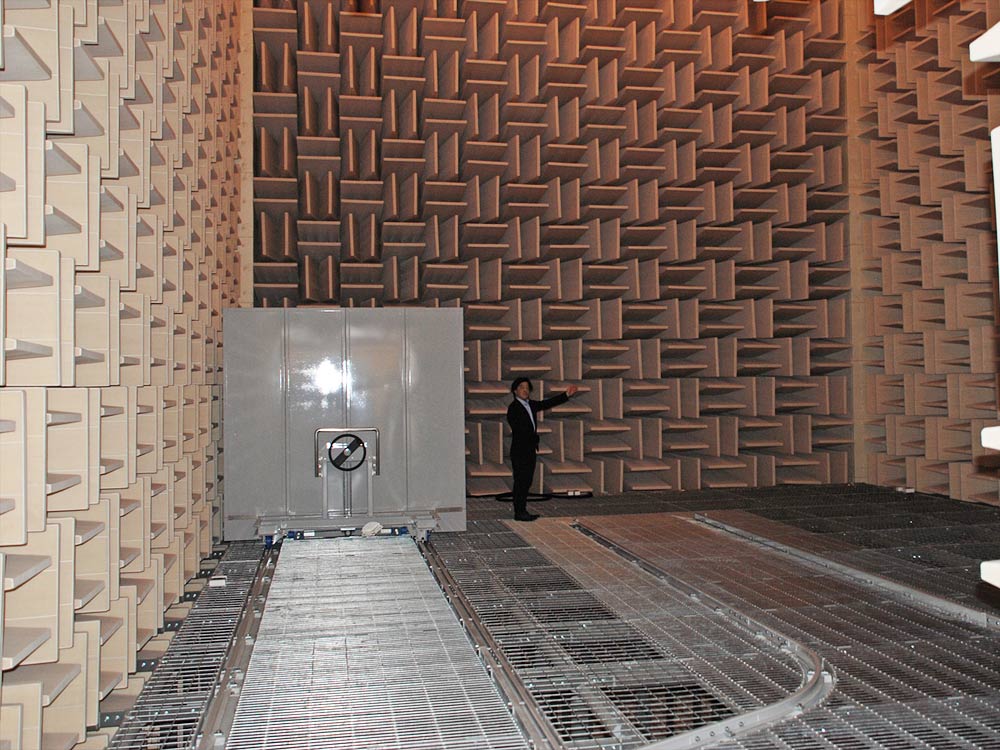
The second floor of t
he new building has a design laboratory and prototype production room. The 3rd floor is offered for a restaurant and terrace area where the engineers flexibly hold meetings. There are R & D Management, Intellectual Property and Marketing Divisions on the 4th Floor, Music Products Development Division on the 5th floor, Musical Instruments, Audio Products Development Divisions on the 6th floor and Audio Products Development Division on the 7th floor.
Innovation Road is consisted of Crafts Walk which illustrates Yamaha’s manufacturing technique and the introduction processes of automated machinery, Digital Library, a digital archive of all Yamaha products, Innovation Road Map to introduce history of products development, Super Surround Theatre which provide experience of ViReal 3-dimentional acoustic technology, History Walk covering 200 Yamaha products from the very beginning to today, Futuristic Scope and Acoustic Technology Area.
Innovation Road seems to be a unique exhibition not found in other places of the world. Yamaha has set a new course for growth toward the future.

